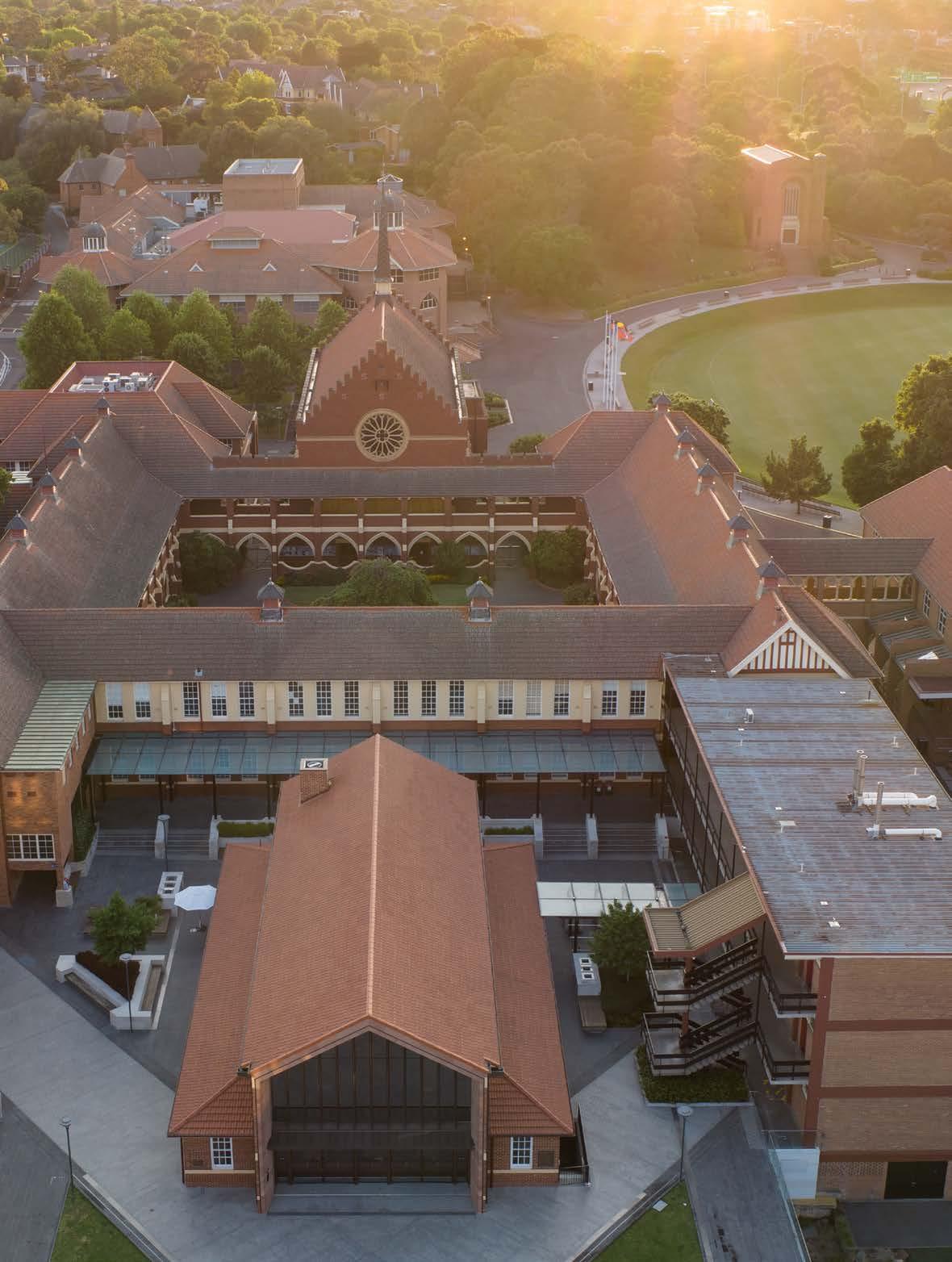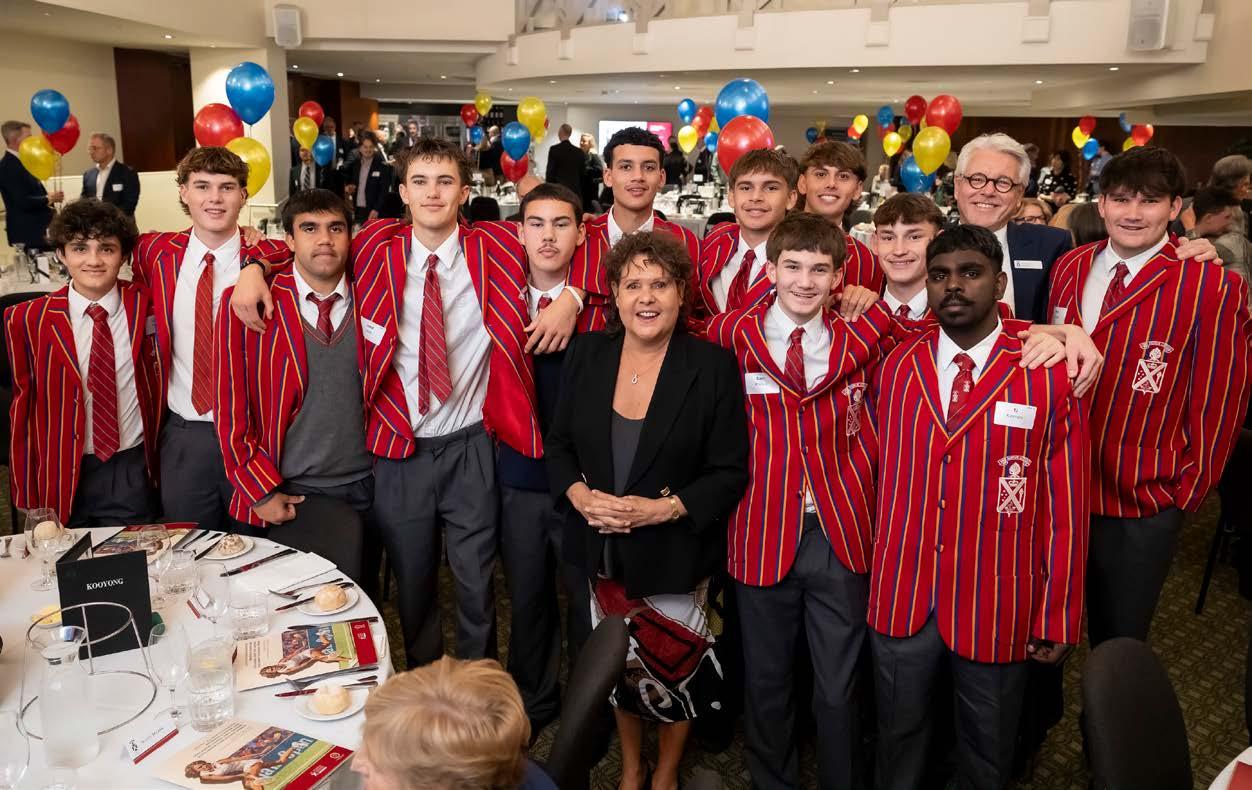

1.1 MILLION REASONS TO CELEBRATE A SUCCESSFUL SCHOLARSHIP LAUNCH
THE SCOTCH COLLEGE FOUNDATION RAISES MORE THAN $1.1M IN 24 HOURS TO FUND THE GOOLAGONG-CAWLEY SCHOLARSHIP
Kooyong Tennis Club was the venue for the spectacular launch of the Goolagong-Cawley First Nations Scholarship Fundraising Dinner on the evening of Thursday 9 May. As the venue of four Evonne Goolagong Australian Open singles victories, Kooyong was a most appropriate place to stage the fundraising dinner.
There was a wonderful atmosphere of fellowship and celebration, and a real community feeling, with 250 Scotch Family members gathering to launch this innovative scholarship.
The dinner was graced with the presence of guests of honour, Evonne Goolagong and her husband Roger Cawley, together with Evonne and Roger’s daughter Kelly, Kelly’s husband, David Loats, and Dr Janet Young, Evonne’s former doubles partner, who is a director of the Evonne Goolagong Foundation.
On a night which resonated with fun and laughter, there was a serious undertone of something very special being created. It was an event packed with a host of highlights, including:
◍ Welcome to Country, delivered by current Scotch First Nations students, Birra Whyman-Coombes (Year 12) and Tanner Armstrong (Year 10), two young Wurundjeri men.
◍ Bruce Woodley’s I am Australian performed in a way audience members would undoubtedly never have heard before, with
vocals and violin by Sarah James and didgeridoo by Ron Murray (current Scotch parents).
◍ A passionate address by Foundation President, Mike Sim (’78), during which he welcomed ‘Áustralia’s living treasure’, Evonne, and her husband Roger, revealing that back in 1974, Mike had been a ballboy at Kooyong when Evonne won the first of four Australian Open titles.
He expressed his profound gratitude for the support of Scotch Foundation members, and paid tribute to retiring board member Rob Hand, and to David Yu (who was standing down as Vice President but continuing as a board member); also recognising the fine work of Sam Hunt (’92) and Abigail Hand.
◍ A stimulating panel discussion chaired by Scotch’s Head of Indigenous Education, Dr Rob Smith, featuring current students Kobe Williams and Max Phelps (both of Year 11) and past students Jy Simpkin (’16) and Joel Garner (’17). Max caused amusement among the many teachers present by revealing that he had originally planned to be a teacher, but was now ‘keeping [his] options open’. All panel members expressed their gratitude for the opportunities their Scotch education had opened for them.
◍ At 8pm, the launch of the 24-hour fundraising campaign by Principal Dr Scott Marsh, School Captain Matt Callaghan, and Lewis Murray (Year 9). The giant screen immediately began to

show fundraising progress. The Principal thanked Evonne and Roger for what their foundation is doing to encourage education for First Nations children.
‘Tonight is about creating opportunities,’ he said, ‘and sacrificial giving to create those opportunities is part of Scotch’s DNA’. He paid tribute to Dr Rob Smith for his key role in Scotch’s Indigenous Program. As Dr Marsh concluded his remarks, the big screen began to light up with early donations. The target was $1M in 24 hours, to be achieved by 8pm on Friday, or all donations would be refunded.
◍ Dr Janet Young’s introduction of Evonne Goolagong and Roger Cawley, in which Evonne’s former doubles partner spoke of the couple’s passionate belief in the Evonne Goolagong Foundation, and their staunch support of all program participants.
◍ Tim Shearer’s interview with Evonne and Roger, in which the guests of honour described the establishment and development of the Evonne Goolagong Foundation. Roger expressed his gratitude to Scotch for the school’s cooperation with the foundation, saying that the association with the school has been ‘the best time of our lives’.
Evonne spoke of her respected opponents, including Margaret Court, Billie-Jean King, Chris Evert and Martina Navratilova. ‘I just loved being out there’, she said, ‘having a lovely day’. She spoke of the key importance of education – ‘ít’s not about the tennis: everyone has to attend school’, which is a mantra of her foundation, and to her, ‘Scotch is like a big family’.
◍ Dion Whitfield’s eloquent thanks to Evonne and Roger, in which he expressed his gratitude to Scotch and the Evonne Goolagong Foundation for the opportunities which have been presented to him. ‘My Scotch education has enabled me to grow, and it has encouraged me to want to serve others and to strive for excellence in all that I do. I love Scotch, and I want as many First Nations boys as possible to have the same opportunities I’ve enjoyed.’
◍ A very successful live auction, expertly conducted by Lachie Fraser Smith (’85) of Jellis Craig, which raised $20,475. Among the
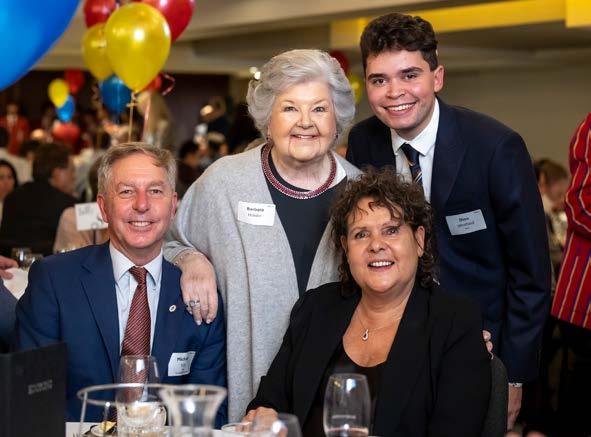

items auctioned were a Ben Shearer water colour painting, which sold for $7000, a Roger Federer signed tennis ball ($4200), a Ron Murray didgeridoo ($4000), lunch at Kooyong with Evonne and Roger ($2500), and a Hawthorn Football Club signed guernsey ($1000).
◍ A raffle which raised $5000.
◍ MC Tim Shearer’s concluding remarks, in which he thanked Evonne Goolagong and Roger Cawley, Dr Janet Young, event organisers Rebecca Mortimer, Sandra Dick and the organising committee, matched donors, and those who committed to the campaign during the evening. He especially mentioned the large cohorts of teachers and parents who supported the dinner and the fundraising after a busy school day.
Throughout the event the big screen told the story of the mounting donations total, which had reached $300,000 by the close of the evening. On the following day the targeted $1 million was achieved by 6pm – two hours ahead of the 8pm deadline. At 8pm the final total was $1,145,180, described by Mike Sim as ‘a magnificent number to achieve in so many ways’.
He said: ‘Not only is the number outstanding, but because of the excess and the way we offer scholarships and invest the capital, it sets up the fund to actually grow, and quite possibly achieve more than we ever hoped for.’
OPPOSITE PAGE: EVONNE GOOLAGONG WITH SCOTCH FIRST NATIONS STUDENTS AND THE PRINCIPAL, DR SCOTT MARSH. THIS PAGE, ABOVE, LEFT: A RON MURRAY DIDGERIDOO IS AUCTIONED FOR $4000. RIGHT: MIKE SIM (’78), BARBARA HOLDER, DION WHITFIELD (’22) AND EVONNE GOOLAGONG. BELOW: PREFECTS SELLING RAFFLE TICKETS AT THE DINNER.

WHAT BETTER START TO THE YEAR THAN BOYS FROM EACH HOUSE COLLABORATING IN THE DELIVERY OF THEIR CHOSEN SONG TO KICK OFF THE 2024 COCK HOUSE COMPETITION?

HOUSE CHORALS COMPETITION –IGNITING HOUSE SPIRIT EARLY IN THE SCHOOL YEAR
The first few weeks at Scotch after the summer break take on a particular flavour, with palpable preparations for the annual House Chorals Competition. With new students at Year 9 joining their House, the build-up to the big day provides our boys with plenty of opportunities to mingle across year levels, and for representatives of each House to practise their leadership skills.
Ted Ajani (Year 9) testified to this new experience as he entered his senior years: ‘As a Year 9 student, new to the House system, the House Chorals Competition

was not only exciting but an entirely new idea. During Years 7 and 8 I could see the Houses practising, thinking of it as a chore that is forced on the boys every year.
‘But now, as a new member of Field, I can see how this event unites people by truly wanting to win in a fun competition that anyone can participate in, regardless of their singing level. Overall, this competition was engaging and competitive – two ingredients to make any event memorable.’
A more experienced student, Captain of Music, Geoff Liu, described the event:
‘Gathering a rabble of teenage boys to sing together has never resulted in much good – unless it’s for the House Chorals Competition, in which case it becomes a celebration of camaraderie, cooperation and the one musical instrument that we all possess – the human voice.’
Two student testimonies, from two different spectrums of the equation, both sharing their gratitude for and enjoyment of a formidable opportunity to bond behind a common light-hearted event.
Dr John Ferguson, our Director of Music, noticed that odd spaces were

1937. It is no coincidence that its instigation coincided with the arrival that year of Scotch’s inaugural Director of Music, Lionel Albert Jack (John) Bishop, who was the first to establish music as a serious subject and pastime in the life of Scotch.’
‘The August 1937 issue of The Scotch Collegian reported that: “This term work has begun on the House Music Teams. About 150 boys are musicians of varying ability, so the Houses will be able to field good teams. Each will consist of five units, including a treble choir of 15 voices. The first contest may be held at the end of this term … Great interest has been shown in the scheme, which should provide for some fine entertainment and relaxation for exam-burdened souls”’.
As our current House Choral competition takes place at the very
beginning of the academic year, its serene nature undoubtedly still fulfills that calming role before the busy year ahead.
And for those interested in results, Paul Mishura added that ‘Gardiner House (renamed Gilray in 1953) won the first contest, but for most of the period that Littlejohn was the House for all boarders, Littlejohn boys dominated the competition.
The competition has not been held every year, and in some years the results are unknown. It has been held in different formats, including separate choral and instrumental competitions, but remains a competition that is keenly and enjoyably battled out.’
For anyone walking around the school during form time, a cacophony of voices, sometimes accompanying instruments, can be heard from traditional classrooms, in
a special session inside Memorial Hall or on the steps of the James Forbes Academy.
The boys are well aware that the competition is not just in the singing, so once the harmonies and melodies have been well honed, students also spend time practising their best entrance and exit performance from stage, their poise, and obviously ensuring their shirt top-buttons are done up and ties neatly tied!
Dr John Ferguson shared his views on the 2024 competition: ‘The competition this year displayed some really good quality performances. There was a greater emphasis on dynamic contrast than in previous years, and considerable use of part singing and harmony.
The adjudicator, Kevin Kelley, Head of Voice at Trinity Grammar School, was particularly impressed with one House that
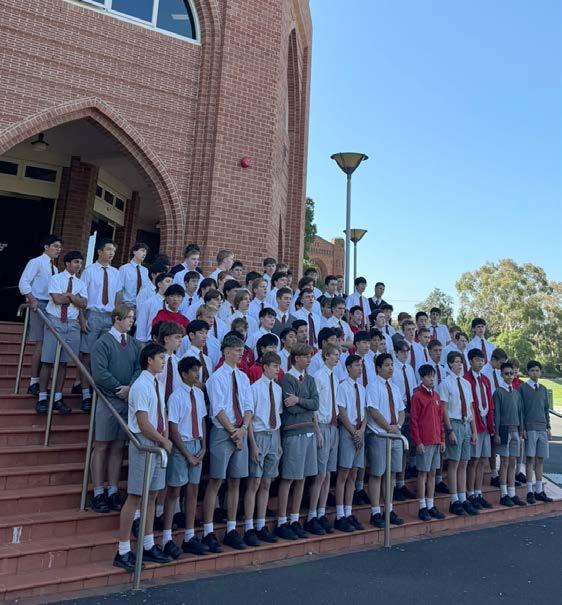
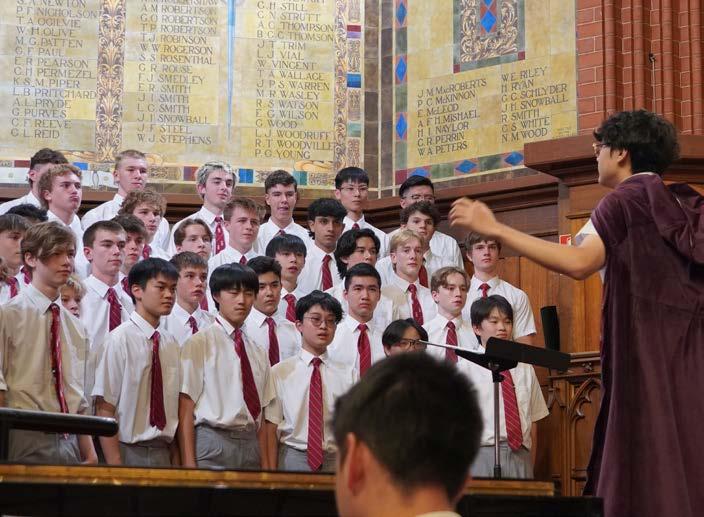

sang unaccompanied, and duly awarded them the first place. However, he told me later that he was really pleased with the standard overall and was delighted to have been invited.’
What makes these practice sessions very special are the bonds that are created; to see the boys self-regulate and take on board the expectations placed on them by the generations of House singing that have preceded them. As Dr Scott Marsh said: ‘Perhaps most enjoyable of all was the commitment demonstrated by all boys to doing the best for their House. Having wandered around, listening to many Houses rehearse, I admired the boys’ passion to do their best and loved watching the students represent their House with great enthusiasm – some even had an inclination of what they were doing!’


The day of the competition dawns upon them quickly. As the boys listen to each other respectfully, the hope is that regardless of their Cock House ranking, they will retain the memory of the melody they perfected and the brotherhood of feelings and emotions they experienced as they belted out their songs.
Vice Captain of Music, Neil Wang, focused on the philosophy of the event, its essence: ‘Singing is an act of expression. At the annual House Choral Competition, the boys join together to express our joy, passion and talents. Although every voice is unique, each is essential to the production of the music. It is truly an opportunity to join together, to have fun and to express the spirit of Scotch.’
Dr John Ferguson said: ‘From my perspective, I am always pleased that it
OPPOSITE PAGE: LAWSON’S CHOIR PERFORMS. THIS PAGE: TOP LEFT: EGGLESTON’S CHOIR REHEARSES ON THE JAMES FORBES ACADEMY STEPS. RIGHT: FORBES’ CHOIR PERFORMS. BOTTOM, LEFT FIELD’S CHOIR IN REHEARSAL
takes place, and it helps get the voices tuned up ahead of the Foundation Day Concert massed singing rehearsals in Term 3, when we uphold the tradition of the school uniting in song. Long may it continue!’
Dr Scott Marsh also looked at the bigger picture: ‘Well done to our boys and Heads of House for another terrific competition. Although Davidson were our 2024 winners, I think it is fair to say that the ultimate winner was music, and specifically, boys’ choirs. Singing is good for our souls, so keep singing.’
All in all, the competition is a spectacular event that links experts with less proficient singers and musicians, in good humour, with a fraternity that transcends ages, music preferences and traditional school boundaries.
INTERVIEW WITH OUR NEW HEAD OF YEARS 9 AND 10
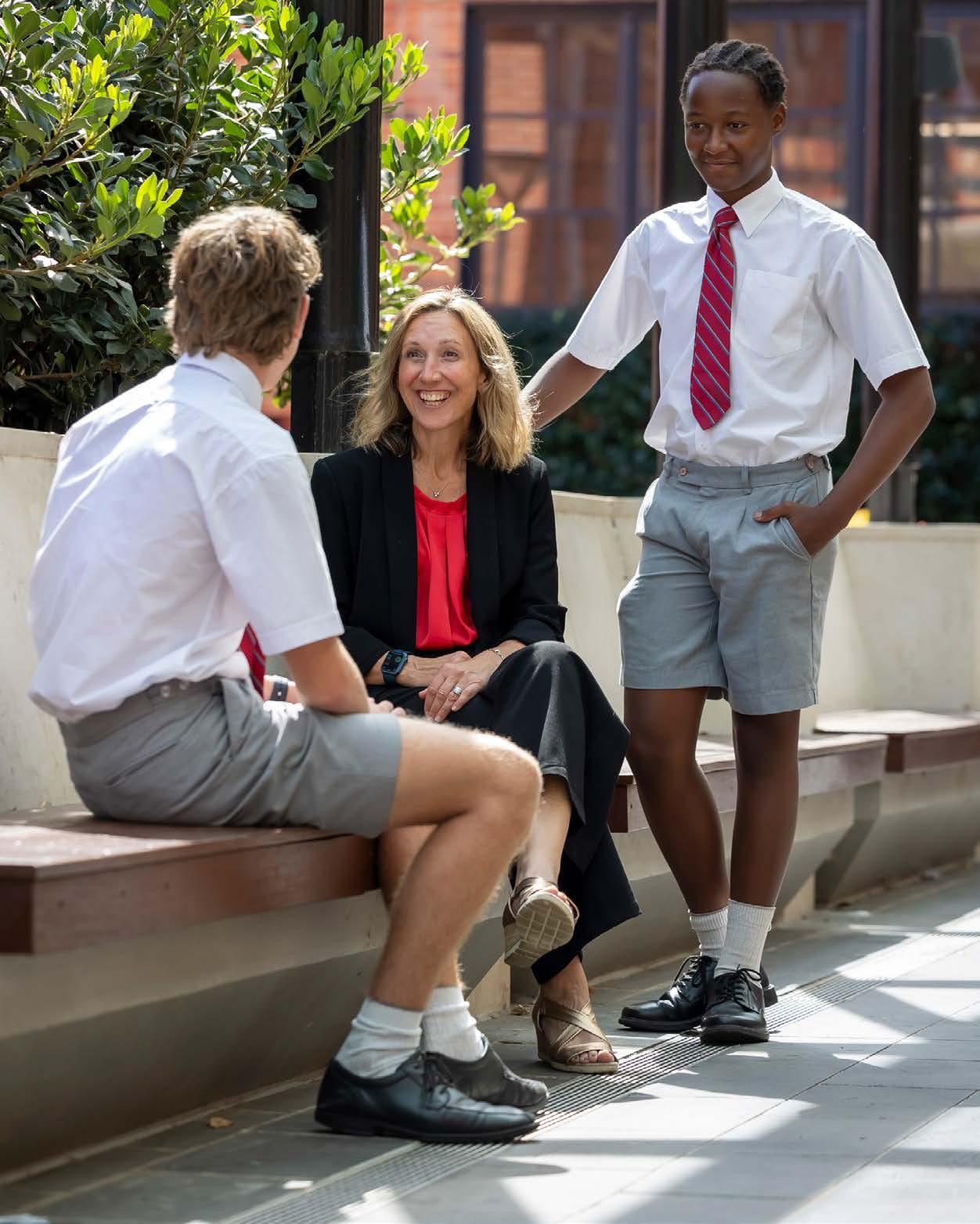
Great Scot met Emma Gates to ask her how she envisaged her new role as Head of Years 9 and 10, and took the opportunity to find out more about her.
You have been a member of the Scotch Family for several years. Could you tell us about your history with the school as well as any relevant prior experiences?
I have been blessed to be part of the Scotch Family for eight years, the longest I have worked in any school! I have finally found my place and passion in teaching fantastic students in such beautiful surroundings. I am originally from the UK, where prior to teaching I worked for Rhone Merieux producing vaccines as a Scientific Officer.
Knowing that I needed more in my life, I embarked on a career in outdoor education for three years and had the opportunity to interview many teachers in my role as School Liaison and Program Manager, before embarking on my teacher training
at Exeter University. For my first five years I was a Science and Maths teacher on the pebbly south coast of England at Cams Hill, a co-educational school in Hampshire.
Yearning for a more outdoor lifestyle and travel, my husband and I embarked on world travel that unexpectedly included teaching in New Zealand for a year. We then landed in Melbourne where I worked at Star of the Sea, Ivanhoe Grammar School and Ivanhoe Girls’ Grammar School, with roles in teaching and pastoral leadership. I then started at Scotch (my second home) as a Psychology and Science teacher.
Starting in 2016 with 8EG, a very excited form of potential CEOs, I knew that I was in for a treat, learning about young men, finding out about their passions and dreams, as well as inspiring them to be adventurous, to challenge themselves and to be curious about how and why things are as they are.
Then I was fortunate enough to officially step into the Head
HEAD OF YEARS 9 AND 10, EMMA GATES, CHATS WITH STUDENTS. OPPOSITE: EMMA WITH GREAT SCOT EDITOR, CHRISTOPHE TAYLOR
of Gilray House role in 2020. Despite COVID interruptions I really found the true sense of the Scotch Family within the ‘Ray’, and have been so thankful to our boys and parents who were so incredibly receptive and supportive.
What are your initial thoughts, in your new capacity, about Years 9 and 10 at Scotch?
Years 9 and 10 are massive developmental years for an adolescent; the individual changes that happen in our young men are incredible to observe. Many of the comments that I associate with these year levels are about ‘how far the students have come’ during this integral period of physical and mental growth.
With demanding academic VCE years on the horizon, it is a time of introspection, reflection and realisation for the boys, identifying what qualities they already have and how they can develop further within the nurturing and safe red bricks of Scotch. It’s about creating a space that allows students to make choices, make mistakes and to learn from these.
What is so exciting about this role is how we can focus, diversify, and improve what we already do to support our boys to be ready for their life challenges. We can use the existing opportunities in our Retreat programs, Respectful Relationships, our pastoral care curriculum, and forthcoming exciting programs in Mallacoota.
How would you define some of the key pedagogical philosophies that underpin your everyday approach and interactions at school?
I believe that students should be aware of your expectations, which should be both high yet achievable, that can shift to encourage future mastery. We reinforce positive behaviours, both big and small, and critically examine behaviours that do not reflect Scotch values, looking to reframe these in future experiences. Parity, empathy and integrity are essential Scotch character values. Creating the opportunity and space for students to embrace these qualities leads to wiser, more insightful and caring young men.
Could you share with us some of the projects you are currently working on and are hoping to implement in the near future?
Last year we ran two trial programs. One was based in Tiwi focusing on Indigenous culture and we have expanded this to Year 10 visiting Tiwi in Term 3 this year, with a view to incorporating this experience as a service in 2025. The other was implementing Toolbox to introduce Psychological CBT strategies in everyday situations to strengthen the social and emotional toolkit of our Year 9 and 10 boys. This year we are continuing to develop these programs, with Year 9 students undertaking ‘Dealing with Conflict’ and Year 10 ‘Overcoming Procrastination’ in May in the lead-up to exams.
What roles would you like to see Scotch students play in their future lives?
I would love to see more of our students becoming positive role models in the allied health space, where there is a need for more male psychologists. Or taking up roles that address present and future environmental and climate issues, being inspired by
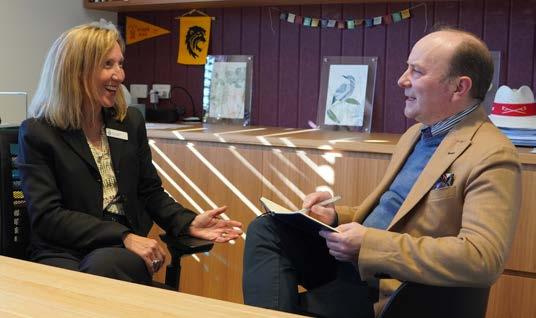
their education to influence future generations. I would also like to see them have the courage for a political voice or to follow their creative passions and talents in the arts. In short, to go out and make a difference to the lives of others.
In your opinion, what are some of the key advantages of a boys’ education?
Some of the key advantages of a boys’ education include creating an environment for tailored teaching practice, where educators can customise strategies to better suit the learning styles and needs typically associated with boys, such as incorporating more hands-on activities, movement or friendly competition.
Another advantage is the opportunity to address the social and emotional development of boys. Students may feel more secure expressing themselves, developing emotionally, and building social skills in an environment where they're surrounded by peers who face similar challenges and expectations.
In addition, teachers can specifically focus on the academic and developmental needs of boys without the distractions that can arise in coeducational settings. They can encourage boys to explore a wider range of leadership roles, where they can build confidence, teamwork and communication skills. Finally, they can further develop their interests and activities without feeling judged or feeling the pressure to perform in front of girls.
Would you mind sharing with us some of your key passions or hobbies?
I love running, and I completed my first marathon in 2016. I enjoy diving and snorkelling, and generally being in water (stemming from one of my childhood heroes, Jacques Cousteau).
I also love outdoor activities, such as hiking or camping. I enjoy reading – all sorts of novels – and visiting art galleries, going to the theatre or listening to live or online music. I enjoy yoga, Pilates and going to classes at my gym. I believe in the ‘Ch’ diet – cheese, chips, chocolate and chardonnay. I play backgammon, card games, Scrabble and Sudoku. I support Arsenal (in the UK) and Richmond at home. I love walking my two groodles, at the beach or in the park. And finally shoes – my first Saturday job was at a footwear and handbag retailer, Russell and Bromley (Charles Jourdan being a firm favourite).
PRINCIPAL - TEACHING AND LEARNING
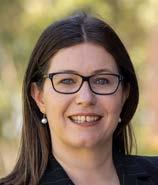

REDISCOVERING BEAUTY, GOODNESS AND TRUTH IN EDUCATION
EMBRACING THE TRANSCENDENT
Throughout history, the purpose of education has been a topic of ongoing debate. Is it merely the accumulation of facts and figures, a means to an economic end? Or does it hold the potential for something more profound – a transformative journey in appreciating beauty, pursuing goodness and discerning truth?
For millennia, the ideals of beauty, goodness and truth have served as guiding lights for humanity, shaping the very essence of education. Plato, in his allegory of the cave, envisioned education as a process of breaking free from the shadows of ignorance and ascending towards the light of truth – a light that embodies not just knowledge, but also the inherent beauty of understanding.
Plato’s student and colleague, Aristotle, regarded education as pivotal to cultivating well-rounded individuals capable of ‘eudaimonia’ or human flourishing. His emphasis on fostering intellectual and moral virtues underscored a holistic vision of education in which the development of mind and character are inextricably linked.
Yet, somewhere in the passage of time, this noble vision of education has, at times, been overshadowed by a narrower, more utilitarian perspective. In this paradigm, the success of schools
and students is judged primarily by standardised test scores, such as NAPLAN and ATAR.
Schools, ranked on the basis of these metrics, become embroiled in a competitive environment, often at the expense of a more holistic approach to education. While achieving strong academic results is undeniably important and a rightful goal of any educational institution, an overreliance on such measures of success can distort the true purpose of learning. Rightly or wrongly, academic prowess alone will not suffice in equipping young people to thrive amid the complexities of the twentyfirst century.
So, what will enable young people to flourish? I believe the answer lies in reaffirming education’s transcendent purpose: nurturing the mind, heart and spirit, a purpose deeply connected with cultivating an appreciation of beauty, goodness and truth. By fostering these ideals, students will not only understand the world intellectually, but will also be able to engage with it ethically and in a way that allows them to revere its inherent value and beauty.
One way this might be achieved is by connecting with the ideas of leading cognitive scientist, Guy Claxton, who advocates
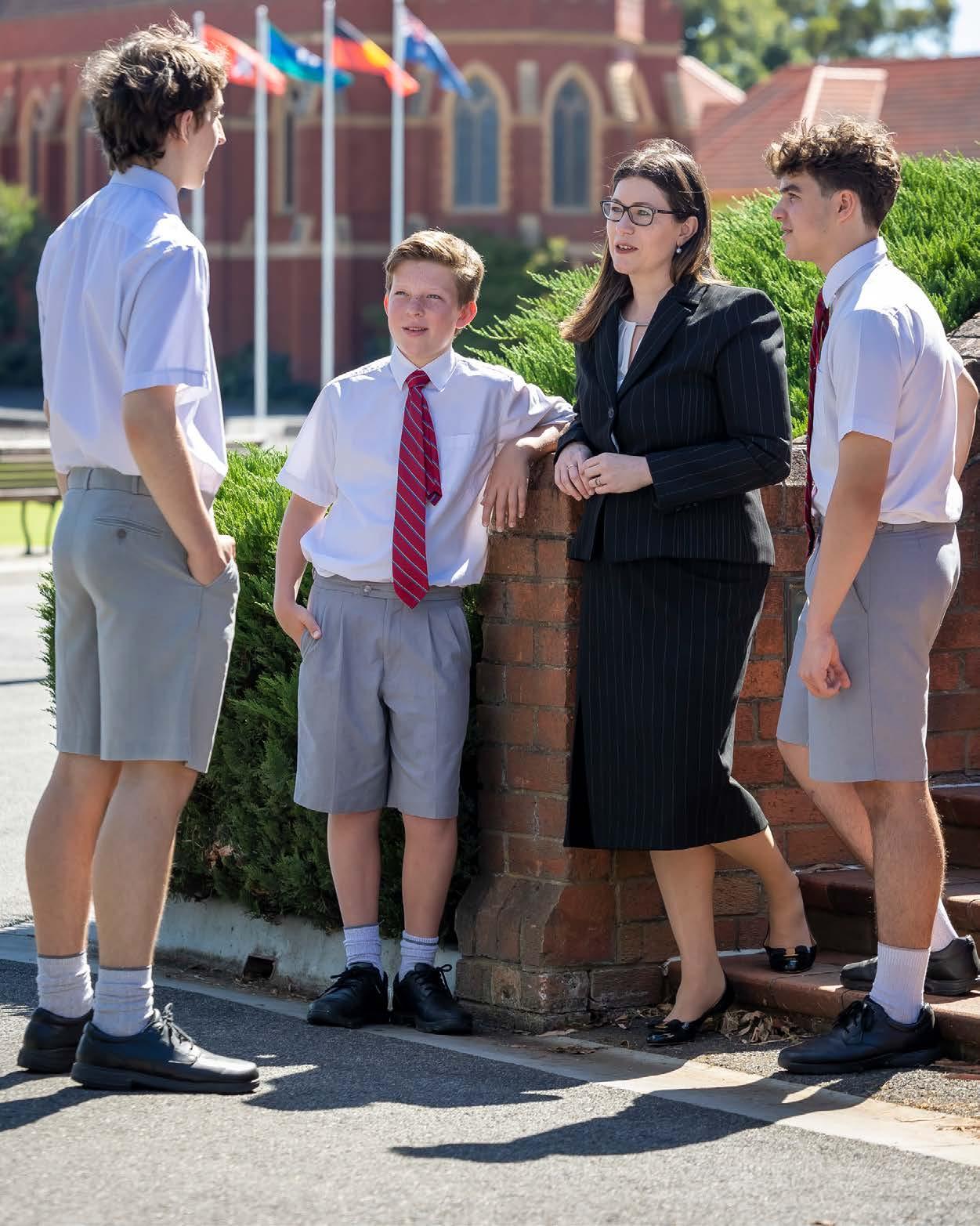
for developing ‘powerful learners’.
Powerful learners are not passive recipients of knowledge and skills; they actively engage in their learning journey on multiple levels, as captured by Claxton’s concept of the ‘learning river’. The surface currents of the river represent the essential knowledge and skills learners acquire, the foundation of learning.
However, it is the river’s depths that hold the true power and where Claxton’s metaphor and education’s transcendent purpose converge. The river’s unseen depths, its undercurrents, symbolise the habits of mind and character traits we cultivate. These undercurrents empower learners to appreciate beauty, pursue goodness and discern truth. They nourish the surface knowledge, giving it meaning and application in our lives.
Consider a student studying history: a passive learner might simply memorise dates and names of key figures connected to a historical event. A powerful learner, shaped by an appreciation of beauty, goodness and truth, would delve deeper, propelled by strong undercurrents such as curiosity, determination and reflection. This learner might ask questions about the motivations of those involved, the ethical implications of the event, and the enduring truths it reveals about human nature. This deeper exploration creates a richer, more nuanced understanding and, likely, a lasting connection with learning.
As Claxton proposes, by intentionally nurturing all layers of the learning river, the knowledge, skills and dispositions, learners in time become more self-directed and resourceful. This holistic approach enables them to both acquire knowledge and to appreciate beauty, pursue goodness and discern truth.
Let's break free from the shadows of a narrow education and re-embrace education's transcendent purpose. By igniting a love for beauty, goodness, and truth, we can cultivate a generation who can not only navigate the complexities of our times, but also flourish within them. As Aristotle wisely said, ‘Educating the mind without educating the heart is no education at all’.

MR TOM SAVILL VICE PRINCIPAL –HEAD OF JUNIOR SCHOOL
LEARNING TO LEAD
In 1970, Robert K Greenleaf published his seminal essay entitled ‘The Servant as Leader’. Within this paper he coined the term ‘Servant Leadership’ and detailed this powerful leadership philosophy as one that places the wellbeing of people and communities at its core. From this moment, the concept of Servant Leadership gained traction and has been deeply considered since.
The key characteristics of a servant leader are to be a good listener, empathetic, self-aware and to be able to foster a work environment that promotes growth, wellbeing and autonomy. Servant leaders put others first and aim to help them help themselves (a coaching approach).
During the second half of 2023, the Junior School spent time considering its student leadership model and the ways in which our Scotch leaders of the future might develop their leadership skills and attitudes. The process of review sought to capture the boys’ desires and beliefs in relation to leadership growth. It was fascinating to note that the boys had a very strong leaning towards a wish to serve others and the recognition that leadership involves action through support.

A STRONG LINK TO SERVANT LEADERSHIP HAS LED TO SOME WONDERFUL OUTCOMES
For instance, we have a Social Justice Team whose focus is to support people beyond the school gates. We have a Sports Service Team who assist Mr McMahon and the House Leaders with internal sporting endeavours. Our Library Service Team is engaged in means by which reading is promoted and supported throughout the Junior School. Each team has a purpose in which the boys are given means so they can learn to lead and develop the skills required in a considered manner.
I have been fortunate to experience some of the tangible ways in which our Service Teams have positively impacted others at school.
Our Wellbeing Service Team spent time working to develop a series of team-building activities for the Year 6 Camp at Cowes. It expertly designed ‘Minute to Win It’ challenges, sourcing all of the necessary equipment and leading the evening activity with 80 of its peers on the first night of camp. Our Library Service Team took picture storybooks into the Junior Primary section of the school, at different times of the day, to read to and with our youngest Scotchies. The team took time to choose texts it thought would resonate with the Junior Primary boys and then considered how and when best to deliver.
As Greenleaf notes, true servant leaders are those who wish to have impact on the least privileged and/or the most vulnerable members of a community. Our Scotchies are connected to this belief and through our review of leadership structures, made it clear that they wished to improve their leadership skills and ability to help others.
Like many schools, the Junior School has, for some time, had a number of leadership roles which are distributed among a small number of Year 6 students each year. These roles have traditionally ranged from Sports Captain to House Captain and included a number of other areas of interest. Also like many schools, these roles have often ended up with boys who already have notable leadership skills and attitudes, and for which the growth of leaders has been largely through opportunity and less by design.
The student leadership model review highlighted a desire to create a model which gave every boy in Year 6 the choice to engage in processes which could help improve their leadership skills and actively seek to serve others. Thus, the Service Team model was born.
Each Year 6 student is now part of a small collective of peers who form a ‘Service Team’. The Service Teams each have a focus on helping to provide avenues through which the team can design actionable support for others.
Our Social Justice Team spent time collaborating on the organisation of the annual ‘Footy Colours Day’ fundraiser. It researched the Royal Children’s Hospital Good Friday Appeal and learned more about the impact of donations to this cause. It designed an Assembly presentation for the Years 3 to 6 boys, to help everyone better understand what their donations would be used for and to encourage their peers to get involved.
All of our Service Teams are working on ways in which they can lead opportunities to serve other people, and I look forward to seeing this work blossom.
As part of the commitment to service and servant leadership, the Year 6 boys are also engaged in the ‘Serving Others at Scotch’ (SOS) Time, set aside on a few occasions each term. This has been another adjustment to the Junior School program, with this tweak being applied to what was previously known as ‘Peer Support’.
SOS Time sees our Year 6 boys lead a small group of Scotchies from within their House and from all year levels. This vertical grouping system aims to help boys connect across the school and look beyond their own year level. The time also leverages the boys’ deep desire to serve, with the program focusing on bringing the boys together to look beyond themselves and to take action.
In Term 1, the focus of SOS Time was to get to know one another and learn about the team each boy was in. As the year

progresses, SOS Time will look to help build broad foundations for the boys as they seek to positively impact others. In Term 2, they are looking at the concept of ‘Respect’ and the ways in which this is actionable within any community.
Our Year 6 cohort was part of a bespoke day of leadership training, to help prepare the boys for their work in SOS Time, helping them learn strategies for engaging people who may disagree with them, people who may not understand the instructions, and people who may not be able to access the work and other such leadership challenges.
It has been delightful to see the new programs evolve and to witness the commitment of our eldest Junior School boys. The strong link to Servant Leadership has captured the imagination of the group and brought about some wonderful outcomes. I have certainly been very grateful to the staff for their dedication to these adjustments, and to the boys for stepping into the unknown and wrestling with new ways in which they can learn to lead.
As I reflect on Greenleaf’s model of Servant Leadership, I see evidence of boys acting in this way throughout the Junior School. Through structure, experience and instruction, our boys are developing their servant leadership profiles and growing their ability to empathise, listen, promote autonomy and care for others. I look forward to seeing these opportunities evolve.
VICE PRINCIPAL - HEAD OF JUNIOR SCHOOL TOM SAVILL WITH STUDENTS
A PERSPECTIVE - LIFE ISN'T ABOUT YOU OR ME - BUT SIMPLY US

YEAR 6 CAMP’S AUTHENTIC EXPERIENCES OF SERVICE, LEADERSHIP AND COMMUNITY.

Well-known educational consultant and managing director of the Centre for Innovation, Research, Creativity and Leadership in Education, Dr Philip S A Cummins, says the fundamental purpose of an excellent education should be the holistic development of character in all learners. A framework focused on character development and helping students identify the beauty, goodness and truth that exists in
a reimagined perspective of the world provides a pathway for individuals that is no longer focused on ‘me’ but rather ‘we.’
The most recent camp and Outdoor Education experience involving Year 6 students placed a renewed focus on the importance of character by engaging boys in authentic experiences of service, leadership and community.
Our three-day camp experience (Wednesday 13 to Friday 15 March) began with a visit to BlueCross Grossard Court aged care home, allowing students to connect with the residents. Conversation, card games and even magic tricks entertained residents as boys attempted to bring a sense of joy and connection to those in care. Our visit culminated in a performance from the Glen House Choir, whose dulcet tones echoed through the hallways of Grossard Court, bringing a smile to all those who listened.
A focus on service led us back to our Scotch community, where we were introduced to Old Boy, Ian Cairns (’50), whose stories provided new insights and connections for our boys. The visit to Grossard Court aged care home aimed to build a greater awareness in all boys, helping them understand their social responsibility and the beauty and goodness that comes from the intent to serve others.
It is commonly known that the formation of character derives from experiences of challenge. Our Survivor-themed activities, which took place on the Cowes beachfront, presented
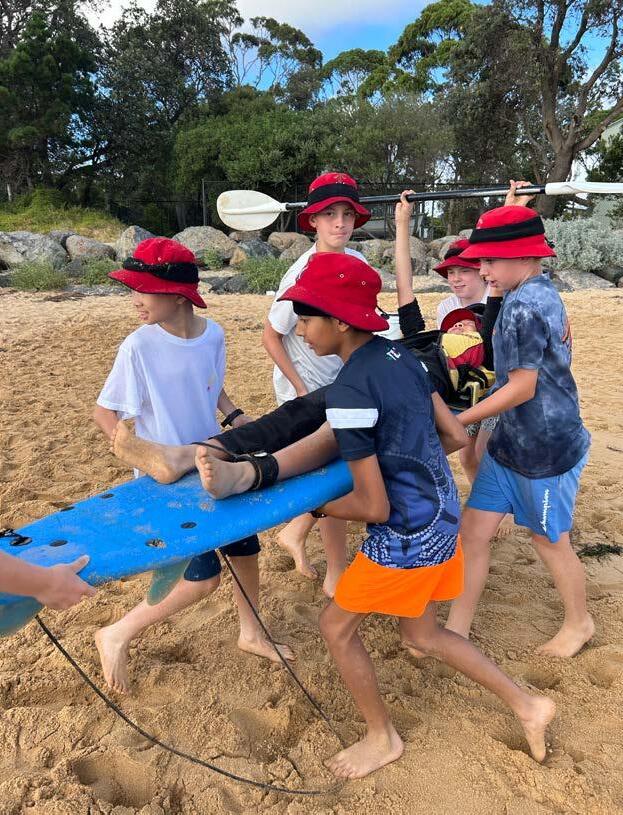

Through sharing their stories of resilience and persistence, facilitators helped students recognise the power of courageous conversation, and focused on tapping into those challenging topics that sit at the bottom of the iceberg and below the surface. Drawing on courage, vulnerability and a sense of humility, boys attempted to ‘take off the mask’; a reference used to describe our ability to be our true selves.
boys with many complex tasks, requiring them to apply persistence, problem-solving skills and artful reflection. Working collaboratively with peers, boys applied critical thinking and creativity skills as they solved a series of puzzles intertwined among many physical activities. Adding to the idea of challenge was an hour-long bike ride and an introduction to lawn bowls conducted by volunteers from the Phillip Island Bowls Club.
The boys’ ability to work together and draw on the strengths of one another, throughout these experiences, was a highlight, and evidence that experiences of challenge enhance the formation of character.
Arguably the most powerful and humbling experience of our Year 6 Camp came through our partnership with the Man Cave. In recognising that a shared understanding of character education works best when it’s deliberate, targeted and intentional, students were presented with a series of workshops that focused on tools for fostering healthy masculinity and positive mental health.
The first concept presented to the boys introduced them to the ‘iceberg theory’. This analogy referenced the notion that, as young men, communication plays a vital role in fostering positive wellbeing in self and others. Our boys were challenged with the idea that, as men, we can be comfortable engaging in safe conversation that sits at the top of an iceberg. Much of what is shared with others above the iceberg is relatively small talk, easy to bring up but lacking in meaning or purpose.
The six-hour intensive workshop provided by the Man Cave presented students and staff with many humbling experiences of vulnerability and acceptance. Our shared campfire experience acted as the perfect tool for reflection, providing students, staff and facilitators with the opportunity to share ‘shout outs’ to those individuals who modelled the essence of what it means to be a strong, courageous and healthy male in today’s society. Laying the foundations for the work conducted with the Man Cave was a shared belief that the building of character is deeply relational and ingrained in human connection.
To culminate our camp experience, students and staff engaged in a picturesque 8.5km hike around the Cape Woolamai nature reserve. A focus on relationships and appreciation of the beauty and goodness that exists within Mother Nature laid the foundations for our two-and-a-half-hour circuit. Students took much joy from opportunities to scan for wildlife while taking in the breathtaking views of the Phillip Island coastline. Although unbeknown to some, conversations between boys thrived and flourished along our journey, fostering a more profound sense of relationship and connection between peers.
As our hike came to a close, it was difficult not to feel a deep understanding of gratitude for how our Year 6 boys had ‘shown up’ across the camp experience. A willingness to ‘lean in’ and be present acted as valuable learning experiences for all boys, as they strove to understand the role of vulnerability and courage in leading themselves and serving others.
Although a camp experience focused on the holistic development of all boys remains in its infancy, the future remains bright as we recognise the need to develop young men who aspire to live a good life informed by moral code, and focused on a perspective that life isn't about me, nor you, but simply us.
LUKE DAFFY – YEAR 6 COORDINATOR AND CLASSROOM TEACHER
THE YEAR 6 CAMP ENGAGED BOYS IN AUTHENTIC EXPERIENCES OF SERVICE, LEADERSHIP AND COMMUNITY, INCLUDING SURVIVOR-THEMED ACTIVITIES ON THE COWES BEACHFRONT
SUITCASES FULL OF GIFTS FOR OUR PARTNER SCHOOL JUNIOR SCHOOL
BOOKS AND LETTERS FOR TIWI COLLEGE
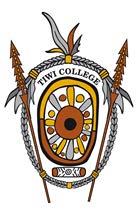
During Term 4 2023, Scotch’s Year 6 boys participated in a drive to collect books and stationery for students of Tiwi College, with which Scotch has an affiliation. The boys were inspired by a visit from author Tristan Bancks, who has a charity supporting children overseas with books.
For the first Peer Support session of the term, School Captain Dion Whitfield came to the Junior School, and spoke about his experiences at Tiwi College, introducing the idea of seeking some donations and writing letters to the Tiwi College students. I reached out to Mr Greg Hollis, the Tiwi College Principal, and together we decided it would be wonderful to collect items which could be donated at their school prizegiving and used throughout the community.
During the following Peer Support sessions, the Year 6 boys all wrote letters to the Tiwi students about their favourite things to do, the summer holidays, and why they chose to donate the items they did. The Junior School community gave generously and we were able to fill many suitcases with gifts.
Mr Hollis visited us in December and was humbled by the thoughtfulness and generosity of the Scotch community. It was a wonderful example of boys making a difference to the students of our partner school in the Tiwi Islands.
AMY ROGERS – HEAD OF LIBRARY (JUNIOR SCHOOL)

HABITS AND VALUES DEVELOPED AT SCOTCH LINGER WELL BEYOND THE CLASSROOM
As I wait outside the Head of Junior School’s office, the familiar grip of nerves tightens around me, reminiscent both of my days as a Principal Artist with Opera Australia, and indeed, my days as a student waiting in a similar spot after a misdeed. My awareness of the sensation is just irritatingly insightful enough to take some focus away from the task at hand, though it fails to offer any solace into the challenges of my present situation: interviewing for a teaching position at my alma mater.
Fast forward four months and here I am, fully re-immersed in the Scotch community, teaching my Year 5 class and reconnecting with the teachers I knew. As I observe my students' unwavering dedication and commitment through all their endeavours, it triggers a reflection on the invaluable lessons I gleaned from my time as a student at Scotch.
Foremost among these lessons was the notion that limitations exist only in theory and can be overcome with unwavering selfbelief and dedication. In Year 12, I vividly remember wrestling with doubts about whether an Indian could realistically pursue a career as an opera singer, only to find solace in the encouragement of my teachers, who urged me to dismantle any barriers to this goal with hard work and perseverance. This mindset propelled me through hundreds of performances with Opera Australia, each one a testament to the power of persistence.
Now, as I witness the same dedication and belief in my students, I'm struck by how these lessons continue to shape my teaching approach. It becomes evident that the habits and
values instilled in me at Scotch have served me well beyond the classroom, guiding me through the twists and turns of my professional journey, which I can now pay forward to a new generation of Scotch boys.
Reflecting on the nerves that gripped me before my job interview, I realise they stemmed from an innate understanding that returning to Scotch as a teacher would be a pivotal moment in my career. The depth of my investment in this opportunity to reconnect with Scotch as a teacher reflects the profound impact the Cardinal Thread continues to have, weaving its way through so many aspects of my life.
SHOUMENDU GANGULY-SCHORNIKOW (’06)

SHOUMENDU GANGULY-SCHORNIKOW WITH HIS YEAR 5 CLASS

MUSIC TEACHER INTERVIEW: SAMANTHA COLLINS
Sam embarked on her journey at Scotch precisely one year ago, stepping into the shoes of Alyssa Luketic during her maternity leave. Since her inaugural day in the Scotch Junior School Music Department, Sam has wholeheartedly embraced every opportunity to contribute to the community. With an unwavering enthusiasm to lend a hand and an exceptional proficiency in IT, she has
seamlessly integrated herself into various initiatives, such as the Music Leadership Team and Lower Primary Chapel Services.
Sam is an accomplished flute player. Friday mornings see her stationed in the Ian Roach Hall, where she eagerly assists the Concert Band, often with her flute in tow.
Outside of school, Sam extends her passion for music by tutoring with the National Boys’ Choir. Additionally, she indulges her creativity through sewing. Sam is mother to two children and Kobe the kelpie.
EMMA MACRAE
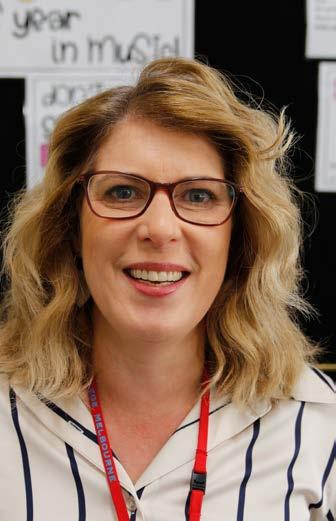
Graduate Diploma in Education. With two young children in tow, this took me several years to complete. Now having found my vocation, I can’t see myself in any other profession.
My goal was and is to ignite a love and passion for music in the students whom I teach, to inspire them to develop an ongoing love of music and help them to discover their gifts and interests. I hope that one day they will continue with a love and appreciation for music, whether that be playing an instrument or listening to music in whatever form or genre that happens to be.
What do you find most rewarding about teaching?
What is your role at Scotch College?
I am one of the Junior School music teachers. My role is to encourage and develop a passion for music in the boys. Our time together is full of singing and games, which are all in the name of facilitating the learning of musical concepts, which will assist them as they move through the school in their music endeavours beyond the classroom. Music is also a great activity to expand the neural pathways and assist with the cognitive and emotional development of boys.
What ignited your passion to teach?
I have wanted to be a teacher since I was in secondary school, and I have always loved music. I found my path to teaching later than some. I had many music teachers along my education journey who inspired me to become a music teacher.
After doing life for a while, getting married, having a family and pursuing other interests, I decided to head back to university. My passion for music and education finally fell into place. Taking a slightly non-traditional route, I studied for a Bachelor of Applied Music in Performance before completing my
I love to watch children learn and grow. I love the joy on their faces as they experience or discover new things – the ‘aha!’ moments are what I find the most rewarding. An example is how boys begin to understand the correlation between the words which are sung and how they can be written down. As all that falls into place, I enjoy watching their understanding develop and their confidence grow. This brings me joy.
What is your favourite corner of the school, and why?
My favourite corner of the school is the Music School – specifically the entry to the David Yu Foyer. I love standing in the entry: it is an amazing place to be. I love gazing at the mosaic floor from the balcony above, as well as closing my eyes and listening to all the different instrument sounds swirling around as they practise. As we say in the Junior School – ‘It fills my bucket.’
Many years from now, when you are no longer teaching, what is one of the Scotch memories you will reflect upon to warm your heart?
My favourite memories of being at Scotch to date are the chapel services. I love heading into the services and seeing the respect and reverence that the students display, as they take part by either sharing their learning, or responding with their singing. It has also been a lovely breath of fresh air to start and conclude the year with a chapel celebration involving the whole staff.


INTERVIEW WITH OUR NEW VICE PRINCIPALHEAD OF
SENIOR SCHOOL
Katrina Brennan sits down with Great Scot, sharing her background and views with the Scotch Family
As a new member of the Scotch Family, could you tell us a bit about your background in the lead-up to your appointment as Vice Principal - Head of Senior School?
After studying for an Arts/Law Degree at Monash University, I began my professional life as a lawyer, working in criminal and family law. After a period at the Commonwealth Administrative Appeals Tribunal, I focused on personal injury work.
I decided to pursue a career in education, as I felt a strong vocational calling towards classroom teaching. I have since had broad and varied experiences. My teaching has been in English, Literature and Legal Studies; working with Years 7-12 students and as a VCE assessor for English. I have taught and led in a variety of schools, including a large independent co-educational school, a country Catholic school and in the independent girls’ school sector.
I have held a range of leadership positions, including Head of House, Director of Middle School, Director of Senior School, Deputy Principal, Head of Staff, and most recently, Principal, prior to coming to Scotch. I have also completed a Master of Education in Educational Leadership from the University of Melbourne.
Now that the dust has settled a bit, what are your first impressions of our school?
I loved the grounds of Scotch from the moment I first came here, and this has only deepened; the gardens and ovals are breathtaking, and I particularly love the river setting with the gum trees, the Main Oval and the view to the Littlejohn Chapel.
I have had a warm welcome from the Scotch Family and have enjoyed meeting the students, staff, families, and of course many Old Boys and their families. Through these interactions, I can see and feel the love and passion for Scotch in this community. The sense of history and of being a part of something bigger than yourself, is tangible.
I am so impressed by what is offered to the students here: support, opportunities, and mentorship within the Scotch community, enabling our students to discover and develop their passions and interests, while enjoying the company of their friends.
How would you define some of your key pedagogical philosophies that underpin your everyday approach and interactions at school?
I take the responsibility of educating our boys very seriously and, as a parent, I understand the trust that families are bestowing upon us, by choosing Scotch to educate their sons. I have always sought to put students at the heart of my decisionmaking, and I believe that staff who love the students and love learning, do likewise.
I therefore lead with my heart, while maintaining and demanding high standards of myself and those around me. I have taken this philosophy into every class I have taught. If students know that you genuinely care about them as individuals, and believe that they can achieve, they will work hard and expect a lot of themselves.
I have been a relational teacher and have extended this philosophy into my leadership style – relationships with people lie at the centre of my work.
I try to face each day with positivity and optimism, understanding and compassion, and provide a safe, challenging and engaging working space, for students and staff alike.
Could you share with us some of the projects you are currently working on and are hoping to implement in the near future?
It is a very exciting time at Scotch College. I have been working with the Executive team and Council on the strategic plan, which sets a clear direction for Scotch College and encapsulates our values and vision, leaving scope for change and individuals’ input.
I am working with others in relation to the timetable revision, transition programs, the health and pastoral care structures, and programs in the Senior School and character education.
What roles would you like to see Scotch students play in their future lives?
This is a great question! I wish to see Scotch alumni flourish, living a well-rounded life, enjoying the pursuit of their interests and passions. Many will excel in their careers, and I am sure they will be involved in a variety of industries. I hope they are well connected with people and enjoy satisfying relationships, and that they serve their communities, in the tradition of Scotch College and its graduates.
In your opinion, what are some of the key advantages of a boys’ education?
I think a boys’ school is uniquely positioned to celebrate boys and cater to their needs. In boys’ schools, the staff are choosing to work with boys and can focus on supporting them to grow to be men of good character.
We can challenge and engage boys. They are surrounded by male role models and strong female teachers. We can teach boys free of distraction and without gender stereotypes, in terms of subject interest and co-curricular pursuits. We are able to focus on boys and guide the development of well rounded, healthy men who engage with the world in a positive way. There are many ways to be a boy at Scotch, and the diversity of interests and pursuits is a huge strength.
Would you mind sharing with us some of your key passions or hobbies?
I love travelling and have been fortunate enough to do a lot of it in my life. I look forward to continuing to explore the world. It is wonderful to plan an itinerary and see it come to life, travelling with family and friends. I love the arts; I am a regular theatre-goer, a huge reader, enjoy live music and visiting art galleries and museums.
I love relaxing in the outdoors and in nature, at national parks or the beach, and swimming in the sea. I love food, wine and good friends and conversation. Above all else, I love my family, including my husband and son, and our beautiful chocolate labrador, Marz.
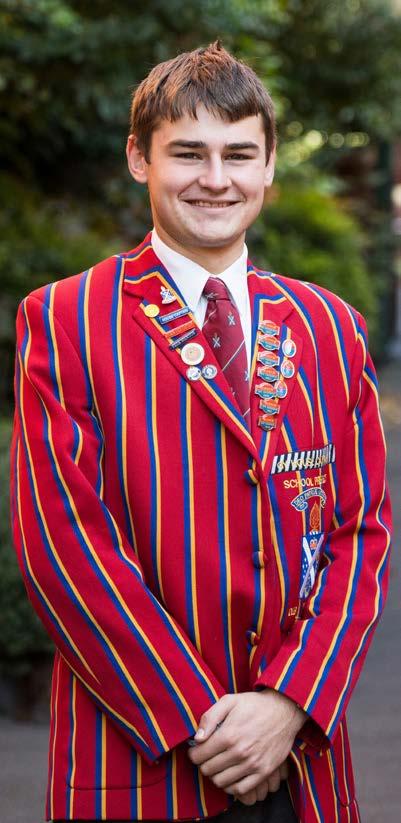
TAKE PRIDE IN BEING A MEMBER OF THE SCOTCH FAMILY
For many, welcome back to your school. I hope that your holidays were enjoyable, and a good time to relax and recharge the batteries for the year ahead; but importantly, especially for the Year 12s,
EARLY IN THE SCHOOL YEAR, THE SCHOOL CAPTAIN, THE SCHOOL AT ASSEMBLIES. HERE ARE EXTRACTS
I hope it was a productive break as well. For those who are joining us this year, who had the privilege of walking through the Monash Gates for the first time – welcome to our Scotch community, the Scotch Family as we lovingly refer to it.
To the Year 12s – good luck for the year ahead. VCE is not an easy time, nor is it meant to be. It is a daunting task to look ahead to: you will face adversity, you will stumble on the way, and many of you will feel stuck. My advice – pick yourself up, dust yourself off, and keep working hard; consistency is key. Most importantly, Year 12 is more than just books and study, so I urge you to make the most of your final year at Scotch. Enjoy the little things, the things you take for granted here; those are the things you will miss the most – singing in Mem Hall, being a part of the Red Army, sport with your mates on Saturdays. Enjoy them all.
Over the holidays, when thinking about returning here, to a school in which I have the honour and privilege of being School Captain, I thought ahead and wondered, what will this year look like? Will it be the same? I’m sure, in many ways our experiences here through the year will be like last year, and like the years that have gone before that. Undoubtedly, our classes will continue, our orchestra will keep playing brilliantly, Saturdays will be filled with the sounds of friendly sporting competitions –and, of course, Selby Smith and Forbes will bring up the rear in the Cock House.
But I ask all of you, how will you make this year different? What will you change? Will you finally take part in the 24-Hour Hike or join the debating team? Maybe you will start playing the guitar or find water polo is the sport for you?
Boys, now is the time for self-discovery, the time for personal development. Take every opportunity, embrace every challenge, as it is through adversity, through change, through new experiences that we reveal our true character. Whether in the classroom, on the Main Oval or in the James Forbes Academy, let us all push our boundaries, strive to be our best selves, and emerge from our Scotch journeys stronger and wiser, as resilient, respectful young men.
As we embark on journeys to find ourselves, let us not forget the importance of contributing to things that are bigger than ourselves as individuals. Scotch has a rich tradition of instilling in all a sense of responsibility, to our school, to each other and to our community. We are more than just individuals; we are part of something much bigger. My challenge to you all is to seek out ways in which you individually, through your interests and passions, can make a positive impact on our world and seek out ways to uplift those around you.
Throughout the year, I urge you to be beacons of integrity, of leadership and of kindness. Inspire those around you, support those in need, so together we can build and create a culture of empathy, understanding and inclusivity.
In the words of Winston Churchill, ‘we make a living by what we get, but we make a life by what we give’. Let us all strive to make our lives meaningful by giving back to our school, to our community, and to the support networks we rely on. As we navigate through the twists and turns of the year ahead, through the challenges and triumphs we will face, let us all do so with a spirit of unity, purpose and a shared commitment to the greater good, the shared commitment to something far bigger than you or me.
Scotch is more than a school. It is more than just a place of learning; it is a family. Our traditions and our past tie in to our present and our future. As we stand on the shoulders of the boys that have gone before us, let us also provide shoulders to the boys around us and for those who come after us. That is the essence of family. We all work together, to foster growth, to make our family, our school, a better place.
Be proud of our school. Be proud of its past and look to the future with anticipation and excitement. Be proud to be a Scotchie. Be proud to be a part of the family.
And who knows, Mr Karakoussis may finally lead Selby Smith to a top six finish, but I wouldn’t hold my breath.
Thank you all, and I look forward to seeing a lot more of you over this coming year.
MATTHEW CALLAGHAN – SCHOOL CAPTAIN
MATTHEW CALLAGHAN, AND THE VICE CAPTAIN, GEOFF LIU, ADDRESSED FROM THEIR SPEECHES.
FEARLESS, AS YOU STRIVE TO BE THE BEST YOU CAN AS A SCOTCHIE

Welcome back to Scotch College for 2024. In particular, I’d like to extend a warm welcome on behalf of the whole Scotch Family to our new boys and staff, who I am sure will thrive through all that our school has to offer. I also hope that you will join me in receiving Matthew Callaghan with open arms as our School Captain for this year. Having known Matt for many years now, I have no doubt that he will lead the school with poise and purpose.
It has been five years since I first hopped off the tram and walked through the Monash Gates in 2019, so this is indeed my last year at the school. In light of this, while writing this speech over the summer, I did a little self-reflection to think about where I have ended up. If I had a chance to speak to myself from five years ago, what would I have said?
I still remember the nebula of emotions I felt as I stood in this very Quad for the first time, listening to this very speech by the then Vice Captain. I was disoriented, nervous, worried – the list goes on. Rightfully so, I think, because Scotch was and is a huge environment with an infinite permutation of pathways to choose from.
Yet, in many ways, the vastness and unending possibilities of our school are the very things that make it special. It would be challenging to find another place with the same variety of opportunities in the arts, sports and academics as Scotch, so I was naturally hesitant in taking my first steps.
To that, I say that you are always in control of your next step, even if your previous ones did not turn out the way you had imagined. If you choose to partake in a school play but find that it doesn’t suit you, never let that discourage you from joining the debating team. Maybe your summer sport felt like a waste of time – why not swap to a new one for the next season? It is these individual steps that one by one contribute towards your own, unique identity as a Scotch boy and, eventually, a young man
And how lucky we are to be in a place where we are supported at every twist and turn along this road – not only in the physical through such beautiful schoolgrounds and wondrous facilities, but also in the relational through our friends and teachers.
Here, I’d like to emphasise the importance of acquainting yourselves with your teachers. They are the stalwarts of your Scotch odyssey and will guide you in your journey. We are blessed with teachers whose passion for their craft is unparalleled, and emblematic of the enthusiasm and Scotch spirit that we strive for. Not to mention the importance of having supportive friends, who I am sure that you will settle in with in the coming weeks and months, and with whom you will live through a myriad of experiences and forge countless unforgettable memories.
So, instead of telling what the 2019 version of me did wrong or giving him a list of checkpoints and achievement deadlines to meet, I would ask that he appreciate the plethora of opportunities from which he can carve his own path. I would ask that he cherish his once-in-a-lifetime opportunity to connect with the wonderful people whom I now call my Scotch Family, which he can always rely on, no matter which step he will take next. And finally, I would ask that he remains fearless in becoming the best version of a Scotchie that he can be.
Above all else, enjoy your time here –because as the old German proverb goes: everything has an end; only the sausage has two.
I look forward to seeing you all around the school – please feel free to have a chat with any of Matt, the prefects and me, and in closing, my very best wishes to you for your own 2024.
GEOFF LIU – SCHOOL VICE CAPTAIN

THE TRAIL BLAZERS: IN PURSUIT OF CARDINAL, GOLD, AND BLUE


In the vibrant fabric of school life, events like the fundraising 24 Hour Hike at Scotch College transcend mere physical challenges; they serve as catalysts for character development and community cohesion, showcase physical endurance, and illuminate the deeper threads of character and community woven into our school ethos. I recently participated in one and found it was an event like no other.
It was filled with camaraderie and friendship. As the boys trekked through the challenging terrain, a spirit of healthy competition fuelled their determination to hike as far as possible within the allotted time. Some boys clocked an astonishing 107 kilometres over the 24 hours.
Personally, and embarrassingly, I only managed to hike 18 kilometres in between my rostered duties.
As someone new to Scotch, I witnessed at least three heartwarming moments during the event. First, I witnessed the runner-up graciously congratulating the winner, which encapsulated the essence of sportsmanship and unity, highlighting the supportive atmosphere of the event.
Second was the involvement of upper-year-level boys who volunteered to support their younger peers. They selflessly took on 24-hour kitchen duties, administrative tasks and other support roles, contributing to the smooth running of the event. Their willingness to give up their time (including their sleep time – invaluable for teenage boys!) to assist their fellow students exemplifies the strong sense of community and support fostered at Scotch.
The third moment occurred when I overheard a boy offering to carry another to ensure they completed the final kilometres to achieve their target. I am unsure if that gracious offer was ever accepted, but it again exemplifies peers' unwavering support and encouragement during those adversities.
As my ankles were recovering in the days after the event, I reflected on the experience and recalled our Principal’s remark earlier this year about the standards symbolised by our school colours – cardinal, gold and blue. The pursuit of Beauty, encapsulated by the cardinal, lies at the heart of Scotch's ethos. Beyond superficiality, beauty resonates in the bonds forged amid the challenges and triumphs of communal activities, such as the 24 Hour Hike.
This transformative aspect of communal experiences is supported by Robinson and Aronica's (2009) research, which
THE 2024 24-HOUR HIKE WAS FILLED WITH CAMARADERIE AND FRIENDSHIP

underscores Scotch's commitment to nurturing a culture where boys discover and cultivate their passions, fostering a deeper appreciation for the beauty of human connection and shared endeavours.
In alignment with beauty, Scotch upholds the values of Goodness , symbolised by the gold. Goodness manifests in the selflessness displayed by students who volunteer to support their peers during the 24 Hour Hike. Duckworth (2016) explores the character trait of grit, emphasising its role in fostering resilience and long-term success. Through acts of kindness and solidarity, our students embody the golden threads of compassion that bind our school community, fostering a culture of empathy and altruism.
Central to Scotch's mission is the pursuit of Truth, represented by the blue. Marsh and Kleitman's (2003) research highlights the correlation between communal engagement and academic outcomes. This integration of empirical evidence with philosophical inquiry underscores Scotch's dedication to nurturing well-rounded individuals who embody the values of integrity, curiosity, and lifelong learning. Additionally, Seligman's (2011) exploration of positive psychology also reinforces the importance of truth-seeking and authentic engagement in fostering wellbeing and academic success.
At the heart of this reflection lies the profound understanding that human ties within our community serve as the crucible wherein character is forged. Beyond the surface, beyond academic success or physical fitness, events like the 24 Hour Hike imbue students with intangible attributes such as tenacity, resilience and empathy.
By engaging our students in experiences that transcend the classroom through the pursuit of beauty, goodness, and truth, our students not only excel academically but also emerge as compassionate, resilient individuals equipped to navigate life's challenges with integrity and purpose. As Scotch continues to embrace these core values, it reaffirms our commitment to fostering a culture of excellence, empathy, and lifelong learning.
Participating in the 24 Hour Hike was a privilege and a truly rewarding experience. It has left a lasting impression on me, and should I be given the opportunity, I am eager to join another hike next year.
DR RUBEN SETIAWAN, INDONESIAN TEACHER/ACTING HEAD OF INDONESIAN
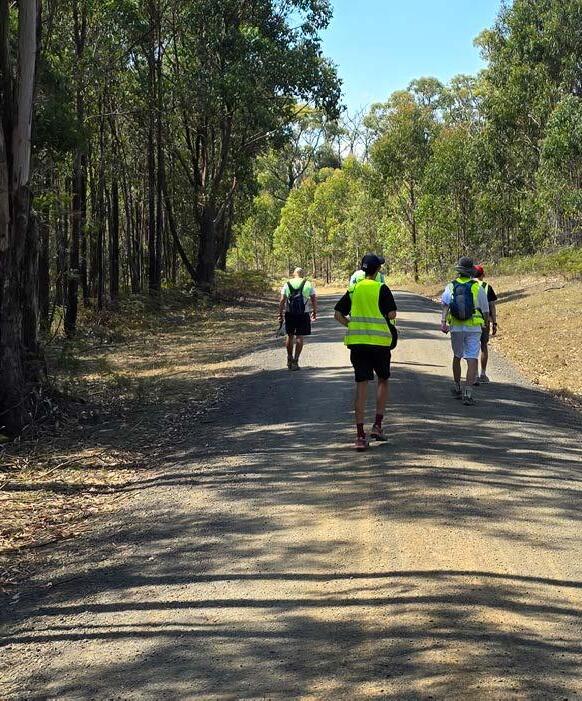
24 HOUR HIKE EMBODIES STANDARDS SYMBOLISED BY OUR SCHOOL COLOURS
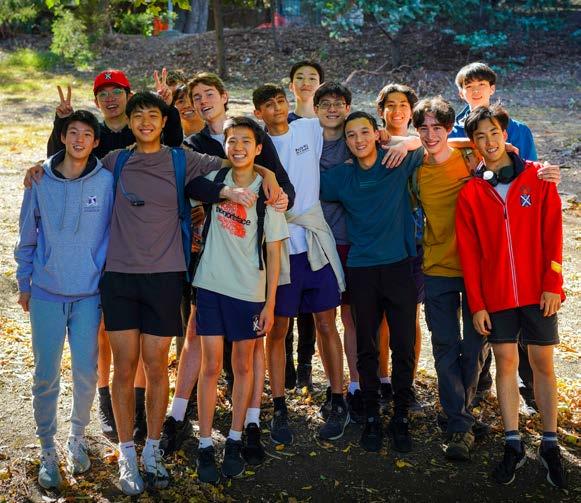
References:
Duckworth, A. (2016). Grit: The Power of Passion and Perseverance. Scribner.
Marsh, H. W., & Kleitman, S. (2003). School athletic participation: Mostly gain with little pain. Journal of Sport & Exercise Psychology, 25(2), 205-228.
Robinson, K., & Aronica, L. (2009). The Element: How Finding Your Passion Changes Everything. Penguin Books. Seligman, M. E. P. (2011). Flourish: A Visionary New Understanding of Happiness and Well-being. Atria Paperback.
THE CLASS OF 2023

OUTSTANDING VCE AND ATAR RESULTS
The congratulations of all in the Scotch community go to the young men of the Class of 2023 for such outstanding VCE and ATAR results.
The Class of 2023 concluded their schooling days with style and maturity. Academically, they produced a set of results that demonstrated qualities such as perseverance, hard work, determination, and great scholarship. In addition to their efforts on the sporting field, in music, drama or participating in any number of other events and activities, the Class of 2023 made a significant contribution to their school and the Scotch Family.
As a genuinely non-selective school, these results reflect a truly remarkable culture of learning at Scotch. As Principal, I am thankful for the professionalism of our teaching and support and operational staff. Thank you for your ethic of care and excellence that you have demonstrated in supporting all boys throughout their final school years.
As the dust settles and the many wonderful stories of academic success have been told, always remember that who
you are as men, as sons, brothers, and friends, will always ultimately be your measure of true success. With these results
behind you, strive to be men of good character who do good in our world. Congratulations and God bless.
2023 VCE AND ATAR RESULTS *
Congratulations to the class of 2023 for an outstanding set of VCE and ATAR results.
Five boys; Ronan Ahl, Jordan Chi, Justin Nguyen, Henry Rogers and Edward Song, received an ATAR of 99.95, and are, therefore, the duces of Scotch College for 2023
Six boys (2.6 per cent of the cohort) obtained an ATAR of 99.90 or more (top 0.1 per cent in the population)
21 boys (9.2 per cent of the cohort) obtained an ATAR of 99.50 or more (top 0.5 per cent in the population)
27 boys (11.8 per cent of the cohort) obtained an ATAR of 99 or more (top 1 per cent in the population)
41 boys (17.9 per cent of the cohort) obtained an ATAR of
ACHIEVED WITH STYLE AND MATURITY
98 or more (top 2 per cent in the population)
70 boys (30.6 per cent of the cohort) obtained an ATAR of 95 or more (top 5 per cent in the population)
112 boys (48.9 per cent of the cohort) obtained an ATAR of 90 or more (top 10 per cent in the population)
163 boys (71.2 per cent of the cohort) obtained an ATAR of 80 or more (top 20 per cent in the population)
The median ATAR was 89.85
Early measures of ‘value add’, comparing ability testing data from earlier years and ATAR scores, indicate a strong performance from this cohort.
Other results:
There were 21 ‘perfect’ study scores of 50 across 10 VCE subjects.
Twelve Year 12 boys obtained study scores of 50, including: Ronan Ahl (Chemistry), Jordan Chi (Specialist Mathematics, Latin), Thomas Gallacher (English Language), Edward Karunaratne (Systems Engineering), Jay Landau (English),
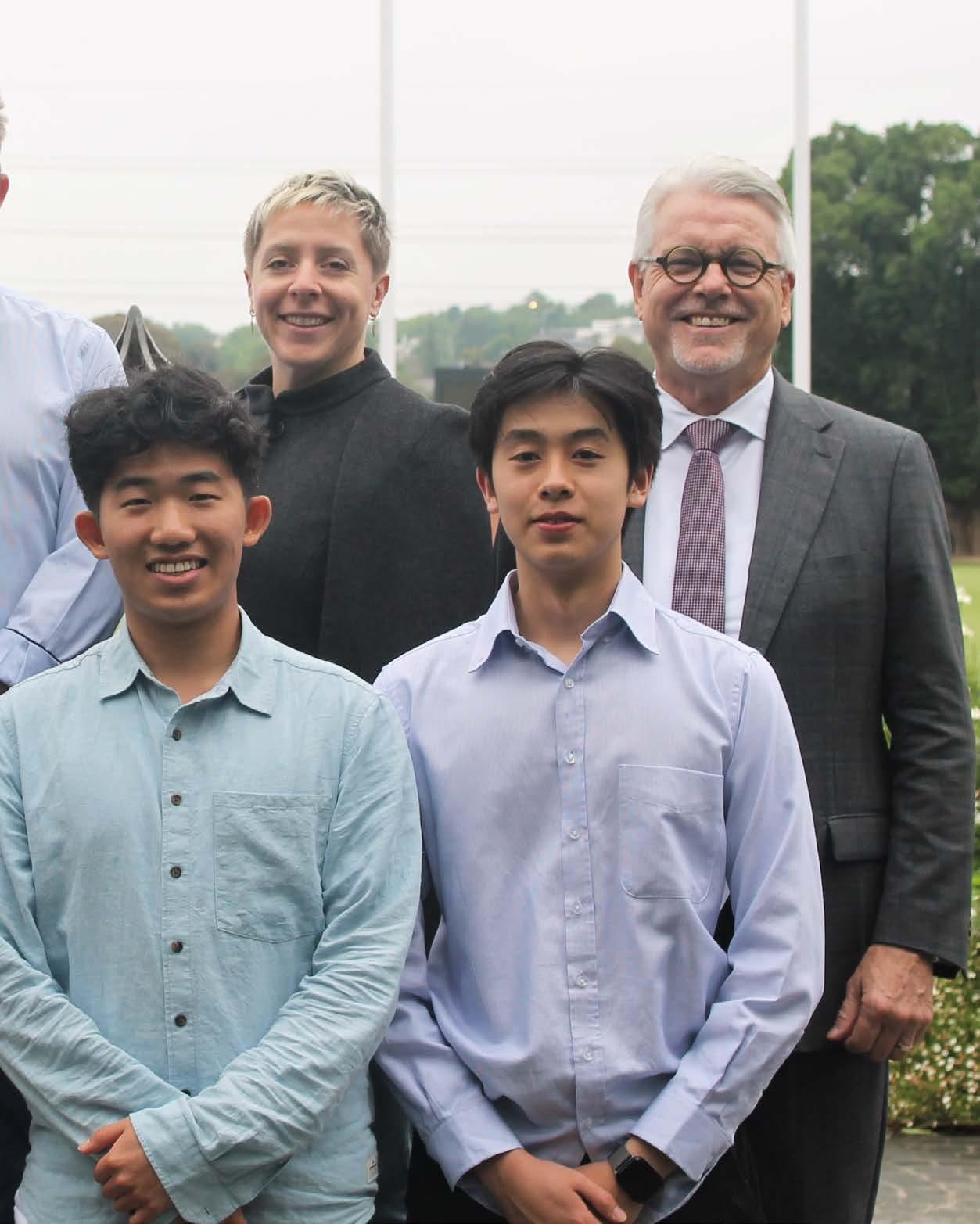
Zichen Liang (English as an Additional Language), Dhanika Nanayakkara (Accounting), Justin Nguyen (English), Henry Rogers (English, Literature), Ruicheng Wang (English).
Nine Year 11 boys obtained study scores of 50 including Jiamu Li (Mathematical Methods), Christopher Lim (Mathematical Methods), Adrian Lin (Mathematical Methods), Alexander Lumsden (Mathematical Methods), Marcus Peter (Mathematical Methods), Zhengcheng Tang (Mathematical Methods), Matthew Wan (Mathematical Methods), Edward Wang (Mathematical Methods).
* Note: the population referred to in the ATAR statistics above is the population of the statewide Year 7 cohort from 2018, including those students who moved or left school before Year 12.
DR SCOTT MARSH – PRINCIPAL
STAFF, LEFT TO RIGHT: PETER KARAKOUSSIS (HEAD OF SELBY SMITH HOUSE/MATHS), ED SMITHERS (HEAD OF LITTLEJOHN HOUSE/ COMMERCE), NATALKA KOSTRABY (HEAD OF COMMERCE), DR SCOTT MARSH (PRINCIPAL) STUDENTS, LEFT TO RIGHT:
JUSTIN NGUYEN, HENRY ROGERS, JORDAN CHI, EDWARD SONG (ABSENT: RONAN AHL)

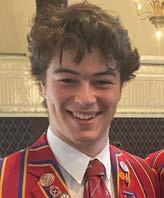
TWO CLASS OF 2023 BOYS SHOWCASE THEIR WORK AT TOP DESIGNS


GREAT CREATIVITY IN SYSTEMS ENGINEERING
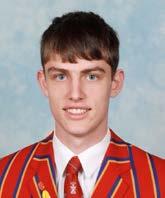


Congratulations to Jeremy Gray and Clancy Wilson of Scotch’s Class of 2023, who have been selected to exhibit their VCE Systems Engineering works in Top Designs 2024 at the Melbourne Museum.
Each year as part of Top Designs, VCAA showcases a small range of works from various VCE Unit 3/4 subjects. Clancy’s School-assessed Task (SAT) project, titled ‘Automated Truck Unloader’ is a system for automatically loading and unloading trucks at a warehouse. The final working prototype was manufactured from 3D-printed parts. The programmed prototype navigated around a test area to demonstrate the ability to move a pallet from storage to a place where it could be loaded onto a truck, and the ability for a pallet to be unloaded from a truck and moved to a storage area.
Clancy is studying Engineering at Monash University, with the aim of a career in engineering primarily around robotics.
Jeremy’s project is titled ‘Magnus Effect Wind Turbine’. As part of the SAT component, Jeremy created a prototype of a wind turbine which used the Magnus effect instead of traditional airfoils. Jeremy enjoyed researching the technology involved and the potential applications to residential settings.
This year Jeremy is studying for a Bachelor of Design at the University of Melbourne majoring in Mechanical Engineering Systems. He hopes to have a career in mechanical engineering, particularly in the field of transport.
Top Designs is an annual exhibition coordinated by the Victorian Curriculum and Assessment Authority in partnership with Museums Victoria, showcasing outstanding design works made by VCE and VCE VET students from schools across the state. This year, only 92 works were selected for the exhibition from more than 1000 applications.
Selected works exemplify the innovation, skill and creativity that can be achieved within the Victorian Curriculum.
Top Designs is running from Saturday 23 March until Sunday 14 July at the Melbourne Museum in Carlton.
Top Designs photos credit: Nicole Cleary, courtesy of the Victorian Curriculum and Assessment Authority.
JULIA MORRISON – HEAD OF DESIGN AND TECHNOLOGY
JEREMY GRAY’S ‘MAGNUS EFFECT WIND TURBINE’
CLANCY WILSON’S ‘AUTOMATIC TRUCK UNLOADER’
NEW BOAT HONOURS FORMER COUNCIL CHAIRMAN
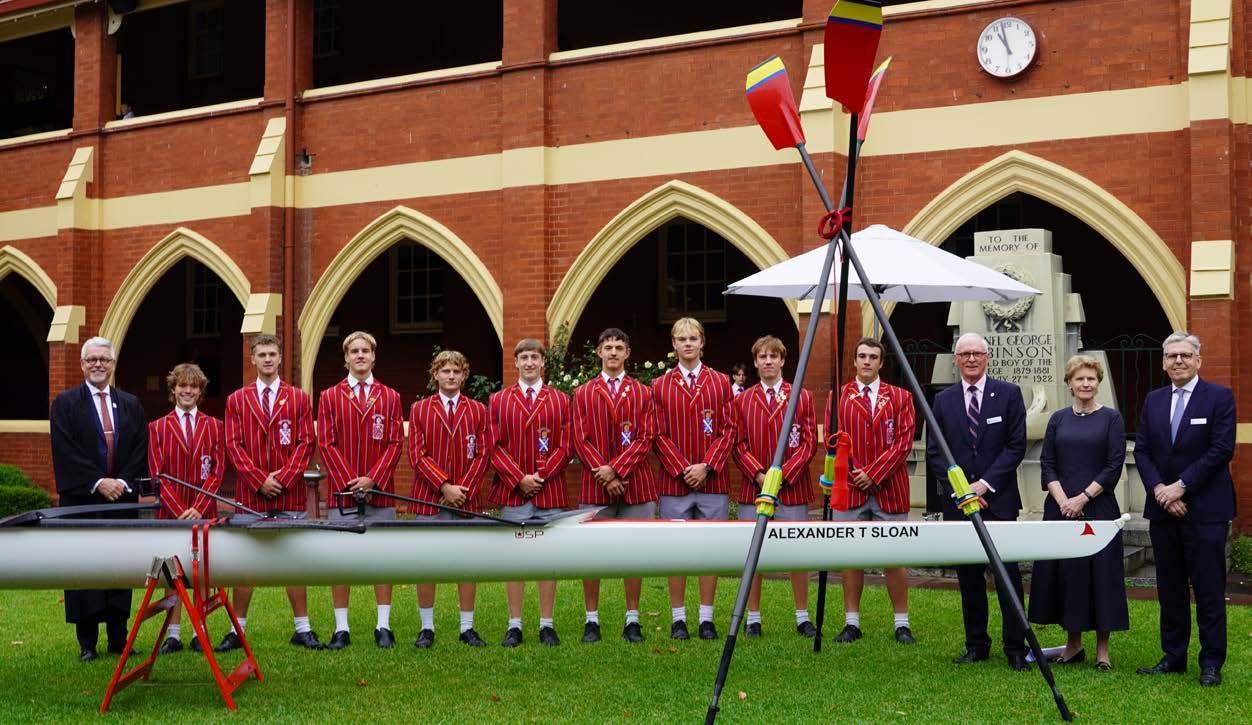

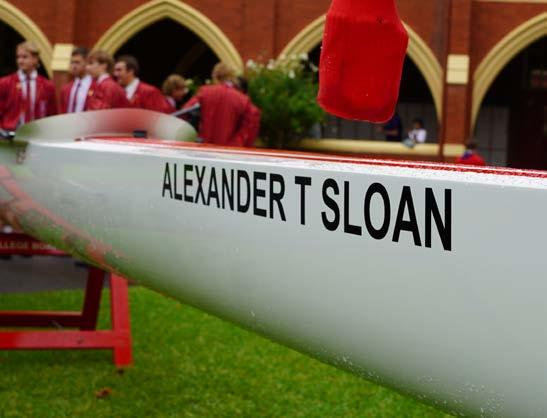
The christening of a boat is always a special occasion at Scotch, with staff and students gathering around to celebrate and contemplate the plethora of competitions and rowers the boat will take on in the future. However, on Thursday 14 March, the event was made even more special, since the boat was named for none other than the former School Council Chairman, Alex Sloan (’71), whose contributions to rowing at Scotch have simply been quite scintillating. Alexander Thomas Sloan attended Scotch from 1965 to 1971, and he was a 1971 School Prefect and Captain of Boats. He was also a member of the premiership-winning 1970 1st XVIII.
Alex’s rowing journey at Scotch began in the 1967 under 15 3rd IV. He progressed through the 1968 10th VIII and the 1969 4th VIII, before rowing in seven-seat of both the 1970 and 1971 1st VIIIs.
After leaving Scotch he rowed in the Victorian eight in the interstate King’s Cup competition from 1977 to 1981, winning in 1979 and 1980. Alex represented Australia in the coxless pair at the 1979 World Championships along with fellow Scotchie, Stephen Shirrefs (’72).
The Sloan family has a long Scotch rowing pedigree. Alex’s father Bruce (’32) rowed in the 1932 and 1933 1st VIIIs. Alex’s uncle Alex (’23) rowed in the 1923 and 1924 1st VIIIs and his uncle John (’24) rowed in the 1924 1st VIII.
The Sloan connection to Scotch rowing began with Alex’s grandfather, Alexander Barclay Sloan, who coached the Scotch 1st crew 20 times between 1898 and 1925, winning seven times, including the re-row of the only dead heat in a Head of the River final, in 1919, Scotch beat Xavier in the re-row.
After the traditional school Assembly during which he received a rousing round of applause, accompanied by his wife, Karen Wood, who actually christened the boat with the traditional bottle of champagne, Alex was cheered by the crowd and engaged in conversations with those wanting to gain some savoir-faire and wisdom from his very rich experience.
TOP PHOTO: LEFT TO RIGHT – THE PRINCIPAL, DR SCOTT MARSH, THE 1ST CREW, ALEX SLOAN (’71), KAREN WOOD, SCHOOL COUNCIL CHAIRMAN, HAMISH TADGELL (’85) MIDDLE PHOTO: KAREN WOOD WITH ALEX SLOAN (’71)

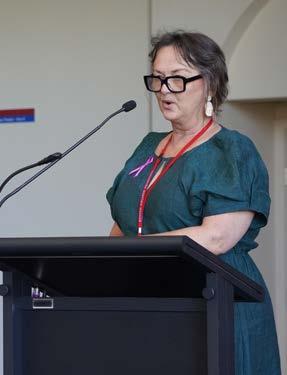
CELEBRATING THE CONTRIBUTIONS OF THE WOMEN OF SCOTCH
WE HAVE MUCH TO BE PROUD OF, AND TO CELEBRATE TOGETHER
This is an edited transcript of a speech by Katrina Brennan, Vice Principal-Head of Senior School, at Scotch on International Women’s Day, Friday 8 March.
International Women’s Day is a celebration of women and the accomplishments of women in history, and at the current time. It is also, though, a recognition that there is much to be done to achieve equality and inclusion.
I love that we can celebrate today. Yet there is so much more to accomplish.
Women over 55 are the biggest homeless group in Australia, because many have sacrificed income and superannuation for retirement, through raising children –some on their own after separation and divorce.
The second biggest group of homeless in Australia is women and children fleeing family violence. The escalation of family violence in Australia hints to a culture that is perhaps hidden from sight, but exists nonetheless; and I believe we need to speak openly about this with ourselves and within our school.
Internationally, many girls and women are not given access to an education,
health care, choices over whom they marry and when, or reproductive rights. In times of conflict, rape is routinely used as a weapon of war. These are bitter, hard truths but ones we can’t ignore. It is important we can answer young men when they question why we need to recognise International Women’s Day.
But this morning we do celebrate together – because at Scotch we have much to be proud of together.
We have long had women who have worked at Scotch or have been part of its community, who have made extraordinary contributions to this and other communities. Female staff have contributed to the education of Scotch boys over many years. We now have women in significant leadership roles. And we have men who are strong allies of women, and who are joining in this opportunity to educate the students of Scotch about the importance of women’s issues.
Australia is a country that affords women opportunities to be educated, and to have access to health care, financial support and services.
We are maturing as a nation, to one that celebrates women’s achievements and accolades. Who would have imagined the
phenomenon of the Matildas would have been possible even 10 years ago? To have our nation enthralled as it was by the skill, athleticism and sportsmanship of a group of women was really breathtaking; for me it represented a huge shift – watching young men enjoy the game, follow the sport, and gain respect and admiration for women in the athletic field is truly a sign of progress.
The normalisation of men fathering, being good at it and loving it, shows that the shift in gender norms is something we are united in. Men wanting to be tender, gentle and nurturing is a wave of progress, that I feel so proud to view in the young men of today. We have many wonderful men on staff who exemplify this each day.
So as the women of Scotch are celebrated today, I also celebrate the allies of women who are here at Scotch, who stand up for the women in their lives, and for all women – we are in this together.
ABOVE: SCOTCH OPERATIONAL AND SUPPORT STAFF
MEMBERS: ATHANASIA PAPPAS, SOPHIE MUSCI, CHRISTINE COX, SARAH HOSKIN AND ANNA SANTUCCI.
RIGHT: VICE PRINCIPAL- HEAD OF SENIOR SCHOOL KATRINA
BRENNAN SPEAKS ON INTERNATIONAL WOMEN’S DAY
FUTURE PATHWAYS
ON TRACK TO AN UNDERSTANDING OF SELF
'The best way to predict the future is to create it.'- Abraham Lincoln
One of the most interesting and perhaps challenging parts of being true to yourself is really working out who you are; that is also in many ways the key to unlocking what the future you want to create for yourself looks like. Part of the journey of adolescence is this forming of self; identifying passions, values, forming a moral compass and trying new things to see how they fit this growing sense of self.
Scotch's Future Pathways Program allows boys the time and space to articulate this developing self, and exploring it through profiling and other tools is designed to support this journey to goodness and truth. We also know that the strongest influence on this understanding of self is the way that parents and the world around them promote certain key characteristics, values and interests/ activities.
This is why regular conversations around their future are so important at home, so that boys can begin to map and match their values with their ambitions, their passions with a course or possible area of work, and begin to solidify their understanding of self. Some of the ways
we can support boys in this is by promoting SMART goal-setting and life mapping.
What are SMART goals?
There are five criteria that SMART goals should meet.
These are:
1. Specific: Clearly defined objectives that spell out what you aim to achieve.
2. Measurable: Quantifiable goals that allow you to track your progress.
3. Attainable: Goals that are challenging yet achievable, ensuring you're not setting yourself up for failure.

4. Relevant: Objectives that align with your broader aims and values.
5. Time-bound: Goals that come with a deadline and promote effective time management.
The best SMART goals are those that are closely aligned with your own broader aims, serving as stepping stones towards your ultimate goal. They should challenge you while still being achievable. These goals should be easily measurable and manageable. For example, if career development in hospitality is a priority, an excellent SMART goal could be 'to complete an responsible service of alcohol course within the next six months.'
Once you have set some SMART goals around your interests, studies and values, you may like to map them as a visual representation of all these parts of your life coming together; known as a ‘life map’. If you aren’t sure where to start, brainstorm the things that are most important to you in your future and the things that are worrying you. How can you use your goals to help you create a future you are excited about and motivated to achieve?
What is life mapping?
Life mapping is a holistic approach to personal development, encompassing various aspects of life, including career, relationships, health, finances, and personal growth. By creating a visual representation of your aspirations and goals, you can gain clarity and focus on what truly matters to you.
A life map provides a tangible representation of your goals, making it

easier to track your progress and hold yourself accountable. Seeing your achievements mapped out can boost your motivation and encourage you to persevere, even during challenging times.
Life map examples
Pyramid: Your ultimate goal is at the apex; the steps towards that goal start at the base and work upwards.
Timeline: You picture yourself attaining your goals through the years, one after another.
Five-pointed star: Your highest goal is at the middle point of the star, the foundations are the two lower points, and secondary goals are the two higher points.
Circle: Your life is cut into different segments, each its own goal.
Tree: The roots, trunk, branches and fruits symbolise the birth, growth and realisation of your dreams.
When creating your life map, it’s crucial to be honest with yourself about your goals, strengths, and weaknesses. Acknowledge your limitations and don’t set unrealistic expectations. By being truthful, you’ll create a more accurate and achievable life map.
OPHELIA HOPKINS - HEAD OF FUTURE PATHWAYS
RICHLY REWARDING EXPERIENCES FOR OUR YOUNG MIDDLE SCHOOL BOYS
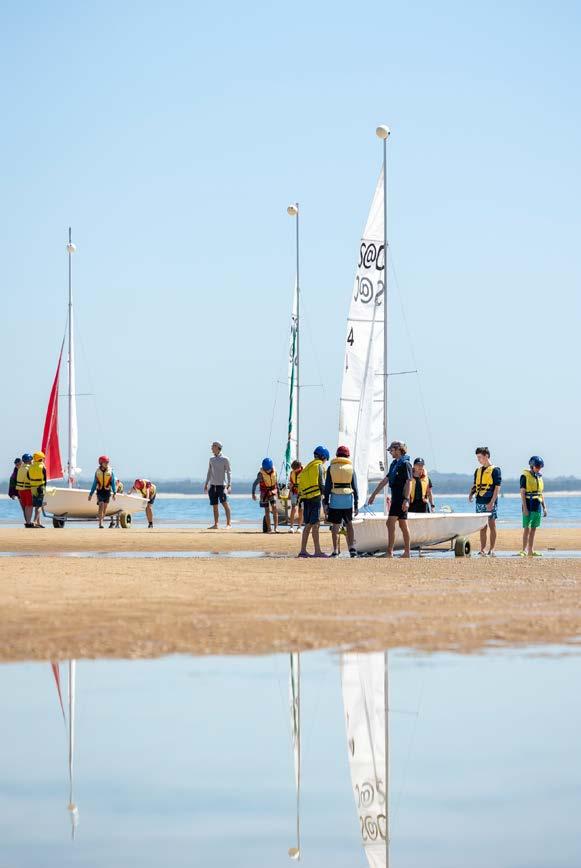
YEAR 7 CAMPS: EXPLORATION, CAMARADERIE AND EXCITEMENT

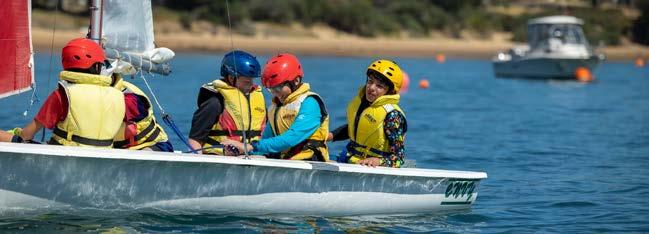
This year's edition of the annual Year 7 Camp at Cowes proved to be another resounding success, brimming with exploration, camaraderie, and excitement.
Over the course of four consecutive weeks, each Monday morning we bid farewell to two form groups as they ventured to Phillip Island for a week-long journey of discovery, education, and enjoyment.
Year 7 Camp is purposefully designed to foster stronger bonds among boys and their teachers through engaging activities and meaningful discussions, both of which were abundantly present.
Witnessing boys step beyond their comfort zones to take part in activities such as sailing, snorkelling and boogie boarding was truly encouraging. Some of the sailing was particularly impressive, with boys self-navigating around a course directly in front of the property, tacking and jibing with playful dolphins in tow.
Many boys learned a lot about indigenous flora and fauna during visits to the Koala Sanctuary, rock rambling, and the inspiring shearwater bird walk along the nesting cliffs of Cape Woolamai at dusk. The days were long and warm, filled with fun, games and laughter.
Form teachers took advantage of the time spent together, whether walking up and down the beach or playing mini-golf, to get to know the boys better, discuss expectations, set standards and emphasise the importance of mutual respect.
Without exception, the Year 7 Camps proved to be immensely rewarding experiences, leaving boys returning home tired but happy, and perhaps with a heightened understanding and appreciation of their peers and school.
FORREST FU provided his impressions of the Year 7 camp:
‘Year 7 began with some loose friendships and two dozen unfamiliar people in a form taking lessons together. However, camp changed all of that, helping us build many new relationships with our fellow Year 7s and even the supportive teachers.
The spectacular environment at Cowes built long-lasting memories, from staying up late in the generously-sized cabins to meeting huge stingrays while snorkelling.
One experience that I won’t forget is sailing on a day of perfect weather with just one problem: no wind. The distant land on every side of us corresponded to Phillip Island, the Mornington Peninsula and French Island. Because of the lack of propulsion, my boat of five boys had to resort to paddling with our hands.
A fin emerged out of the sparkling water and our arms shot back into the boat, shocked by the appearance of such a large fish in shallow waters. To our immense relief, it wasn’t a fish at all. The friendly dolphin followed us for quite a while before we returned to shore, drenched and exhausted.
That was just one of the numerous highlights that made camp at Cowes an unforgettable week of my life.’
ROB BLACKMORE – DEPUTY HEAD OF MIDDLE SCHOOL
MIDDLE SCHOOL BOYS WENT BEYOND THEIR COMFORT ZONES IN SAILING, SNORKELLING AND BOOGIEBOARDING
IAN
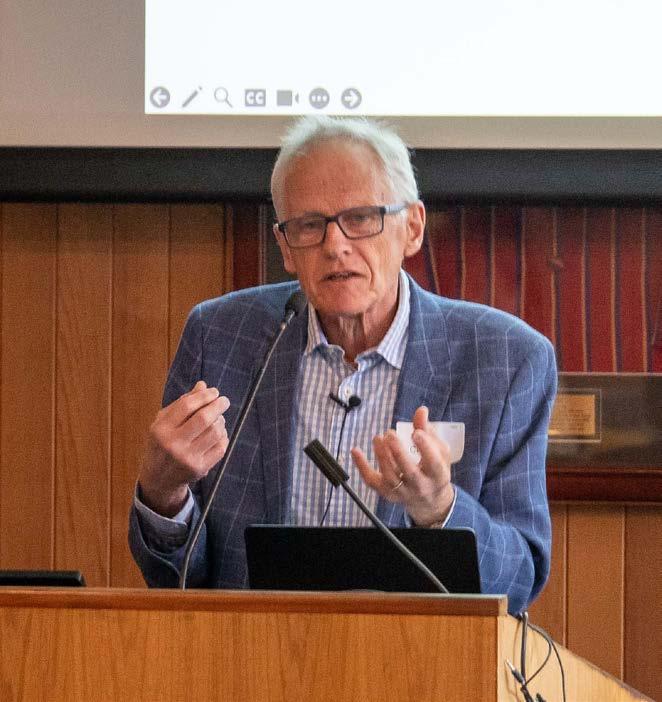
IAN CAMPBELL (CENTRE) WITH SCOTCH VICE PRINCIPAL, HEAD OF SENIOR SCHOOL KATRINA BRENNAN AND SCHOOL COUNCIL MEMBER ANDREW WILSON ('78) WHO FACILITATED IAN CAMPBELL’S SCOTCH IMMERSION
SALT – HELPING COMMUNITIES TO ADDRESS THEIR OWN CRITICAL ISSUES

AN INSPIRING ADDRESS AT SCOTCH FAMILY EASTER BREAKFAST

As dawn broke on the cool morning of Thursday 21 March, 80 Scotch Family members got together in the Cardinal Pavilion’s Boykett Room to continue a Scotch tradition that dates from 1996 – the Scotch Family Easter Breakfast.
After Chaplain Doug Campbell’s grace and a hymn, How Deep the Father’s Love for Us , breakfasters tucked into scrambled eggs on sourdough toast with tomatoes, potato rosti and sauteed kale, accompanied by a fruit platter and the obligatory hot cross buns and Easter eggs.
Guest speaker, London-based medical doctor Dr Ian Campbell and his wife Alison, work as independent volunteers with a community practice called Affirm. Their work is summarised as supporting local communities by working as a team under the acronym SALT: S – stimulate stories, A – appreciate strengths, L – learn through listening, T – teamwork.
The mission is ‘Participation with others, in their living space, as well as our work and worship space, in growing to know God better in the grace of Christ’.
The modus operandi is to come together as a local group and get to know each other, before venturing out and engaging with local communities to devise practical ways of dealing with locally-important issues, such as HIV and AIDS, addictions, Ebola and COVID.
By 2012 Ian and Alison had worked with SALT for 30 years in more than 50 countries and many local communities who were affected by conflict-related health and life issues. After 2012 they revisited these communities in an initiative called GloCon (standing for global-local conversation) in an effort to examine the
longevity and efficacy of SALT, and to continue listening, learning and encouraging.
In Sierra Leone a team of 40 people from three communities in the city has been doing SALT practice every fortnight for three years. The team, which got under way after the Ebola epidemic of 2014, called its approach 'Amplifying Voices through SALT’ (AVS).
A catastrophic mudslide in Motomeh, at the foot of Moint Sugarloaf, west of the Sierre Leone capital, Freetown, in August 2017 buried many houses and killed more than 1000 people. After the mudslide, the AVS team sprang into action using SALT practice and their growing counselling skills. Their action helped in resolution of grief and reduction of competition for commodities following the tragedy.
Ian’s passion for the SALT program shone through in his address at the breakfast, along with his determination to continue the program and maintain the positive impact it is having in a wide range of countries. It was another memorable, inspiring Easter Breakfast address.
A thoughtful prayer for the Scotch Family by Jayden Li (Year 9) and Doug Campbell’s benediction brought the breakfast to a close.
Earlier in the week, Ian had participated in an immersion with Years 10 and 11 Scotch boys, facilitated by School Council member Andrew Wilson (’78), during which he said he had perceived a strong sense of connectivity and resonance in the Scotch Family. He could perceive linkages at Scotch which he had experienced and encouraged globally. ‘There is a deep sense of community here’, he said.
PLENTY OF MUSIC FOR EVERYONE AS 2024 PROGRAM UNFOLDS
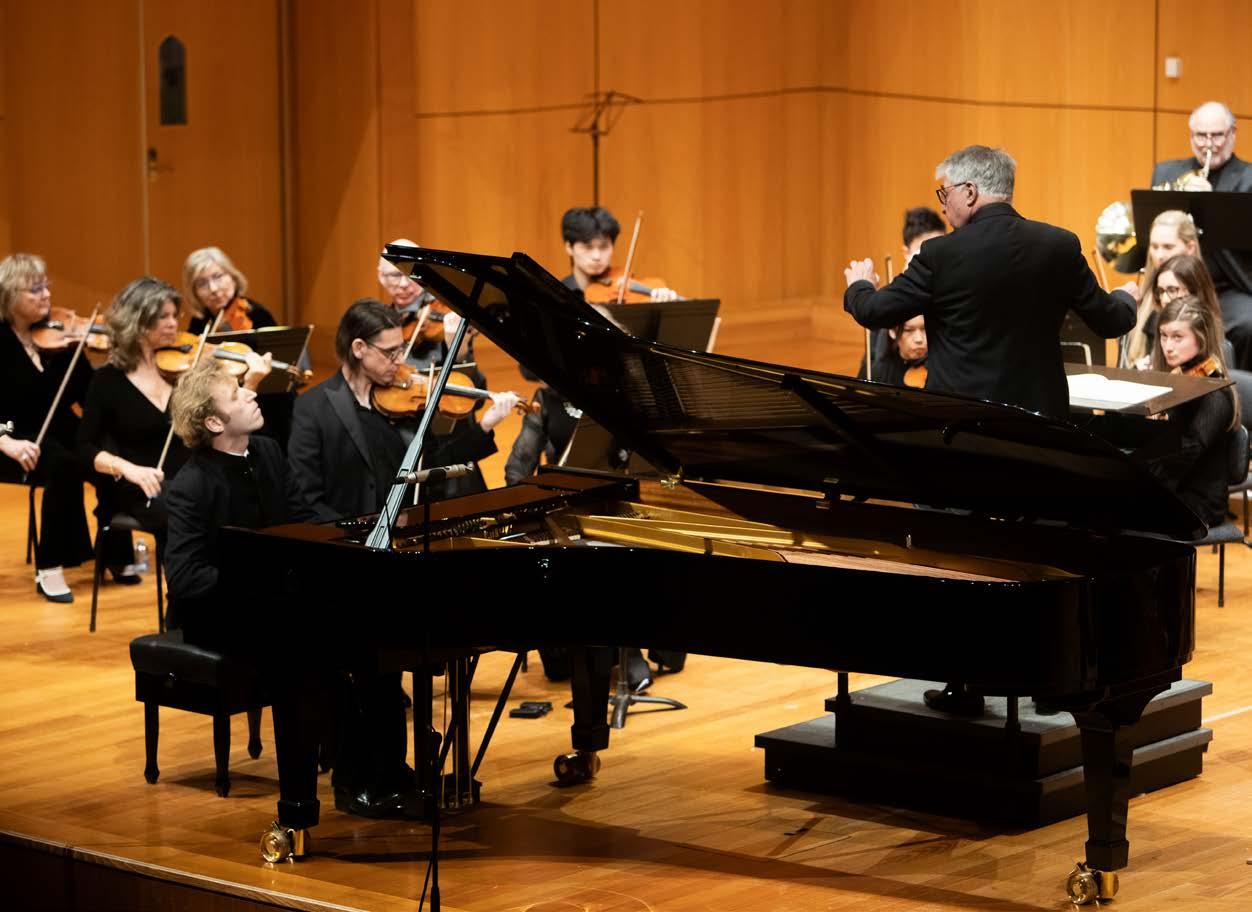
FROM MOZART IN SPRING TO
The first musical event for Term 4 last year was a concert given by Pro Musica. This chamber orchestra comprises music staff, external professionals and some advanced students. On 7 October we were delighted to welcome back Dr Cameron Roberts (’94). Cameron now resides in London with his wife and two children where he works as a professional musician most of the time, and as an anaesthetist in a London hospital two days a week.
At Scotch, Cam led the orchestra for two years, was Captain of Music, was a concerto soloist at two Foundation Day Concerts, and was the soloist for Rachmaninov’s 2nd Piano Concerto for the orchestra’s tour of Europe in January 1995. In London, Cameron has several solo albums to his name and has written a book, Optimising Pianism.
His performance of Mozart’s Piano Concerto No 23 was a delight for the audience, displaying a wonderful understanding
of Mozart’s elegance with a deftness of touch, matched with an authoritative and consummate technique. From a personal point of view, I first conducted Cam performing a piano concerto in 1993, so it was a great pleasure and privilege to do so again, 30 years on!
The other concerto that evening was Bach’s Concerto for Violin and Oboe, BWV 1060. The soloists were the legendary oboist, Anne Gilby, and our own Head of Strings, Ben Castle. Anne is our oboe teacher at Scotch. She has been principal oboe for several orchestras in Germany and Australia, including the Australian Chamber Orchestra. She is also the former Head of Woodwind at the Victorian College of the Arts, and Monash University.
Ben has performed as a chamber musician and orchestral player throughout Australia, and in Hong Kong and China. He also plays regularly with the Melbourne Baroque Orchestra, the Australian Romantic and Classical Orchestra, as well as television
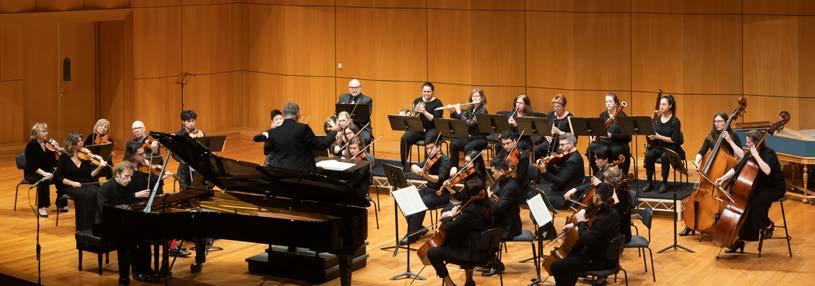

THIS PHOTO AND BELOW LEFT: CAMERON ROBERTS (’94) PERFORMING MOZART’S PIANO CONCERT NO 23
DR JOHN FERGUSON CONDUCTS AS THE SYMPHONY ORCHESTRA AND SOLOISTS PERFORM HUBLER’S CONCERTO FOR FOUR HORNS
BELOW MIDDLE: PRO MUSICA PERFORMING SCHUBERT’S 5TH SYMPHONY
BELOW RIGHT: DAVID MUSK CONDUCTS THE SYMPHONIC WIND

KHACHATURIAN IN SUMMER
and theatre work. He is the regular concertmaster of Pro Musica. Their performance of the Bach concerto was a sheer delight.
The remaining work of the concert was the delightful Symphony No 5 by Schubert. It was indeed a lovely concert, enjoyed by a substantial audience.
The final concert of the year was the annual Summer Prom. Initiated in 1991, the Prom is always held on the last Tuesday of the school year. It opened with the Symphonic Wind conducted by David Musk. A fun program of works followed, which included Leroy Anderson’s Christmas Festival and Music from Gladiator by Hans Zimmer. Ben Castle then directed the Academy Strings through the hauntingly beautiful adagietto from Mahler’s 5th Symphony. He followed this with the allegro from Mendelssohn’s String Symphony No 7. It was an ambitious program that the boys rose to with aplomb.

As always, the concert concluded with the Symphony Orchestra. Geoff Liu, L.Mus.A. (Dist.) (then Year 11), performed the electrifying and dazzlingly virtuosic third movement from the violin concerto by Khachaturian, an exceptionally fluent and musical performance taken at a breathtaking speed.
This was followed by a remarkable Concerto for Four Horns by Heinrich Hübler. We performed the first movement, with soloists Daniel Wang (L.Mus.A. Dist.) (then Year 8), Aaron Zhang (then Year 11), Joshua Deng (then Year 9) and Joshua Song (then Year 7). It was an unusual work, and the boys gave a brilliant performance.
We encourage composers at Scotch, and Alec Cheong (Year 12 at the time), had composed a work for orchestra called Ascension. It was a most worthy piece for full orchestra, and the performers enjoyed bringing this quality work from the written notes to a live performance.
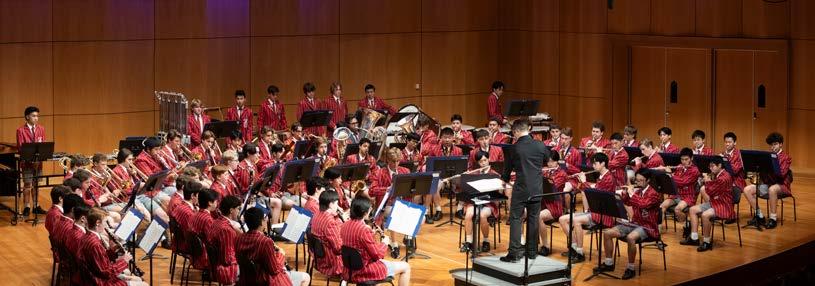

The concert concluded with a concert overture by the Scottish composer, Hamish MacCunn, called Land of the Mountain and the Flood. It was used as a theme for a BBC Scotland television show (about a procurator fiscal). It is a piece that I have known since I was at school, and have always wanted to perform, partly because it has a notable horn solo!
By tradition, the leaders of the Music School for the following year are then announced and presented. Then follows, also by tradition, an encore – and our horns rushed back onto the stage to perform the last movement of the Hübler concerto, with athletic virtuosity, and Daniel modifying the end to finish on a top C (which might mean something to some of you!).
As always, the year concluded with the Scotch Family Carol Service, organised by our Chaplains in conjunction with the Head of Choirs, Andrew Hunter. All choirs of the Senior School
performed, with Benji Scott, Thomas Nguyen and William Zheng (all then Year 11) performing solos beautifully. As always, it provided a fitting and at times reflective conclusion to the year, and the Memorial Hall audience (congregation) enjoyed singing the traditional carols in anticipation of Christmas.
Term 1 commenced with rehearsals for a very special event. The Combined Schools’ Orchestra was initiated by Adam Pai ('21) in 2019, and involved students from a number of schools. The concert was conducted by Yuki Goh ('19). That first concert sold out, and the proceeds went to a charity supporting education for underprivileged children.
This year’s concert was organised by a student committee comprising Neil Wang, Geoff Liu, Ryan Zhang (all of Year 12) and Hannah Yang. It involved musicians from Camberwell Grammar School, Camberwell Girls’ Grammar School, Carey Grammar


THE COMBINED SCHOOLS ORCHESTRA IN CONCERT

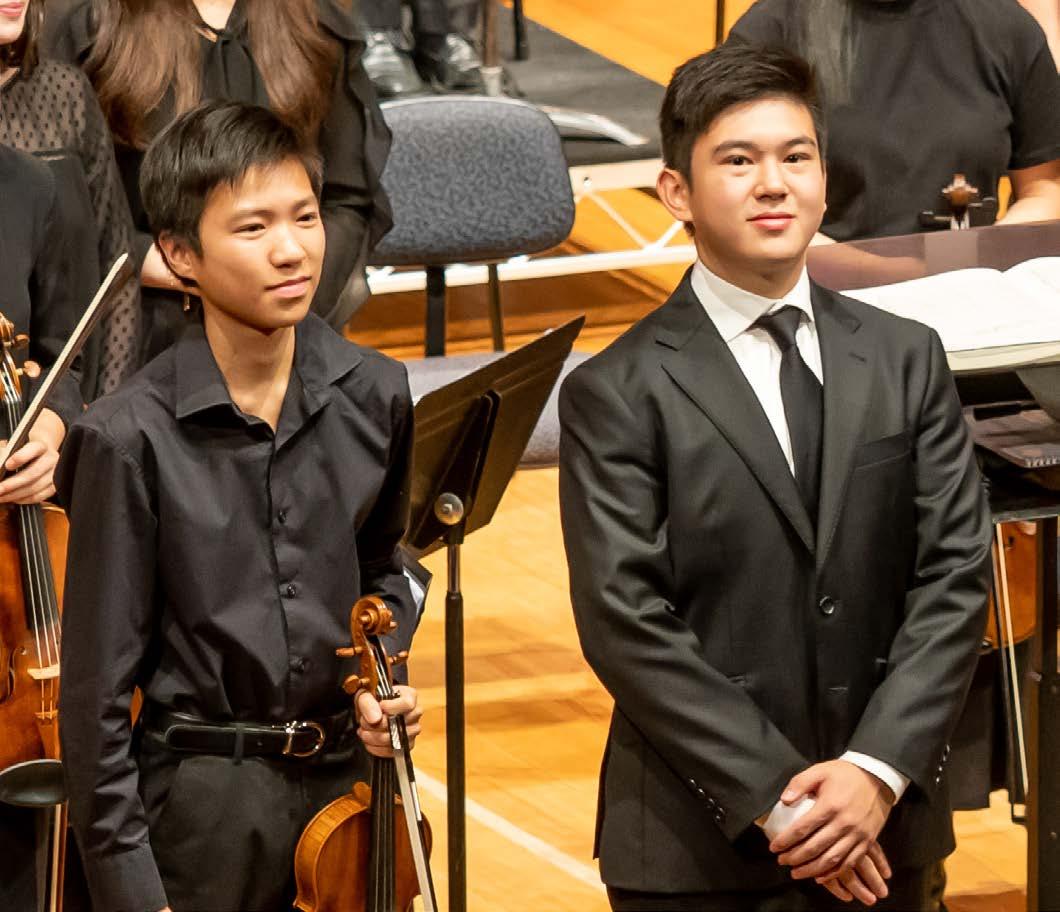
MIDDLE
School, Ivanhoe Girls’ Grammar School, Korowa Anglican Girls' School, Lauriston Girls' School, Mac.Robertson Girls’ High School, Melbourne Girls' Grammar, Methodist Ladies' College, Presbyterian Ladies' College, the Victorian College of the Arts Secondary School, and, of course, Scotch.
The 87-piece orchestra was superbly conducted by Neil Wang, and led by Geoff Liu. The program comprised highlights from Tchaikovsky’s Nutcracker and Swan Lake, Danzon No 2 by Marquez, Spartakus by Khachaturian, Town with an Ocean View by Hisaishi, and movements from Rachmaninov’s Symphony No 2, and Dvorak’s Symphony No 7. The program was ambitious, but the quality of playing was superb, and the Ian Roach Hall was sold out to a delighted audience. Proceeds this year went to The Song Room which provides multi-artform arts learning experiences to children in need and in remote areas.
The committee did a brilliant job, organising repertoire, coordinating the musicians from 12 schools, handling the publicity and programs, and the sheer musical challenges of rehearsing and performing. When looking at these splendid young people, selflessly giving their time and talents, as well as enjoying making music together, one could not help but think that Australia’s future is in good hands!
As I write this, we are preparing to take almost 200 boys to Choir Camp, three jazz bands and a small jazz ensemble are getting ready to depart for Mount Gambier for the annual Generations in Jazz festival, the biennial Piano Festival is imminent, and the three concert Autumn Festival tickets are on sale. So, plenty of music for everyone!

DR JOHN FERGUSON – DIRECTOR OF MUSIC PHOTOGRAPHY: DR JOHN FERGUSON
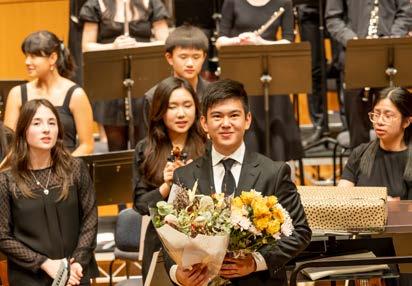
THIS PHOTO AND BELOW RIGHT: THE COMBINED SCHOOLS’ ORCHESTRA, CONDUCTED BY NEIL WANG (YEAR 12), RECEIVING APPLAUSE DURING THEIR CONCERT
BELOW LEFT: CAMERON ROBERTS ('94) PERFORMING MOZART'S PIANO CONCERTO NO.23
TWO PHOTOS: COMBINED SCHOOLS ORCHESTRA IN REHEARSAL
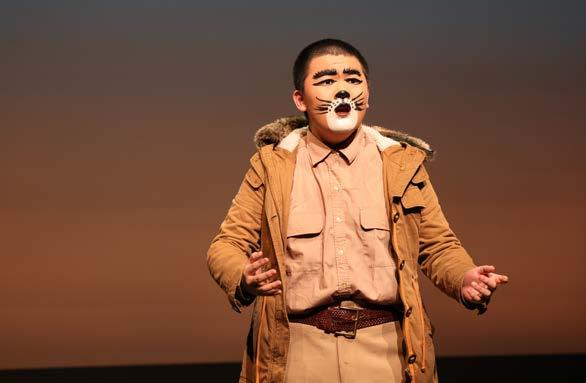
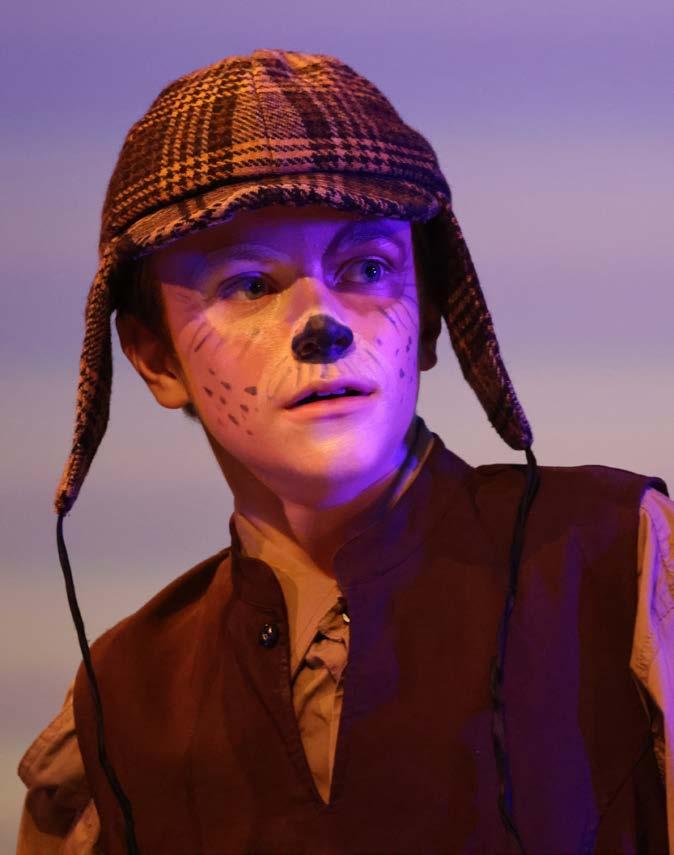
YEAR 8 PLAY BRINGS A CLASSIC MUSICAL FANTASY TO LIFE
THE WIZARD OF OZ – ‘A TRULY
The Wizard of Oz was an amazing production and experience for the cast and crew – a joint performance of Year 8 students from Scotch and MLC. We enjoyed every moment of it, from the character workshops all the way to the dress rehearsals, and finally our performances. We got to delve into a variety of different aspects of stage acting, while having fun with our friends.
Our first rehearsal, on a Sunday afternoon at the start of Term 1, was an opportunity to meet the entire cast and study our characters in more detail. As we started to explore our characters’ backstories, we slowly moved closer to the role we’d be about to play. Our theatre journey had begun!
After we had our characters perfected, we moved on to blocking. This is a process to decide staging and positioning. We worked on how to deliver lines facing the audience or how to portray a character’s feelings and express emotion without words. It was exciting and challenging to reveal the characters and bring them to life on stage.
As we worked through the play, scene by scene, we got closer to the final product. It was an incredible experience to watch the whole production come together to become the play the

audiences saw. The Scotch Drama facilities are exceptional and provided the cast and crew with many exciting features to use.
The make-up rooms, props, backstage equipment, lighting, sound, and the stage itself made the whole production feel like a West End performance, and not a school play.
The staging, lighting and dress rehearsals were upon us in the last few weeks of term, bringing opening night that little bit closer. Our dress rehearsals were the first opportunity to get a real sense of our performance. We put on costumes and had our make-up and hair done, to really feel the part and bring our character to life on stage.
Getting ready for our performances was a long and sometimes nervous process, but it was helped by listening to some great music from Mr Waugh, helping us to relax, brush off any nerves and rev up for a great show.
Finally, it came – opening night. It is always the most nerveracking, as it is the first night you experience a live audience. Although we had done so much work perfecting our play, there was still a tiny part of us that said, ‘what if something goes wrong, I forget that line, I miss my cue?’ But we couldn’t let that stop us. After opening night everyone was excited with the thrill of its success.


MAGICAL EXPERIENCE’
Having different types of audiences was another part of the theatre adventure, because it created an environment for the cast to learn and improve each night. Each live audience brought enormous supportive energy and encouragement, to bring out the best in each performer.
It was an incredible atmosphere on stage at the end of each performance, with the audience showing their appreciation with enthusiastic clapping and cheering. This gave the whole cast such a buzz. Our last performance, to Year 8 Scotch students, was a completely different experience. The energy in the theatre was electric and all the cast was pumped for what was our final performance. They clapped, cheered, laughed and ooohed and ahhhed, making it a show to remember.
We had an awesome time putting this play together, and were sad to end this amazing experience. For some, the first encounter of putting on a play on a proper stage will be a memory they will never forget. To our families and for those who were lucky enough to be in the audience, we are very grateful for your support.
But this wouldn’t have been the play it was without our brilliant Director, Mr Somes, supported by a fantastic Assistant Director,
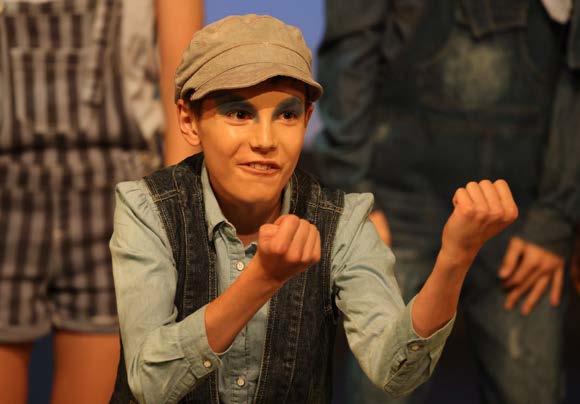
Mr Dogan, along with the wonderful Scotch Drama Department and extended supporting staff. You were all amazing – thank you!
KIERAN TALBOT and GEORGE SAICIC (both of Year 8)
The Wizard of Oz Director, ADAM SOMES (Director of Co-Curricular) added:
‘The journey that cast and crew took down the Yellow Brick Road together was one that I will always fondly remember. Not only because it was the first time I have directed a production at Scotch College, but also because of the passion, enthusiasm and talent that was shown throughout the audition, rehearsal and production process. It might seem a little cliched, but being a part of this production was a truly magical experience.
The Wizard of Oz, like every show staged at Scotch College, was a totally collaborative experience. The production was a culmination of countless hours of dedication on the part of the students and staff of Scotch and MLC. I am indebted to the cast and crew, who put their whole selves into making this production come to life. It was a true honour and privilege to direct the Scotch College and MLC production of The Wizard of Oz !
A MEMORABLE JOURNEY DOWN THE YELLOW BRICK ROAD FOR SCOTCH AND MLC YEAR 8 STUDENTS

ADVANCING BEAUTY, GOODNESS AND TRUTH THROUGH ART LEARNING
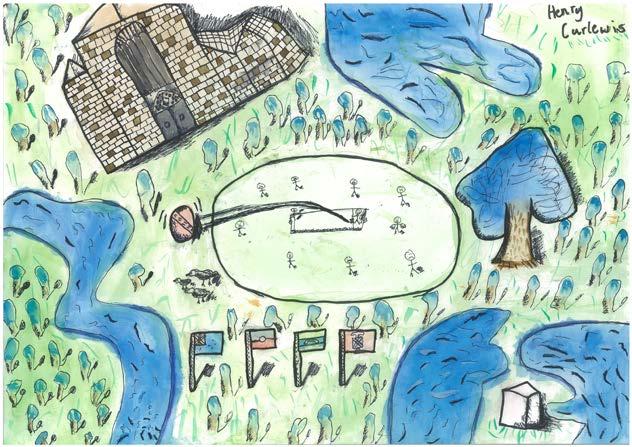
STUDENT ARTISTS’ WORK REFLECTS THE BEAUTY
During Term 1, Art students in Years 7 and 8 engaged with their school surroundings and used resources from the school Archives to develop works of aesthetic beauty and creative wonder.
The Art studios have views across the Main Oval to the Chapel, which Year 8 students drew from observation. They then added smaller school motifs such as wildlife, bollards, signs or cricket players, and explored using warm and cool colours, in imaginative ways, to create their own unique interpretation of the Scotch environment. The student artists' statements reflect their appreciation of
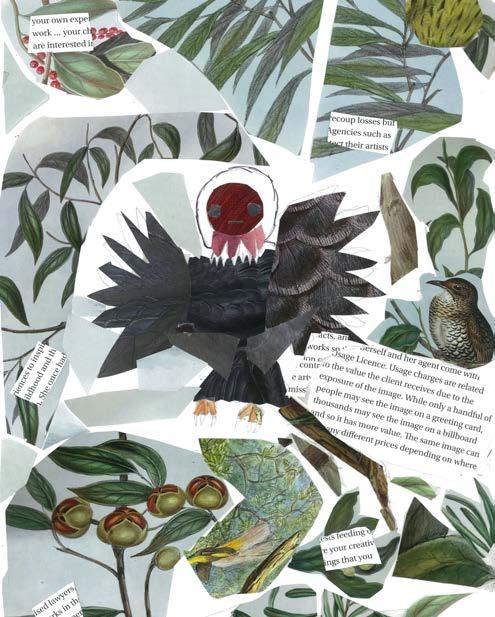
the unique beauty of their school grounds:
‘My artistic statement is about Scotch and its many motifs and famous Scotch landmarks like the Chapel and main Oval. Most of Scotch in the painting I kept close to the real thing except for some locations moving around. The main imaginary parts are the big birds, eyes and big posts scattered around in the work. On a personal note, I particularly tried to show one of the best things about being a Scotchy is the famous Scotch grounds which we are very lucky to have and learn on.’
LACHLAN DOWNS (YEAR 8)
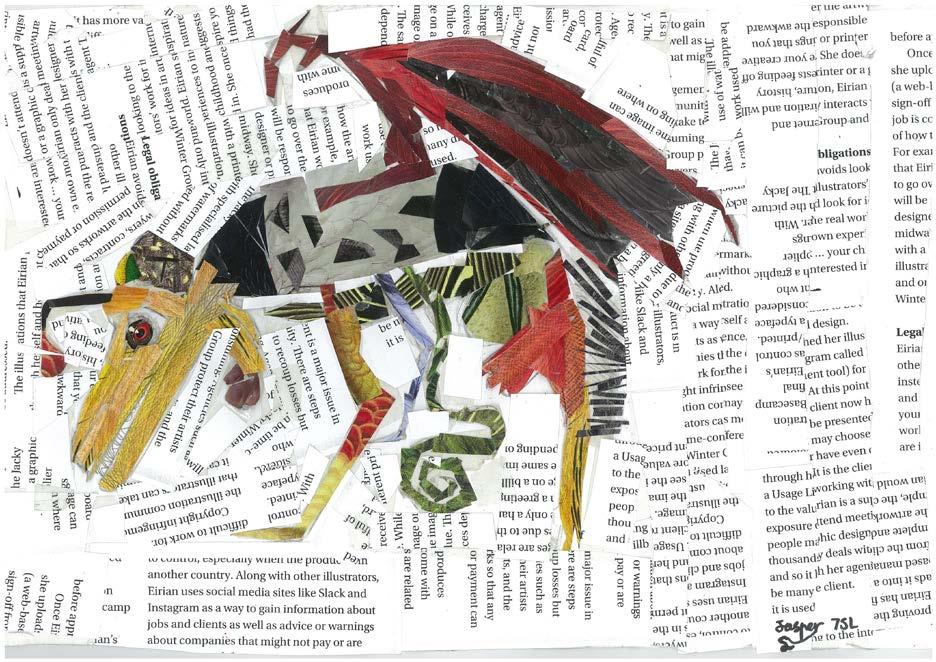

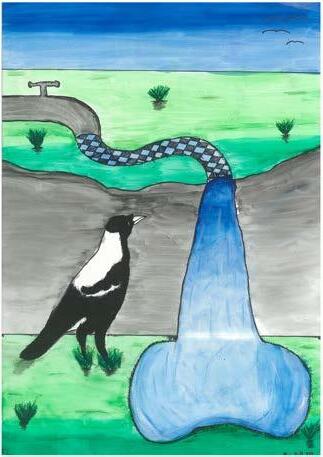
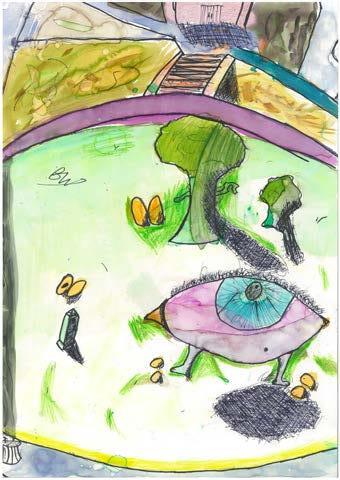
OF THE SCHOOL’S GROUNDS

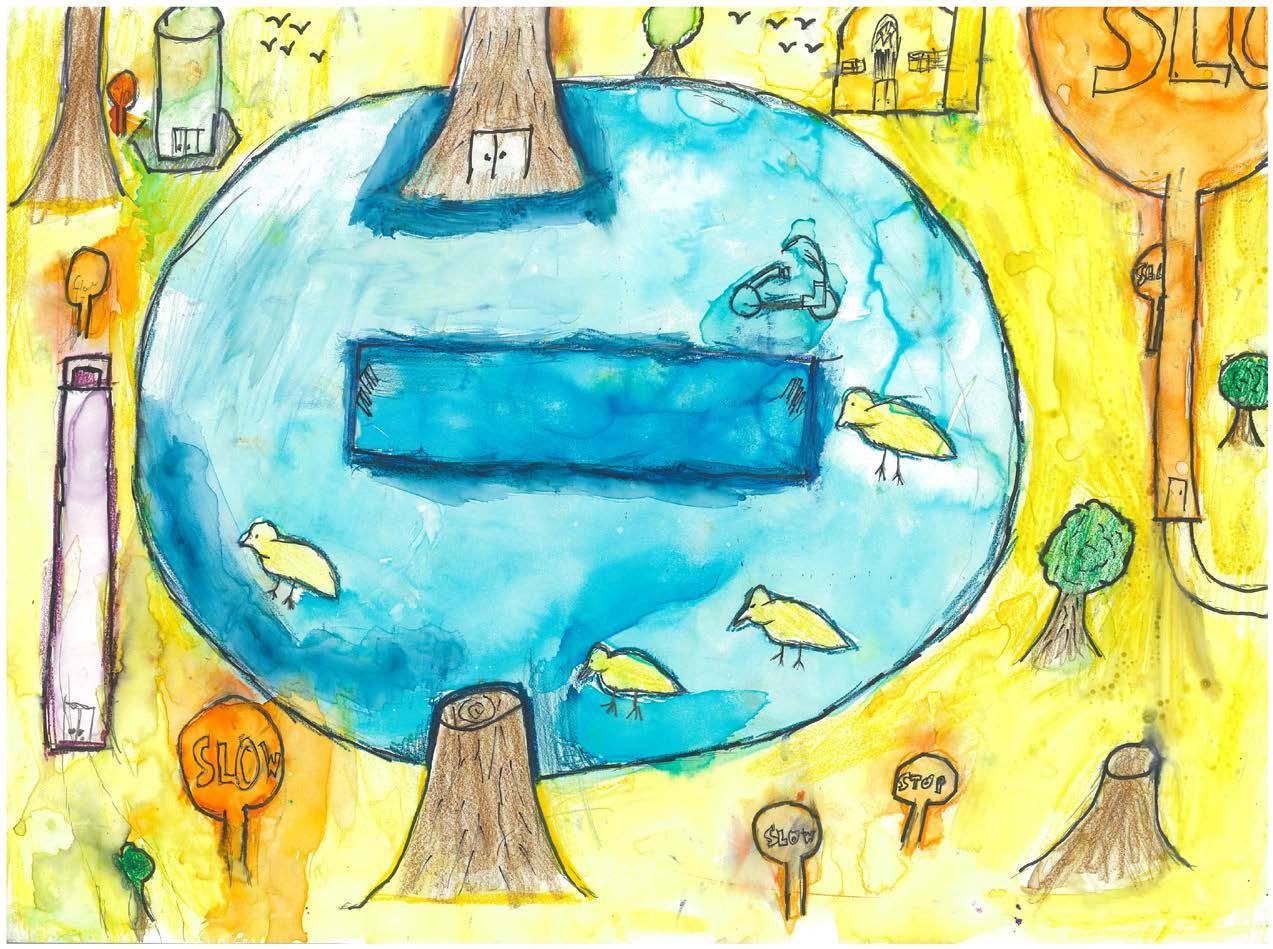

1. REMY MCCARTHY (YEAR 8). 2. HENRY CURLEWIS (YEAR 8). 3. MAX HOLT (YEAR 8).
4. BEN WHITEHEAD (YEAR 8). 5. YUSUF MOHAMMED (YEAR 8). 6. SENNA ROGERS (YEAR 7). 7. JASPER CATFORD (YEAR 8). 8. SAMUEL PEDDER (YEAR 8).



‘My work is about the Main Oval, and shows multiple different buildings and machines. One feature is the Chapel. which shows the windows and beautiful landscape. The birds on the oval are among my many motifs. The birds are drawn oversize to fill empty space with colourful wildlife, showing the high amount of wildlife at Scotch College.

There are also many trees with doors, and this adds nice bright colours and activates the viewers’ curiosity in the painting. There are also many signs as motifs which represent the educational purpose of Scotch.’
SAM PEDDER (YEAR 8)
Year 7 students worked on the broad theme of ‘My fantastic imagination’. Students had access to the beautiful Gould illustrations of birds that are part of the Scotch Archives collection. Some students created imaginary hybrid creatures, after completing texture drawing studies from observing Gould archive images. Others used reproductions of the Gould bird illustrations in creative collages.
The Art Department is grateful for the collaboration with Archives to give the students access to the wonderful visual resource that has enhanced their appreciation of the beauty of textures and patterns found in the bird studies completed by Gould. We also used library books about the illustrators, Graeme Base and Maurice Sendak, to model illustrative techniques so the boys could learn how to use tone to show volume and make their creations look more convincing.
Artistic creation has always been a
mysterious process involving deep thought and synthesis of observations, ideas and technical skill to realise a unique vision.
Year 8 boy YUSUF MOHAMMED’S artistic statement demonstrates the nuanced and purposeful engagement of artists as they bring works of art into being, reflecting on lived experience:
‘In interpreting our school and constructing my painting, I thought of my primary school – Scotch’s Junior School – and portrayed my fond memories of my elementary years in my painting.
I did this by creating fuzzy, warm and faint yellow clouds (on the left side of my painting), which portrayed my soft and happy memories as clouds to remind me who I was, where I came from and how precious and important these joyful memories were to me.
I then created my current school years on the right side of my painting, and presented them more realistically and accurately to show my current school years. I wanted them to look more intelligible to show how I am currently experiencing this part of my life.
I also created a river, to show how I am currently being pushed down the river of life and how the present is always moving forward. This reminds me that I can’t change what has happened in the past, and
9. LACHLAN DOWNS (YEAR 8). 10. MINGBO ZHU (YEAR 7). 11. FRANCIS HEATH (YEAR 7). 12. JOHNNY BELL (YEAR 7). 13. JOSHUA CHAN (YEAR 7).

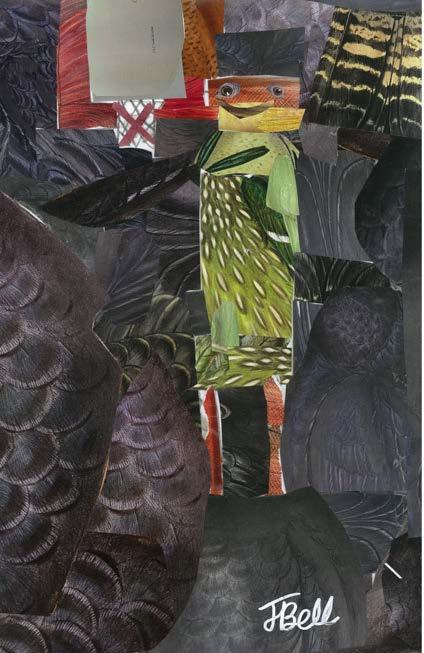
always to make the present count. I also have a bridge in the middle of my present and past to show how they are connected and intertwined, and to show how my past has influenced my present and my future.
Finally, at the end of the river there is a giant city, which is drawn in a way to make it look bigger than it seems. I have also drawn in extra details such as weird, strange and twisted buildings to show how the future is always ambiguous and nebulous, to depict how the future is never set in stone, and how we can never know what the future holds.
Extra details which I have included are some eyes to show that my future self will be looking back at myself and judging if I have done the right thing. Birds show how I am always wondering why I have done certain things in the past and how they have influenced my present; additionally, ducks show how I am always pondering my present.
Finally, the reason why the water colour in this artwork is so useful is because this water colour shows how unpredictable and vague life can be. The fineliner is very useful as it helps to show how hazy our life can be, while still keeping the fickleness and unpredictability of life.'
SUSAN MACDONALD – ART TEACHER
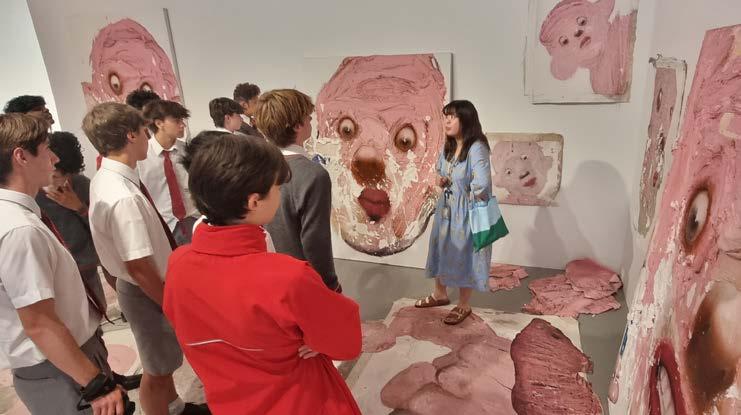
IN THE WORLD OF ART SCOTCH STUDENTS OUT
MANY NEW VIEWPOINTS BROUGHT BACK TO THE CLASSROOM
This semester, Scotch’s Art students have encountered an enthralling range of contemporary and historical artistic practices and thinking through their excursions.
Several classes explored the Triennial exhibition at the National Gallery of Victoria, and were surprised and inspired by the myriad of contemporary artworks on display (see an example below.). They worked with street artists at Blender Studios, where they were challenged to make a creative statement that was sympathetic to its urban surrounding.
Sculpture workshops with Heide Museum resident artists included interaction with the fascinating sculptures of their gardens. The annual visit to Arthur Boyd’s Bundanon near Nowra captivated the VCE class, while the Museum of Australian Photography welcomed several classes to its impressive Photo 2024 exhibition of artworks by internationally renowned artists.
So many new viewpoints were brought back to the classroom from these adventures. Many of these were then explored in the students’ own artworks, which will be on display on Family Day in Term 3.
YUDHA SCHOLES – HEAD OF ART



STRONG PARTICIPATION IN 17 SUMMER SPORTS
FUTSAL PREMIERSHIP WAS A HIGHLIGHT

Scotch enjoyed another excellent summer season, with consistently strong performances by our APS Firsts sports teams and some of our alternative sports programs. Scotch’s futsal premiership was a clear highlight of the summer season, as it delivered the school its second futsal championship. We were previously champions in 2017.
While our senior sports results are important, most of our participation each weekend is in non-first and under-age teams. More than 1490 boys participate in 17 sports, and as our boys compete against opposing schools they have the opportunity to learn about the importance of a team-first approach, gain the connection between hard work and performance, and also learn to manage the challenges that sport provides. It gives opportunities for our boys to develop character, and importantly to interact in a meaningful way with other boys, and our staff and coaches.
I am proud of the way the boys presented throughout the summer season. They showed great determination and perseverance when challenged; and most importantly they played with great sportsmanship and respect for opposition teams and officials.
Impressively, the 1 st Futsal team won seven fixtures, had one draw and lost one game throughout their premiership season. Highlights of their season included a round one 5-3 win against St
Kevin’s College, along with a methodical 4-2 victory against Carey Grammar School in round eight. Captain Luka Jevtik scored 20 goals for the season, which included kicking eight goals in a single game. Despite some individual brilliance, it was the team’s cohesive structure and dynamic full-court press that were the defining features of its success. All boys, coaches and staff involved deserve acknowledgement for delivering such a wonderful result.
The Badminton and Volleyball teams performed consistently throughout the season, and each finished third in their respective competitions. Our boys gave themselves the best opportunity to succeed, taking most of their opportunities when they counted. The Volleyball team found itself right in the mix for the premiership late in the season, but fell short in an epic five-set match against Haileybury. It was a similar story with our 1 st Table Tennis team, which performed well to finish equal third.
Our Touch Football team competed in the inaugural APS season of this sport and was highly competitive. Despite being on the wrong end of some tight results, it was a big step forward for our program, as we finished fourth. With many returning players, the future looks bright for the sport, and we should be able to build on the strong platform set this year.
Our 1 st XI Cricket team showed signs of dominance in games but struggled to perform consistently with the bat. We finished fifth, despite impressively beating teams above us on the
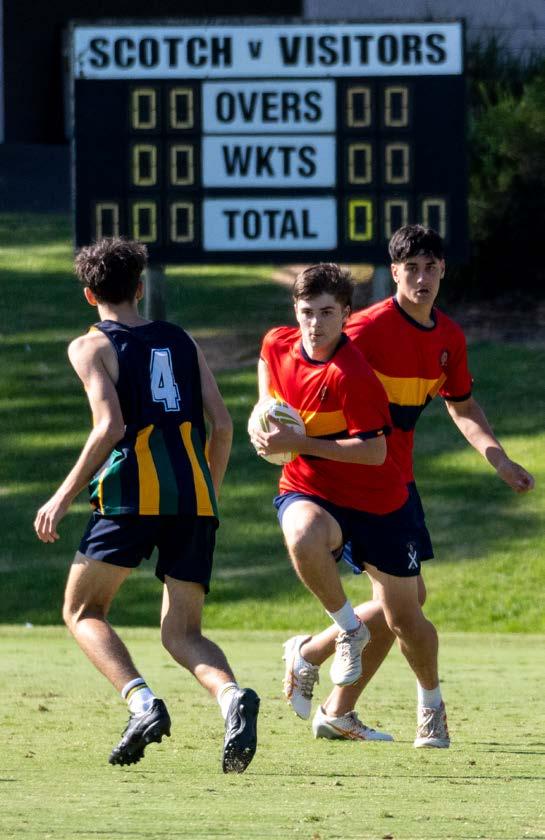

ladder, with excellent performances against fancied opponents Haileybury and Brighton Grammar School. Our Captain, Harry Jones, excelled throughout the year and demonstrated strong leadership skills, performing well with bat and ball. We had two centurions, with Ed Winneke (Year 11) and Tom Farrer (Year 12) raising the bat with 110 versus Brighton and 100 against St Kevin’s respectively. Adam Rixon (Year 11) took a game-changing six wickets against Carey to deliver a monumental comeback victory, as Scotch took Carey’s final seven wickets for 34 runs.
Our Swimming squad enjoyed another high-end finish, with a third overall placing at the APS finals. Eric He (Year 11) was a standout performer with four podium finishes in individual events across the division A open and under 17 age groups. Alex Haigh (Year 10) impressively won our only individual A division event in the under 16 50m backstroke.
Scotch had four relay wins on the night, winning the under 16 200m medley relay A division event, and also three under 14 relays in the 200m backstroke, breaststroke and butterfly relay A division events. The Diving team finished sixth, with strong performances by Anders Salmon of Year 9 (fourth in the under 15 B division and fifth in the under 16A division).
Our rowers enjoyed a highly successful season, and should be commended on their efforts. The six-day camp at the beginning of the year certainly provided a strong platform for this program.
The 1st Crew performed extremely well in the lead-up to the APS Head of the River, winning the Scotch Mercantile, Wendouree Ballarat and Nagambie Regattas, and finishing third in both the NSW and Victorian State Championships.
In the Head of the River our crew struggled to produce its best in the heats, and finished fourth in the final after a tough draw allocation. Impressively, the 2nd , 3 rd and 4 th Crews all won their A division finals. Our Year 9A Quad also won its A division final, and was one of many crews at this age group which performed strongly.
The 1 st Tennis team finished seventh. The squad comprised several Year 12 boys and many underage players. Ashton Coster and Lewis Murray were standout performers for the team, and despite both only being in Year 9, played at number one and two. A highlight of the season was the final game against St Kevin’s, where the team won in a tight contest nine sets to seven.
The Orienteering squad enjoyed its most successful season in recent years, winning back the Roger Slade Trophy, amassing 3058 points to Camberwell Grammar School’s 1770 points. The Sailing team finished fifth and sixth in the 1st and 2nd Crews at the Victorian State Championships. Both squads performed well into the finals but unfortunately bowed out at the preliminary final stage.
Following the final round in the Victorian Interschool Cycling series at Kew Boulevard, our cyclists finished fifth overall in the

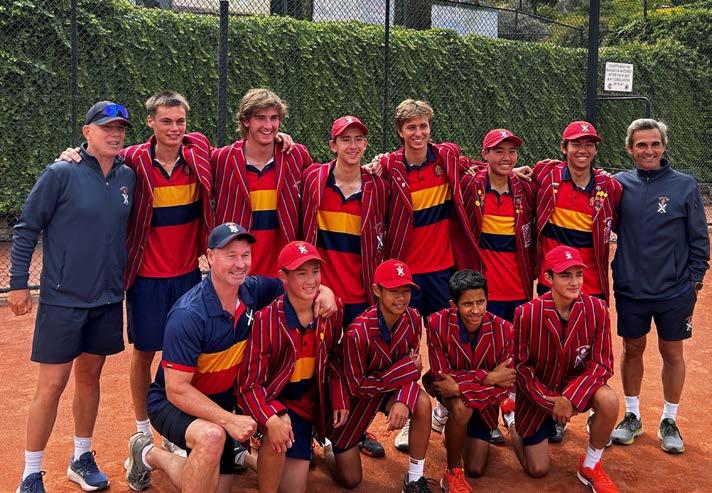
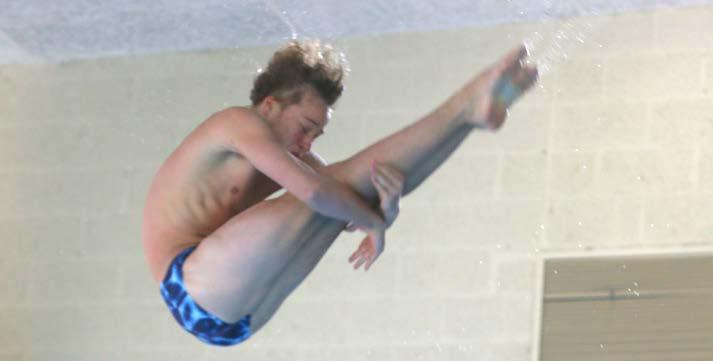
OPPOSITE PAGE,TOP: THE
school events. Jayden Wu (Year 9) finished second and Ray Zhao (Year 9) fourth in the senior male D grade competition.
The Old Scotch Athletic Club enjoyed great success, winning the premiership in division five of the Athletics Victoria Shield. This program has gone from strength to strength in recent years, with many current boys participating each week. Nine boys involved with the program qualified to represent Victoria in the National Championships in Adelaide in April – Rory Vial and AJ Merry (both Year 12), Conor Sullivan and Sam Allen (both Year 11), Tom Roach, Bart Leeton and Lachlan Gumley (all Year 10) and Junior School boys Jayden Millie and Mark Ballantine (both Year 6).
The future of athletics is bright at Scotch, with Llywy Schoenborn (Year 8) and James Hall (Year 5) winning Little Athletics State Championship events. Llywy won the under 14 shot put, while James won three events, the 400m, 800m and 1500m. I am sure our boys will be looking forward to the APS Athletics season later in the year with great excitement.
Eleven boys made the APS Representative sides this summer season. Luka Jevtic was named as Captain of the Futsal Merit team, while Harry Jones, Jifan Liu and Emerson Hodder were named as Vice Captains respectively of the Cricket, Table Tennis and Touch Football teams.
SCOTCH’S APS REPRESENTATIVE TEAM MEMBERS
Cricket: Harry Jones (Year 12, Vice Captain)
Futsal (Merit team): Luka Jevtic (Year 12, Captain), Tass Malliaros and Connor Seremelis (both Year 11)
Table Tennis: Jifan Liu (Year 12, Vice Captain), Alex Wu (Year 11), Kenny Wu (Year 10)
Tennis: Ashton Coster (Year 9)
Touch Football: Emerson Hodder (Year 12, Vice Captain)
Volleyball: Morgan Neil, Sasha Pillay (both Year 12)
Thanks to all those who contributed to such a successful summer season. As you can imagine, our boys moved forward very quickly and very soon were participating in the winter sports program.
APS SUMMER SPORTS PERFORMANCES
APS Summer Sport Position
Badminton 3 rd Cricket 5 th
Diving
Futsal
Rowing
Swimming
Volleyball 3 rd
STUART POWELL – HEAD OF SPORT
ABOVE; THE 1ST TENNIS TEAM AND COACHES
2ND VIII AT THE FINISH OF THE 2ND VIII DIVISION A FINAL AT THE HEAD OF THE RIVER. BOTTOM: SCOTCH’S PREMIERSHIP-WINNING FUTSAL TEAM AND COACHES


FUTSAL PREMIERSHIP
The 1st Futsal Squad began training in early November 2023. The team played three games at the end of 2023, then there was a break for the Christmas/New Year holidays till mid/late January, when the entire squad reassembled to start training once again.
All this hard work finally paid off on Saturday 16 March, when the 1st Futsal team defeated Wesley College in a must win match to secure the premiership. Our nearest rivals (St Kevin’s College) drew their final round match, handing an outright premiership victory to Scotch College.
The season unfolded with seven victories, one loss and one drawn match, enough to win the 2023/24 premiership by two points from St Kevin’s.
As Teacher-in-Charge, I am immensely proud of the whole playing group and support staff. A huge thank you must go to our two very experienced coaches, Mr Greg Kassidas and Mr Brandon Galgano, as well as to my ‘right hand man’, Mr George Patouras, our 1st Team Manager.
We are a young squad, which augurs well for the future of Scotch College futsal.
MARK ZANNONI – TEACHER-IN-CHARGE, FUTSAL


‘CO-CURRICULAR’ – A NEW WAY OF DESCRIBING A ROBUST RANGE OF PROGRAMS
At the beginning of 2024, I took on the newly-created whole school role of Director of Co-Curricular at Scotch College. I am delighted to write to you for the first time in this role and look forward to continuing to do so in the years ahead.
‘Co-Curricular’ is a new way of describing a range of programs offered at Scotch since its foundation over 170 years ago. Areas such as Cadets, Outdoor Education and Services and Activities all fall under the purview of the Co-Curricular Program.
I imagine Old Scotch Collegians often reflect not only on the academic achievements that shaped their time at Scotch, but also on the invaluable lessons learned beyond the classroom walls. Scotch has always stood as a beacon of boys’ education, fostering the ideals of beauty, goodness and truth through its robust co-curricular programs. There is little doubt that Scotch has always understood the transformative power of these programs in advancing those timeless virtues.
One of the hallmarks of Scotch’s co-curricular offerings is its ongoing commitment to outdoor education. Beyond textbooks and classes, our students are encouraged to immerse themselves
in the natural world, fostering a deep appreciation of the beauty that surrounds us.
Through activities and programs undertaken at Cowes and Healesville, on Year Level camps and, in the future, at our new campus in Mallacoota, boys will continue to learn about resilience, teamwork and environmental guardianship. These experiences instil in them a sense of wonder and curiosity, igniting a lifelong passion for exploration and discovery.
Moreover, the outdoor education opportunities offered through our Co-Curricular Program cultivate empathy and compassion, as students learn to respect and coexist with nature. By understanding their place in the natural world that exists around them, they develop a heightened sense of responsibility towards the environment and its inhabitants.
Scotch’s outdoor education program therefore not only enriches the lives of students, but also empowers them to become advocates for sustainability and the environment.
In the pursuit of goodness, Scotch has long recognised the importance of service to others. Through our Year 11 Immersion
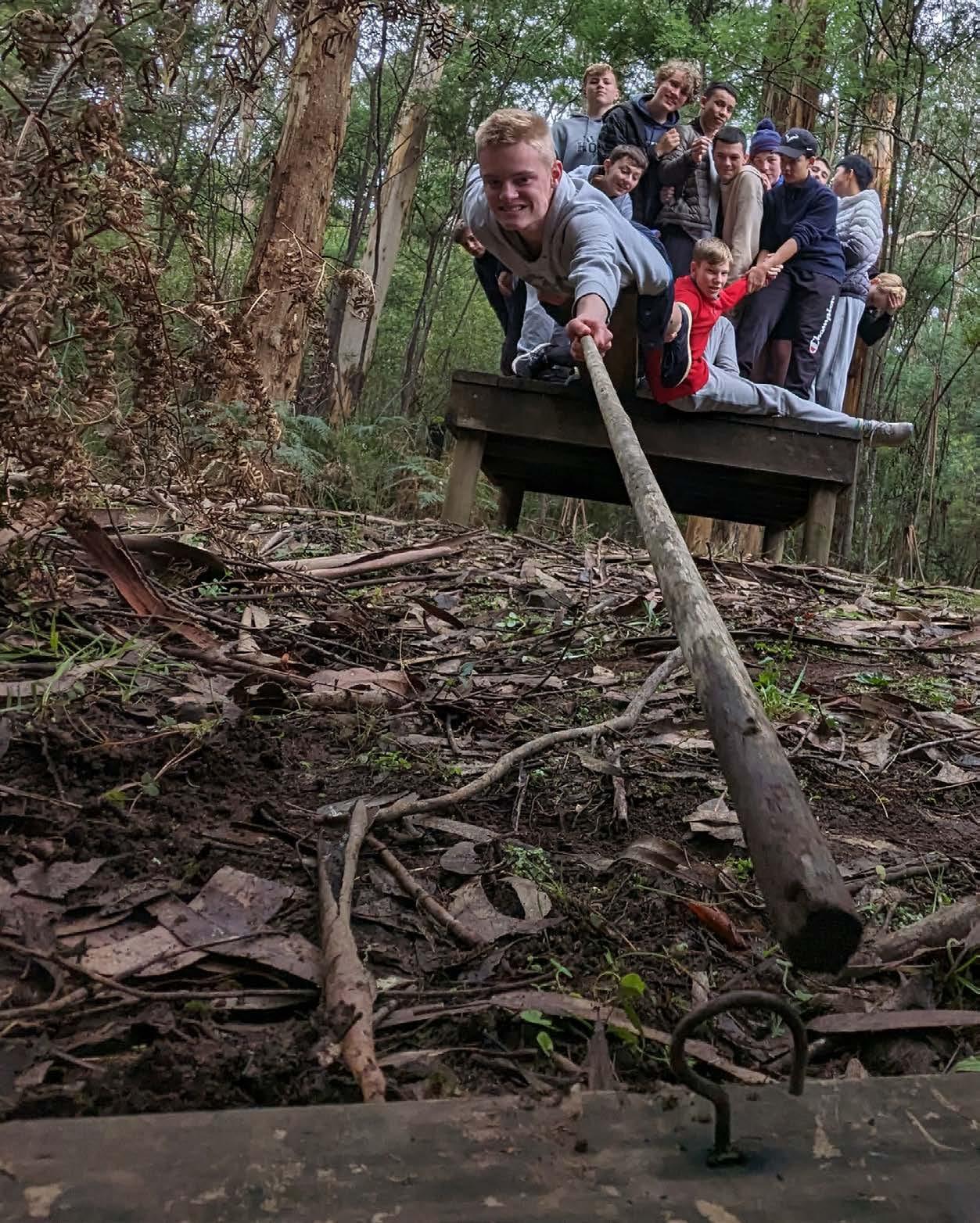
SCOTCH’S PROGRAMS HAVE SHAPED GENERATIONS OF YOUNG MEN
Program, students learn the true meaning of empathy and altruism. Whether volunteering at organisations that work to address food insecurity or conservation issues, participating in outreach programs with local schools or homelessness networks, or by organising performances for residents in aged-care facilities, our boys have the opportunity to make a tangible difference to the lives of others.
These experiences go beyond mere acts of charity; they instil in our students a deep sense of social responsibility and civic engagement. By actively engaging with diverse communities and addressing pressing societal issues, boys develop a nuanced understanding of the world around them. They learn to challenge injustice, promote equality, and advocate for positive change, embodying the ideals of truth and justice in their actions.
By fostering self-awareness and emotional intelligence, our Co-Curricular Program empowers Scotch students to navigate life's challenges with resilience and grace. They learn to embrace failure as an opportunity for growth, cultivate empathy and compassion in their relationships, and lead with integrity and humility. The school’s Co-Curricular Program not only equips students with the skills and knowledge needed for success, it also nurtures the inner virtues that define their character.
Scotch’s past, present and future Co-Curricular Programs serve as pillars of strength, shaping generations of young men who embody the ideals of beauty, goodness and truth. Through these programs, students are empowered to explore the world with curiosity and compassion, advocate for positive change, and cultivate the inner virtues that define their character.
I know that Old Boys’ experiences during their school days allowed them the opportunity to uphold and advance these timeless virtues, ensuring that the legacy of our school endures for generations to come.


INTERVIEW: JILL LAWRENCE
Let’s start by finding out about your background prior to working at Scotch. Would you mind telling us a bit about yourself?
My mum grew up in the Swan Valley on the outskirts of Perth in Western Australia, skipping rocks along Susannah Brook, and roaming the Darling Ranges with her brothers. It was a big change for her when her family moved to Kalgoorlie in the Eastern Goldfields. It was here that she would meet my Dad, and where I was born, living along the Golden Mile, with a hint of sulphur wafting across the schoolyard by day, and a million stars in the sky at night.
Not surprisingly, my first job was in the minerals industry, a position I returned to after six months travelling through South Africa, Rhodesia, England and Europe at 19 years of age. I stayed on in the role of Executive Assistant in the same organisation, transferring to different sites out of small towns in Western Australia until a move to Stawell in Victoria gave me a new (and much greener), look at life.
By then I had two little ones and had followed my metallurgist husband through varying sites and commodities, finally landing in South Australia with our third baby, coming home to the red dirt of Roxby Downs. There I moved back into the workforce at Olympic Dam, working in IT and desktop publishing. A move then, to the big smoke of Melbourne, working as a Legal Assistant for five years before moving into our own start-up companies, proudly watching them grow to success, but not without some toll.
Then a lucky opportunity came along, to work at Scotch College in the ICT Department for seven weeks. That was in 2013.
Could you tell us about your current role, and the activities in which you have previously been involved at Scotch?
I loved my time in ICT, and the people I met while there. Once the seven weeks were up, I moved into the Principal’s Office, also as a leave replacement at the time, then back to ICT to job-share. Basically, I moved between the two offices before taking up the part-time role I currently hold.
I’ve also enjoyed the opportunity for a few other placements around the school, most recently in the English Department last year.
What generally constitutes some of the highlights of your week and keeps on motivating you?
While I have such a small footprint in Scotch life, my days are most enjoyable. I am motivated by the output of colleagues around me, and certainly in my time in English, to take a peek into the academic arena, to see the strength and commitment of staff working towards the best for each boy. Meanwhile, I love the visits to the tuckshop for coffee to connect and interact with all, on either side of the counter, delivering joy in a coffee bean!
On a personal note, would you mind sharing some of your passions and hobbies?
I fear that horse-riding and world peace have passed me by, so to maintain physical and mental health, I choose yoga, gym, reading, reading and reading, although mostly historical fiction and generally, escapism. I love to spend time with family and friends, and with five grandchildren and one more in the coming months, the joy continues.
I am passionate about actively trying to relieve and remove stress from our lives, living a balanced life, and remembering what is important.
Everyone loves a good story, so are there any particular anecdotes or memories that you could share with us?
There are many stories from the regular trips across the Nullarbor, some from fun times in our boat or Mustang, production of silver bars, lunch at Government House in South Australia, and attending a lecture at Harvard. However, this simple story sums up a journey across time to bring me to the place I am now.
In my early years, working as an EA, I met a young student who worked on the same site as I did. I was reminded by some of my position in the operation and of confidentially. I enjoyed the work and stayed within the company across 20 years. As for the young student metallurgist, he is still here after more than 40 years.


INTERVIEW: JOHN
PRIOR
HEAD OF GILRAY HOUSE
Let’s start by finding out about your background prior to working at Scotch. Would you mind telling us a bit about yourself?
I grew up living on a sheep farm near Bathurst in NSW. This enabled me to have an amazing childhood of helping my dad with work on the farm while also attending school in Bathurst. I would not change a thing about my childhood, especially not having any screens in the first 18 years of my life, including not even a television! Just an old valve radio was our only connection with the outside world.
After leaving school I attended the University of Sydney where I studied Mathematics. This was then followed by my teaching qualification. Having just turned 22 I was extremely lucky in getting my first teaching job at Scotch, thanks to Ron Bond (Acting Principal in 1982) and Ken Evans (Head of Mathematics). In 1999 Virginia started work at Scotch as a French teacher, and within a year we were deeply in love, and I proposed to her as we strolled along Cable Beach in Broome during the Term 3 school holidays. Within the next few years our two sons, Sam (Class of 2020)
and Tom (Class of 2021) were born. Seeing them journey through Scotch, as both their dad and as a teacher at the school, has certainly been one of the greatest highlights of my time at Scotch.
Could you tell us about your current role, and the activities in which you have previously been involved at Scotch?
During my 42 years of teaching at Scotch I have obviously had the pleasure of doing many different roles. But the ones that I have treasured the most are my 10 years as a Head of Year, my Maths teaching across all six year levels, the countless camps and tours I have been part of; but in particular managing four England Cricket Tours and 10 Year 10 Outback Trips, and my involvement in the cricket program. My current role is Head of Gilray House.
What generally constitutes some of the highlights of your week and keeps on motivating you?
The main highlights of each week include seeing a boy master a skill in Maths who had no clue about it until I taught him the process. But probably the greatest highlight of each week is playing my small part in helping to turn each boy that I encounter at Scotch into a fine young man by the time he departs Scotch and heads out into the world beyond the Monash Gates.
My motivation to come to work every day is not only arriving at a school with great physical beauty but, more importantly, knowing that I have the honour and privilege of working at one of Australia’s truly great schools.
Another aspect of teaching which I find highly motivating is the variation across a day of what the job entails. One minute teaching Maths, the next minute listening to a boy with a real problem in his life, and the next minute coaching a boy in cricket. The final motivating factor, and a very powerful one indeed, is working with a group of colleagues who are all amazingly talented teachers in their own unique ways, and many of whom have become very valuable friends.
On a personal note, would you mind sharing some of your passions and hobbies?
My greatest passion is travel. Over the past 25 years Virginia and I have been fortunate to travel around much of Australia and Europe, most of these trips being shared with Sam and Tom, creating wonderful family holidays and memories. A close second is eating out at many of the fine restaurants and cafes around Melbourne. My current favourite hobby is reading crime thriller novels. A great way to unwind after a long day at Scotch!
How does your work at Scotch help to forge the character of the boys?

I am a great believer in, and hopefully a great exponent of, relational learning. I do my best to get to know the boys in my care and to engage with them in conversation about their interests and life beyond the classroom. I do my best to role model what it is to be a good man. In my current role as Head of Gilray House I have the significant job of being responsible for the pastoral care of the 86 boys in Gilray. This involves helping them to make good decisions and learning to understand, accept and respect the differences in others.
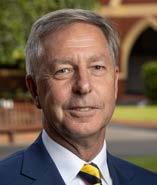
MR MIKE SIM ('78) PRESIDENT OF THE SCOTCH COLLEGE FOUNDATION
THE FOUNDATION HAS ACHIEVED MUCH IN 50 YEARS, BUT CHALLENGES LIE AHEAD
STATE TAXES AND POSSIBLE REDUCED GOVERNMENT FUNDING LOOM ON THE HORIZON
Fifty years ago the Scotch College Foundation was established to support Scotch, and it is best left to others to determine if we have delivered on that objective. However, to support the case for the premise I present that through the generosity of our community more than $60M has been donated to embellish the physical development of our beautiful campus, enabling buildings such as the James Forbes Academy, opened in 2005, and the Sir Zelman Cowen Centre for Science, opened in 2016 to be constructed.
SIR JOHN MONASH
WEARING A MORTAR BOARD AS A YOUNG STUDENT. FOUR FULLY FUNDED GENERAL SIR JOHN MONASH SCHOLARSHIPS ARE NOW IN PLACE.
These buildings were swiftly followed by the Spencer Centre for Design and Technology in 2018, the Keon-Cohen Dining Hall in 2020, and St Andrew’s Square. Other developments such as the Tolson Centre, new Home Rooms for senior students and the new English Department have also been created. Each of these new developments complements the classic buildings of Scotch, such as the Memorial Hall, the main Quadrangle and the Littlejohn Memorial Chapel, and without the Foundation’s support these projects would only be dreams.
More recently the Foundation has helped to enable the school to reinvigorate the Hill with the upgrading of the senior boarding wings behind McMeckan and School Houses and the creation of the Errington Retreat, which was officially opened on 31 January. The regrading of the Village Green, to truly open up the entire boarding precinct for the boys, has also been completed. We hope that Scotch boarding parents will feel most welcome when they visit their sons after a long drive from country Australia, or having travelled across the waters.
Of course, the physical development of the school is just one part of what the Foundation has contributed to Scotch. Generous members of the Scotch Family have ‘rallied at the call’ and given generously to endow many perpetual scholarships, enabling deserving boys to attend Scotch. Along with the original Academic Excellence, Boarding and means-tested scholarships traditionally offered, we now offer General Excellence and First Nations Scholarships.
In fact in 2023 alone, the Foundation supported 117 boys attending the school through its various scholarships and bursaries. Many of these boys are

attending Scotch on means-tested scholarships, so donors’ gifts are making a very meaningful change to many boys’ lives.
We hope the General Sir John Monash General Excellence Scholarships will become well known throughout Australia for developing boys into true leaders of our country, and maybe the world. Again, thanks to the generosity of our community, we now have four fully-endowed Monash General Excellence scholarships in place for boys to commence at the school in Year 9.
None of this could happen without the significant generosity of the Foundation’s 1956 members, who have stepped up to support Foundation campaigns to improve the lives of our boys. In fact, in 2023 we had 536 individual donors to our various campaigns, of which 68 were staff members: it is truly heartwarming
to have staff also giving support to the boys, over and above their outstanding teaching of those boys. I take this opportunity to thank each and every one of these people for their generosity.
Despite all this, the coming few years may well be the Foundation’s most challenging, as the school is hit with new state taxes such as the Payroll Tax, and mutterings regarding the removal of state and federal government funding for private schools refuses to go away, which would put more strain onto parents to find the money to cover the inevitable school fee rises.
The Productivity Commission has also produced a white paper on whether building donations should be tax deductible. Scotch, and many other like schools, prepared a response to this submission, outlining why this initiative would be a severe setback for the school, and hence parents. It would stymie our ability to continue to refresh our facilities to keep pace with the changing needs of classrooms to maintain our high level of academic success, by pushing this aspect onto the shoulders of fee-paying
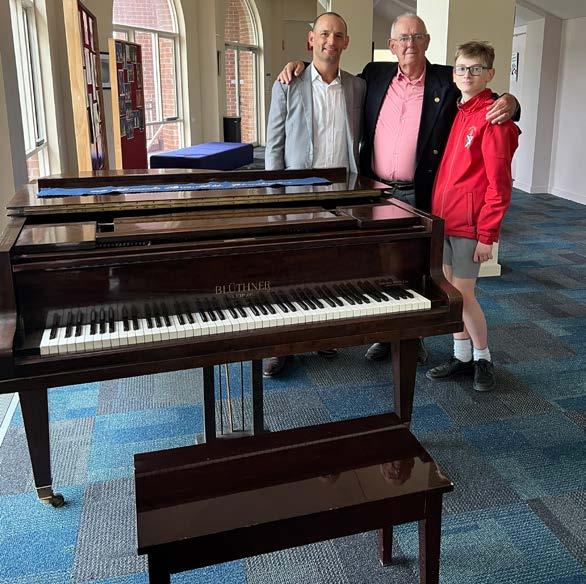
WELL-TRAVELLED PIANO NOW AT HOME IN THE JAMES FORBES ACADEMY
A beautiful and well-travelled piano is now at home in the mezzanine foyer of the James Forbes Academy, where it can be admired – and used – by Scotch’s music students and staff.
Donated to Scotch by the Carson family, the piano – a German-made Bluthner grand piano dating from the early 1900s – was a gift to past parent Dr John Carson’s mother, Helen, from her husband Denis when the couple married in Johannesburg,
parents. This would surely reduce the educational outcomes of Australian children.
To that end, the Foundation is seeking to build a significant perpetual Endowment Fund that, at some time, can provide support to the school budget to help keep school fees within the reach of Scotch Family members for generations to come. Sadly, these contributions are not tax deductible, but we have been blessed with a number of special benefactors leaving funds within their Wills to the Foundation for this purpose since the Foundation’s creation in 1973. The Foundation Endowment Fund has a balance of just under $20M, which by world standards is modest.
If every member of the Scotch Family were to consider including the Scotch College Foundation Endowment Fund in their Will, Scotch would be well on its way to becoming selfsufficient and free from government reliance. Now that would be a wonderful legacy for us to bequeath to future generations.
South Africa, in 1939. Helen and Denis had escaped the Depression years in Australia by moving to South Africa, where Denis got a job working as a metallurgist in the gold mines.
In South Africa, the piano featured in many concerts with the South African Broadcasting Corporation and in charity events. Both Helen and Denis came from musically-minded families. Helen had entered the Sydney Conservatorium in 1930, where she studied under world-renowned pianist, Isador Goodman. Denis’ mother studied at the London Academy of Music.
Helen and Denis returned to Australia in the late 1970s, bringing the piano with them. Work commitments resulted in the three Carson generations settling in Melbourne’s eastern suburbs, where music became central to family life, including clarinet, violin, flute, cello, and of course the piano. Over the years, the piano continued to be enjoyed in performances in a more private setting. There was also the full gamut of instruments needed for such works as Haydn’s Toy Symphony. John’s only son, Robert (’92) attended Scotch, and his grandson Erik is in Year 9 at Scotch.
On 30 November 2023, John, Robert and Erik Carson presented the piano to Scotch, and Elaine Chin, Head of Keyboard Studies, accepted the piano on Scotch’s behalf. To the delight of all present, Year 8 Scotch student Lucas Vong then beautifully brought the instrument to life as he played two solo pieces – a Chopin waltz and Beethoven’s Bagatelles.
John said that he couldn’t think of a better place for the piano to be than in its prominent mezzanine location in the James Forbes Academy. ‘We hope that students and audiences alike will enjoy the tunes ringing out from this piano throughout the James Forbes Academy for many years to come. It is our pleasure to be able to share this item of significant history for our family with the Scotch community.’
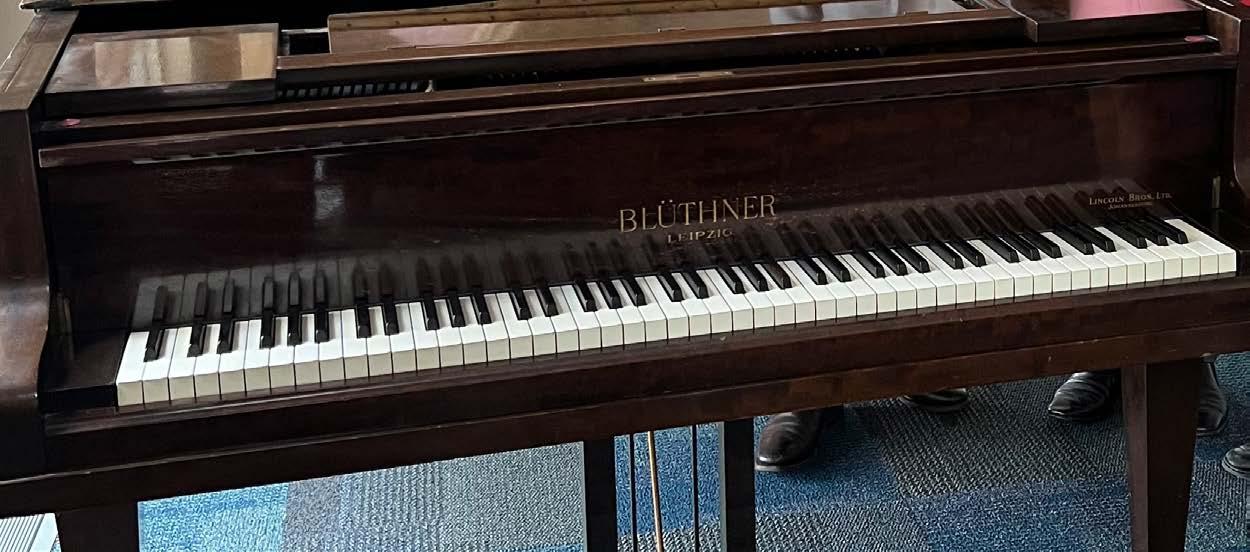
ROBERT CARSON (’92), JOHN CARSON AND ERIK CARSON (YEAR 9 2024)
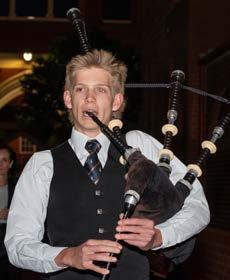
FOUNDATION’S FIFTIETH ANNIVERSARY PARTY LAUNCHES A BOOK AND A CAMPAIGN
DRIZZLY WEATHER AND HIGH WINDS DIDN’T SPOIL THE PARTY
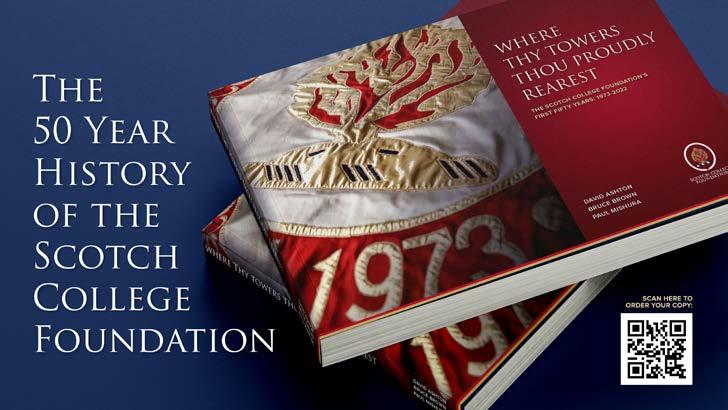


Scotch’s Head of Advancement and Foundation Executive Director, Tim Shearer (’85) has a good record of ‘organising’ great weather on days of significant openings at Scotch. Examples are the unseasonably warm, balmy October evening in 2016 when the Sir Zelman Cowen Centre for Science was officially opened, and the bright sunny day in February 2018 for the official opening of the Spencer Centre for Design and Technology.
But Tim was unable to repeat the fine weather ‘arrangement’ on Wednesday 29 November, for the Scotch College Foundation’s 50th anniversary birthday party and Main Oval Pavilion capital campaign launch. Melbourne’s weather was at its most capricious, with drizzly rain falling nearly all day, and squally winds adding to the generally unseasonal conditions.
A twenty20 cricket match which had been planned for what was hoped to be a sunny late spring day had been cancelled two days before the event, and drinks and canapés were served under the cloisters of the Quadrangle, instead of out in the open, although a few hardy souls braved the drizzle and chilly breezes in the open air. Despite the adverse weather, more than 400
Scotch Family members were there to enjoy the festivities.
Poor though the weather may have been, there was still a real air of celebration as the Foundation’s half-century was very well celebrated, the Foundation history book was launched, the name of the new Main Oval pavilion was announced, and the capital campaign for the pavilion was initiated.
The formal part of the evening took place in the Memorial Hall, into which guests were summoned by the tolling of the school bell at 7.45pm.
Master of ceremonies, Tim Shearer welcomed all present, particularly welcoming Scotch’s oldest known living Old Boy, Bill Morgan (’34), after which School Captain, Dion Whitfield expertly delivered the Acknowledgement of Country.
Foundation President, Michael Sim (’78) said the Scotch Family was very well represented on a night to celebrate the Foundation’s anniversary. He said there are now 1943 Foundation members, and the goal is still to reach 2000 by year’s end. He welcomed former Foundation Presidents Peter Joyce (’55) and Doug Lording (’64) and commended the work of all the other former Presidents in setting up and then progressing the Foundation’s work.
Thanking the Development Office for their work, he also praised those working behind the scenes while so much construction took place, such as Property Manager, Bill Sciarretta. Michael proposed three cheers for the Foundation, which echoed heartily round the hall.
Tim Shearer welcomed his former Principal, Dr Gordon Donaldson AM. Gordon said a feature of the Foundation history book, Where They Towers Thou Proudly Rearest, was a chapter in which major donors told why they chose to donate to Scotch – all of them had the best interests of the school at heart, and it was telling that more than 500 boys have been able to attend Scotch because of the philanthropy of so many Foundation members.
PIPER HUGH HASKER (YEAR 11 2023)


OPPOSITE PAGE: TOP – COVER OF THE FOUNDATION’S 50TH ANNIVERSARY HISTORY BOOK, WHERE THY TOWERS THOU PROUDLY REAREST MIDDLE PHOTO: FIREWORKS LIGHT UP THE DRIZZLY SKY. BOTTOM PHOTO: FORMER PRINCIPAL DR GORDON DONALDSON AM LAUNCHES THE HISTORY BOOK.
THIS PAGE: TOP –ARTIST’S RENDITION OF THE THOMAS YOUNG ANDERSON MAIN OVAL PAVILION.
RIGHT: FOUNDATION PRESIDENT MIKE SIM (’78), SIGNIFICANT CONTRIBUTORS TO THE MAIN OVAL PAVILION PROJECT, FAY AND MAX ERRINGTON (’56) AND HEAD OF ADVANCEMENT, TIM SHEARER (’85).
BELOW: THE PRINCIPAL, DR SCOTT MARSH ADDRESSES THE AUDIENCE IN THE MEMORIAL HALL.
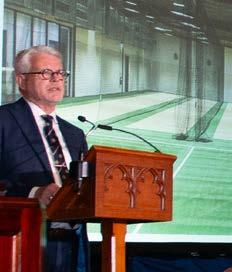
He congratulated the Foundation for its dedicated work, and officially launched the history book – after admitting he was unsure exactly how to make the ‘launch’, having usually hurled bottles of champagne at rowing boats!
The Principal, Dr Scott Marsh, spoke of the importance of physical education, and mentioned that the last significant investment in sport infrastructure at Scotch had been 27 years ago, when the Cardinal Pavilion was opened. It was clear, he said that Scotch had many special places – such as the Memorial Hall, the Quadrangle and the James Forbes Academy. But the Main Oval pavilion was not one of them, and it was no longer adequate for its purpose.
There was now an excellent opportunity, he said, to create a much more fit-for-purpose building. And it will not just be a sports pavilion: the new building will be used for a wide variety of purposes, not just at weekends for sport. It will benefit all members of the Scotch Family, particularly with its spectacular 300-seat function room.
School Council Chairman, Alex Sloan ('71) announced that the name of the new building would be the Thomas Young Anderson Main Oval Pavilion. The name will honour the grandfather of a major Scotch benefactor, Max Errington (’56). Max generously funded the Errington Retreat in the boarding precinct, which will provide needed space for boys to meet and where boarding families can gather. He is now a significant contributor to the Main Oval pavilion project.
Max’s grandfather, Thomas Young Robert Anderson (SC 1882-92), was a top sportsman at Scotch. He was a member of the 1st XI in 1890, 1891 (premiership) and 1892 (premiership), as well as the 1st XVIII in 1890, 1891 (premiership) and 1892 (premiership). He went on to play with Essendon in the Victorian Football Association from 1892 to 1894, in the days before the creation of the VFL.
Alex said the building will come to be known as ‘the Anderson Pavilion’. The pavilion will include indoor cricket nets, a social room with a capacity of 300, and contemporary change rooms for Scotch and visiting teams which will serve both the Main and Melville
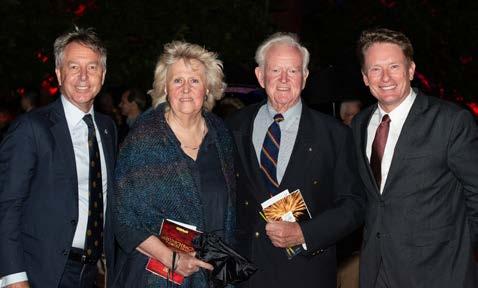
Ovals. A new grounds compound forms an important part of this next project. Alex thanked the Foundation for its magnificent work over half a century and said that he felt its best years still lay ahead of it.
Launching the capital campaign, Tim Shearer announced Scotch College Foundation seed funding of $100,000 for the project. He said the fundraising target was $15M. Of that, $3.4M was already in hand, with an additional $2.6M pledged, leaving $9M to be raised. Forms were distributed with the program for the evening, setting out various means of donating to the Anderson Pavilion project.
After the School Chaplain Rev. Doug Campbell’s benediction, a piper led the audience outside to the Main Oval, where a magnificent fireworks display over the Main Oval lit up the drizzly sky and brought a memorable evening to a close.
The success of the evening was due to the hard work of Foundation Coordinator, Rebecca Mortimer, along with Bequest Program Manager, Sandra Dick, Events Manager, Michelle Dierkx and the Events team, Mitchell Harding of ICT Services, Head of IT, Matt Power, ICT Office Manager, Mel Cadman, Workplace Health and Safety Manager, Joshua D’Alessi, Maintenance Manager, Anthony Bakes, Director of Communications and Marketing, Elizabeth Briggs, and Curator, Michael Smith and the Grounds team.
The College Organist, David Brown, and Liam Chen (Year 11) played the Memorial Hall organ. The piper was Hugh Hasker (Year 11).
FOUNDATION
DAVID ORR’S ORRERY LAUNCHED AT AMC FUNCTION

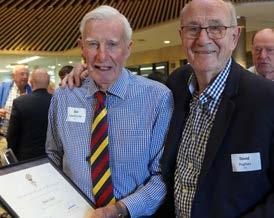
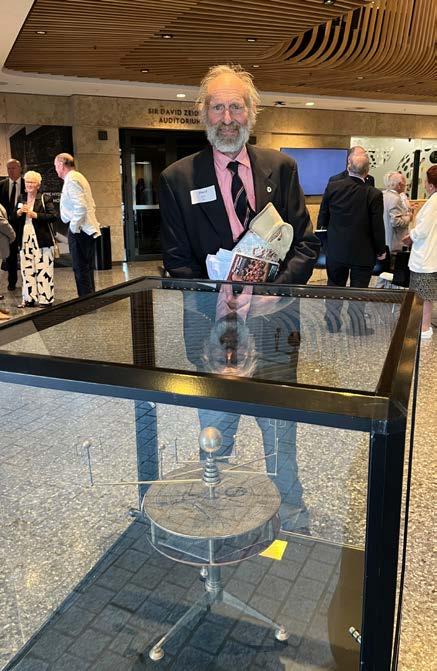

DEVICE DISPLAYED PROMINENTLY IN CENTRE FOR SCIENCE FOYER
Bagpiper Brian Symington (’65) played as 60 Alexander Morrison Circle members and friends arrived for drinks and canapés in the Sir Zelman Cowen Centre for Science’s Peter Henderson Foyer on the evening of 6 February.
Bequest Program Manger Sandra Dick warmly welcomed everyone and handed over to Head of Science, Kerrie Ardley. Kerrie thanked Old Boy David Orr (’69) for his generous gift to the school of an orrery (an apparatus which represents the motions and phases of the planets in the solar system), which is now displayed prominently in one of two glass cases at the Centre for Science’s front entrance, both of which were provided by the Scotch Foundation, through Sandra Dick.
Kerrie said the orrery, ‘a fusion of art, science, and philosophy, brings the vast complexities of space closer to us, allowing a tangible exploration of celestial mechanics and inspiring a deeper appreciation for the universe’.
2. GUS HAWTHORNE (’52), DAVID HUGHES (’60)
3. DAVID ORR (’69)
4. DR MARGOT AND EMERITUS PROFESSOR NEVILLE YEOMANS AM (’59), WENDY HILTONWOOD
5. JUDITH ROBINSON, TIM SHEARER (’85), IAN LONG (’58), SCHOOL CAPTAIN MATT CALLAGHAN
6. ANNA CAMPBELLFINDLAY, MIKE SIM (’78), DI MCNAMARA
Also displayed at the entrance in a second glass case is a set of vintage balancing scales, relics from Scotch’s former Science and Chemistry laboratories and classrooms. Kerrie said the scales ‘serve as a tribute to the enduring legacy and rich heritage of academic excellence at Scotch College’.
Sandra introduced School Captain Matt Callaghan, who spoke impressively of his good fortune in having attended Scotch as a scholarship recipient, expressing his gratitude for the way the Scotch Family has enabled him and all scholarship recipients to reap the priceless benefits of a Scotch education.
Head of Advancement, Tim Shearer (’85), echoed Sandra’s welcome, and acknowledged the Principal, Dr Scott Marsh, who was en route to a Year 7 parents’ information session. Tim said attention was now turning to the Main Oval Project, pending School Council approval. He invited AMC members to consider supporting this project, as it will be Scotch’s first major investment in sports infrastructure since the opening of the Cardinal Pavilion in 1994.
Scotch Foundation President Mike Sim (’78) thanked David Orr for his gift to the school, Kerrie Ardley for her explanation of David’s gift, Matthew Callaghan for his eloquent address, and Sandra Dick for organising this event, and for her passionate support of the Foundation and care for AMC members. Mike also acknowledged all AMC members for their ‘quiet and consistent’ support of Scotch.
Formalities over, guests enjoyed conversation over drinks and canapes as the evening concluded.

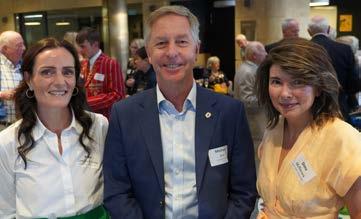
THIS PAGE:
1. DR SCOTT MARSH, RHONDA MCMURTRIE, ROS TURNLEY

EMG EASTER SERVICE RETURNS TO ITS ‘HOME GROUND’


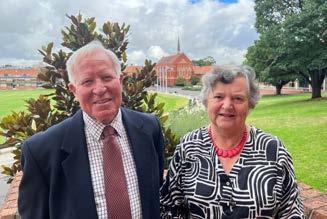
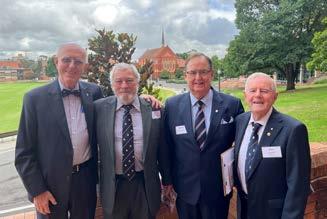
BACK TO THE CHAPEL AFTER FOUR YEARS
Much to their delight, 80 East Melbourne Glen Chapter members and guests celebrated the EMG Easter Service in the Littlejohn Memorial Chapter. It was a happy return to the chapel after a four-year hiatus.
OSCA Chaplain , Rev Graham Bradbeer conducted a beautiful service, as autumn sunshine filtered down through the chapel windows. The welcome and call to worship was followed by a hymn, The Old Hundredth, a musical version of Psalm 100, with this version dating from the mid-16th century , when it was composed by Louis Bourgeois.
The first gospel reading, Luke 24: 1-12, was by EMG Chairman Ken Jasper AM ('55), which was followed by Graham Bradbeer’s prayer of invocation and intercession. With the return to the Littlejohn Chapel, Graham appropriately based his prayers on a book of prayers composed by former Principal Dr William Littlejohn.
The Principal, Dr Scott Marsh took the second reading, Luke 24: 13-31, which was followed by the second hymn, Rock of Ages , written by the Rev Montague
Toplady in 1763, a hymn which reflects themes of divine grace, redemption, and the refuge found in God.
Graham Bradbeer’s sermon was entitled ‘Easter: the puzzle, unbelief and recognition’ and focused on issues of puzzlement (when Jesus’ tomb was discovered empty three days after the crucifixion); unbelief (of Jesus' resurrection among the disciples and wider community); and recognition (when it became beyond doubt that Jesus had risen from the dead).
The final hymn was To God be the glory, dating from 1875 with lyrics by Fanny Crosby and tune by William Howard Doane. Steve Manders (’73) expertly played the chapel organ for the hymns.
Everyone then headed for the Boykett Room in the Cardinal Pavilion for hot cross buns, tea and coffee. Special guests included the Principal Dr Scott Marsh, Council Chairman, Hamish Tadgell ('85), and the two oldest Old Boys present, former long-serving Scotch teacher, David Scott (’43), and Ian Gillies (’44) – both 97 years old.
Rebecca Mortimer received wellearned applause for efficiently organising this most successful EMG event.
1. MARCIA AND DAVID TENNENT (’57), LIZZIE HOWCROFT. 2. PETER (’58) AND ROS TURNLEY. 3. HOWARD (’62) AND JENNIFER BROWN. 4. DAVID ASHTON (’65), NEIL HARTSMITH (’60), DAVID TENNENT (’57) AND KEN JASPER AM (’55).
FOUNDATION


ANOTHER MOST ENJOYABLE EMG CHRISTMAS LUNCHEON
THE BOYKETT ROOM WAS THE VENUE FOR THIS TRADITIONAL GET-TOGETHER
East Melbourne Glen Chapter members from near and far gathered in the Boykett Room at Scotch on 15 December for the 2023 EMG Christmas Luncheon, with the muster totalling 165. Among the diners, Kim Kirsner (’58) and his partner, Kathryn Hird, had made the longest journey – from Perth – while Will Mactier (’53) had come from Tatura, Peter Colclough (’67) had travelled from Albury, and Wendy Pullar came all the way from Cobram.
Among the Old Boys present, David Smith (’47) at 95, was the most senior, with Bill Philip (’46), also aged 95, but a ‘junior’ to David by five months.
The lunch began on a sombre note, with the announcement that revered Old Boy Brian Randall (’51) had died that very morning after a long illness. Brian’s nephew, OSCA Executive Director, Scott Montgomery (’85) paid a heartfelt tribute to Brian, a major contributor to so many areas of Scotch life for decades.
Master of ceremonies, Scotch’s Head of Advancement and Foundation Executive Director, Tim Shearer (’85) welcomed everyone, pointing out that the Principal, Dr Scott Marsh and his wife Anna, who were present at the lunch, had recently received their Scotch Foundation membership certificates.
EMG Chairman Ken Jasper AM (’55) reiterated Tim’s welcome, and handed over to OSCA Chaplain, Graham Bradbeer for an eloquent grace.
With the main course finished, Tim welcomed Dr Scott Marsh to the lectern. Dr Marsh told of the warm welcome he and his family had received, and how much a part of the Scotch Family they had become. He showed a video of Scotch’s new Mallacoota property.
Dr Marsh, an accomplished musician, next took to the grand piano to play what he described as a ‘jazzed-up version of an old hymn’, Surrender All, which was greeted with sustained applause.
Dr Marsh said a primary focus during the year had been to build relationships, which he had strived to do by attending as many school, Foundation and OSCA events as possible, and visiting older Old Boys, such as Bill Morgan (’34). He has an open door policy with boys and staff, and he has participated in several ‘ask me anything’ sessions with staff.
He spoke amusingly of his resemblance to Colonel Sanders of KFC fame, and how he had first been alerted to it some years ago when a schoolboy said he had seen Dr Marsh on television (which turned out to be a KFC commercial). Over the year he had become very much aware of the school’s Scottish heritage and the vision of its founder, James Forbes, who was a product of the Scottish enlightenment.
One of the challenges of Dr Marsh’s first year had been to try to remember the names of 1800 Scotch boys, not to mention 600 staff and thousands of parents and Old Boys. Dr Marsh paid tribute to outgoing School Council Chair, Alex Sloan (’71), whom he said had been great to work with throughout the year, and he also valued the work of his strong school executive team and excellent teaching and operational and support staff.
‘I love being part of the Scotch Family’, he said, ‘and it brings me great joy.’ He wished all present a merry Christmas and a happy new year.
Having enjoyed a delicious meal of traditional Christmas fare –roast turkey followed by plum pudding – EMG members gathered in conversation before heading off into the pre-Christmas milieu.
The EMG Christmas Luncheon was well organised by Foundation Coordinator, Rebecca Mortimer, supported by Bequest Program Manager, Sandra Dick.
LEFT: INVITATION TO THE EMG CHRISTMAS LUNCHEON. ABOVE: SUNSET AT SCOTCH'S MALLACOOTA PROPERTY.
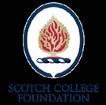
THE SCOTCH COLLEGE FOUNDATION
ART SHOW

29 AUGUST – 1 SEPTEMBER 2024








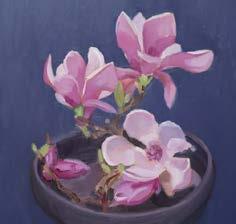
DAVID YU FAMILY FOYER, JAMES FORBES ACADEMY, SCOTCH COLLEGE
THURSDAY 29 AUGUST − Opening Night Cocktail Party 6.30-9pm
FRIDAY 30 AUGUST − Viewing 4pm to 7pm
SATURDAY 31 AUGUST − Viewing 10am to 3pm
SUNDAY 1 SEPTEMBER − Viewing 10am to 1pm
Proceeds from the Scotch College Foundation Australian Art Show are directed to the Scotch College First Nations Support Fund.
Artists shown here: Vicki McInnes; Cathy Usatoff; Phil Wischer; Craig Mackie; Sam Nash; Ben Shearer; Anne-Marie Jenner; Cathy Quinn; Penelope Metcalf
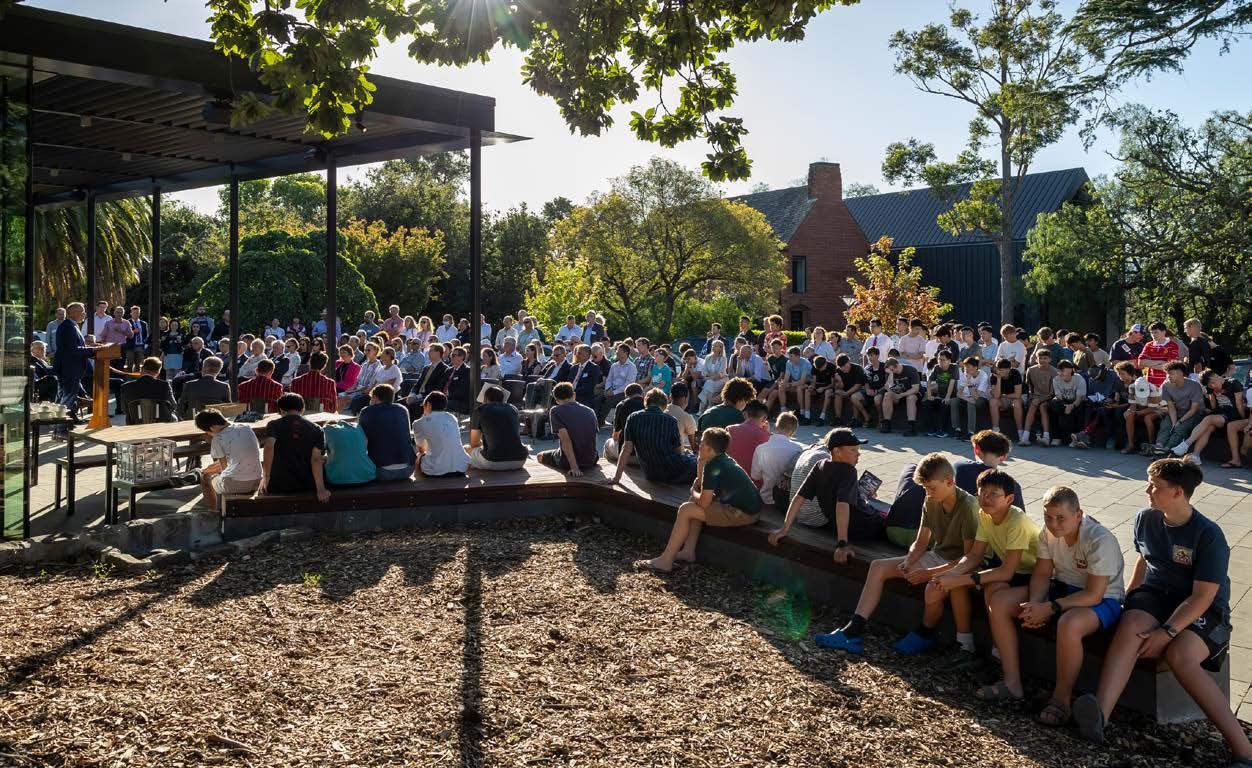
ERRINGTON RETREAT – THE ‘HEART OF THE HILL’ – NAMED AND LAUNCHED
A GREAT PLACE FOR BOARDERS OF THREE HOUSES TO CHAT, STUDY, OR WORK OUT
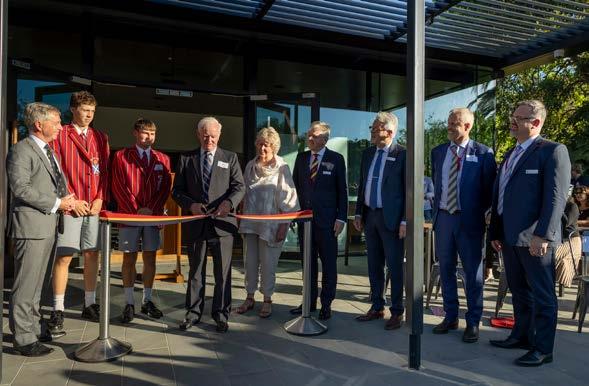

On the perfect summer evening of 31 January, a wonderful new boarding facility was officially opened and took its place in the heart of Scotch’s boarding precinct.
The superb Errington Retreat, which incorporates what was once the laundry of Glen House, now provides an excellent means for boys from the three Scotch boarding houses to come together, to chat, study or to work out in the gym. The retreat features an outdoor patio area with barbecue, a living room area, a dining hall, a gym (specifically for boarders) and toilet and change room facilities for parents.
In the warmth of the evening, more than 300 Scotch Family members gathered on the patio outside the main entrance to the retreat, including the boarders who joined the event in good numbers after their evening meal.
Beginning the opening ceremony, the MC, Scotch’s Head of Advancement, Tim Shearer (’85), introduced the Principal, Dr Scott Marsh. Dr Marsh welcomed all guests, in particular thanking Max (’56) and Fay Errington, through whose wonderful generosity the retreat has been created, and all other donors to the project.
He said Scotch’s boarders are the school’s oldest sub-culture. In Scotch’s sesquicentenary history, A Deepening Roar, a boarder of more than 100 years ago had described his attitude towards day boys. To him, ‘a day boy’s life was home, and the school was just where he got his education. For us (the boarders), Scotch was home, and it was our life altogether’.
But Dr Marsh acknowledged that many years ago, boarders’ times could be tough. Food was often cold and insufficient. A Deepening Roar tells of boarders who in 1949 caught pigeons on window ledges and cooked them for supper on tiny spirit stoves; and yet the history also shows that for many boarders, life on the Hill was the happiest time of their lives.
Dr Marsh said that with the opening of the Errington Retreat, two projects remained to complete the Boarding Project. The central road between the Boarders’ Dining Hall and the Errington Retreat is being removed, to be replaced by a ‘village green’ space at the heart of the Hill. The project’s final stage is the installation of heritage gates on the corner of Glenferrie and Callantina Roads.
The Principal acknowledged the contribution of Mike Sim (’78) and the School Council’s Property Committee to the project, and thanked the Boarding staff, led by Dean of Boarding, Tim Byrnes, and all the Hill staff for their care and perseverance – and also the
boys: ‘Thank you for making life on the Hill so special,’ he said. ‘You are a great group of young men.’
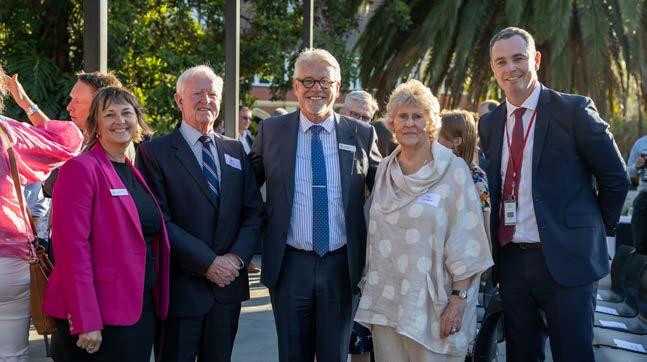
Describing the retreat project as ‘incredibly complex’, Dean of Boarding, Tim Byrnes said it had been completed while keeping a full contingent of boarding students and conducting an extensive boarding program, all of which occurred in the middle of a global pandemic and a subsequent building industry crisis. ‘You can probably understand why I am a little greyer with somewhat less hair today than I had four years ago,’ he said.
Tim also paid tribute to all involved in the project, in particular Max Errington, without whose generosity, he said, ‘not one stone would have been turned’. He also thanked the School Council led by former Chairman Alex Sloan ('71), Foundation President Mike Sim, Property Director, Bill Sciarretta, Heads of the Boarding Houses, Andrew Argent, Claire Jones and Pino Cutinelli, and Head of Advancement, Tim Shearer.
Prior to unveiling the opening plaque, School Council Chair Hamish Tadgell ('85) said it was envisaged the Errington Retreat would become ‘the heart of the Hill’ and a hub to congregate, socialise, share time together and allow for meaningful interactions and conversations, leading to connections and ultimately lifelong friendships’. He also thanked all who had been involved in the vison and building of the retreat, particularly expressing his deepest appreciation of Max and Fay Errington’s generous philanthropic support. He invited Max and Fay to cut the cardinal, gold and blue ribbon.
After the ribbon-cutting, Scotch Foundation President, Mike Sim (’78) reiterated Hamish Tadgell’s thanks to Max and Fay Errington, also thanking all donors to the project, in particular the 35 key donors listed just inside the front door on the left of the three rooms named after the Lee, Zhu and Zeng families.
He thanked Tim Shearer, Sandra Dick, Rebecca Mortimer and the Foundation office, and paid a special tribute to the Dean of Boarding, Tim Byrnes and Heads of McMeckan and School Houses, Pino Cutinelli and Andrew Argent, as well as the Scotch team who made it all happen, led by Bill Sciarretta, and his team of Greg McMahon, Anthony Bakes, Elliot Green and Curator, Mick Smith. He said: ‘These people ensure that Scotch’s interests and standards are always met – thank you!’
Mike singled out Craig de Mamiel, the Grounds staff member whose domain is the Hill, thanking Craig for all the love and attention he has devoted for many years to the beautiful boarding precinct gardens.
Mike also acknowledged Cox Architects, Building Engineering and DDH Quantity Surveyors for their key roles in the retreat project.
With the formalities over, guests were invited to inspect the Errington Retreat, and drinks and food were served.
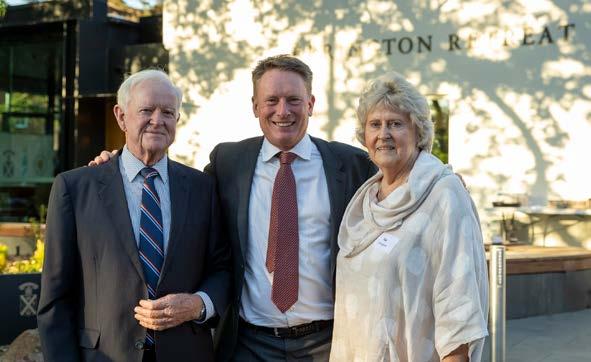
MAX ERRINGTON’S LONGTERM INTEREST IN SCOTCH’S WELFARE
Born at Traralgon on 21 May 1939, Maxwell John Errington grew up there and attended Traralgon High School (1951-52) until boarding at Scotch in School House from 1953 to 1956. He was also a member of Littlejohn House, which was then the sports House for all boarders.
At Scotch Max was involved in swimming and cadets, and loved the beauty of the Main Oval, which he was allowed to mow with the Scotch tractor. Max’s main interest, however, was rowing. He rowed in the 1955 3rd VIII and in the 1956 1st VIII.
Max returned to Traralgon to join the family business, Errington’s General Drapers. After 18 months he moved to Errington’s Store for Men, which he managed until it closed on 14 July 1991. Max then retired, and managed a number of commercial properties he owned in Gippsland.
On 22 September 2013 Max married Fay Jeanette Palmer at the Hawthorn Presbyterian Church, where he had been confirmed while at Scotch.
Max inherited his athleticism from his grandfather, Thomas Young Robert Anderson (born 25 April 1872, SC 1882-92, died 12 August 1943), who was a member of the 1st XI and 1st XVIII from 1890 to 1892, winning premierships in both sports in 1891 and 1892. Other relations at Scotch were Max’s great-uncles William David Anderson (born 8 November 1867, SC 1881-82, died 26 October 1940), David Calder Anderson (born 22 September 1873, SC 1882-87, died 27 June 1957) and Harold James Anderson (born 15 August 1876, SC 188390, died 19 March 1929).
Max’s ongoing interest in the future welfare of Scotch is as strong as his past connection with it.
OPPOSITE PAGE, MAIN PHOTO: THE SCENE AT THE OPENING OF THE ERRINGTON RETREAT ON 31 JANUARY. MIIDDLE PHOTO: MAX (’56) AND FAY ERRINGTON CUT THE CARDINAL, GOLD AND BLUE RIBBON. THIS PAGE, LEFT PHOTO, LEFT TO RIGHT: VICE PRINCIPAL HEAD OF SENIOR SCHOOL, KATRINA BRENNAN, MAX ERRINGTON (’56), THE PRINCIPAL, DR SCOTT MARSH, FAY ERRINGTON, VICE PRINCIPAL, HEAD OF JUNIOR SCHOOL, TOM SAVILL. RIGHT PHOTO: HEAD OF ADVANCEMENT, TIM SHEARER (’85), WITH MAX (’56) AND FAY ERRINGTON

MR TIM SHEARER ('85) HEAD OF ADVANCEMENT
EDUCATION: THE CATALYST FOR SOCIAL MOBILITY
THROUGH EDUCATION, OPPORTUNITIES ARE EXPANDED, HORIZONS BROADENED AND COMMUNITIES STRENGTHENED

I recently met with donors who made a generous commitment to the school’s Scholarship Fund. Both parents, who are now accomplished members of the medical profession, shared that each had been the beneficiary of scholarships, and that they felt compelled to create similar opportunities for others. In explaining their reasoning, they shared that ‘education is the only thing that provides social mobility’.
As someone who has a firsthand and up-close view of the impact of our scholarship program – both from the perspective of our generous donors and the impact that they are seeking to make, and the recipients, witnessing the impact that a Scotch education has on their lives – the concept of education shaping social mobility got me thinking.
After some reflection, I suspect that education and its impact on social mobility is one of the key cornerstones of a just and equitable society. Social mobility represents the ability of individuals to transcend the circumstances of their birth and attain a higher socio-economic status through their own efforts and abilities. In this context, education emerges as the most potent tool in enabling social mobility.
I am fortunate to witness firsthand the impact that education plays in fostering social mobility, highlighting how it empowers individuals to break free from the shackles of socio-economic constraints and realise their full potential.
In some ways education can be seen as the great equaliser that bridges the gap between privilege and disadvantage. It provides a level playing field, where individuals are evaluated based on their knowledge, skills and potential, rather than simply their social or economic background.
In countries like Australia, with robust education systems, we are fortunate that individuals from marginalised communities have the opportunity to compete on an equal footing with their more privileged counterparts through scholarship opportunities at schools like Scotch. Through education, they can acquire the skills and knowledge necessary to pursue higher education, secure better job opportunities, and ultimately improve their socio-economic standing. This process of empowerment through education highlights how education is a cornerstone of social mobility.
Education also serves as a powerful mechanism for breaking the cycle of intergenerational poverty. When individuals from disadvantaged backgrounds have access to quality education, they are equipped with the tools needed to rise above their circumstances. They can acquire skills that are in demand in the job market, increasing their chances of obtaining stable employment and achieving financial independence.
Education expands the horizons of individuals, exposing them to a world of knowledge, diverse perspectives, and a wide range of opportunities. It equips them with critical thinking skills, the ability to analyse complex issues, and the capacity to adapt to evolving circumstances. These qualities are invaluable – and will become increasingly invaluable – in a rapidly changing global economy.
Moreover, education opens doors to higher education, specialised training and advanced skill development. This, in turn, leads to increased earning potential and access to professions that offer greater
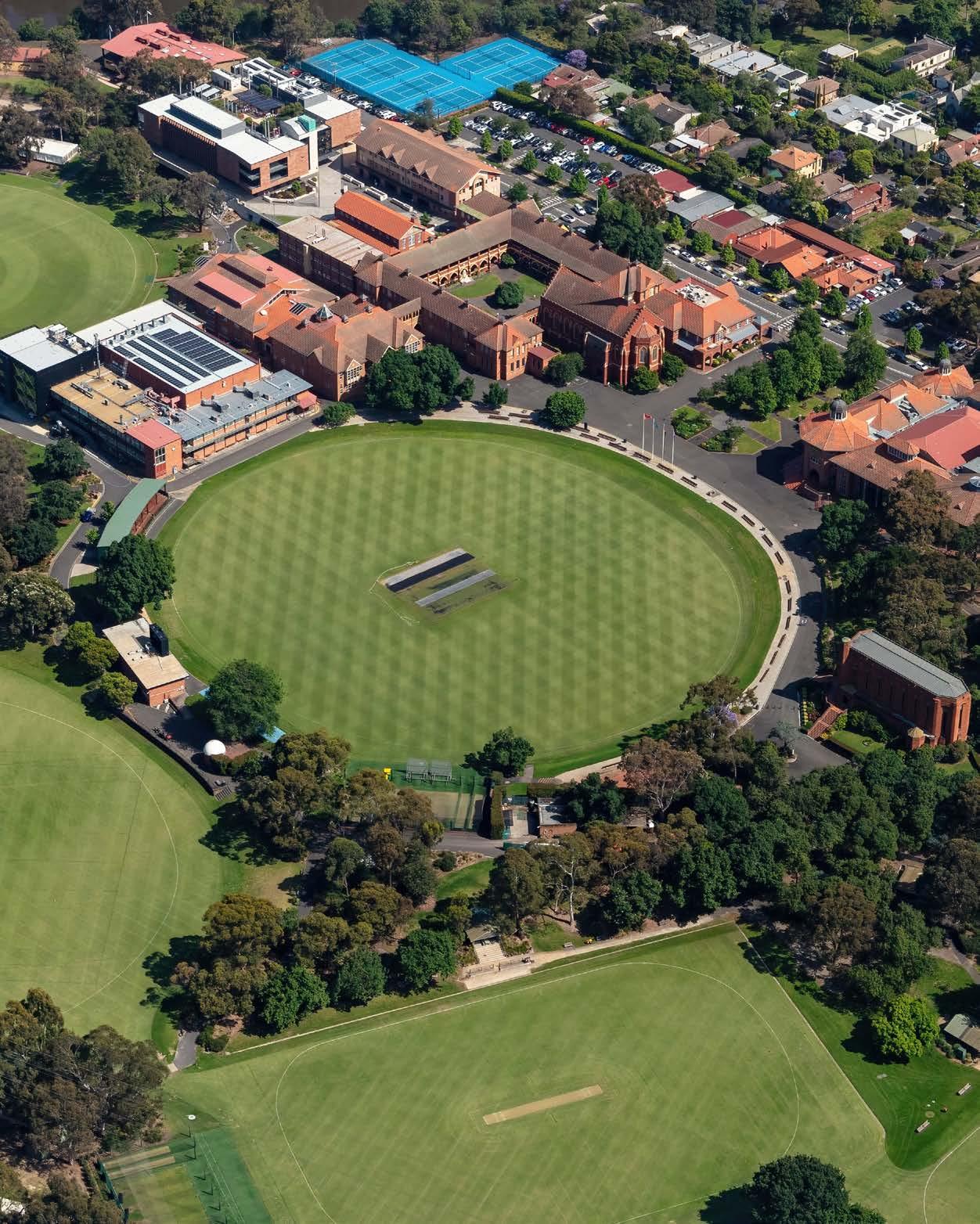
financial stability and upward mobility. Through education, individuals are not only prepared to meet the challenges of the modern world, but also to shape it. Furthermore, education promotes tolerance, empathy, and a deeper understanding of diverse cultures and perspectives. It encourages social integration and helps bridge divides, fostering a more inclusive and harmonious society. In this way, education not only propels individuals upwards on the socio-economic ladder, but also strengthens the very fabric of society itself.
Through my experience at Scotch – and through conversations with enlightened scholarship recipients – I am now aware that education stands as one of the linchpins of social mobility. It empowers and assists individuals to transcend the circumstances of their birth, break free from the cycle of poverty, and realise their full potential. Through education, opportunities are expanded, horizons broadened, and communities strengthened.
I encourage more people to invest in accessible, quality education to ensure that every individual has the opportunity to climb the ladder of social mobility, thereby fostering a more just and equitable world.
TIM SHEARER ('85) – HEAD OF ADVANCEMENT
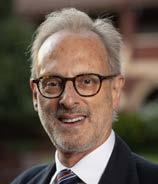
MR STEPHEN WEBSTER ('73) OSCA PRESIDENT
HOW OSCA ADVANCES THE CONCEPTS OF BEAUTY, GOODNESS AND TRUTH
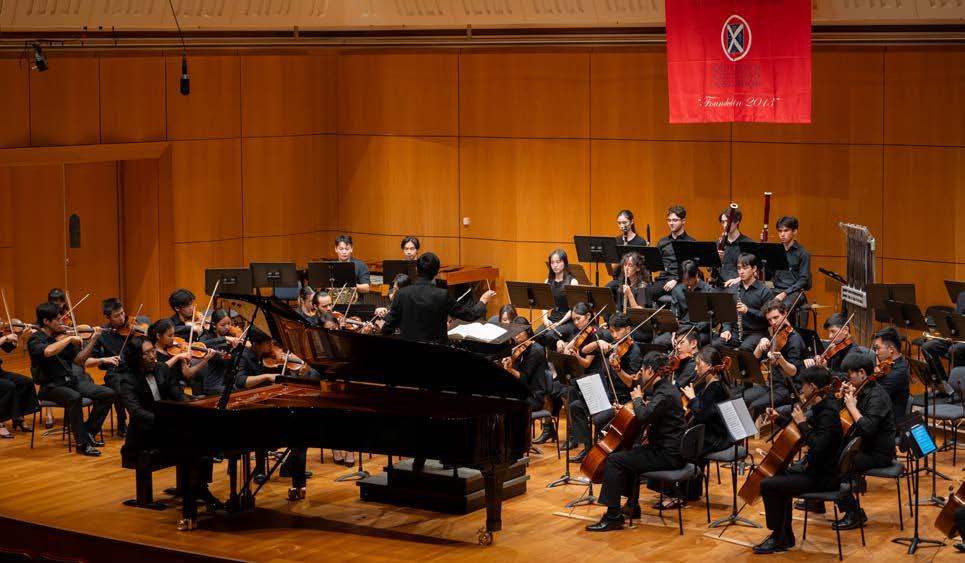

WAS GREAT TO BE THERE WHEN THE OLD SCOTCH SYMPHONY ORCHESTRA RETURNED TO THE STAGE OF THE IAN ROACH HALL ON 24 MARCH. THIS RE-ENERGISED AND TALENTED GROUP PUT ON AN AMAZING CONCERT WHICH CAPTIVATED THE AUDIENCE.
A STRATEGY OF PROVIDING REASONS AND WAYS TO CONNECT AS WELL AS OPPORTUNITIES TO GIVE BACK
As Old Scotch Collegians, we have directly benefited from an educational foundation that embodies the transcendent ideals of beauty, goodness and truth symbolised by the school’s colours of cardinal, gold and blue. OSCA has a unique opportunity to actively advance these noble concepts, through its strategy of providing the Scotch Family with reasons and ways to connect and opportunities to give back. By doing so we strengthen this rich narrative to discern truth, make wise decisions and pursue beauty across all present and future endeavours.
OSCA provides the opportunity to appreciate and create beauty as one of the highest expressions of the human spirit. OSCA promotes and supports the aesthetic souls of the Scotch Family through such activities as the brilliant productions of the Old Scotch Music and Drama Club and the uplifting performances of the Old Scotch Symphony Orchestra and the Concordis choir. Through OSCA’s support, Old Boys and members of the Scotch Family can express their talents for the benefit of the community.
Goodness manifests itself through OSCA by providing alumni with the opportunity to give their time, expertise and wisdom in a variety of diverse activities. They can support and participate in the Future Pathways program of the school, to help shape and guide the decisions that students must make about their life beyond the Monash Gates or in the industrybased networking opportunities for alumni.
By joining one of OSCA’s many clubs and societies, they can pursue their sporting or other interests with other members of the Scotch Family, and benefit from
the powerful model of ethical conduct, integrity and commitment to the service of those who have gone before.
Crucially, OSCA upholds the value of truth through its support of a comprehensive and humane curriculum based on Christian values that prepares students to grapple with complexity, and to think critically and empirically by steadfastly adhering to the facts. OSCA retells the stories of Old Boys who have a quest for truth that pushes the boundaries of knowledge into new frontiers and are exemplars for all.
By actively advancing these aspirations, OSCA reflects the school as a bastion of beauty, goodness and truth that positively impacts students, the rest of the Scotch Family and through them, the wider community. The relationships built through the bonds of shared experience and purpose reverberate across generations and become the profound connections that are the Cardinal Thread. In essence, OSCA and the Scotch Family uphold the highest customs of its traditions while ensuring that Scotch remains a contemporary force for enlightenment.
The true legacy of Scotch extends far beyond the mere conveying of facts or skills. Its greatest impact is the cultivation of human potential towards personal fulfilment and the betterment of the world around us. With beauty providing inspiration, goodness providing compassionate drive and truth providing enlightened direction, OSCA works in perpetuity to support the work of the school to produce successive generations of men with good character who shape the world around them, and in doing so, they honour the past while benefiting the future.
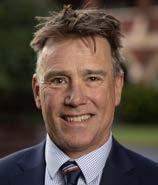
ACCESSING THE RESOURCES OF THE AMAZING SCOTCH FAMILY


I AM OFTEN ASKED ABOUT THE SCOTCH NETWORK, HOW IT TICKS AND HOW IT WORKS FOR THE STUDENTS COMING THROUGH THE SCHOOL AND FOR OUR OLD BOYS. HERE ARE MY TOP TIPS TO USE THE RESOURCES OF THE AMAZING SCOTCH FAMILY AND THE PEOPLE WHO MAKE IT UP.
TOP TIPS:
1- GET RECONNECTED. Register for OSCAConnect, get a LinkedIn page and reference your old school.
2- GET INVOLVED in your alumni association. We have 26 clubs and societies, covering a wide range of interests and activities, which are always looking for new members.
3- PICK A FEW EVENTS to attend every year. Come to a reunion, or an OSCA branch or a Scotch Family event.
4- BE A RESOURCE. Help Scotch boys by participating in the school’s careers and speaker sessions. Become a mentor.
5- REACH OUT to fellow Old Boys. Don’t be shy; use the directory on OSCAConnect.
6- COMMIT to staying in touch with key people. Use your network of friends and be willing to help out.
7- BE A GOOD REFERRAL partner and a people connector. Lead by example, be charitable, encourage others to attend their reunions.



3PM SATURDAY, 17 AUGUST 2024
Ian Roach Hall, Scotch College


Tchaikovsky - Romeo & Juliet Overture
Elgar - Cello Concerto in E minor, Op 85
Dvorak - Symphony No 5 in F major, Op 76
Hurwitz - Epilogue from Lalaland

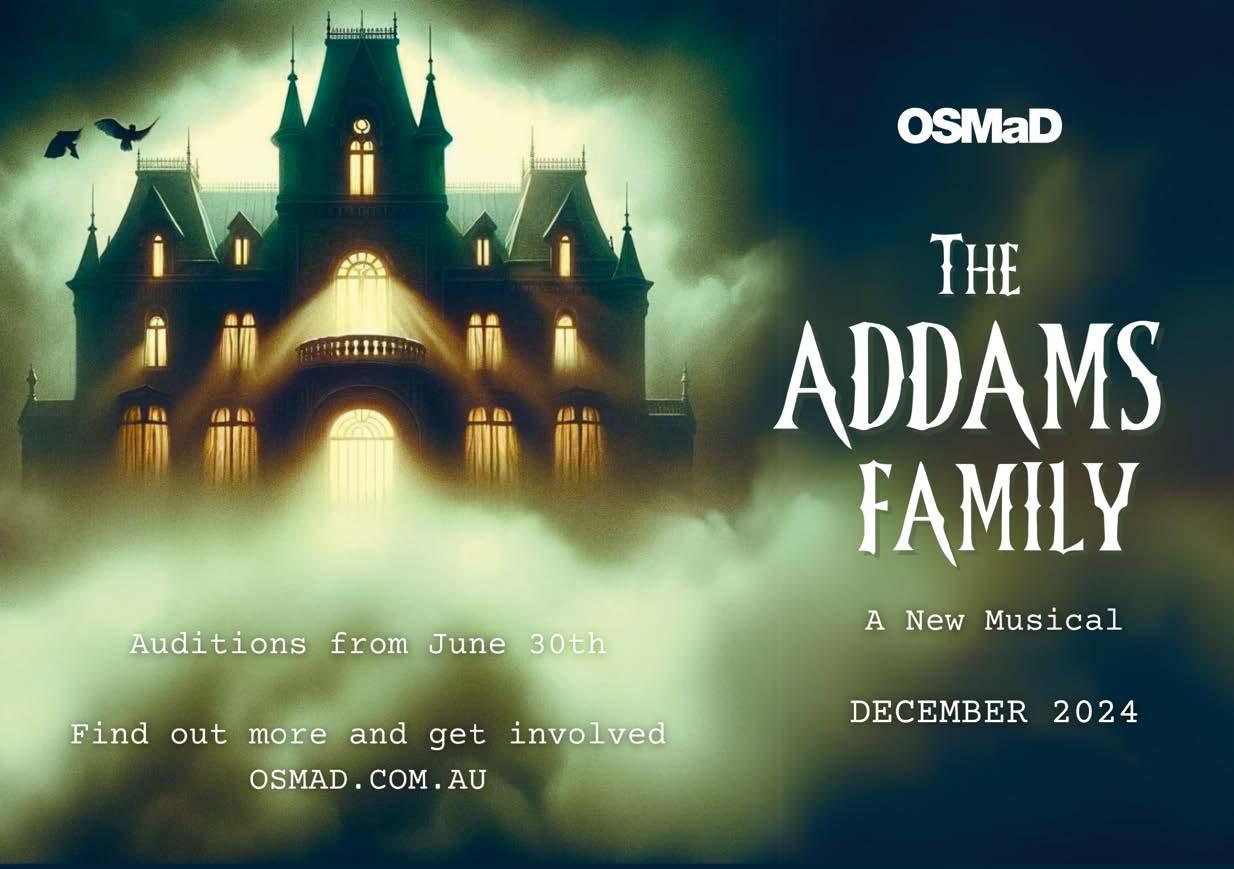

CALYPSO THE DOG, WORLD WAR II, AND TRACING THE EXTRAORDINARY LIFE OF A ONE-ARMED OLD SCOTCH COLLEGIAN
A REMARKABLE LIFE AFTER NARROWLY SURVIVING SERIOUS WAR WOUNDS
It may have started with idle curiosity about a dog called Calypso but it unravelled into an amazing story of a desert war, misfortune and chance survival at the hands of an enemy doctor.
First to the dog. Calypso was part-Dalmatian. In fact, her faded spots indicated she was at least a couple of generations distant from her pure-bred forebear. She was given to my father-in-law John Hamilton in March 1956 by a woman who worked at the US Consulate in Trinidad and Tobago.
Within three weeks, Calypso was dead, run over by a truck in the yard of Port of Spain's Colonial Hospital where Hamilton, a young Melbourne doctor, was working as part of a five-year overseas adventure in the United States, Caribbean, Asia and Europe.
Calypso's ill-fated stint with Hamilton, documented in weekly letters dutifully sent by the then 24-year-old to his parents back in Dandenong helped me date a bunch of colour slides I'd been poring over. I could see Calypso on a beach with some of Hamilton's glamorous friends, and there she was on the hospital lawn.
But on the same series of Kodachrome slides were pictures of a fishing trip and two blond boys holding the catch.
According to Hamilton's letters, about the same time Hamilton had acquired Calypso, he'd gone to Monos Island which sits between Trinidad and Venezuela. His travelling companions were John Bevan Todd, his wife Enid and their two children.
‘(Todd) is the Australian Trade Commissioner here who will shortly be leaving for Washington,’ Hamilton wrote, before offering this crisp summary of the
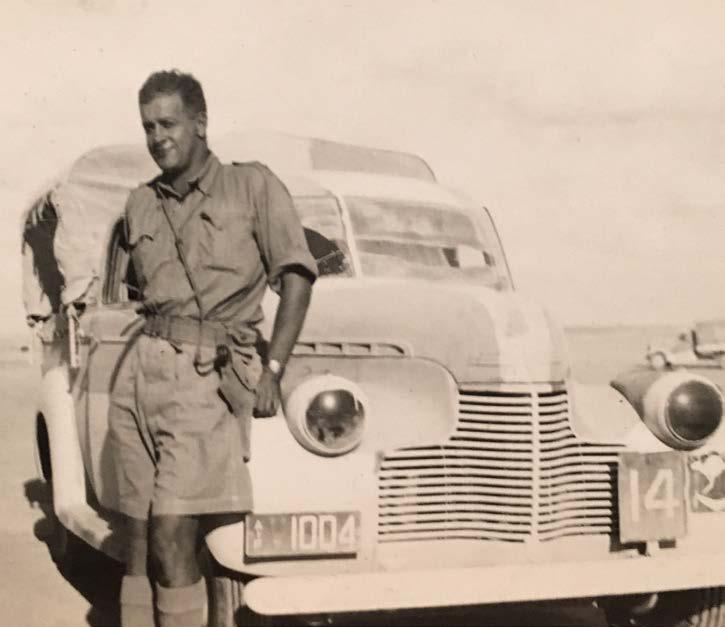
ABOVE: CALYPSO THE PART DALMATIAN IN 1956. BELOW: BEV TODD (’31) IN THE LIBYAN DESERT IN 1941

man: ‘He is youngish, one-armed and has an incurable disease called Parkinson's disease.’
One-armed? That was an odd detail to write so summarily, I thought. The explanation was left hanging, unanswered. Then I wondered at the picture of the two boys: If someone found a picture of me 65-plus years after it had been taken, would I want to see it? Of course I would.
Curiosity has an instant and easy ally. So I turned to Google. To my intrigue, John Bevan Todd (born 3 July 1915, died 21 March 1964) turned up in a 2015 edition of Great Scot in an obituary for his nephew. The entry said Todd attended Scotch between 1930 and 1931.
I emailed Scotch's Archivist Paul Mishura and asked if he had a contact for any of Todd's children. Within an hour, Mishura came back with a name and an expired email address for Todd's son, Dr John Jeffrey Todd (SC 1952-63).
Google told me John Todd had made a submission to a Tasmanian Government parliamentary committee on wood smoke in Launceston, some 15 years or so ago. His submission had a mobile number which I texted, hoping it was still current.
A few hours later, John Todd returned my text message, saying he was overseas but could chat. Next thing, he was looking at the slides over WhatsApp. ‘That's me on the right,’ Dr Todd said with considerable surprise. The other kid was a boy named Hugo Massey, he said. I showed him another colour slide of a fellow in shadow at the front of a boat. ‘That's my dad,’ he said, this time with delight, ‘and that's boatman Willy in the foreground.’
Out spilled what John could tell me of the father he knew for precious few years. John Bevan ‘Bev’ Todd, like many of his generation, had a life scarred by war. Indeed, he was very lucky to survive the conflict at all.
Born in 1915, he was 24 when Australia declared war on Germany in September 1939. He was quick to enlist and by January 1940 Bev Todd was setting sail for the Middle East on the RMS Otranto as part of the first convoy of the 2nd Australian Infantry Force.
After six months' training in Palestine and then a spell in Egypt, Todd found himself in Libya where, on 3 January 1941, the battle of
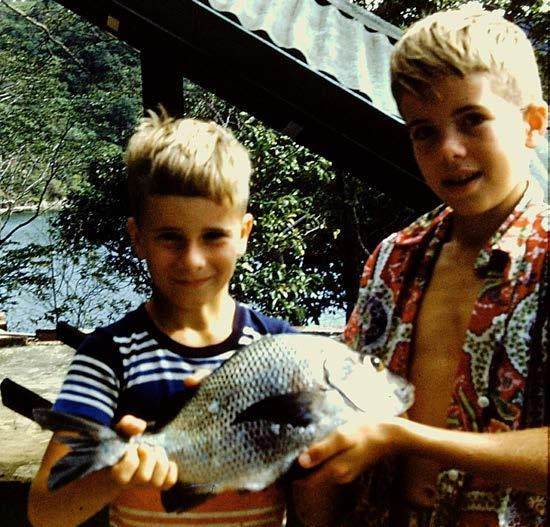
Bardia began. It was the first major Australian battle of World War II, pitting battalions of the 6th Australian Division against an Italian stronghold in the small harbour town.
‘On the third and final day of this battle, the vehicle my father was in was hit by a shell,’ John Todd says. ‘He was very seriously wounded and taken to the field hospital.’ Bev Todd lost his left arm in the explosion, as well as some of his left ear and shrapnel had punctured his legs and torso.
(This detail made me take another look at the shadowed photo of his dad on the boat. Sure enough, his left arm wasn't evident, although you needed to know what to look for.)
Bev Todd was in bad shape from the Italian shell. He was triaged into a medical tent reserved for other poor souls not expected to survive their injuries (the Battle for Bardia cost 130 Australian lives and 320 men were wounded).
But luck has fickle twists. Though Bev Todd had been unfortunate to be injured, he'd been lucky to live. Luckier still was that his survival came on the third day of the Bardia battle, for of the 40,000 Italians taken prisoner that day, many were medical staff from the military hospital.
A captured Italian medic tasked with tending to the Australian wounded went into Bev Todd's tent. He looked over the Australian's injuries and made a fateful intervention. ‘Family folklore says one of the Italian doctors said, “No he will probably survive, you better put him in the other tent”,’ John Todd says.
Bev Todd was saved by the intervention of an Italian doctor's unquestioning commitment to the Hippocratic Oath. About the same time, Todd's left arm had been found in the Libyan desert, still bearing his watch which was duly returned to him.
John Todd remembers his dad wearing that watch proudly – a reminder of the blast that had almost snatched his life in a distant desert and an unknown Italian doctor who ensured he lived longer.
Discharged, Bev Todd returned to Australia where he immediately re-enlisted, becoming the aide-de-camp to the Victorian Governor, Sir Winston Dugan, rising to the rank of lieutenant colonel. ‘He was the military man who stood behind the
LEFT: THE ILL-FATED CALYPSO ON THE BEACH IN MARACAS BAY, TRINIDAD IN 1956. RIGHT: HUGO MASSEY (LEFT) AND JOHN TODD (’63) HOLD UP THEIR FISH.
governor at all the fancy occasions,’ John Todd explains.
‘I suspect that period between recovering and then moving up in the military is where he learned a lot of his diplomatic skills, which then led him to move into diplomatic service.’
Bev Todd's first diplomatic appointment was to London, before being appointed Trade Commissioner to Trinidad in 1953.
John Todd remembers an idyllic Caribbean childhood of sea, sand and boats, of having a cook, a gardener and a chauffeur. But he remembers too that his dad had begun to experience tremors. ‘I guess luckily for us, the Australian Government agreed that being caught in the explosion, that the shock of all that might have triggered his Parkinson's,’ John Todd says.
The Todds were dispatched to the Australian Embassy in Washington where Bev Todd could receive still-experimental treatment at the Johns Hopkins Hospital. ‘In those days it was very crude – they just killed off a section of the brain which was thought to cause Parkinson's. Apparently, it did reduce the tremor, which was getting quite bad, but it also led to some loss of memory and speech, but it can't have been too bad because my sister and I as kids, we didn't notice.’
The family eventually returned to Melbourne in 1959 where Bev Todd's health deteriorated further. He developed bowel cancer, dying in March 1964, aged 49, leaving two children who knew very little of their father's war service.
Bev Todd, like many of his generation, hadn't been one to much burden those around him with what he'd experienced in war. What John Todd and his younger sister Sue have pieced together about their dad is from what their mother Enid and family told them, and from public records.
Sue Todd was only 14 when her dad died. ‘I felt I did not properly know the man who was my father, but like John I've spent many hours looking at dad's war files, his medical records, as well as what I have been able to find on Trove,’ Sue said.
‘I have a strong sense of dad being a gentle, thoughtful, courageous, intelligent man with a great sense of humour and a love of TV shows about the Wild West. Our Mum died young too – she was 61 and had her own significant struggles with health, so

ABOVE: MAJOR BEV TODD (THIRD FROM RIGHT) STANDS BEHIND VICTORIAN GOVERNOR SIR WINSTON DUGAN AS HE ACKNOWLEDGES RETURNING TROOPS OF THE 17TH BRIGADE, AIF, IN FRONT OF THE MELBOURNE TOWN HALL IN 1944.
BELOW: BEV TODD (’31 – LEFT) IN EGYPT WITH FELLOW OFFICERS.
I feel I didn't know her all that well either.
‘A few months before dad died he asked me what I wanted to do with my life. Whatever it was I said, he said to me that it sounded like being a psychologist. I recently retired after more than 40 years of being a psychologist. I was blessed that he offered
me that option in a time when girls became nurses or teachers.’
Bev Todd lived a short life, even by the standards of the post-war years, but a full one. And from what Sue remembers, he had a touch of modernity rushing through his veins. He'd been bright, ambitious and an up-and-comer in every field he'd thrown himself at.
It may have been blighted by an Italian bomb in the last hours of Australia's first major battle of World War II, but his extraordinary life can be remembered again, thanks to a dog called Calypso.
The authour of this article, ANDREW PROBYN ('88) is National Affairs Editor for Nine News, based in Canberra. He has twice been named Press Gallery Journalist of the Year, is a winner of the Melbourne Press Club Gold Quill and a three-time Walkley Awards finalist.
This article is reproduced by courtesy of The Age and The Sydney Morning Herald.
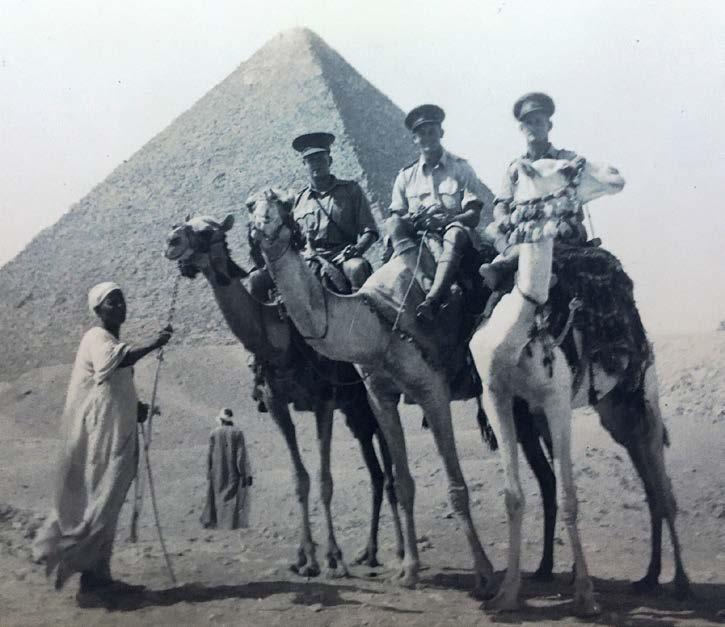
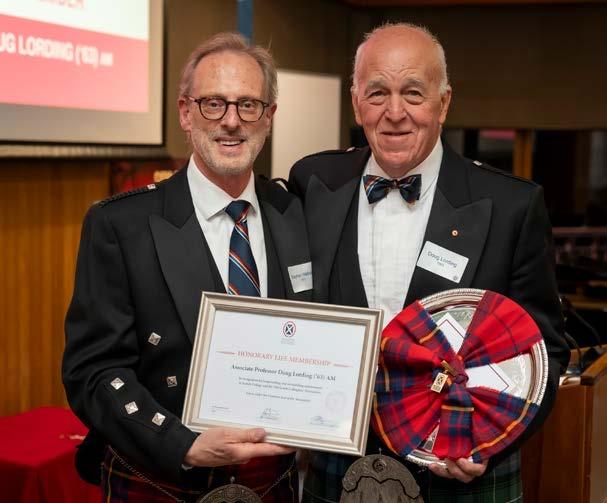


FORMER OSCA AND FOUNDATION PRESIDENT RECEIVES OSCA’S HIGHEST AWARD
OSCA HONORARY LIFE MEMBERSHIP TO DOUG LORDING (’64) AND MERIT AWARDS TO FIVE CLUB STALWARTS
The presentation of OSCA Honorary Life Membership to Associate Professor Doug Lording AM (’64) was a major highlight of the OSCA President’s Dinner, held in the Cardinal Pavilion’s Boykett Room on the evening of 15 November 2023.
Along with Doug’s award, four OSCA club members and a long-serving Victorian Scottish Heritage Cultural Foundation volunteer received OSCA Merit Awards during the dinner, in recognition of their devoted service.
DOUG LORDING attended Scotch from 1960 to 1964 as a member of Morrison House, of which he was 1964 Vice Captain. He played in the premiership 1964 1st XI, and was a member of the 1962 and 1963 1st Basketball teams, and Vice Captain of the 1964 1st Basketball team. Doug was a 1964 Probationer and a CUO in the Cadets.
He passed Matriculation in 1963 and was awarded a Commonwealth Government Scholarship. In 1964 Doug sat for further Matriculation subjects, gaining first class Honours in Pure Mathematics and Chemistry, and second class Honours in Calculus and Applied Mathematics, and in Social Studies.
Doug was an early member of the Old Scotch Basketball Club, and became Captain. He was also Captain and President of the
Old Scotch Collegians’ Cricket Club, including two successive grand final appearances and a premiership. He played cricket until 1990 and was named in the club’s team of the first 50 years.
On 28 November 1991 Doug joined the Old Scotch Collegians’ Association Council. He was its Junior Vice President and Vice President between 1995 and 1997. After leaving the Council in 1997 he rejoined in 2013 and subsequently was President from 2016 to 2017, leaving the OSCA Council on 21 November 2018.
From 2014 to 2023 Doug was a member of the Scotch College Foundation board, of which he was President from 2017 to 2023.
On 1 November 2015 Doug became a member of the School Council, on which he served until 31 October 2021. He is one of just 14 Old Boys known to have served in the governance of OSCA, the Foundation and the School Council.
Doug married Dr Elizabeth (Liz) Anne McDonald AM in 1976 at the Monash University Chapel. Their sons Tim Lording (’95) and James Lording (’98) attended Scotch. Doug’s daughters are Prudence Lording, who married Brendon Herron (’96), and Penelope Lording.
Doug’s grandsons attending Scotch are Rupert Herron (Year 6, 2024) who is Vice Captain of the Junior School, and his brother Charles Herron (Year 2, 2024); and their cousin Sebastien Lording


(Year 5, 2024). Their cousin Hugo McCaskill is booked to attend Scotch.
In 1971 Doug graduated MB BS and BMedSc from Monash University, and subsequently pursued a long and distinguished medical career. He specialised in endocrinology and andrology, and also contributed significantly to men’s health through voluntary community organisations including founding Men of Malvern Inc.
In 2020 Doug received a Member of the Order of Australia (AM) award ‘for significant service to medicine, to endocrinology and andrology, and to the community’.
OSCA MERIT AWARDS
Carol Davis
Victorian Scottish Heritage Cultural Foundation
CAROL DAVIS has been a volunteer with the VSHCF since 2012 and CEO since 2017, assisting the organisation in realising its role of promoting, preserving and celebrating Scottish culture in Victoria and nationally.
Carol has been the driver of the Melbourne Tartan Festival – a joint initiative of VSHCF and Scots of Victoria Coordinating Group. The Tartan Festival commenced in 2018 and Carol was the driver of turning the initiative into an actual event.
The festival has grown to include Victoria-wide events across at least 10 different activities. The Gala Dinner, held annually, now hosts over 300 guests and is the centrepiece of the festival. Carol is the leader of the organising committee but in practice undertakes a significant volume of the tasks required. It should be noted that Carol acts in a voluntary capacity.
The standing of the Tartan Festival has grown significantly since its commencement, and in 2023 the festival activities reached a new level of success, enjoyed by many members of the Scotch Family.
KATHERINE (KAT) MCDONALD embodies the Scotch Spirit by contributing in so many ways to the enrichment of the Scotch community, through her service to OSMaD. Kat has a long connection with the school, with her brother Andrew (’97), father Donald (’62) and uncle Ian McDonald (’61), as well as another uncle, Glenn Read (’75), all being Old Scotch Collegians.
Kat has been around community theatre from a very young age. She and her mother, Cheryl, were called in at short notice to assist with fitting mics for OSMaD’s very first production of Les Misérables in 2008, though they didn’t even make it into the program for that production!
Kat finally brought her considerable expertise and contacts to OSMaD in 2011, in charge of props for Sweeney Todd – the Demon Barber of Fleet Street, and has assisted as Deputy Stage Manager, Stage Manager and as part of the marketing team for various OSMaD productions.
After several years on the committee Kat was elected President of OSMaD in 2019, being brave enough to fill the very big shoes of OSMaD’s founding President, the late Richard Beveridge (’61). She remained on the committee in 2021 after taking a year off from that demanding role, but was re-elected as President in 2022.
Through the difficult COVID-19 times, Kath guided OSMaD’s successful staging of The Scarlet Pimpernel in 2022 and produced the Victorian premiere of Disney’s The Hunchback of Notre Dame in December 2023. Kat was elected as a Life Member of OSMaD at the AGM in January 2021.
Kat’s association with and contribution to the Scotch community goes back to her early childhood, assisting her father, Don McDonald (’62), when he was the building manager of Koomerang Ski Club, as well as attending many of the Easter
Katherine McDonald
Old Scotch Music and Drama Club
OPPOSITE PAGE, LEFT: DOUG LORDING AM (’64) RECEIVES HIS OSCA HONORARY LIFE MEMBERSHIP AWARD FROM OSCA PRESIDENT STEPHEN WEBSTER (’73). RIGHT: DOUG WITH LORDING FAMILY MEMBERS. THIS PAGE, LEFT: CAROL DAVIS RECEIVES HER MERIT AWARD FROM OSCA PRESIDENT STEPHEN WEBSTER (’73). RIGHT: KATHERINE MCDONALD WITH OSMAD MEMBERS AND OSCA EXECUTIVE DIRECTOR, SCOTT MONTGOMERY (’85).
HONORARY LIFE MEMBERSHIP

THE HON DR DAVID KEMP AC (’59)
CERTIFICATE OF MERIT
JAMES ROBINSON (’83)
In recognition for longstanding and outstanding commitment to Scotch College and the Old Scotch Collegians’ Association
working bees at Mount Buller. Kat helped on various Family Day cake stalls as well as assisting with Social Services and being involved with the 1st Hawthorn Old Scotch Rover Crew.
Given under the Common Seal of the As sociation
Richard Piesse (’59)
Old Scotch Bushwalking Club, Old Scotch Tennis Club and Old Scotch Athletic Club
RICHARD PIESSE was a member of the Old Scotch Tennis Club for almost 40 years. He was one of the founding members of the club when it was formed in 1959 by Frank Stuckey, a newly-arrived teacher at the school. In that year the club entered two teams in the winter competition run by the Grammarians and Public Schools’ Association (later to become the Past Students’ Tennis Association).
Richard was a member of one of those original teams, and he continued to play competition tennis for the club for many years, most often at the A Reserve or A Grade level.
George I. Aitken
Richard was a good player, who was well respected and who was selected as Captain of his team on a number of occasions. He played in several premiership teams over the years, as well as serving as Treasurer and Vice President, as the club grew to over 100 players and 11 competition teams, making it the largest club in the Past Students’ Tennis Association.
In 1994, Richard Piesse was one of the ‘founding fathers’ of the Old Scotch Bushwalking Club, along with Graham Stanley (’61), Neil Hart-Smith (’60) and David Ashton (’65), remaining an active member ever since. In many ways (to coin a phrase) he has become the ‘tribal elder’ of the club.
He has served the club by leading many walks over the years, and he continues to provide this leadership role. He takes a particular interest in the goldfields area of central Victoria, and he has led several walks in this area.
During walks Richard’s knowledge about native plants along the way is invaluable. He notices native plants such as tiny, delicate orchids which other walkers have overlooked. Richard has not been in the best of health for many years but has continued to rise above this. He takes part in walks with considerable determination.
As well as his participation in Old Scotch Bushwalking Club and Old Scotch Tennis Club activities, Richard also competed for the Old Scotch Athletic Club for 20 years from 1980, particularly in cross-country events. He continued to compete in cross-country until he moved to Castlemaine in 2000.
Sam Shearer (’10)
Old Scotch Soccer Club and Old Scotch Cricket Club
SAM SHEARER has played for the Old Scotch Soccer Club Seniors since he was in Year 12 at Scotch. In 2014 he was made
Captain of the club and has remained in that role to the present day. Sam has been a committee member since he was made Club Captain.
In recognition for longstanding and outstanding commitment to the Old Scotch Collegians’ Association
Given under the Common Seal of the As sociation
Not only has his on-field contribution to the Seniors been immense, but his overall influence over the culture of all teams and sincere interest in the welfare and running of both Saturday and Sunday squads has been outstanding.
However, it has been the Seniors where he has flourished, playing alongside teammates both from school and countless other backgrounds, from young players to players in their late 30s.
Sam was part of the club’s promotion to State League 2 in 2013 and then led the Seniors to promotion to State League 1 in 2022. He has won the league best and fairest twice and the club best and fairest twice. In addition, 2023 was his 10th straight year as Club Captain – a club record.
Sam has also made significant contributions to the Old Scotch Cricket Cub, playing more than 140 matches, scoring over 5000 runs for the club and captaining three premiership teams in the 2019/20, 2021/22 and 2022/23 seasons.
George I. Aitken
He has also served as Secretary, and has been awarded Club Champion, winning batting awards and the Bill McNaughton Trophy multiple times since 2017.
Peter Sim (’72)
Koomerang Ski Club, Cardinal Club and OSCA Council
PETER SIM left Solway State School to enter Scotch in Grade 3 in 1963, and left in Year 12 in 1972. A member of Gilray House, Peter was a member of the winning 1972 3rd VIII and the 2nd Hockey team. He was a CUO in Cadets. Peter was a member of the Radio and APT Clubs. He had backstage roles in Scotch plays, including as a stage manager and doing the lighting.
Peter worked in the Maintenance Department at Scotch from 1973 to 1978 during the summer holidays. On 5 May 1978 he married Margaret Anderson at Scotch. Their sons Andrew Kinsley Sim (SC 1993-2001) and Cameron Kinsley Sim (SC 1994-2003) attended Scotch.
From 1978 Peter served on the Koomerang Ski Club committee for 19 years, including 10 years as Honorary Secretary and two years as President in 1988 and 1989. He was made a Life Member of the club in 1995.
In 1998 Peter joined the Cardinal Club committee and was President from 2000 to 2002.
On 8 November 2004 Peter joined the OSCA Council, on which he served until 23 November 2016. Despite finishing his time on the Council, as of 2023 he remained extremely active on OSCA’s Communications and Data committee and assisted in the implementation of OSCAConnect.
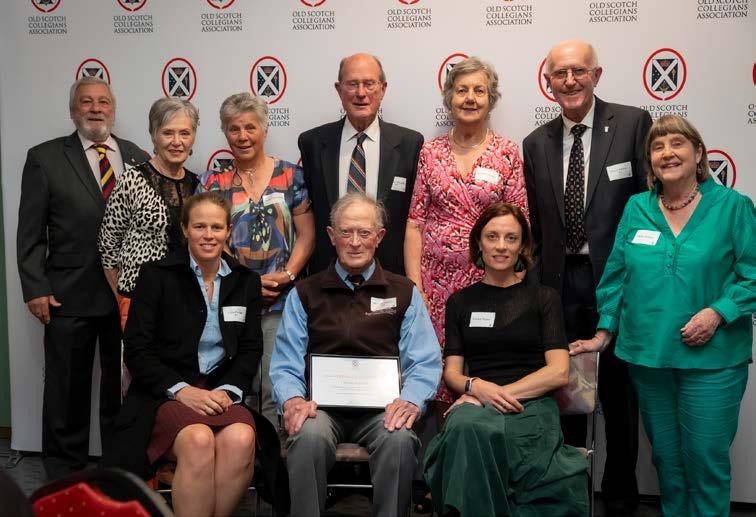


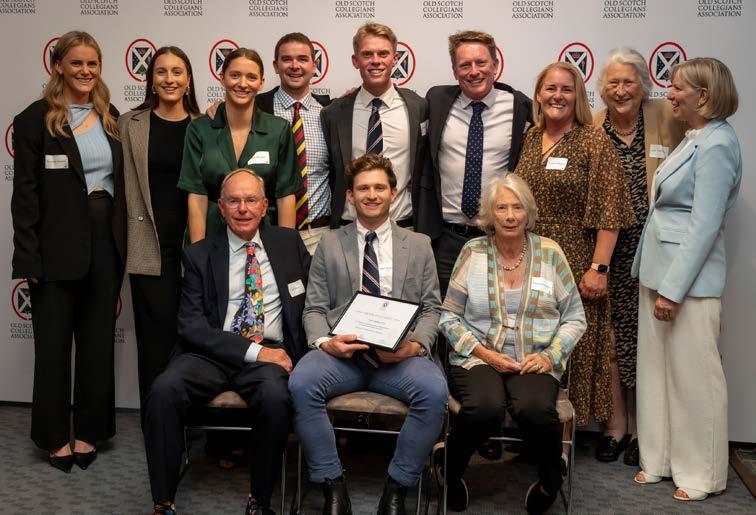
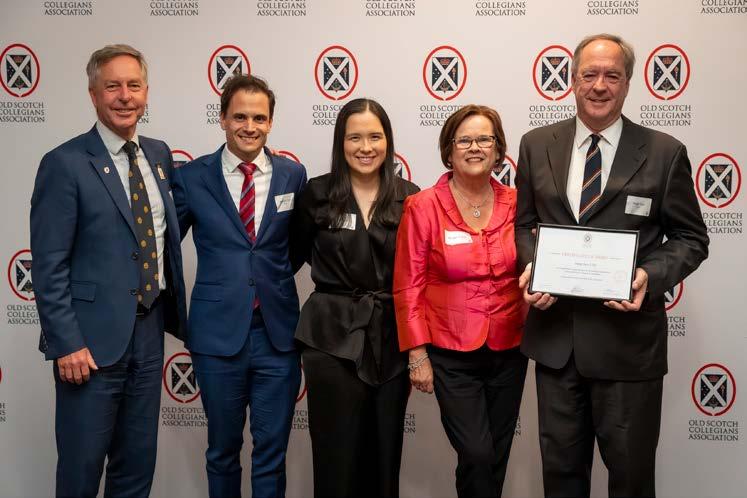

BELOW:
FROM

LEFT, TOP: RICHARD PIESSE (’59) WITH PIESSE FAMILY AND OLD SCOTCH BUSHWALKING CLUB MEMBERS. MIDDLE: SAM SHEARER (’10) WITH SHEARER FAMILY MEMBERS. BOTTOM: PETER SIM (’72) WITH SIM FAMILY MEMBERS.
ABOVE: OSCA MERIT AWARD WINNERS WITH SCOTT MONTGOMERY (’85), LEFT AND STEPHEN WEBSTER (’73), FAR RIGHT. FROM SECOND LEFT: SAM SHEARER (’10), CAROL DAVIS, RICHARD PIESSE (’59), KATHERINE MCDONALD, PETER SIM (’72).
OSMAD MEMBERS PERFORMING SELECTIONS
THEIR SHOW, THE HUNCHBACK OF NOTRE DAME
AUSTRALIA DAY HONOURS, 2024
CONGRATULATIONS TO THE THREE MEMBERS OF THE SCOTCH FAMILY WHO ARE KNOWN TO HAVE RECEIVED AWARDS IN THE 2024 AUSTRALIA DAY HONOURS.
MEMBER OF THE ORDER OF AUSTRALIA (AM)
1. Dr Sandra Eleyn Close AM (past parent: twins Giles and Cameron Pollock (’02)) Dr Close received her award for significant service to the mining and resources sector, and to women as an equal opportunity pioneer and advocate, and to professional associations.
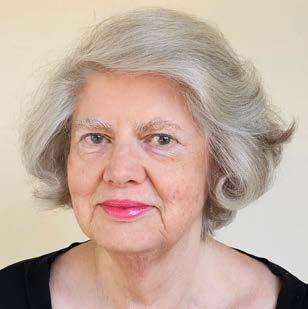
MEDAL OF THE ORDER OF AUSTRALIA (OAM)
2. Mr John Graham Craig OAM (’60) Mr Craig received his award for service to cricket.
3. Mr William Maxwell (Max) Lyle OAM (’50) Mr Lyle received his award for service to the creative arts as a sculptor.
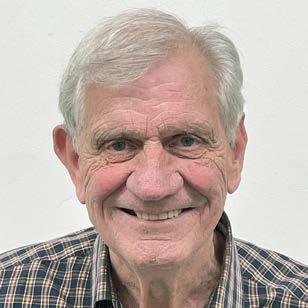


INVITATION TO EXHIBIT
CALLING OLD BOYS ARTISTS /DESIGNERS /FILM DIRECTORS /CREATIVES
Want to exhibit your artwork in the inaugural RAAC exhibition?
Ladder Art Space 4-26 October 2024
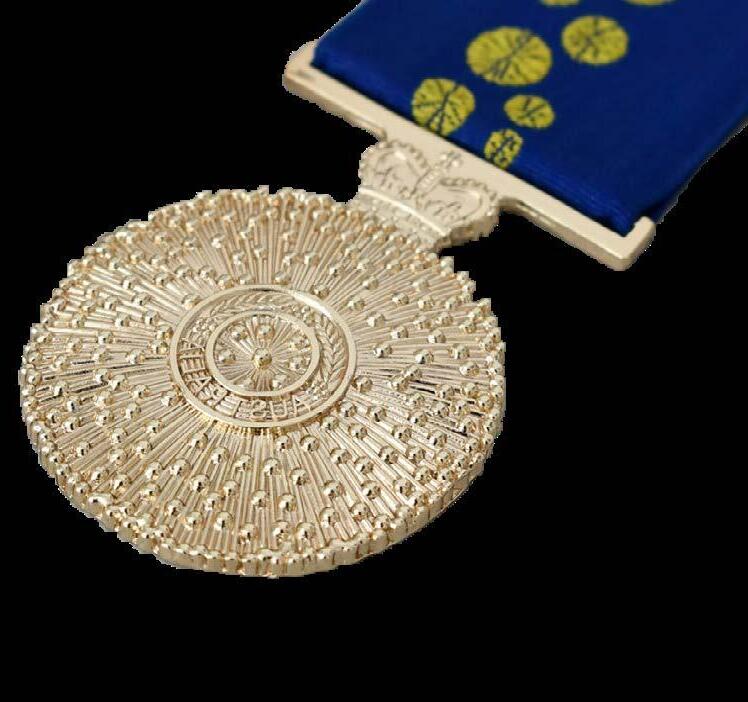
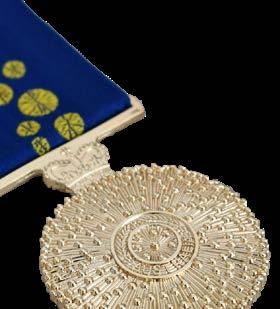

Check the RAAC Instagram page here for more details: raac_collective




SHOWCASING OUR ALUMNI’S DIVERSE TALENTS
SCREENSHOTS FROM THE VIRTUAL GALLERY SHOWING ARTWORKS BY JAMES HARDY ('17), THEODORE DRYDEN ('21), LOUIS HOWCROFT ('19), JAMES MULCAHY ('13), OLIVER BROCK ('13) AND MANY MORE ALUMNI ARTISTS.

The Red Army Artists’ Collective (RAAC), ínitiated by Yudha Scholes, Head of Scotch College's Art Department, has launched its inaugural virtual exhibition, ‘All-Purpose’ in the Ken Field Virtual Gallery of Art. It showcases the diverse talents of alumni who are passionate about art. This platform brings together artists from different graduating classes to share their unique artistic styles and expressions.
RAAC aims to foster connections among artists, while inspiring both current and aspiring creatives, inside and outside the Scotch community.
Yudha Scholes said: ‘During the 2020 lockdowns, I was looking for ways to connect communities at Scotch, which led to the creation of the Ken Field Virtual Gallery of Art. After several exhibitions of students’ works, I thought it was a great vehicle for the Young Old Boy artists who had been working with the Art Department over the last decade to showcase their artworks to the community.
‘It would connect these alumni back to Scotch, offering them a chance to share their artworks with each other, the staff, parents, and current students with whom they worked. The Young Old Boys I contacted were excited to participate, and RAAC was born.’
Speaking from my experience as a curator, my involvement in RAAC has expanded my understanding of art history and curating through collaboration with professionals, offering insights into my career path. RAAC’s founding has also incubated a community of like-minded individuals; each taking steps into the wider world of art beyond the Scotch walls – a sometimes daunting excursion. The ability to chat and catch up with these people in a more relaxed environment helps ease my hesitation with moving forward and sometimes feeling lost.
Incorporating several artists covering many art forms was a crucial aspect of the exhibition. I placed considerable importance on ensuring the exhibition included a wide range of artistic practices, each demonstrating a potential future available to those hoping to pursue similar paths postschool. ‘All Purpose’ features an array of art forms and career paths ranging from painting, to textiles, tattooing and videography.
As you effortlessly glide through the online exhibition with your trackpad, you are invited to engage with the artworks and explore the virtual space, gaining a unique and inspiring perspective. By creating an inclusive and diverse exhibition, I am confident that viewers will be inspired by the quality of the artworks, curious about the artists' thoughts and ideas, and even encouraged to pursue their own creative ventures.
Check out ‘All-Purpose’, an online art showcase that provides a glimpse into pursuing an art career. On behalf of RAAC, we would love to support those alumni seeking assistance or insights into our unique experiences. We also encourage aspiring creatives with similar journeys to get in touch for future opportunities via our instagram page: raac_collective
Later this year we have an exhibition at Ladder Art Space Gallery in Kew, titled ‘Just Doing It’. We are also planning gatherings such as drawing sessions and workshops. We invite people to attend or participate, and help grow this community that we are so fortunate to be a part of.
THEODORE DRYDEN (’21)
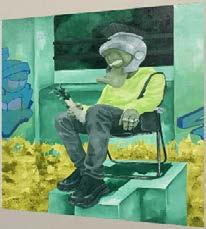
ALL PURPOSE –AN INAUGURAL VIRTUAL ART EXHIBITION



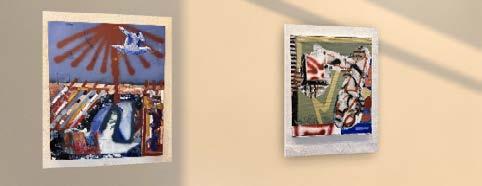

Scan QR code to go to ‘All-Purpose’ exhibition, or www.artspaces.kunstmatrix.com/en/ exhibition/7552833/all-purpose

THE JOY OF GIVING
AN OLD BOY’S BOOK SHINES A LIGHT ON THE BENEFITS

Peter Winneke (’82) worked in the corporate sector for 16 years, specialising in insolvency, mergers and acquisitions. It was during that period that he began to see the need to address inequity and to seek a greater purpose in life. A career change took him into philanthropy, and that is where he has worked for the past 20 years.
In philanthropy, Peter led Australia’s largest grant-making family, as well as serving other organisations in the philanthropy sector, such as Philanthropy Australia, the Myer Foundation, the Sidney Myer Fund, the Catherine Freeman Foundation and the Reichstein Foundation. In all those appointments, Peter was driven by a single-minded passion: to champion an increasing culture of strategic and impactful giving.
That passion was the driving force behind Peter’s determination to create a practical guide to more and better giving in Australia, which has materialised in a book, Give While You Live, which was launched via webinar last November. Among many issues graphically covered in the book are how much wealth is enough, how much to leave the kids, the extraordinary educational tool that a family foundation can be for the next generation, best practice giving, how giving will enhance your purpose and legacy and the reforms required to get to more and better giving in Australia.
Peter comes from a four-generation Scotch family. His greatgrandfather was Henry Christian Winneke (1893). His grandfather, Sir Henry Winneke (1925) was Governor of Victoria from 1974-82. Peter’s father, Michael (’53), was School Captain in 1955. Peter’s two sons have attended Scotch: Mike was in Year 12 in 2023, and younger son, Ed, is in Year 11. Peter is also fourth generation on his mother’s side (Heather Paton), through great-grandfather Francis Lyall (Frank) Paton (1887), grandfather, Sir George Whitecross Paton (1920) and uncle Frank Paton (‘63).
Great Scot asked Peter about his book and philanthropy in general, beginning with the question: Do you believe Australians are increasingly coming around to appreciate the importance of philanthropy? Yes, but very slowly. We need more role models. However, I’m optimistic that over the next decade we can inspire families with surplus wealth to do more, as they learn from role models about the joy and satisfaction of working together as a
OF PHILANTHROPIC GIVING
family unit, with clever for-purpose leaders, targeting issues in the community that they are passionate about.
How important was your background in the corporate world to your subsequent career in philanthropy? In my case it was very important. I developed commercial skills, which I could then apply to the philanthropic sector.
In your book, what areas of work do the case studies cover? There is a mix of amazing stories highlighting impact across numerous areas from around the world. Hopefully they will inspire the reader to go bigger and bolder.
Can you comment on the importance of introducing families to the concept of giving? How early in a working life should a young person consider giving to a philanthropic cause? There is a lot of evidence that shows that if kids start sharing early in life, they give more later in life. So it’s really important! As I discuss in the book, there are so many opportunities to get primary and secondary schoolchildren engaged in their community, which will result in many wonderful teachable moments.
What is ‘structured giving’? How can it lead to a more equitable world? As opposed to writing cheques, structured giving brings a more focused, long-term and strategic approach to giving, often via a philanthropic structure, which if done well, will result in greater outcomes.
Do you think it’s important to have some kind of link with an organisation to which you are considering making a donation; for example, your former school or a sports club? In my experience the more passionate one is on the issue, then more time and expertise are applied, with greater outcomes.
How are you marketing the book? Are you aiming at nationwide or even international distribution? The book is focused on Australia, as we can do so much better here, however, many of the giving principles apply offshore, and a number of books have been sold in New Zealand.
On a personal note, what are your current links with Scotch? Primarily through my two boys. It has been unusual to be back on the grounds most weeks after an absence of 40 years!
For more information about Give While you Live, and to obtain a copy, go to www.peterwinneke.com.au
THE WINNEKES. LEFT TO RIGHT: ED (YEAR 11), ANGE (PETER’S WIFE), PETER ('82) AND MIKE (’23). THIS PHOTO WAS TAKEN AFTER THE 1ST XI GAME AGAINST BRIGHTON GRAMMAR SCHOOL IN MARCH 2023



This will be followed by massed pipers playing to a large group of highland dancers performing a mass highland fling in the forecourt of the Westin Hotel near the corner of Collins and Swanston Streets.
The second headline event, on Saturday 20 July, is the Formal Gala Dinner and Concert at the Melbourne Town Hall. This is a great night and includes a welcome reception in the Melbourne Town Hall foyer followed by a gourmet dinner with fine wines, the traditional Haggis Ceremony and a night of Scottish music and entertainment.
LORD LYON KING OF ARMS IS SPECIAL GUEST AT BIGGEST EVER MELBOURNE SCOTTISH FESTIVAL
THE MELBOURNE TARTAN FESTIVAL WILL PROVIDE A FULL MONTH OF SCOTTISH ACTIVITIES
The Melbourne Tartan Festival, to be held from 30 June to 31 July 2024, is gearing up to be the biggest festival celebrating everything Scottish ever held in Australia.
The festival will consist of a full month of Scottish activities, including pipe band recitals, the Victorian Pipers’ Association Solo Piping Championships and the Victorian Scottish Dancing Members’ Association Commonwealth Championship.
As well as a high energy Ceilidh Dance at Collingwood Town Hall with music by the Melbourne Scottish Fiddle Club, there are singing and fiddler concerts and jams, Scottish films, Burns poetry readings, a ‘Kirkin ‘o the Tartan’ service, walking tours, ancestry and Scottish history, Gaelic speaking, and rare and old whisky tasting functions.
Two big events will headline the festival. The Melbourne Tartan Day Parade on Sunday 7 July at 2pm will be a stirring and colourful spectacle, with massed pipe bands including our own Scotch College Pipe Band and the Old Scotch Pipes and Drums, totalling more than 250 pipers, drummers and dancers in traditional dress marching down Collins Street, Melbourne.
This year the festival will have a very special guest of honour coming from Scotland, the Right Honourable Lord Lyon King of Arms, Joseph Morrow CVO CBE KStj KC LLD DL FRSE. The Lord Lyon is the Chief Herald of Scotland, and is responsible for regulating Scottish heraldry, issuing new coats of arms to individuals and organisations, as well as confirming pedigrees and claims to existing Arms, and recognising clan chiefs after due diligence.
The Lord Lyon is also responsible for all Scottish state ceremonies, and is one of the few individuals in Scotland officially permitted to fly the ‘Lion Rampant’ – the royal banner of Scotland from which the Court of Lord Lyon was named. The current Lord Lyon, Joseph Morrow, was appointed by her late Majesty the Queen on 17 January 2014.
He will be guest of honour at the Formal Gala Dinner and Concert and will be present at events throughout the ensuing week.
The Lord Lyon will bring to Melbourne the new coat of arms for the Victorian Scottish Heritage Cultural Foundation (VSHCF).
The VSHCF sponsors and supports the Melbourne Tartan Festival, working alongside the Scots of Victoria Coordinating Group and the wider Scottish community to stage the monthlong festival. Throughout the year the VSHCF provides financial grants, support and assistance in promoting participation in Scottish culture for the benefit of all Victorians.
The Old Scotch Collegians’ Association is involved in a number of ways with the VSHCF, having three directors on the board alongside three representatives of Melbourne Scots, which has been promoting local Scottish culture since 1919.
Alan Beck, Immediate Past President of the Robert Burns World Federation and a world-renowned tenor, presented the Address to a Haggis at the 2023 Gala Dinner, and will arrive from Scotland to perform the Address again this year. Alan has sung all over the world – throughout Australia, New Zealand, South America, USA, Canada and Europe, as well as in the UK and all over Scotland – and we are delighted to announce that he will perform at this year’s gala event.
All members of the Scotch Family are invited to attend this event on Saturday 20 July at the Melbourne Town Hall, which is very popular with many OSCA clubs and societies, who take tables. Tickets are now available online through the Melbourne Tartan Festival website: melbournetartanfestival.com.au, and through the trybooking link: www.trybooking.com/COAUQ

ATHLETIC CLUB MAKES ITS PRESENCE FELT IN TRACK AND FIELD
In a remarkable testament to resilience and community spirit, the Old Scotch Athletic Club (OSAC) bounced back to a higher grade with a stellar 2023/24 summer Athletics Victoria Shield League season.
We started the season in division five, determined to return to division four after we were relegated 12 months ago. Dominating and winning 11 out of 12 rounds across the season led to the club finishing on top of the ladder and achieving automatic promotion.
There are many promising signs for next season, but the club realises that we need to continue to build on retaining and growing our membership base.
The club has worked at growing the number of schoolboy athletes and junior female members through active relationships with the school, local secondary girls’ schools and running squads. These initiatives are continuing during the off-season.
This year, running for OSAC was recognised as an official school sport, with colours available to be earned for the first time. This led to an influx of 2023 school
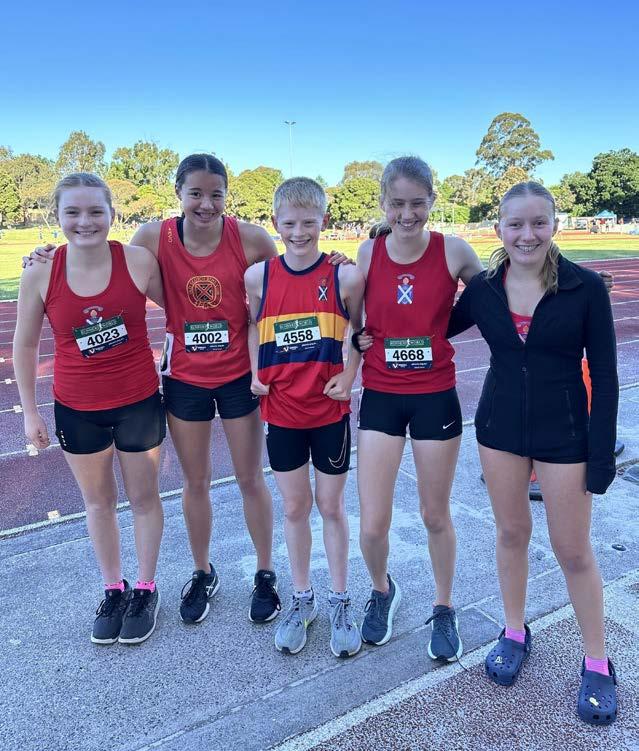
APS Athletic squad members signing up, and as these numbers increase, it will also complement the school team in the long run. In February, Year 12 boys Rory Vial and Elden Zeng were appointed as the inaugural Captain and Vice Captain of Old Scotch Athletics at Scotch. A big thank you to Director of Sport Stuart Powell and to the school for their support of our club.
In November, at the Victoria State Relay Championships in Doncaster, we fielded 10 relay teams. In so doing, the club created history by having our first two female track teams compete, with one walking away with a bronze medal. This was the result of a great coming together of runners from both the summer and winter seasons. With nine out of the 10 teams finishing top eight in the state, it was a day of significant achievements. Our overall medal tally was three golds (male open 4x1500m, male under 18 4 x400m and 4 x 800m) and one bronze (female 40 4x1500m).
The local summer season concluded with the club having 31 athletes compete
across 62 events at the Victorian State Track and Field Championships at Lakeside Stadium. As a small club, we punched well above our weight with seven gold medals, six silver medals, four bronze medals, 32 top 10 positions, numerous personal bests and several national qualifiers achieved, enabling 12 athletes to represent Victoria at the Australian National Track and Field Championships, which were held in Adelaide in April.
A big thank you goes to our club coaches, Gregor Evans (’67) and David Lightfoot, for volunteering their time and expertise. The athletes and the club appreciate everything Gregor and David do for them individually and for the club. The proof is in the pudding, with improvement across the board in the athletes’ performance, winning division
Huge congratulations to Old Boy Ben Beischer (’19), who represented Australia in the 2024 FISU World University Cross five this year, and with the number of national qualifiers produced.
LEFT: WOMEN'S 4X1500M 40+ VICTORIAN STATE RELAY BRONZE MEDALLISTS – HEATHER DANKS, ANNE MARTIN, KRISTEL JANSSENS, ERROLEEN FUNG. MIDDLE: ALANNA TURNER, GABBY KING, HENRY CURLEWIS (YEAR 8), ANNABEL ATKINS, ALEX STUBBS, AFTER RACING AT THE VIC MILERS. RIGHT PAGE, TOP: THOMAS LINDEMAN (YEAR 10), ALBERT ELSOM (YEAR 9), LACHLAN GUMLEY (YEAR 10), HUGO STUBBS (YEAR 10) BELOW RIGHT: CONOR SULLIVAN (YEAR 11), RORY VIAL – CAPTAIN OF OLD SCOTCH ATHLETICS (YEAR 12), TOM ROACH (YEAR 10)


Country Championships in Muscat, Oman in February. Ben finished in 17th place overall in a time of 30:39. This was an amazing effort – running 10km in the desert –not for the faint-hearted.
OSAC welcomes current and former schoolboys, as well as non-Scotch students, and male and female athletes of all ages and abilities. Whether you are new to athletics, looking to stay fit, make new friends and enjoy the social aspect, or a multi-class athlete wanting to run at the state championships, we would love you to join our club, as there are events for everybody, whether they walk, run, throw or jump.
For those interested in joining the club, the winter season kicked off with the Jamieson 5km event on Saturday 6 April at Scotch as part of the Associated Public Schools' Old Collegians’ cross country competition. There was success in round one, with the men’s division one and two teams winning and our women’s team coming fourth.
For more information about the cross country season or about the club in general, visit our new website: https://oldscotchathleticclub.com.au/ or contact us via email at oldscotchathleticclub@gmail.com
TONY STUBBS (’87) – OLD SCOTCH ATHLETIC CLUB

Masonic Lodge
HISTORIC MILESTONE FOR OLD SCOTCH COLLEGIANS’ MASONIC LODGE
For nearly a century, the Old Scotch Collegians’ Lodge, No. 396, has challenged Old Boys to further their leadership abilities after leaving Scotch, and assisted in developing their communication skills while fostering friendship, personal development and community support.
Under the leadership of our current Master Andrew Baird (’06), reinstalled in February for another 12 months, we have recently seen several members recognised for long service including Ian Morrison (50 years) and Maurie Smith (80 years)!
As our eldest member (and the fourth oldest Old Scotch Collegian), Maurie Smith (’41) recently celebrated his 100th birthday. Truly a lifetime of service! At the other end of the scale we also recently welcomed our newest member – Andrew Heggie (’13) – following in his grandfather’s footsteps.
In 2025, we will celebrate 100 years, along with several other Lodges, including Old Melburnians’ (2023), Wesley Collegians’ Lodge and Caulfield Grammarians’ Lodge (now United Schools Lodge) (2024).
Members of the Lodge, including Steve Latimer (’71) participated in this years’ Sleep at the ‘G’ in support of youth homelessness relief.
We are also looking forward to participating in the Melbourne Tartan Festival in July 2024, recognising our combined heritage with Scottish tradition and connecting with the Lord Lyon from Scotland, who is a patron of our Lodge.
The Old Scotch Collegians’ Lodge meets on the first Wednesday of each even month in East Melbourne, and anyone is welcome to learn more about the Lodge. New and former members are encouraged to get in touch as we start planning for our centenary in November next year, and recognise the contribution made by everyone who has played a part in the history of our lodge over the past 100 years.
For more information, contact Graeme Weber (’64): geweber@netspace.net.au, or Stuart McArthur (’89): stuart.mcarthur@nihon2000.com
STUART MCARTHUR (’89) – DIRECTOR OF CEREMONIES, OLD SCOTCH COLLEGIANS’ MASONIC LODGE
JOHN MAYNARD ('56) AND IAN MORRISON ('55)
Pipes and Drums
The Old Scotch Pipes and Drums (OSPD), along with other local, regional and some interstate pipe bands, competed in the Victorian Pipe Band Championships at Croydon on 24 March.
OSPD, having won the last three competitions in Victoria during the 2024 season, won the hotly-contested grade 4A competition, just beating the Scotch Pipes and Drums Band who came second. This is the second time that OSPD has won the Victorian Championships, the last being in 2018. The band then set their sights on the Australian
Championships, in Maryborough on 13 April.
OSPD is in the fortunate position of having a strong pipe and drum corps and an excellent committee and supporter base, and we are now looking forward to setting a program for the next period in the band’s development. This includes travelling to Scotland in August to compete in the World Pipe Band Championships.
This is a very ambitious undertaking and will present some significant challenges for OSPD – including purchasing new kilts for our growing band, funding new
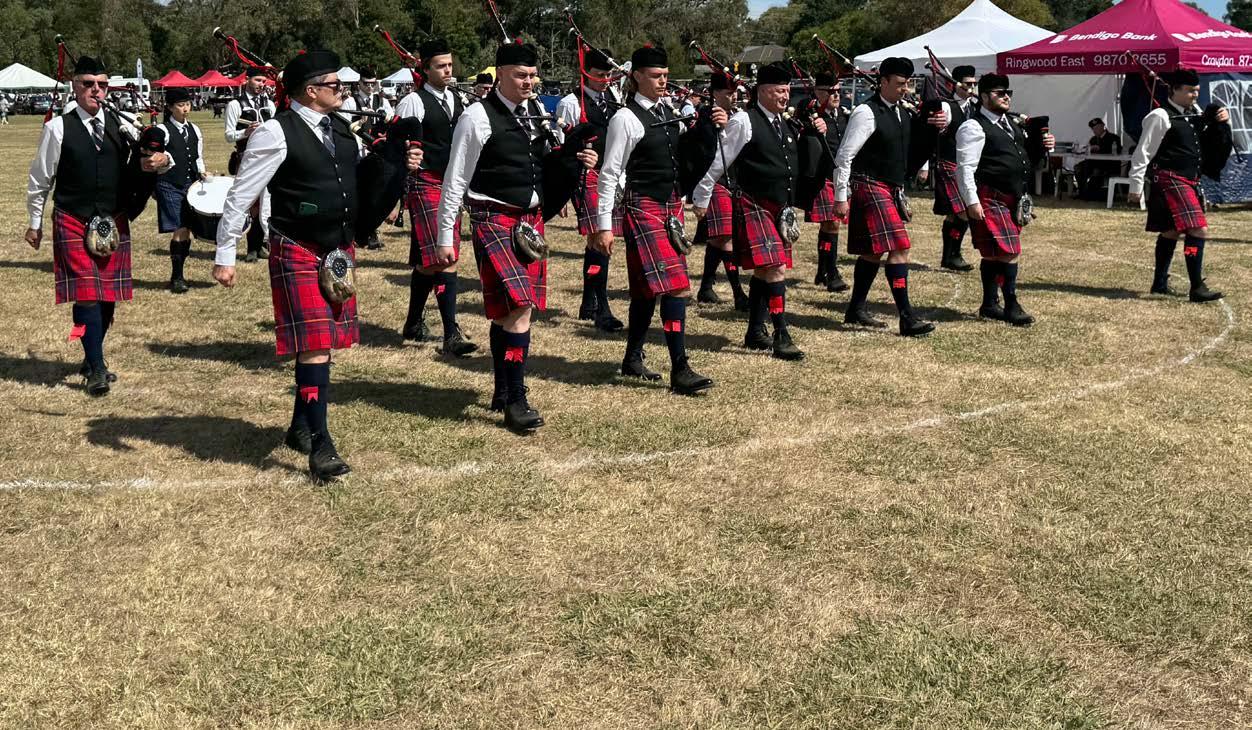
OSSO
OLD SCOTCH PIPES AND DRUMS –VICTORIAN CHAMPIONS OSSO’S TRIUMPHANT RETURN: A NIGHT TO REMEMBER
After a prolonged hiatus caused by the pandemic, the Old Scotch Symphony Orchestra (OSSO) returned to the Ian Roach Hall at Scotch in a momentous concert that will be remembered for years to come.
On Sunday 24 March, a celebratory evening of the orchestra’s ‘Reformation’, featured repertoire that encapsulated the triumphant return of our beloved alumni orchestra.
First established in 2013 after the return of the School Orchestra’s European orchestra tour, OSSO continues to provide Old Boys and community members with
the cherished opportunity to continue playing and performing music.
OSSO entertained an audience of over 300 at its Sunday evening concert, with esteemed guests, the Principal, Dr Scott Marsh, the OSCA President, Stephen Webster (’73), and the Director of Music, Dr John Ferguson in attendance, bolstering the atmosphere of occasion and camaraderie.
The spotlight shone on one of our Old Boys, OSSO President, Tian Tian Lan (’17), with an invigorating rendition of Beethoven's Fifth Piano Concerto, The Emperor, followed by Chopin’s Op. 55 No.
uniforms and equipment, developing our musical performance and raising funds, so we can assist the student and younger band members with their individual costs. This is to ensure that all members have every opportunity to participate in these significant competitions.
These are exciting times for OSPD, so please stay tuned for more news over the coming months. For more information, please contact the OSPD President, Bruce Webb (’79) on 0411 364 255; or OSPD Pipe Major, David Forbes (’79) on 0403 266 145.
2 Nocturne in E flat as an encore. After intermission, audiences were taken on a journey through Mendelssohn's stormy Fifth Symphony, and finally Tchaikovsky's thunderous 1812 Overture, both received with enthusiastic applause.
Riding on the success of this concert, planning is well under way for our next concert in August, with an equally exciting program. We welcome any Old Boys interested in playing with us to contact us at oldscotchso@gmail.com, and we look forward to welcoming our supportive audience members once again!

YUKI GOH ('19) CONDUCTED THE OLD SCOTCH SYMPHONY ORCHESTRA
OLD SCOTCH PIPES AND DRUMS MARCHING OFF AFTER COMPETING DURING THE VICTORIAN PIPE BAND CHAMPIONSHIPS
OSMAD’S 2024 PRODUCTION IS A MACABRE YET DELIGHTFUL MUSICAL

OSMaD
A SUCCESSFUL HUNCHBACK SEASON –NOW FOR THE ADDAMS FAMILY
Large audiences attended OSMaD’s Victorian premiere production of The Hunchback of Notre Dame last December, which was just the second production of The Hunchback to be performed anywhere in Australia.
In addition to the 30 cast and 32 choir on stage, it takes an army of volunteers from the Scotch and wider Victorian theatre community to bring a production of this scale to the stage. OSMaD wishes to recognise the nearly 100 other people who were part of bringing the creative vision of Director Joel Batalha, Co-Music Directors David Barrell (’11) and Ned Dixon and Choreographer Caitlin Lamont to life in this amazing production.
Our Old Boys and Life Members play varied and crucial roles within OSMaD. David Barrell (‘11) has been involved with the company since 2018 – and it all began with a cup of tea and a chat. In 2023, David Co-Music Directed The Hunchback of Notre Dame, has served on the executive, and is currently a valuable member of the committee.
Life Members Ros Turnley, Suzi Cossar and Jan Goldsmith, all parents of Old Scotch Boys, are the heart and soul that keep spirits up backstage. These three women personify the power of community and connections with people. Suzi is serving as Vice President of the company in 2024. Daniel Ischia (’94) served on the committee in 2023 after becoming involved with OSMaD in 2022. Daniel chose to challenge himself and take to the stage before joining the OSMaD team as Treasurer in 2024.
Audiences see and enjoy the mammoth scale of an OSMaD production from the auditorium of the Geoffrey McComas Theatre every year, but it takes a significant number of people behind the curtain to produce what you see on stage. There is a
community of approximately 100 people for each production who are involved from initial conception to final bow.
Over the 15-year history of OSMaD, members of our community keep coming back time and time again. The frontrunners have been directly involved in cast or creative for 10 shows! There is a tangible feeling of belonging in the vibrant, diverse, intergenerational OSMaD family, and you are invited to become a part of it.
Are you an Old Boy looking to keep in touch with your community through theatre? Whether your skills are in performance, music, orchestra, construction, design, IT, crewing and lighting, finance, logistics, volunteer liaison, dance, or marketing, we want to hear from you.
Let us know at https://osmad.com.au/get-involved.
OSMaD is now in full swing preparing the 2024 OSMaD production of The Addams Family, showing in December. Find out more and #MeetOurFamily at https://osmad.com.au/addams.
This is our production team for The Addams Family: Joel Anderson (Director), Ashton Turner (Music Director), Dylan Henry (Choreographer), Joshua Saunders (Costume Designer), Peter Verhagen (Lighting Designer), Katy Roose (Stage Manager), Caitlyn Marshall (Production Manager) and David Barrell (’11 – Technical Director).
These are the members of our 2024 committee: Executive – Tristan Lawrence (President), Suzi Cossar (Vice President), Damien Calvert (Secretary), Daniel Ischia (’94 – Treasurer).
Committee members – David Barrell (‘11), Catherine Buxton, Sophie Cashin, Jan Goldsmith, Caitlin Lamont, Lucy Mason, Matthew Nutley, Christina Prickett and Ros Turnley.
CAST OF OSMAD’S 2023 PRODUCTION, THE HUNCHBACK OF NOTRE DAME
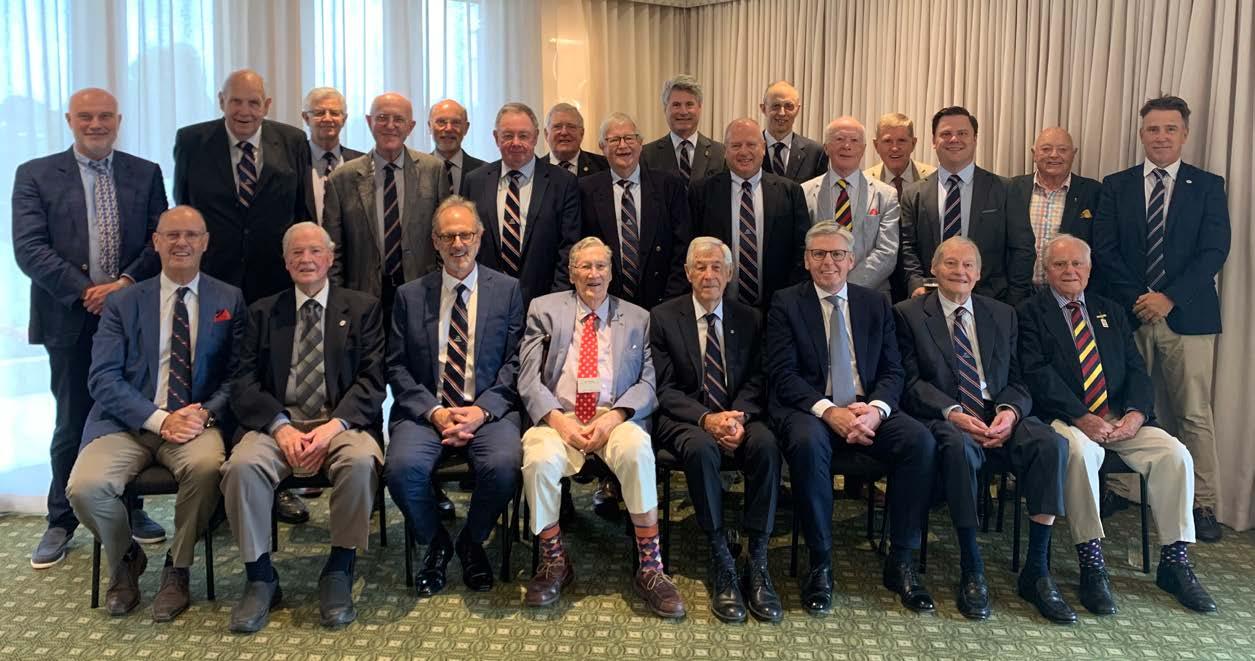
OSCA Collegians
ANOTHER SUCCESSFUL OSCA COLLEGIANS' PRESIDENTS' LUNCH
Hot winds raged outside Kooyong Tennis Club on 28 February – a day of catastrophic bushfire danger in many parts of Victoria – but in the cool of the Kooyong Lawn Tennis Club conference rooms, the OSCA Collegians conducted another very successful Presidents’ Lunch.
This relaxed and informal annual event attracted 31 diners. The aim of the luncheon is to bring together OSCA Collegians and past OSCA Presidents, to discuss issues with the current OSCA President. Fifteen past OSCA Presidents and 10 OSCA Honorary Life Members attended the 2024 lunch.
A notable attendee was Bill Philip (’46) – Stroke of the Crew in 1946 and School Captain in 1947 – and still a very active Scotch Family member. Fifty years ago – in 1974 – Bill served as OSCA President.
Master of Ceremonies, OSCA Collegians’ President, Michael Stillwell (’68), introduced Peter England (’71) for grace, then Peter Buckley (’54) proposed the toast to OSCA and to Scotch.
Scotch Council Chairman, Hamish Tadgell (’85), who was appointed as Chairman last December, spoke of the Council’s aims for 2024. He said he was excited to take up the Chairman’s role and looked forward to many opportunities to advance

the Cardinal Thread. He said the Council is well advanced on developing the school’s Strategic Plan. At one point during his speech Hamish had to contend with a test of Kooyong’s fire alarms, but he pressed on undaunted!
OSCA President Stephen Webster (’73) spoke of the importance of developing OSCA’s relationships, with the Principal, with the School Council and with the Foundation, and said he felt all relationships were strong, and continuing to develop in the right direction. School Council had been renewed and reinvigorated, he said, with seven of 17 positions changing over the past year. OSCA’s strength is a vital factor in the success of the school. Stephen thanked the OSCA Collegians for their continuing support of OSCA.
As an OSCA affiliated club, OSCA Collegians exists to support OSCA itself, so that OSCA can continue to perform its important work. The club primarily raises funds for OSCA through its annual membership subscription, and passes 100 per cent of those subscriptions through to OSCA, providing the association with a valuable and stable income stream to fund strategic initiatives without depleting its reserves.
DAVID ASHTON ('65)
In this episode of The OSCA Podcast, Lachie Strathmore (’15) and Scott Montgomery (’85) speak with Dr Scott Marsh on his first year as Scotch’s 10th School Principal.
In this episode, Dr Marsh shares his journey from his roots as a music teacher to his current role as School Principal. Throughout his journey, he has performed with the Sydney Symphony Orchestra, worked as the Director of Music at the Australian International School in Singapore, before returning to Sydney. Dr Marsh emphasises the importance of mentors throughout his journey and shares his insights on teaching and learning.
Discover what drew Dr Marsh to Scotch College, his excitement about working with boys and his deep appreciation for the school’s rich traditions and history, and fostering strong relationships with the Scotch Family.
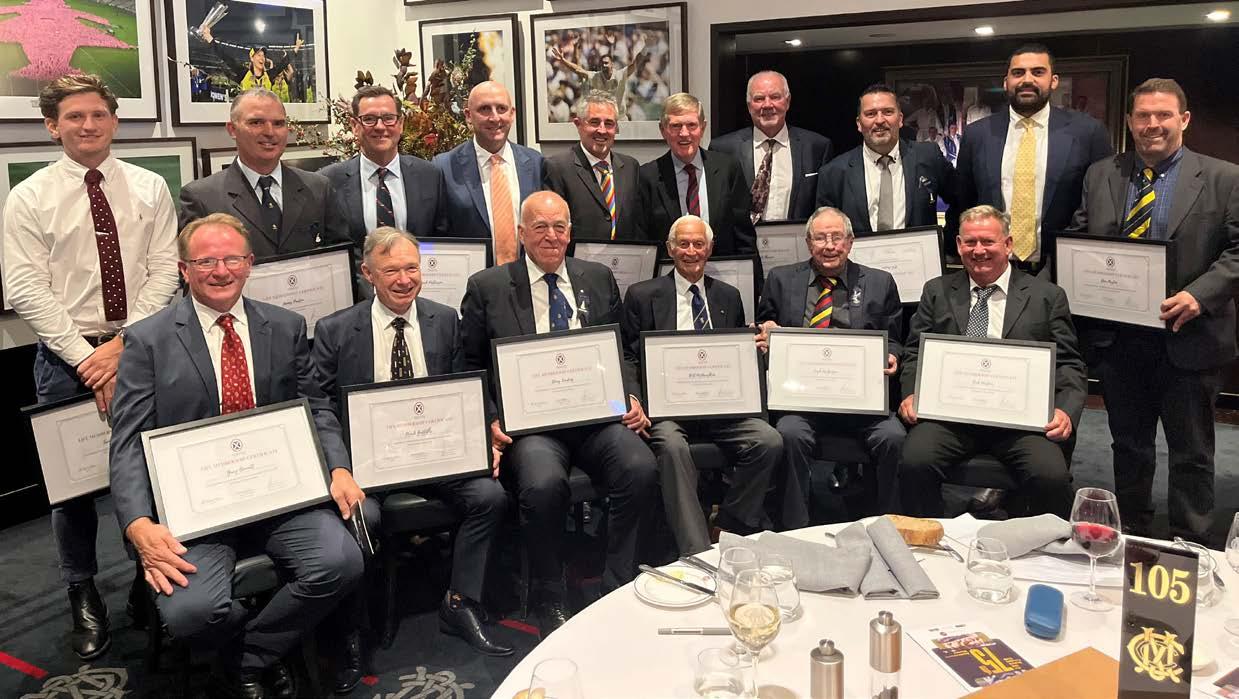
CRICKET CLUB MARKS ITS 75TH ANNIVERSARY
Seventy-five years. Three-quarters of a century. On Saturday 13 April in the MCG Committee Room, Old Scotch Cricket Club celebrated this remarkable milestone. Since forming, the club has seen its fair share of ups and downs, but through it all, one thing has remained constant – the unwavering spirit and passion of our players and supporters. That was definitely on display at the anniversary dinner.
This season, the 1st XI again made the grand final, but was beaten by Melbourne High thanks to a superb unbeaten 150 by its number three batsman. The 2nd XI again made the semi-finals and was beaten in a run-spree at Beaumaris by the seasondominant Maccabi Ajax.
Congratulations to Sam Shearer (’10) as 1st XI season award winner and Club Champion, to Eddie Shearer (’22), Ollie McLeish (’17) and Tom Edney (’15) as 2nd XI winners and to Eddie Shearer as the prestigious Clubman of the Year.
But it was all about celebrating the past and present and embracing the future at the dinner, with nearly 100 players, family and supporters reminiscing about escapades on and off the field.
Over the 75 years of club history, there had only been eight life members and only one inducted in the last 30 years. At the anniversary dinner, a new group of 12 Life Members who have given long-serving and outstanding service to the club was inducted.

Current Life Members, Bill McNaughton (’54), Gary Bennett (’88), Rick Western (’80) and Leigh McGregor (’55) presented new Life Memberships to Doug Lording AM (’64), Peter Ashton (’67), Matt McGregor (’87), Mark Patterson (’79), Rick Sherwen (’80), Don Parton (’89), James Parton (’88), Rob Parton (’86), Alistair Jones (’86), Mark Griffiths (’80), Sam Shearer (’10) and John Stavris (’12), along with some stirring interviews.
The night concluded with the announcement of the very formidable Team of the Last 25 Years (1999-2024), in batting order: Matt Mitchell (’12) (wicketkeeper), Tim Hosking (’99), Sam Shearer (’10) (Captain), Rob Ashton (’97) (Vice Captain), Tom Murray (’06), Traviss Orr, George Dick (’05), Will Clark (’12), Alistair Jones (’86), Will Hays (’13), Gary Bennett (’88) and Will Bonwick (’16).
Coordinating the event and selecting life members and the Team of the Last 25 Years was a huge effort, and thanks go to John Stavris, Will Clark, Charlie Hocking (’18), Tom Edney, Charlie Schilling (’17), Bill McNaughton, Gary Bennett, Rick Western, Ollie McLeish, Jeremy Bonwick (’13) and Tom Whitelaw (’04) for their amazing efforts, and to our sponsors Elgin Inn, Monte Finance, AANDI Lawyers, OSCA and Mrs Fields Cookies.
Surround yourself with the excitement of Old Scotch Cricket Club. MARK GRIFFITHS ('80) – PRESIDENT, OLD SCOTCH CRICKET CLUB
MAIN PHOTO: OLD SCOTCH CRICKET CLUB HONORARY LIFE MEMBERS.
RIGHT: MEMBERS OF THE CRICKET CLUB'S TEAM OF THE LAST 25 YEARS.


BOWLERS’ 27TH ANNIVERSARY MATCH AT WEST BRIGHTON CLUB

A GREAT INTERCLUB TRADITION CONTINUES

Each season the Old Scotch Bowls Club plays two away games against clubs that are not part of the Associated Public Schools Competition – Royal Melbourne Golf Club Bowls Section and the private West Brighton Club. Old Scotch players really look forward to playing these annual trophy matches, and there is a great history between the three clubs.
The West Brighton match on 31 January was the 27th anniversary of matches the two clubs have played for the Scrighton Trophy, which Old Scotch has won 15 times and West Brighton 12 times.
Dating back 143 years, West Brighton is one of the oldest private sporting clubs in Australia. Its most famous member was Sir Robert Menzies, who served as club President from 1947 to 1962 and was a member for more than 50 years. The major club trophy is named the Sir Robert Menzies – Christensen Bowls Trophy. Although not a bowler, when he was in Melbourne Sir Robert practically never missed the club’s Saturday dine-in night.
Old Scotch Bowls Club members eagerly look forward to their annual visit to West Brighton, not only for the bowls, but to enjoy a lovely lunch with lots of speeches and friendly conversation.
The only disappointment this year was we had to leave the Scrighton Trophy behind to go into the West Brighton trophy cabinet, but we look forward to returning it to its pride of place at Old Scotch next year.
Members of the Scotch Family – male and female – are most welcome to join our thriving club and enjoy visits to interesting clubs like West Brighton. We offer free tuition and loan bowls while you learn in a very relaxed and friendly environment – we’ll have you playing in an Old Scotch team in four to six weeks.
The club plays on 13 Wednesdays from early September to the end of April in great facilities at two MCC Bowls venues in Hawthorn. Bowling practice and training continues in the off-season, to have beginners ready for the start of the new season each September.
For more information, or to see the club’s outstanding facilities and learn about bowling with Old Scotch, please contact me on 0411 253 633 or email david.tennent@bigpond.com.
DAVID TENNENT (’57) – SECRETARY, OLD SCOTCH BOWLS CLUB

Beautiful early autumn sunshine greeted 23 Old Scotch Bushwalking Club members arriving in the charming Gippsland town of Sale on 15 March for a weekend of bushwalks and sightseeing. Ahead was an activities-filled weekend in this go-ahead town of 14,700 people, known for its rich history, rural charm and modern amenities.
All but two participants had arrived by Friday evening and on Saturday there were plenty of choices. A longer walk, beginning at the Port of Sale, and initially along the Sale Canal, was of about 10km and took walkers through the Sale Common Wetlands. It included a visit to the historic Swing Bridge, where walkers enjoyed lunch. The wetlands comprise fresh water marshes and red gum woodlands, and contain an enormous variety of birdlife.
A shorter walk followed the River Heritage Walk and part of the Wetlands Trail. Several walkers chose a Port of Sale Heritage Cuise, during which they embarked on a leisurely journey along the Thomson River, under the Swing Bridge and return, while being entertained and informed by a colourful on-board commentary.
In the afternoon, several members drove to the Swing Bridge for a scheduled
opening of the historic bridge. Spanning the Thomson River, the bridge is one of the last remaining operational swing bridges in Australia. But alas: a workman up on the bridge apologised that the opening mechanism was temporarily out of order.
The club conducted its annual general meeting on Saturday evening at the Sale Greyhound Club, a popular meeting place for Sale residents and visitors alike. Neil Hart-Smith was duly returned for another year as President, and a new committee was elected. This was followed by a delicious dinner at the club, after which Pam McLeod ran a fun trivia quiz.
On Sunday morning club members enjoyed a real highlight of the weekend: a guided tour of the superb Sale Botanic Gardens, led by Fred and Rob, two members of the friends of the gardens. The jovial Fred and Rob pointed out significant trees and gave lucid historical and botanical information about the park, and the adjoining Seed Lakeside Community Garden. A delightful morning tea followed in the nearby Nakunbalook Environmental Centre.
After a memorable great weekend of activities in shining weather, members headed back to the big smoke or journeyed onwards to more adventures elsewhere.
DAVID ASHTON ('65)
SETTING SAIL FOR SALE
OLD SCOTCH BUSHWALKERS ENJOYED A WEALTH OF ACTIVITIES IN THIS THRIVING VICTORIAN TOWN
ABOVE: OLD SCOTCH BUSHWALKERS ON THE BOARDWALK IN THE SALE COMMON WETLANDS.
BELOW: MANY OF THE BUSHWALKERS TOOK A HERITAGE CRUISE ON THE THOMSON RIVER. THE BOAT IS SHOWN HERE ABOUT TO GO UNDER THE HISTORIC SALE SWING BRIDGE.
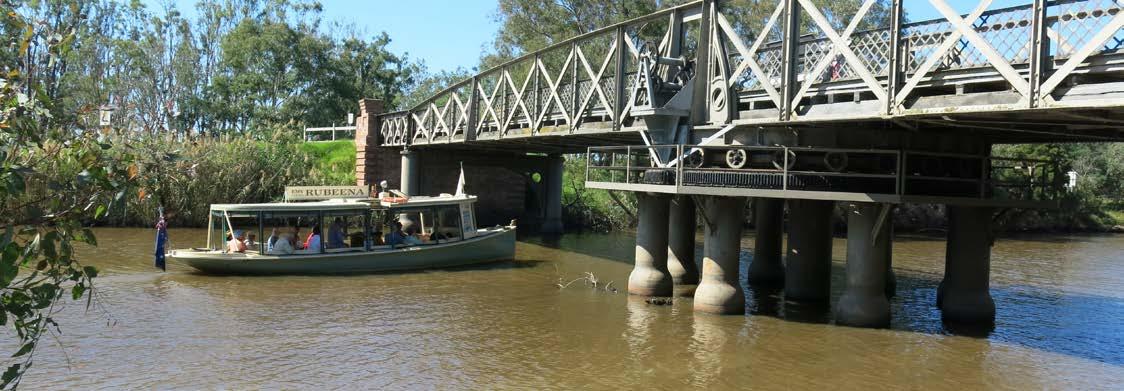
Hockey
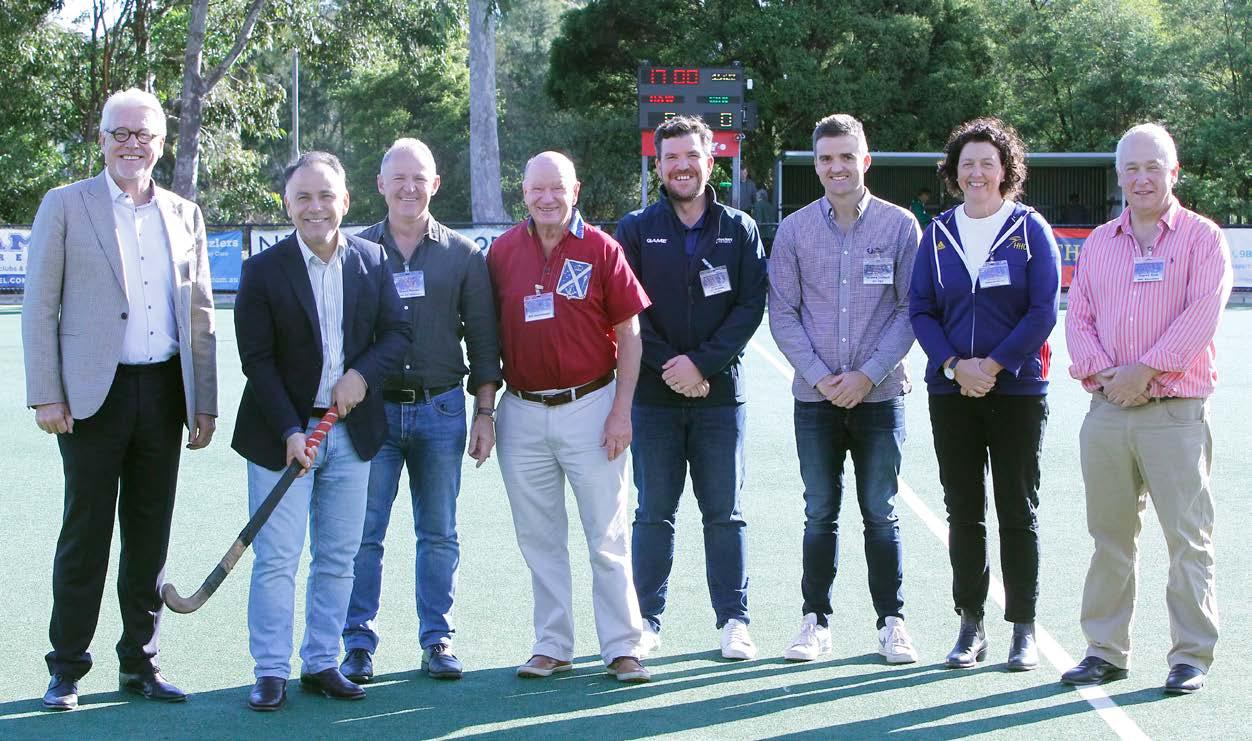
HOCKEY CLUB CENTENARY CEREMONY PARTY. LEFT TO RIGHT: DR SCOTT MARSH, JOHN PESUTTO (STATE MEMBER FOR HAWTHORN), SHAUN DOOLEY (CHAIRMAN, HOCKEY VICTORIA), BILL HUTCHISON (‘57 – OLDEST PLAYING OLD BOY), DAVID BOURKE (GENERAL MANAGER, HOCKEY VICTORIA – COMPETITIONS), ANDREW SKILLERN (CEO, HOCKEY VICTORIA), DR MONIQUE RYAN (FEDERAL MEMBER FOR KOOYONG) AND ANDREW ROOK (’80), HAWTHORN HOCKEY CLUB SECRETARY)
CENTENARY OF A HOCKEY CLUB WITH ITS ROOTS IN SCOTCH COLLEGE

With great pride and excitement, the Hawthorn Hockey Club is celebrating its centenary this year. The club has its roots in Scotch College and plays an important part in the life of many of the school's hockey players.
In March 1924, a group of hockey enthusiasts and friends joined together to form the Old Scotch Collegians’ Hockey Club. At this time the third Principal, W. S. Littlejohn, was the foundation President of the club.
Then in 1978 another group of Old Boys and parents, led by Robin Hodder (’54), Jack Grimshaw and Bill Hutchinson (’57), established the Hawthorn Junior Hockey Club, another club built on the foundations of friendship and love for the game. Six years later, in 1984, the Hawthorn Women’s Hockey Club was established, strengthening hockey as a truly co-ed sport at a time when most sports were dedicated to only one gender.
In 1999, these three separate clubs combined to officially establish the Hawthorn Hockey Club. It is a hockey club rich in history, friendship and sportsmanship, which recognises its founding members with pride and respect.
Today the club has over 450 playing members across 33 teams in juniors, men's, women's and masters’ competitions. While the club's origins and Cardinal Thread are strong, it welcomes members from all schools, backgrounds and locations.
There are many current students, Old Boys, current staff, former staff and parents from the Scotch Family involved with the club. Its location, just across the road from the Monash Gates, makes it easy for Scotch boarders to be actively involved in both junior and senior teams. The club’s masters’ section is brimming with many parents and Old Boys coming back, year after year, to play in both men's and women’s weeknight competitions.
As a diverse and inclusive club, Hawthorn also sees many women from the Scotch Family take active roles in the club as players, coaches and team managers, often in addition to their roles in school teams and the Montgomery Club (which supports hockey at Scotch).
The Hawthorn Hockey Club is proud of its friendship and relationship with Scotch College in this, its centenary year, and it welcomes everyone to participate in its celebrations. Come along and watch a game or two – and if tempted, pick up a stick and join in!
PETA PATHAK-PERKS, HEAD OF MARKETING HAWTHORN HOCKEY CLUB, PRESIDENT, MONTGOMERY CLUB (2019-21)
MORE THAN 200 PLAYERS ACROSS SEVEN TEAMS
The Old Scotch Football Club prepared for a strong 2024 showing, following five of our seven teams making finals in 2024, with our Premier grade Senior Men’s team (semi-finalists) and Senior Women’s (preliminary finalists) leading the charge.
In total we have more than 200 players representing us across the seven teams, with our link to Scotch still strong. We look forward to having many members of Scotch’s Class of 2024 playing with Old Scotch in 2025.
Coaching stability was to the fore with our head coaching roles in the off-season, with five of seven from 2023 remaining. The changes were Rhett Wilsmore (Men’s Reserves) joining us from Mulgrave, and Mackenzie Morgan (Men’s Under 19s) trekking over from Western Australia, after a four-year stint punting in USA college football. Our coaching team still has a strong Scotch flavour, with Andrew Millar (‘89) taking on a Senior Assistant role in the men’s program, and Andrew Lloyd (’81), Dave McCleery (’86) and OSCA Executive Director Scott Montgomery (‘85) all having key coaching roles in our women’s program.
Major highlights from our preseason over the summer months included our inaugural Hawthorn Bunnings barbecue on 28 January, where our players mingled with the greater Glenferrie community. The Monte Finance team, led by George Dick (’05) won our Golf Day, held at the Kew Golf Club on 26 February. More than 90 men and women players and officials attended the pre-season camp at Camp Wyuna in Queenscliff from 1- 3 March.
The season launch on 5 April at Kooyong Lawn Tennis Club was another major pre-season highlight. It was headlined by an extension of three years by major sponsor the McQueen Group, as announced by founder Angus McQueen (’91). There was also an interview with Tyler Sellers (‘20) who has now made his AFL debut for North Melbourne.
ANDREW TOOP – GENERAL MANAGER, OLD SCOTCH FOOTBALL CLUB
FOOTBALL CLUB’S PREPARATION FOR A STRONG SHOWING IN 2024
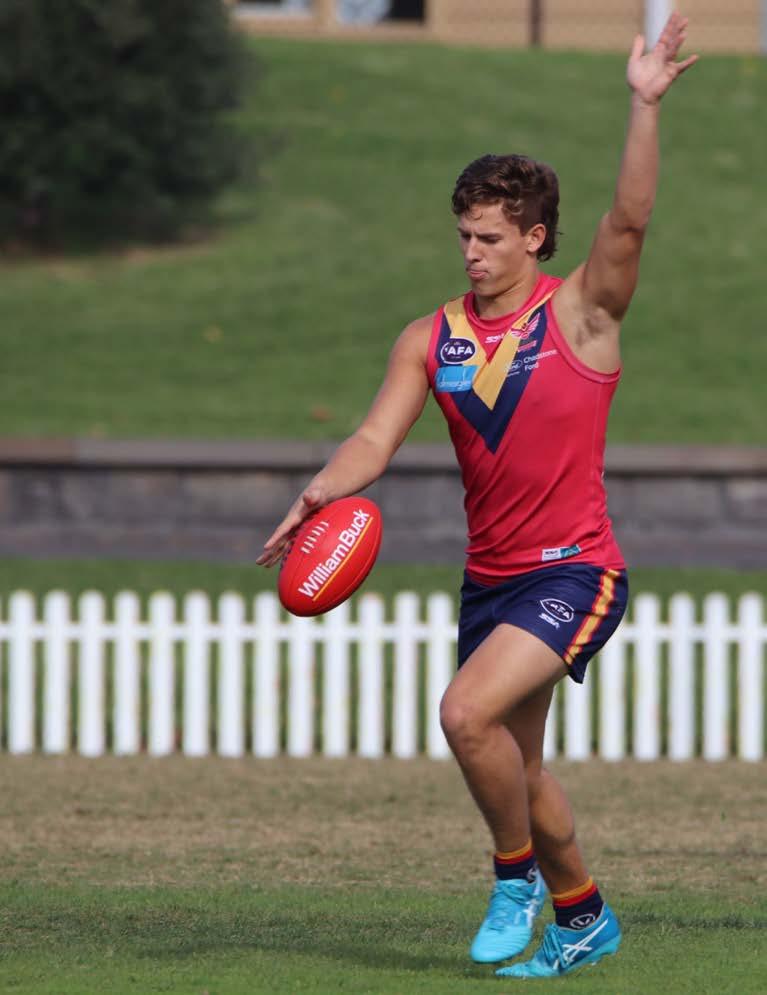
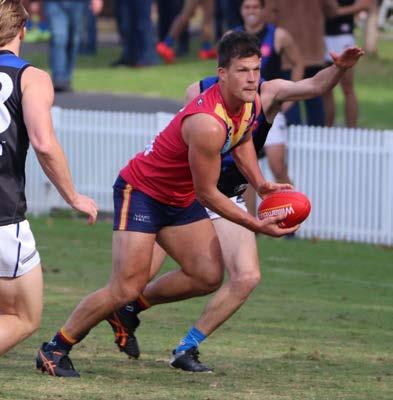
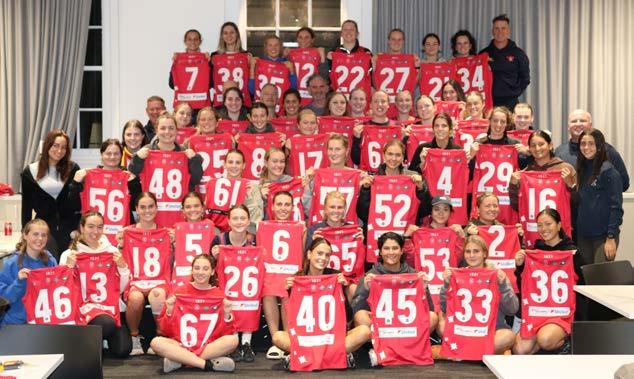
OLD SCOTCH SENIOR PLAYERS IN ACTION DURING AN EARLY SEASON GAME AGAINST UNIVERSITY BLUES
BELOW: THE OLD SCOTCH STARS WITH THEIR COACHES
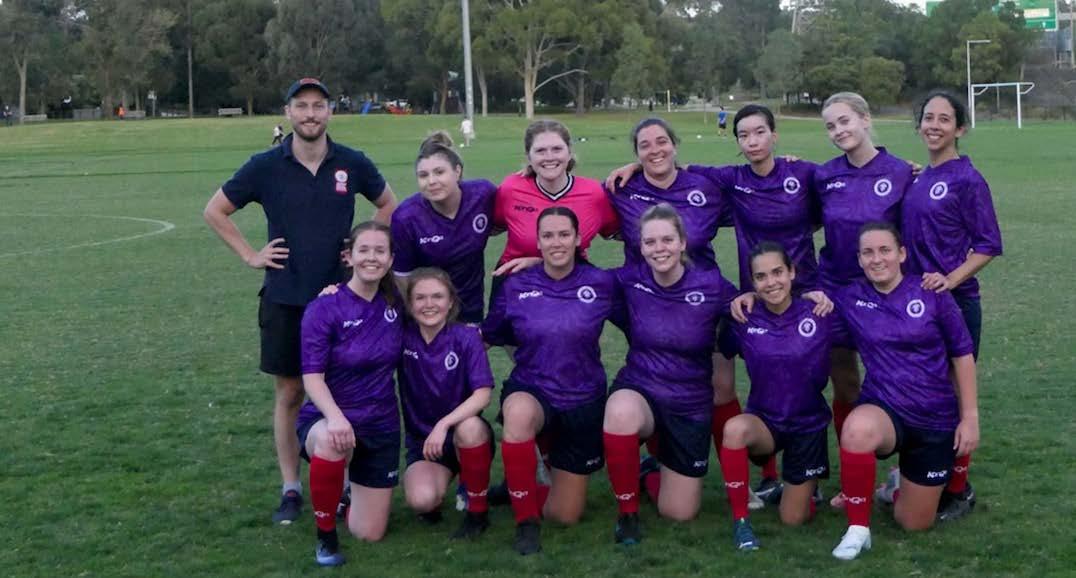
Soccer
PLENTY TO SAVOUR IN AN EXCITING SEASON
SOCCER CLUB KICKS OFF 2024 WITH A BANG
For the first time in its history, the Old Scotch Soccer Club has formed a women’s team, which is competing in Victorian State League 5. There is a broad spread of talent in the team and the players are loving being part of the club. The team played an entertaining 2-2 draw in its first practice match against Ringwood soccer club. The women’s team has injected a lot of positive energy into the club and at the time of writing, was very much looking forward to enjoying its inaugural season.
For the second year in a row, the club’s Seniors and Reserves are competing in Victorian State League 1. There are many new faces in both teams, including former Reserves coach Joe Reed stepping up to be assistant coach for the Seniors, and Lucas Morrey returning to coach the Reserves (having previously coached the Reserves three years ago).
After spending some necessary time gelling during pre-season, the teams started to play really well together. Two official matches had already been played at the time of writing, with both teams winning and losing one match each. The Seniors and Reserves are determined to experience great success this year, having already shown last year that they well and
truly belong in Victorian State League 1.
This year the club is fielding two teams in the Victorian State Metropolitan leagues on Sundays – the Blues and Golds. With a fantastic turnout during pre-season training, the Blues’ squad was brimming with talent and determination, setting the stage for what promised to be a great campaign. Adding to the excitement is the addition of several young Old Scotch Collegians, who are providing a new dynamic into the team.
The Golds similarly have been joined by several exciting new players. With two practice games under their belts, the Golds’ squad showed promising glimpses of talent and teamwork, and were very excited about the upcoming season in their Metropolitan South-East League.
The club has formed a brand new ‘Over 35s’ team that is playing in the Bayside FA league and attracting crowds to H A Smith Reserve on Friday nights, when their home matches are played. The team boasts many players who formerly played in the club’s Seniors team and has high hopes of achieving success in its first season due to the extensive experience the players bring to the table. The club’s juniors’ program has also continued to experience meteoric
growth, and we are fielding numerous junior boys’ and girls’ teams this year.
The club has succeeded in partnering with several new sponsors. The club extends its thanks to all its sponsors and is looking forward to forging successful partnerships with them in 2024.
The club welcomes Scotch boys and Old Scotch Collegians and their families and friends to support and join the club. It is not too late to join the club as a player, to join the Coterie for those aged over 50, or to become a social member for those aged under 50.
For any Old Scotch Collegians interested in joining as players, the Old Scotch Collegians’ Association will subsidise their registration fees by 50 per cent for their first year at the club.
For any queries regarding supporting, joining or sponsoring the Old Scotch Soccer Club, please contact us at committee@ossc.com.au.

ABOVE: THE SOCCER CLUB’S NEW WOMEN’S TEAM. BELOW: SOCCER CLUB SENIORS CAPTAIN SAM SHEARER (’11, CENTRE) AND FELLOW SENIORS PLAYERS KAI JONES (LEFT) AND DECLAN CROUCHER, WEARING THE CLUB’S NEW 2024 TRAINING KIT
KOOMERANG’S FOUR LODGES ARE READY FOR THE SKI SEASON
The Koomerang Ski Club was founded in 1957 with a group of Old Boys and Scotch College teachers constructing the first lodge at Mt Buller. The club still occupies this site, with the rebuilt lodge offering 42 beds in a prime position on Summit Road. The lodge is currently being renovated to offer guests upgraded accommodation, including brand new ensuites, which will be ready for the current ski season.
In addition, Koomerang is uniquely positioned as a ski club, with lodges at four resorts. Other lodges are located at Falls Creek, Mt Hotham and Thredbo, NSW, providing members with a choice of mountains to visit.
While the winter ski season is the peak time to visit Koomerang and enjoy Australia’s alpine resorts, we are seeing growing demand for mountain biking, hiking and bushwalking in the summer, particularly as resorts invest more in year-round accommodation.
Membership is available to current Scotch schoolboys and their families as well as Old Boys and their families. There is a variety of options from schoolboy to full membership and associate categories for those just interested in summer holidays. The nightly accommodation rates are very attractive and provide an opportunity to enjoy the snow without a material investment.
Enquiries for new membership can be directed to the Membership Secretary, Hugh Maxwell-Davis (’87): membership@koomerang.com.au and other enquiries can be sent to me: president@koomerang.com.au
ROBERT BRUCE (’88) – PRESIDENT, KOOMERANG SKI CLUB
H I COHEN TROPHY TO HARRY JONES
– ‘THE BEST ALL-ROUNDER’
Harry Jones has earned the coveted H I Cohen Trophy award for 2023-24, as the best all-rounder in the 1st XI.
Harry led the team with distinction both on and off the field as Captain. He scored 261 runs at an average of 26 including two half centuries, along with being the leading wicket-taker with 18 at an average of 21.6. His fielding was excellent throughout, taking six catches, and overall he was clearly the team’s best all’-rounder.
The trophy is named in honour of Henry Isaac Cohen, who attended Scotch from 1885 to 1889. A keen cricketer and a loyal
Koomerang


and energetic supporter of Scotch all his life, Henry Cohen presented the ‘trophy’ in 1921. It is a book in which the winner’s name is inscribed each year, and which each winner signs in the presence of his team-mates.
The trophy goes to the ‘best allrounder’ in the team, and is based on batting, bowling and fielding performances.
50 YEAR REUNION
10 November 2023
A BUNCH OF LOVELY GENTLEMEN... REMINISCING AND SINGING EACH OTHERS' PRAISES
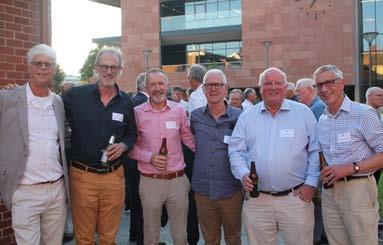

IAN


TAYLOR, STEPHEN WEBSTER, PETER BURGESS, ANDREW SWAIN, MALCOLM MCRAE, STEVE
WALLACE-SMITH, PETER HAYMAN. 3. PETER ABRAMOWSKI, TEX MCKENZIE, BRUCE DUMBRELL, JAMES
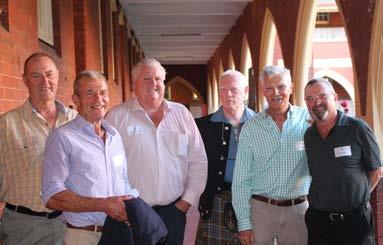
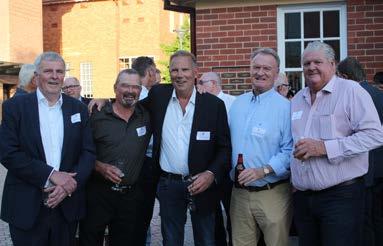
2.
ROGER
30 YEAR REUNION 17 November 2023

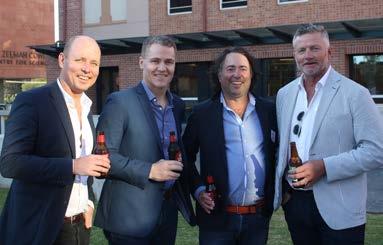
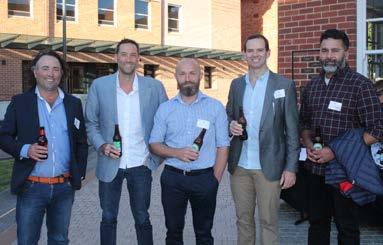
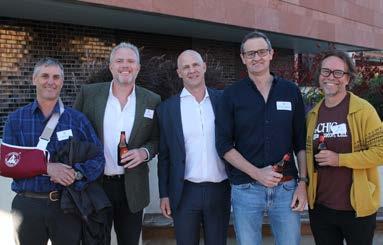


1.
'MCCOMAS'
MANDERS.
GARY HOOPER, MARK LATIMER, DAVID POLKINGHORNE, SIMON
ANDERSON,
TALLENT, GEOFF BELL. 4. THE CREW: TEDDY WEBSTER (‘17), STEPHEN WEBSTER, IAN PORTER ('74), GEORGE LOW ('74), DOUG BUCHANAN ('73), BRUCE DUMBRELL ('73), CRAIG COOPER ('74), RUSSELL WHITE ('73), ANDEREW GUERIN ('73). 5. MARK MCLENNAN, MARK TOLSON, JOHN PRICE, IAN ROSSITER. 6. ROB MCLAREN, GEOFF BELL, COLIN MITCHELL, ANDREW MOUNTFORD, BRUCE DUMBRELL. 1. GROUP ON TOUR. 2. SIMON PEAT, JAMES WALKER, MICHAEL DEAN,
60 YEAR REUNION 24 November 2023
AN ACCOMPLISHED GATHERING OF CLEVER FELLOWS (INCLUDING SCOTTY)

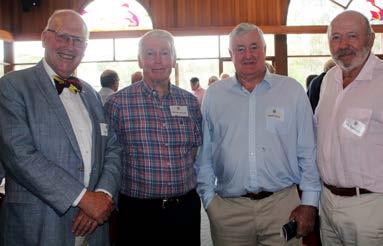

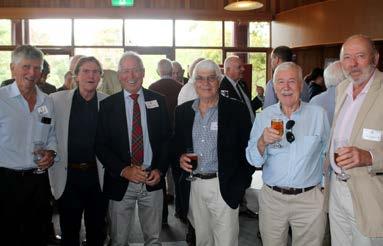


1 YEAR REUNION 29 November 2023
ONLY A YEAR OUT AND WE'RE BACK! SO GOOD TO CONNECT ON FAMILIAR TERRITORY.
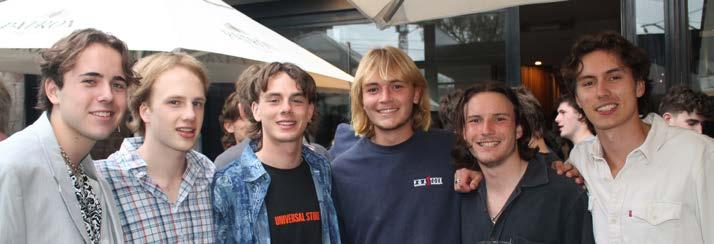
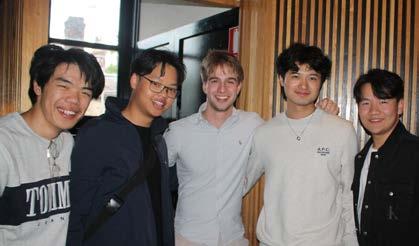

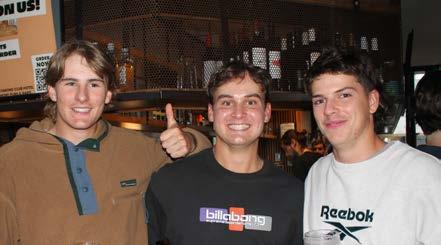
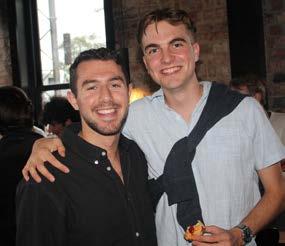
1. SCOTT MONTGOMERY (’85), JIM MURRELL, ROLAND PERRY, DOUG LORDING, JOHN KIRKHOPE. 2. HOWARD BELCHER, JOHN PILKINGTON, JEREMY MORRISON, LACHLAN SHACKLETONFERGUS, ANDREW JAMIESON, BILL BAXTER, JOHN HAY, JIM MURRELL, PADDY ROBB. 3. HUGH TAYLOR, IAN MARCHMENT, GEOFF TAYLOR, TOM SWINBURNE 4. ANDREW JAMIESON, JOHN HAY, MARTIN RALSTON, ALAN ROSS, DAVID EVA, TOM SWINBURNE 5. KEITH HEALE 6. NEIL LUCAS
1. RUPERT SIMMONDS, HUGO HAINTZ, SEB SPITTLE, EDDIE WALLIS, ALEX JONES, JACK STIRLING 2. LACHIE FINSTER, JOEL BENNETT, MACKENZIE ALLEN, EDDIE SHEARER. 3. SHANE GAN, BRANDON PAI, JOSH MUNDAY, LEON FEI, BRENDAN ZHANG. 4. LOUIS TAYLOR, JAMES FYFE, CONNOR FERGUSON. 5. TOMMY LIVADARAS, NATHAN MUNRO.
1.
OSCA - EVENTS
10 YEAR REUNION 23 February 2024
SO MANY STORIES EXCHANGED AND A MEETING IN THE GREEN GRANDSTAND
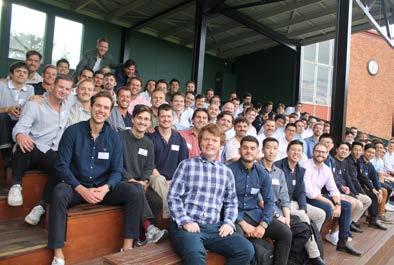
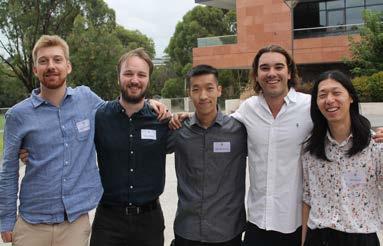

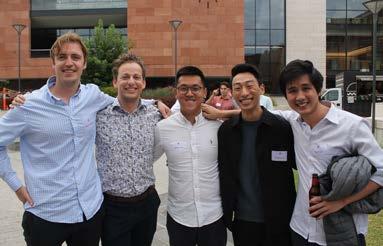
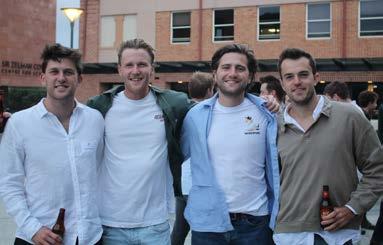
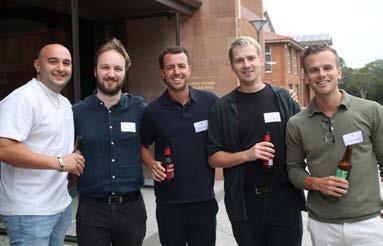
5 YEAR REUNION 1 March 2024
DOCTORS, LAWYERS, PLUMBERS...WHAT HAVE THEY ALL BECOME?

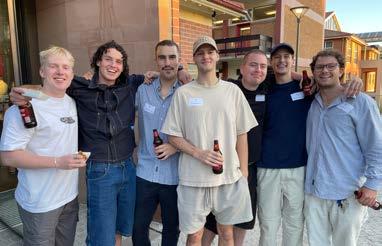




1. ON TOUR - CLASS OF 2014. 2. PETER BATH, MACK RIVETT, ALEX TOWNSEND, ALEXANDER SILVA, MARCUS EDWARDS, PAUL COLMAN. 3. TED MURCHIE, WILL STEWART, BARNABY HOLMES, COREY MCKENZIE 4. JAMES MCINTOSH, HENRY RALSTON, KENNETH CHUNG, HUGO BINSTEAD, JEREMY TEH 5. OLIVER SIMPSON, CHRIS MASSARANY, KENNY TAN, THOMAS LIM, SEAN TAN 6. BERTAN KAYA, HENRY RALSTON, HENRY RENN, LACHLAN MAXWELL, ANDY LAMBERT
1. TRENT MACKENZIE, HENRY FYFE, WILL DIXON, THOMAS BUCHANAN, ANGUS HALSE 2 ANGUS MACMILLAN, ARCHIE RICHARDS, OLIVER CUTINELLI, BEN SHAW, CHARLES MOLONY, CHARLIE BLENHEIM. 3. ANGUS PERMEZEL, JOSHUA DOWNS, LACHLAN MCANDREW, MAX LEMPRIERE, SAM SKINNER. 4. HAMISH STONE, NATHAN CHANG, CHRISTIAN NGAN, MATT GIUFFRIDA, BRADLEY EDWARDS. 5. WILLIAN MOUNTNEY, SAM MURDOCH, EDWARD BROWN, MAX LEMPRIERE. 6. HAMISH MCRAE, RUPERT MOSLEY, JONAS DARMOS, NOAH PHILP.
20 YEAR REUNION 22 March 2024
RECOUNTING MOMENTOUS EVENTS AND A MEETING UP WITH A FORMER TEACHER

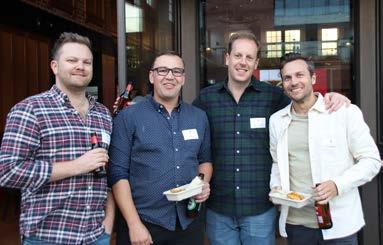

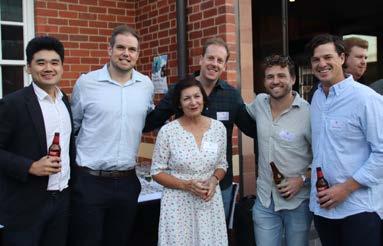
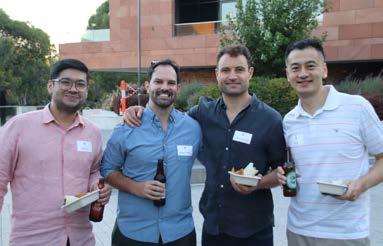
FORMER VICE PRINCIPAL VISITS SCOTCH
COLIN BLACK'S POSITIVE IMPACT ON SCOTCH
Former Scotch Vice Principal Colin Black OAM visited Scotch on 10 April, his first visit to Scotch for some time. Colin commenced teaching at Scotch on 27 May 1980 as its inaugural Curriculum Coordinator. His roles included Form 6 Group Master in 1984, and he was well regarded for his insistence on the highest standards of work, demeanour and behaviour. He helped improve Scotch’s HSC results.
In 1986 Colin was appointed Co-Vice Principal along with Alan John Michael ‘Mick’ Eggleston. When Mick was diagnosed with a brain tumour, Colin took over preparing the 1987 timetable with help from the Computer Centre. In late February 1987 Colin was Acting Principal while Dr Gordon Donaldson was overseas on study leave. Colin left Scotch on 31 July 1987 with accolades for his teaching, administration and educational leadership.
Colin was Headmaster of Camberwell Grammar School from 1987 to 2004, imbuing the school with the qualities he expected of his Form 6 Scotch boys.
On Australia Day 2006 Colin was awarded the Medal of the Order of Australia ‘For service to education as Headmaster of Camberwell Grammar School and to promoting professional development and policy debate within the independent school system.’
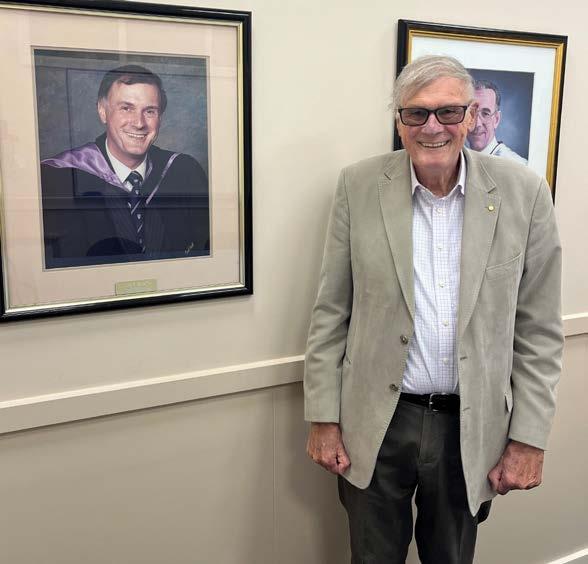
1. ON TOUR- CLASS OF 2004. 2. FORMER STUDENTS WITH FORMER STAFF MEMBER PAULINE WESTMORE. 3. JAMES MENTOR, JAMES ATKINSON, JAMES FOSTER, TOM BROWN. 4. SCOTT MORTIMORE, SAM LAKE, SAM DAVIDSON, NICK SPARGO, NICHOLAS BROWNLEE 5. PATRICK SIA, ANTHONY TZELEPIS, DAVID KIRSZENBLAT, BOB HU
COLIN BLACK OAM, NEXT TO A PHOTO IN THE LITHGOW BUILDING CONFERENCE ROOM, TAKEN WHEN HE WAS SCOTCH’S
PRINCIPAL
WHAT THEY'RE DOING NOW – COMPILED
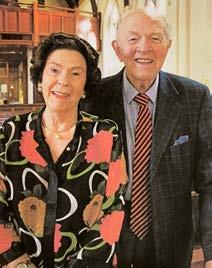



1940s
At school, FATHER JOHN CATHCART ’s (’48) goal was to become a medical missionary, but he actually became an engineering missionary, which he says was perhaps better suited to the needs of the developing world. Now in his nineties, John lives in Dallas, Texas, USA. In the course of his work, John visited some of the world’s most remote and desolate places, as well as meeting leading theologians and presenting papers at the Vatican.
He says: ‘The opportunity to attend Scotch and be a part of the heritage is a rare and invaluable thing which is far beyond the ability of a young man to really appreciate. I will always be indebted to the memory of Dr Colin M Gilray, the Fraser brothers, Steve Yarnold, Mr Charles Boyes, Dr Mendel, Miss Violet Woolcock, “Ginner” Davidson, “Tort” Jamieson, “Okka” Ferres, “Cakey” Adams, “Billy” Blenkiron and “Johnny” Bishop.
‘These men and a woman expanded my horizons and ignited an interest in academics and life. I salute Scotch and the men and women of Scotch, and the work they are doing in young lives. Who knows what will be accomplished by and through them when the final tale is told.’
Scotch has received the gift of a beautifully crafted autobiography by Nance Grant AM MBE, the wife of IAN HARRIS (’49). Nance became one of Australia’s greatest-ever singers, in a career spanning more than 40 years, including a decade in the 1970s as a principal singer with Opera Australia.
In 1976, Nance received an Order of the British Empire award – Member (MBE) in
recognition of service to opera; and in 2013 she received a Member of the Order of Australia award (AM) for significant service to the performing arts, particularly opera. Her autobiography, of 290 pages and lavishly illustrated, was launched in 2023. Ian attended Scotch from 1946-49. He and Nance were married in the Littlejohn Memorial Chapel on 6 April 1957. Their sons, GRANT (’78) and DAVID HARRIS (’83) attended Scotch.
1950s
The Manson family’s connection with Scotch boarding stretches back to the 1920s. DONALD MANSON (’26) was Captain of School House in his final year of 1926. Don was a Prefect in 1926 and he had been a member of the Athletics team from 1922-25. Don’s son, IAN MANSON (’51) was Captain of Arthur Robinson House in 1951, a year in which he was a Probationer, a member of the 2nd XI and Captain of the 2nd XVIII. The family tradition continued into the next generation: Ian’s son, ANDREW MANSON (’82) followed in his father’s footsteps as Captain of Arthur Robinson House in 1982, when he was also a School Prefect.
In the 2010s, the tradition continued into a fourth generation, when Andrew’s son, WILL MANSON (‘15) took on the mantle of Vice Captain of Arthur Robinson House; and to complete the picture – for now – Andrew’s second son, ANGUS MANSON (’17) served as Captain of Arthur Robinson House in 2017. The Manson family’s service to Scotch boarding over almost a century is remarkable.
On the morning of 21 February, PETER (GUS) HAWTHORNE (’53) loosened up a little on the first tee at Bellarine Lakes Country Club and then played a six-iron drive towards the green of this par three hole. He then watched incredulously as the ball landed on the green, rolled towards the hole and dropped in for a hole in one and five Stableford points. Gus, School Captain in 1954 and now aged 89, still plays off a handicap of 22.
Gus may have gazed with incredulity as this hole in one unfolded, but he shouldn’t really have been too surprised: this wasn’t his first hole in one – in fact he has performed the feat twice before at his home club of Barwon Heads Golf Club.
Gus plays golf regularly at Barwon Heads, and also enjoys rounds at other Bellarine Peninsula courses. He is a volunteer in the Australian Sports Museum at the MCG, and faithfully keeps in regular contact with Old Boys from his era.
1960s
In a post to Twitter’s rebrand, X, PROFESSOR PETER SINGER AC (’63) said he had given the last lecture of the last course he will teach at Princeton University. He said he used the occasion to reflect on his time at the university, which began in 1999 with a media spotlight on his appointment. ‘It’s been a great place to teach and work,’ he said. ‘While there, I’ve published on ethical theory, practical ethics, bioethics, globalisation and the ethics of our treatment of animals, alongside co-founding The Journal of
LEFT TO RIGHT: NANCE GRANT AM MBE AND IAN HARRIS (’49); MANSON FAMILY MEMBERS – ANDREW (’82), ANGUS (’17), IAN (’51) AND WILLIAM (’15); PETER (GUS) HAWTHORNE (’52); PROFESSOR PETER SINGER AC (’63).




Palestinian territories and Africa.
Controversial Ideas to champion freedom of thought.
‘I’ve had pleasing success in fostering civil discussions among undergraduates on contentious ethical issues. In my teaching, I’ve encouraged students to consider careers that will do the most good with their abilities and provide a rewarding life for themselves as well.’
LAUREATE PROFESSOR HUGH TAYLOR AC (’64) has been named at number five in the world’s Top 10 ‘EyeCons’ (eye consultants) by The Asia-Pacific Journal of Ophthalmology. The journal set up a committee to seek worldwide nominations for ophthalmologists who were alive, or had been alive, in the 21st century, who had made major contributions to ophthalmology and eye care – in the journal’s terms, ‘the most influential ophthalmologists who helped shape the world of ophthalmology in the 21st century’. They selected 24 and ranked the top 10, placing Hugh at number five. He was the only Australian to figure in the top 24.
Hugh is the Melbourne Laureate Professor Emeritus, at the University of Melbourne. He has been a leading Australian corneal and refractive surgeon and was the Founding Director of the Centre for Eye Research Australia. He has worked for many years to improve the eye health of Australian Aboriginal and Torres Strait Island people. However, much of his work has been about global eye health, including trachoma, onchocerciasis, and the harmful ocular effects of cigarette smoking and UV exposure. He has over 800 scientific publications.
Hugh has received many international awards and is a Companion of the Order of Australia (AC). He has had many leading international roles and was the President of the International Council of Ophthalmology.
1970s
Like most, TIM BUDGE’S (’73) career trajectory has varied; as he describes it, ‘sometimes stunning achievements and sometimes … perhaps just ahead of my time!’ After Scotch, inspired by masters such as KEN EVANS OAM (’47) and a love of maths, he completed an honours degree (Applied Maths) before teaching at inner-city high schools, places worlds away from his schooling.
In 1986, he started a ground-breaking employment organisation in Footscray, which now has 20 offices across Melbourne-Geelong. In 1991, he moved into international development, his global interest stemming from his early upbringing in Asia. Initially with World Vision, he oversaw projects across Africa, the Middle East and Asia. In 2006, Tim and partner Meredith moved to Timor-Leste, overseeing crisis-response, social development and capacity-building programs for Plan International.
A subsequent posting in Zambia sometimes felt neo-colonial, but he learned about indigeneity and decolonisation; big themes in his PhD on fostering social change. Based in Australia since 2013, he has been posted to Tanzanian refugee settings and in the Pacific and led evaluations in occupied
Now retired, he says he advocates for lost causes, like disarmament, Palestine and climate action. He loves his community radio show EarthChat on SeymourFM, cycling and time with his grandsons. Tim and Meredith live on 36ha of conservationcovenanted land, Taungurung Country, in central Victoria.
JOHN DE RAVIN (’73), his wife Rachel Geraghty and son Jack have moved to Italy for a year and are renting an apartment in Verona, in the ‘old town’ and very near the Castelvecchio (‘Old Castle’). John says it is a beautiful, interesting and historic part of the world. He told Great Scot: ‘My wife Rachel was the main driver for the relocation: she is an Italophile, having been learning Italian for four or five years, and having visited once or twice a year during that time. She loves everything Italian: the people, the culture, the architecture, the sights, the language, the food ...
‘Our son Jack and I are enjoying the move too; it’s certainly a big change from our lives in Sydney. We have already been on a ski holiday in Cortina (a beautiful location) and although I was initially very worried about getting back into skiing at the tender age of 67 after a 40-year gap, I found that it was indeed like ‘riding a bike’ – it does come back to you. The only downside was that by day four on the slopes, I heard regular cries from my 14 year old behind me on the slopes (after a lifetime skiing experience of only four days), of “hurry up, old man!”’
John says that while the family is in Italy they also plan to catch up with a lot of European-based friends, in France, Germany, England and Ireland.
LEFT TO RIGHT: LAUREATE PROFESSOR HUGH TAYLOR AC (’64); TIM BUDGE (’73); JOHN DE RAVIN (’73), SON JACK AND WIFE RACHEL GERAGHTY; PROFESSOR MATTHEW SNAPE MBE (’86) RECEIVING HIS MBE FROM THE PRINCE OF WALES.
WHAT THEY'RE DOING NOW





‘We are also thinking of a tourist visit to Iceland, where we’ve never been before,’ he said. ‘Our son, Jack, will attend the Conservatorium of Music in Verona, and I will continue with my off-campus studies towards a PhD degree on an investment topic from Bond University.’
1980s
Congratulations to PROFESSOR MATTHEW SNAPE (’86), who was awarded an MBE (Member of the Order of the British Empire) in the 2024 King's New Year's Honours list in the United Kingdom for services to public health, particularly during the pandemic.
Matthew is Vice President for Clinical Development, Maternal and Paediatric Vaccines at pharmaceutical and biotechnology company Moderna, where he is working on the development of vaccines against respiratory syncytial virus (RSV) and human metapneumovirus.
Prior to working at Moderna, Matthew was Professor of Paediatrics and Vaccinology at the Oxford Vaccine Group, University of Oxford, where he combined his work as an investigator on clinical trials of vaccines against Ebola virus, meningococcus, pneumococcus, RSV, influenza and SARS-CoV-2 with clinical work as a general paediatrician.
From 2017 to 2022 he was the Director of the National Health Service and National Institute for Health and Care Research funded National Immunisation Schedule Evaluation Consortium, which led key studies of mixed COVID-19 vaccine schedules that influenced global
immunisation policy. He remains a Visiting Professor at the University of Oxford.
After leaving Scotch, Matthew studied for his undergraduate degree at the University of Melbourne, and did his paediatric training at the Royal Children’s Hospital in Melbourne.
LEONIDAS VLAHAKIS (’89) is a well-known and beloved figure within Melbourne’s large and vibrant Greek community. An article in The Greek Herald during February described him as ‘somewhat of a cultural icon’. The paper said that at major events, such as the opening of the Greek Film Festival, Leonidas proudly showcases Greek film offerings.
Each year, Leonidas readily engages with visitors, politicians, performers and stallholders at the Antipodes Lonsdale Street Greek Festival, which this year was held on 24 and 25 February. According to The Greek Herald, the festival is the largest of its kind held outside Greece with three of the past four Australian Prime Ministers attending. Leonidas told the paper: ‘Let’s not kid ourselves – politicians look at the numbers before coming, and the sea of people celebrating the festival is a huge drawcard’.
Leonidas, who is an optometrist, rejoices in and thrives on his involvement with Melbourne’s Greek community. He told The Greek Herald : ‘It is my firm belief that human beings need to feel that they are part of something bigger, whether it be a footy club, a church group or Rotary; or in my case, the Greek community’.
1990s
ED KEON-COHEN (’91) works on Emily Hill Organic Farm in Dewhurst, about an hour east of Melbourne, in partnership with his mother, Sue. The property, of about 28 hectares, was purchased in 1981 by Sue’s late husband, JUDGE CHESTER KEON-COHEN (’58), when it was a bare, dry paddock. Chester chose blueberries for the land, after hearing the crop promoted by the state agriculture department. They now grow organic blueberries and citrus, including various lemon varieties and limes.
In 1982, Sue (having previously worked as a physiotherapist, with four young children in tow, and with no farming experience), got to work planting the first 500 blueberry plants. It was tough: there was no irrigation, and water had to be carried by hand to the plants from a nearby dam, but all the hard work paid off, as there are now about 2500 thriving organic blueberry plants on the property.
Ed at first had no plans to be a farmer, but after having been a policeman and detective for over 24 years, he left the force after suffering post-traumatic stress. He says he loves working on the farm and finds it very therapeutic.
Sue, Ed and the farm featured in an episode of ABCTV’s Gardening Australia early this year, and this item is based on that segment.
JUSTIN NEGLER ('93) is a patent attorney, protecting inventions and designs, mainly in the areas of renewable technologies, mining, construction and medical devices. He leads a team of
LEFT TO RIGHT: SUE AND ED KEON-COHEN (’91); JUSTIN NEGLER (’93) WITH WIFE BROOKE, SON LOUIS (YEAR 1) AND DAUGHTER VIVIENNE; NICHOLAS TAM (’06) RECEIVES HIS KNIGHTHOOD; WILL SLADE (’01) AND BEN SINCLAIR (’07); RAYMOND TONG (’94);
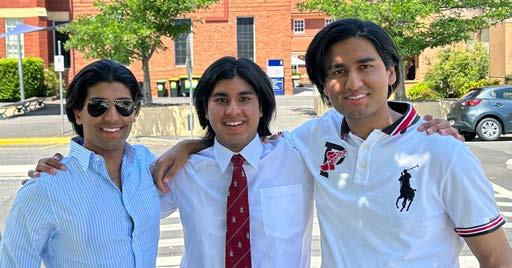
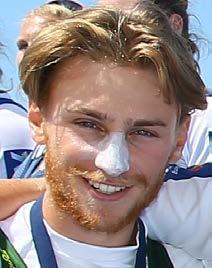
attorneys and has taught others entering the profession through working as a Senior Fellow and course coordinator at the University of Melbourne Law School. In this profession, he has found a warm place to pursue his career, among fellow Francophiles and lovers of cars, music and travel. He regularly visits France and the US for business development.
He holds Bachelor of Engineering and Science degrees, as well as a Masters of IP Law. Justin is furthering his own education this year at Harvard Business School, where he is undertaking a course in leading professional service firms.
With his wife, Brooke, Justin has two children; he is enjoying revisiting his own years at Scotch through his son Louis, who is now in Year 1, and his daughter Vivienne turns two this June. In his spare time, he enjoys playing tennis, driving and time down the coast at Kennett River with his family.
After finishing school, RAYMOND TONG (’94) studied Engineering and Commerce at Melbourne University. He worked at Goldman Sachs for over a decade as an equities analyst before moving into funds management. Raymond currently works at Loftus Peak, a global fund manager with a focus on investing in disruptive businesses that are driving change across industries globally. Raymond enjoys playing tennis and travelling, and currently has two sons at Scotch, Lachie in Year 12 and Ryan in Year 9.
2000s
NICHOLAS TAM (’06) received the great honour of a knighthood from the Philippines Government at a ceremony
in Manila in February. Nicholas was appointed as a ‘Knight Commander of the Order of Rizal’ for his services to international peacemaking through advocacy for the Commonwealth of Nations, and as Vice Chairman of the Royal Commonwealth Society.
Nicholas’ 2006 classmate, JEREMY LEUNG, who informed Great Scot of Nicholas’ knighthood, said: ‘This is a fitting honour for Nicholas and the Commonwealth as we celebrate the 75th anniversary of the London Declaration, which forms the foundation of the modern Commonwealth of Nations. As a result, under Philippines law, Nicholas is now to be known as Sir Nicholas Tam KCR, which is pretty cool!’
Jeremy told Great Scot that the Order of Rizal was founded in 1911 to uphold the legacy of Dr Jose Rizal, the Filipino doctor, intellectual and author who is a Philippines national hero, and considered the father of Philippines independence.
The opportunity to relax in the largest sauna in the Southern Hemisphere, fitting up to 25 people, is just one of the features of Inner Studio, a wellness space in Collingwood operated by the brothers WILL SLADE (’01) and BEN SINCLAIR (’09). Both are ex-AFL players: Will played 17 games for Geelong, and Ben played 63 games with Collingwood. Having endured multiple injuries and concussions, Will and Ben found physical recovery in focused breathwork and extreme temperature exposure.
It is this experience and the recovery techniques that they have incorporated in Inner Studio. The studio aims to encourage others to experience the positive results associated with increasing
stress thresholds, positive mentality and reduced recovery time. Inner Studio offers breathwork and yoga classes, hot and cold magnesium plunge pools (hot pool 40 degrees C, cold pool 5-8 degrees C) and of course, the giant sauna.
Will mentions that while the experience is fundamentally about physical and mental self-improvement, it’s also about connecting with others. He told Great Scot: ‘The global community around this thing is pretty amazing, and we’re seeing a real movement and appreciation within our local community here too, as every single person leaves feeling better than when they arrived.’
2010s
By gaining an Australian Tertiary Admission Rank (ATAR) of 99.95 and becoming a Dux of the School in 2023, RONAN AHL (’23) completed an amazing trifecta achieved by Ronan and his two brothers. Elder brother RION (’20) had achieved the same 99.95 ATAR and was a Dux of the School in the midst of COVID in 2020; and middle brother RYAN (’21) achieved the same ATAR of 99.95 in 2021 and was also a Dux of the School in that year.
JAMES ROOK (‘15) coxed the winning Victorian crew in the 2024 King's Cup, rowed at Penrith NSW in March. James became the first person to have won both the King's and Queen's Cup since the event started in 1918. He won the Queen's Cup in 2022, where he was co-coach as well as cox of the winning Victorian women's Queen's Cup crew.
At the 2024 Australian Rowing Championships, he also coached the bronze medal winning crew in the open men's coxed eight. This crew included Young Old Boys HARRY FOX (’13) and FRASER MISCAMBLE (’19)
James coxed the 3rd VIII in 2015, and then the Australian men's eight and men's coxed pair at the 2017 rowing World Championships, winning silver, in addition to coxing the Australian women's eight at the 2020 Tokyo Olympics.
LEFT TO RIGHT: RYAN (’21), RONAN (’23) AND RION (’20) AHL; JAMES ROOK ('15)

MR PAUL MISHURA SCHOOL ARCHIVIST
EWAN HOUSE, KNOX'S ORIGINAL PREPARATORY SCHOOL, WHICH OWES MUCH TO SCOTCHIE GEORGE GILLESPIE'S GENEROSITY
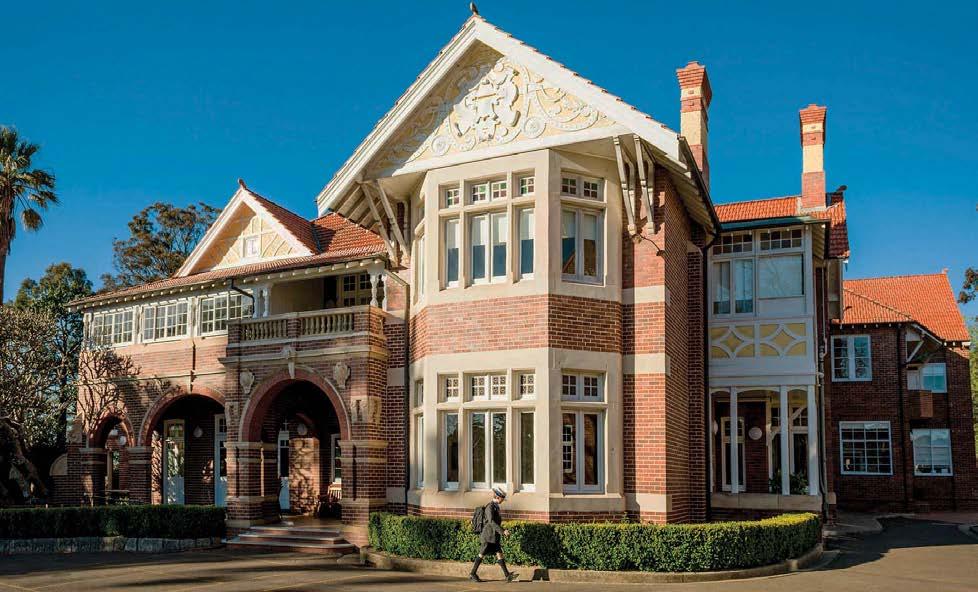

SCOTCH BOYS AND THE FIRST 100 YEARS OF KNOX GRAMMAR SCHOOL
The Scottish love of education is evident in Old Boys’ role in the founding and first century of Sydney’s Knox Grammar School.
On 3 September 1923 the newly-formed Knox Provisional Council met to establish a Presbyterian Church school to meet a long-recognised need for one on Sydney’s Upper North Shore. It resolved to purchase ‘Earlston’, a 12 acre property at Wahroonga. That Council included two men recognised as founders of Knox: Scotchies George Gillespie (born 17.7.1863, entered Scotch 1877, died 10.4.1938) and Bryan Cecil Fuller KC (born 17.8.1888, SC 1902-06, died 23.3.1956).
Gillespie was a general merchant at the Anchor Flour Mills, joint Managing Director of Gillespie Brothers, a director of the Royal Exchange Assurance Company, and a grazier. He served on the Knox council from its 1923 foundation until his death. Gillespie
anonymously deposited a large sum of money into Knox’s account during the Great Depression, and, in 1933, provided funds to repay the mortgage on Ewan House, Knox’s Preparatory School. His brother, (later Sir) Robert Winton Gillespie (who did not attend Scotch), was also a co-founder of Knox. He (not George) is the eponym of Knox’s Gillespie House).
Fuller was a barrister and a Presbyterian layman who later became a council member (1921-55, Chairman 1938-55) of St Andrew’s College, University of Sydney, procurator of the General Assembly of the Presbyterian Church of Australia, and President of the New South Wales Lawn Tennis Association.
Fuller was a member of Knox’s council from its foundation until 1945 but remained involved at Knox. He is the eponym of Fuller House, in Knox’s Preparatory School. His son, Sir John Bryan Munro Fuller, was a foundation Knox boy (KGS 1924-35).
Knox opened in 1924 with 28 boys. Its first Headmaster was Neil Harcourt MacNeil MC (born 17.4.1893, SC 1903-11, died 1.8.1946), a 1910 and 1911 Prefect, and editor of The Scotch Collegian. He served in the British Army from 1914 to 1917, when he joined the Royal Flying Corps (1917-18). For the defence of Loos on 25 September 1915 he was awarded the Military Cross. For more information, see https://www.scotch.vic.edu.au/ww1/ honour/macneilNH.htm
MacNeil served Knox as its Headmaster until 1939, and was then Headmaster of Wesley College from 1940 until his death. He set Knox on a solid foundation and saw it through the Great Depression, increasing enrolments to over 300. MacNeil conducted Knox as if it were a military exercise, which was not always appreciated by its boys and staff, but he had forward-
thinking ideas about education, and was powerful and respected at the Headmasters’ Conference of Australia. Despite his gruff bearing, a brave young Knox boy, John William Wentworth Butters (KGS 1934-43) (who described him as being like granite), decided to say farewell, in his office, on MacNeil’s last day at Knox. MacNeil looked out the window at the oval while Butters spoke to his back. MacNeil then turned around, thanked Butters, shook his hand, and Butters saw tears running down MacNeil’s cheeks.
Knox’s House system originally had three Houses. In 1953, School House was renamed MacNeil House. Three of Knox’s 14 Senior School Houses are named after Scotch boys who served Knox well.
In 1970 Knox added Murdoch House. Alan May Murdoch MC (born 12.11.1894, SC 1906-09, died 25.5.1971) joined the Knox School Council in 1938, and was its Chairman from 1955 to 1969. He had served in the AIF from 1916 to 1919, winning the Military Cross by capturing an enemy line at Messines during fighting from 7-9 June 1917. See https://www.scotch.vic.edu.au/ww1/ honour/murdochAM.htm.
Murdoch was Assistant General Manager of the Australian Mercantile Land & Finance Company and a Chairman of the McGarvie Smith Institute. His son, Alec Brown Shepherd Murdoch, attended Knox from 1937 to 1940.
Montgomery House was added by Knox in 1977. John Alexander Ross (Ross) Montgomery (born 16.5.1893, SC 1907-10, died 23.7.1970) was a member of the Knox School Council from 1953 to 1970. A civil engineer and Managing Director of A.R.C. Engineering Pty Ltd, Ross was a generous school benefactor. He gave Knox the Montgomery building, Gilmore House, and various smaller gifts including the bronze doors that grace Knox’s chapel. Meanwhile, he did not forget his old school, giving Scotch £100,000 for the Junior School’s J. Ross Montgomery Building, which was dedicated on 4 October 1963.
Beyond these Scotch boys who made significant contributions to the establishment and growth of Knox from 28 boys to 3000 students, there are numerous other common connections. Of teachers who have taught at both schools, Roy Sutherland Smith (born 1.1.1903, died 28.3.1983) stands out for his long service at Knox from the 1930s until the 1970s, having previously taught Music in Scotch’s Junior School (1920-29).
Albeit likely an incomplete list, 67 Knox boys who have moved to Victoria have come to Scotch and 24 have left Scotch to attend Knox, four of those boys having come from and then returned to Knox. At least four Old Knox Grammarians have sent seven sons to Scotch, and Scotch blood is known to fuel more than a few Knox boys.
Notable among shared Old Boys are Allan Cansdell Cover (born 13.7.1919, KGS 1930-33, SC 1934-36, died 13.9.2019), a centenarian who helped Knox with its own approaching centenary. A notable potter and teacher was Ivan Junior McMeekin OAM (born 15.9.1919, SC 1928-30, KGS 1936-37, died 28 May 1993), and shared victims of World War II are Hugh Robert Hector Ross (born 15.6.1902, KGS 1931-32, SC 1933-37, killed 17.12.1943) and John Harrison Gillespie (born 15.8.1924, SC 1937-38, KGS 1939-41, killed 7.10.1944).
Scotch boys’ interest, service, commitment and philanthropy to education are well captured by the Old Boys who helped establish and grow a school much like their own - in Wahroonga.
Happy birthday, Knox!
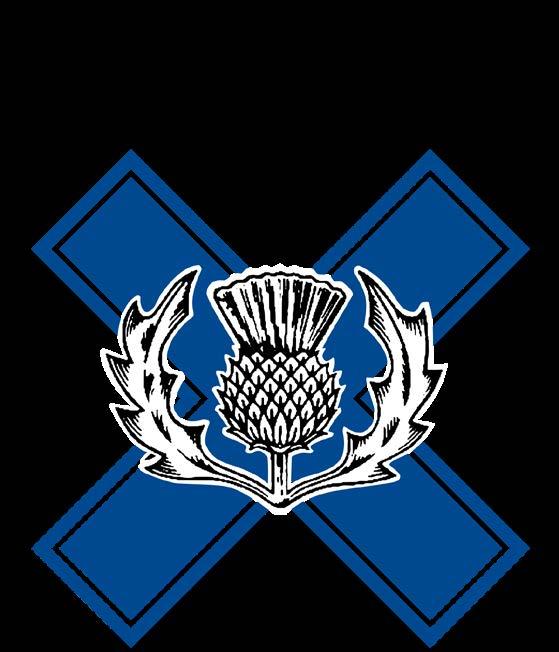
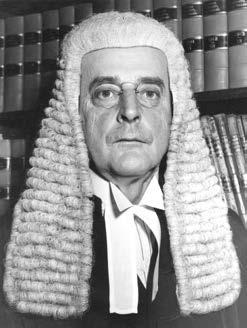
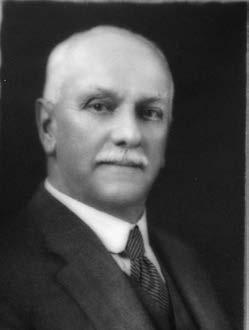
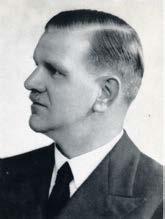


ABOVE: KNOX GRAMMAR SCHOOL LOGO WITH THE CROSS OF ST ANDREW AND SCOTTISH THISTLE.
ABOVE, LEFT: BRYAN FULLER, KC. RIGHT: GEORGE GILLESPIE IN 1930.
ABOVE, LEFT: NEIL HARCOURT MACNEIL MC. MIDDLE: ALAN MAY MURDOCH MC. RIGHT: JOHN ALEXANDER ROSS (ROSS) MONTGOMERY
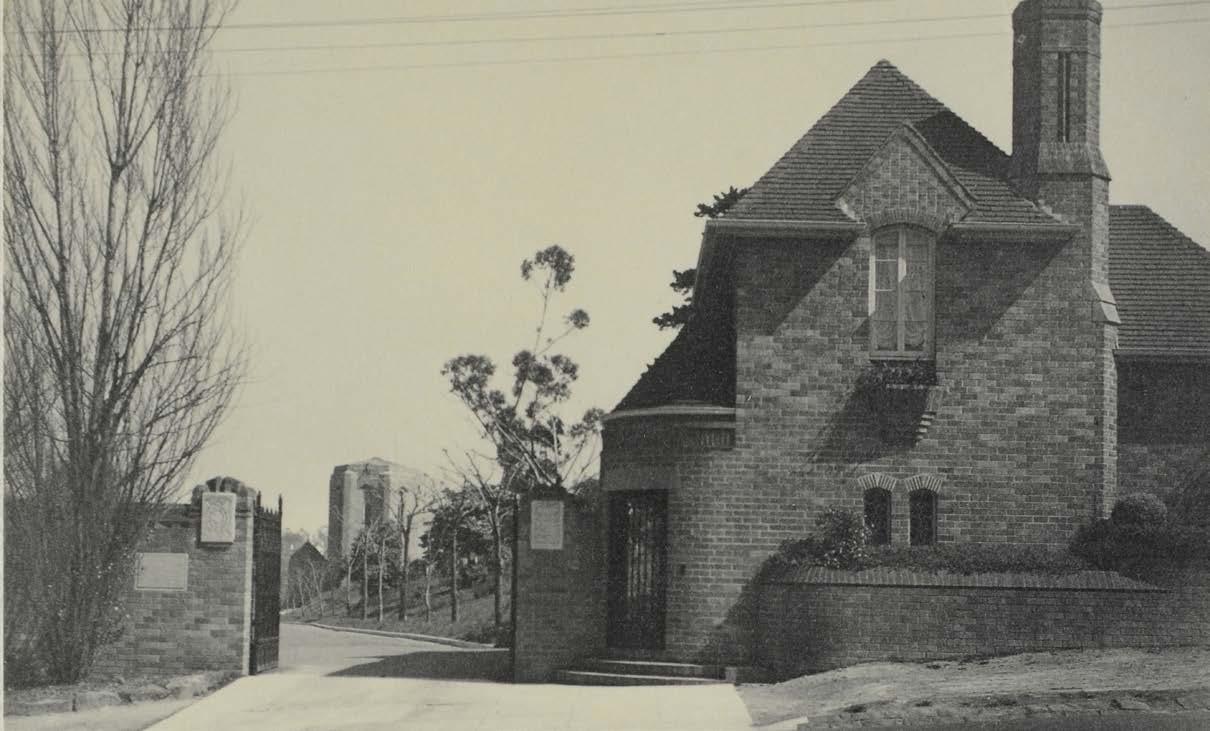
THE 25 OLDEST KNOWN LIVING OLD BOYS
(AS AT 20 MAY 2024)
1. Rev. William Morgan, b. 23 October 1915. School Captain 1935. Aged 108
2. William Simpson Brake, b. 12 May 1923. 1941 Prefect. Aged 100
3. Bruce Acland Miles, b. 2 August 1923. Aged 100
4. Maurice Smith, b. 15 November 1923. Aged 100
5. Robert Wilbur Wishart , b. 7 May 1924. Aged 100
6. Dr Trevor Percival Telfer, b. 7 August 1924
7. Edward Graeme Marshall, b. 2 September 1924
8. Herbert Neil Kelly, b. 10 November 1924
9. William Geoffrey Wicks, b. 11 November 1924
10. Cornelius Jan Schram, b. 29 November 1924
11. Donald Albert Howarth, b. 26 December 1924
12. Russell Callum Jack , b. 13 January 1925
13. Bruce McKenzie Crowl, b. 1 September 1925
14. Douglas Roland Zerbe, b. 13 January 1926
A LIFE OF SERVICE: WILLIAM SHEARER PHILIP
Born on 18 August 1891 at Williamstown, Bill attended Scotch from 1906 to 1908. He served in in the AIF in World War I from 1915 to 1919, winning the Military Cross on 9 April 1918 near Albert, France, for coolly commanding his section on the front line during a 12-hour enemy artillery bombardment. For more details, see https://www.scotch.vic.edu.au/ww1/ honour/philipWS.htm
In addition to Bill’s medals, including the Military Cross, the wartime collection includes an astonishing address book filled with details of his movements during the war, letters sent and received, and casualties and deaths. There are four letters relating to his Military Cross,

15. Stuart Paton Wilson, b. 15 February 1926
16. Adrian Donald Waller, b. 20 March 1926. 1938 Junior School Captain.
17. Dr Arthur George Stephens, b. 23 March 1926.
18. Rex Jenkins, b. 22 April 1926
19. Douglas Skinner Anderson, b. 5 May 1926
20. Thomas Morland Glazebrook AM, b. 7 May 1926
21. Donald John Sutherland, b. 8 May 1926
22. Donald James Little, b. 18 June 1926
23. Alan Fyfe Stuart , b. 24 July 1926
24. Frederick Randall Pearson, b. 27 July 1926
25. Adrian Maddren Graley, b. 29 July 1926
The youngest Scotch boy is James Ooi, b. 29 March 2019 – 103 years, 5 months and 6 days younger than the oldest known living Old Boy
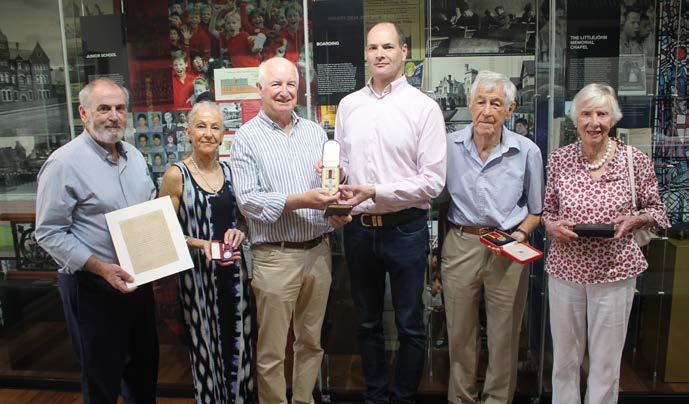
ON 21 FEBRUARY 2024 MEMBERS OF THE PHILIP FAMILY DONATED A COLLECTION TELLING THE STORY OF BILL’S LIFE OF SERVICE
including letters from General William Birdwood and Sir H.S. Rawlinson.
An accountant and partner at Flack & Flack and at Price, Waterhouse & Co., Bill served on various councils and boards, but charities were his passion. He was on the Alfred Hospital’s board of management (1935-75), its Treasurer (1939-48) and its President (1948-75). Bill oversaw an expansion of the Alfred’s medical services and buildings, which included a block named after him in 1963. He felt that ‘the
highest standard of medical care should be made available to all the people’.
In 1961 he was awarded the Order of St Michael and St George (CMG) and in 1975 he was knighted ‘for service to hospital administration’. Both of these awards were included in the donation to Scotch.
Bill’s life of service ended with his death on 25 August 1975 at Toorak.
Scotch is grateful to his descendants for donating items that chronicle his life of service.
OBITUARIES
DEATHS OF OLD BOYS OR FORMER STAFF MEMBERS OF WHICH SCOTCH IS AWARE ARE LISTED HERE
INDEX
ADAM, Ralph Alexander (’55). Born 14 October 1937, SC 1947-54, died 25 March 2024
BARCLAY, John Kenneth Brett (’48). Born 18 February 1931, SC 1945-46, died 22 March 2024
BELL, Norman Richard (’46). Born 26 October 1929, SC 1941-45, died 17 March 2024 at Pindara Private Hospital Ashmore, Queensland
BENSON, Berenice Annerica (Staff 1968-93). Born 28 July 1932, died 18 February 2024
BLAIR, Andrew David (’58). Born 3 January 1941, SC 1949-58, died 27 April 2024
BUIST, Dr David Gregor Paterson (’53). Born 18 March 1937, SC 1950-52, died 23 October 2023
CALLOW, Ian Richard (’47). Born 8 December 1930, SC 1944-47, died 29 December 2023
CAMERON, Robin Charles (’55). Born 13 January 1938, SC 1950-55, died 24 December 2023 in Queensland.
CHAMBERS OAM, William Bruce (’50). Born 5 June 1933, SC 1940-49, died 14 December 2023
CLARK, David (’62). Born 27 July 1944, SC 1957-61, died 29 January 2024 at Flaxton, Queensland
COGDON, Geoffrey Archibald Montague (’52). Born 1 September 1934, SC 1942-50, died 8 April 2024
CONROW, Ransom Brown (’45). Born 10 January 1929, SC 1934-37, died 9 January 2024 at Cape Cod, Massachusetts, United States of America
COX, Leonard Henry (’46). Born 22 January 1929, SC 1939-46, died 21 May 2024
CRONE, James Graeme Dalrymple (’54). Born 24 September 1936, SC 1950-54, died 22 April 2024
CURTIS, David William (’58). Born 7 January 1941, SC 1955-59, died 7 December 2023
DAVIS, Darrel Thomas (’48). Born
28 March 1931, SC 1945-48, died 25 October 2023
DOHERTY, Ian Thomas (’60). Born 29 January 1942, SC 1953-59, died 6 November 2023
DONAGHEY, John Robert (’60).
Born 3 January 1943, SC 1957-58, died 25 November 2023
DRAFFIN, Donald Roderick (’60).
Born 7 April 1943, SC 1955-59, died 14 March 2024
DYSON, David Hartnett (’60).
Born 9 July 1943, SC 1952-61, died 2 May 2024
EVANS, Nicholas Robert Charles (’02). Born 5 October 1984, SC 1990-2002, died 24 April 2024
FELLER, Dr Michael Charles (’63).
Born 28 January 1946, SC 1958-63, died 20 January 2024
FINDLAY, Dr Ian Irving (’50). Born
30 December 1933, SC 1947-51, died 28 November 2023
FOSTER, Peter John (’56). Born 1 February 1939, SC 1953-55, died 10 December 2023
FREELAND, Peter Grant (’47).
Born 31 October 1930, SC 1940-46, died 24 February 2024
FURPHY, Samuel John (’03). Born 19 June 1985, SC 1991-2003, died 15 January 2024
GILCHRIST, John Irvine (’48). Born 15 February 1931, SC 1945-46, died 15 March 2024
GILL, Baldeep Singh (’83). Born 23 April 1965, SC 1978-83, died 6 December 2023
GLOWREY, William Christopher (’04). Born 19 March 1986, SC 1991-99, died 3 April 2024
GORDON, John Sutherland (’57). Born 2 January 1940, SC 1952-57, died 13 July 2023
GRAHAM, Edwin Rupert Bruce (’46). Born 4 March 1930, SC 1946-47, died 8 May 2024 in South Australia
GRAVE, Norman Francis Roper (’46). Born 23 November 1928, SC 1941-45, died 19 February 2024
GUNDERSEN, John Arnold (’43).
Born 6 December 1925, SC 194042, died 2 July 2023 in Norway
HAUGHTON, Neville Lee Charles (’53). Born 28 June 1936, SC 1948-50, died 17 February 2024
HERRON, Robin Arthur George (’53). Born 23 May 1936, SC 1950-53, died 25 March 2024
HINDSON (nee Hill), Alison Yvonne (Staff 1997-2008). Born 26 August 1947, died 30 April 2024
HOAD, Francis Alister Knox (’77) (b. 15 December 1959, SC 1972-77, died 17 December 2023 at Xai Xai, Mozambique
HODGES, Anthony John (’62).
Born 5 February 1945, SC 1953-58, died 23 February 2024
HOGAN, John Arthur (‘51). Born 30 December 1934, SC 1947-49, died 13 March 2024 at South Hobart, Tasmania
HORTIN, Robert Clive Fraklin (Staff 1981-2019). Born 24 December 1956, died 19 May 2024
HUGHES, Bruce Evans (’45). Born 9 February 1927, SC 1940-45, died 5 December 2023
JOSEPH, Peter Graeme (’55). Born 3 June 1938, SC 1951-55, died 16 December 2023
KAUFMAN, John Victor (’56). Born 9 April 1939, SC 1950-57, died 23 March 2024
LIPSHUT, Alan Geoffrey (’63).
Born 11 May 1946, SC 1956-63, died 20 November 2023
MACKAY, Bayne Reay (’57). Born 16 October 1940, SC 1955-56, died 19 November 2023
McADAM, Graham Leslie (’47).
Born 8 November 1930, SC 194246, died 26 October 2023.
McINNES OAM, Dr Ian Edgeworth (’47). Born 14 January 1931, SC 1942-48, died 25 June 2023
PARTON, Rev. Alan Norman (’55). Born 13 December 1937, SC 1947-56, died 28 February 2024
Obituaries for the names in italics below appear on the following pages of this edition
RANDALL OAM, Brian Charles (’51). Born 13 December 1933, SC 1946-52, died 15 December 2023
RANK, Andrew Harold (’59). Born 9 February 1943, SC 1952-60, died 6 January 2024 at Mackay, Queensland
RAY, Douglas Lawler (’46). Born 10 October 1929, SC 1943-46, died 15 February 2024
RODAN, Dr Brian Alexander (’46). Born 17 June 1929, SC 1942-46, died 27 March 2024 at Bedford Park, South Australia.
RYLAH, Michael Timothy Froude (’61). Born 30 November 1943, SC 1957-60, died 3 November 2023 in New South Wales
SCHLOEFFEL, Peter Ramsden (’65). Born 12 July 1948, SC 196365, died 2 March 2024
SELLARS-JONES, Graham Richard (’52). Born 28 September 1935, SC 1945-53, died 16 January 2024
SHAKES, Andrew Brian (’85). Born 27 November 1967, SC 1980-85, died 4 December 2023
SHARMAN, George Stanton (’47). Born 24 November 1929, SC 1943-47, died 9 April 2024
SHEPPARD, James Winter (’47). Born 7 June 1928, SC 1942-44, died 6 May 2024
SIGGINS, Phillip Sydney (Staff 1977). Born 9 October 1949, died 18 January 2024
SIMPSON, Bruce Priestley (’75). Born 4 April 1957, SC 1970-75, died 13 February 2024
SLOANE, Peter Hay (’54). Born 11 January 1938, SC 1947-55, died 10 October 2023 at Launceston, Tasmania
SMALLEY, Kenneth Field (’54). Born 18 January 1936, SC 1950-54, died 20 May 2023
STEWART, Alexander (’48). Born 18 December 1930, SC 1939-49, died 27 April 2024
SWINBURNE, George Gerald
MacCallum (’61). Born 25 June 1944, SC 1955-61, died 3 December 2023 in Hong Kong
TINGATE, Geoffrey Arthur (’39).
Born 30 October 1922, SC 1937-40, died 18 April 2024 at Miranda, New South Wales
TOR’BEY, Malcolm Ross (’82).
Born 29 September 1964, SC 1979-82, died 6 April 2024
WADE OAM, Robert Albert William (’49). Born 29 July 1930, SC 1946-49, died 30 January 2024
WAGSTAFF, David James (’94).
Born 14 July 1976, SC 1990, died 19 February 2024 in Queensland
THE OBITUARIES APPEARING BELOW HAVE BEEN WRITTEN BY FAMILY OR FRIENDS, EXCEPT FOR THE OBITUARY FOR BRIAN CHARLES RANDALL OAM (’51), WHICH WAS WRITTEN BY SCOTCH ARCHIVIST, PAUL MISHURA.
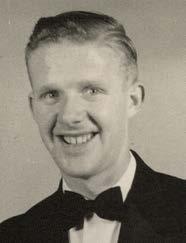
BUIST, Dr David Gregor Paterson (Greg) (’53)
Greg’s wife, Jean Buist OAM, wrote:
David Gregor Paterson
Buist – known as Greg – was born on 18 March 1937 at Mossgiel Private Hospital, Surrey Hills, the son of Thomas Whitson Paterson and Jean Elizabeth (nee Finlay) Buist.
After two years at Box Hill High School, Greg attended Scotch from 1950 to 1952, leaving in Year 11. His memories of Scotch were very fond and long-lasting. He returned there to marry Jean Elizabeth Hill on 22 August 1958 and shared 65 years of a happy marriage. Greg would have loved to have sent sons to Scotch, but had four daughters: Anne, Janifer, Heather and Cathie.
Initially a pathology technician, Greg returned to study, passing Matriculation and graduating in Medicine at Melbourne University. He later added a specialist Pathology degree. Greg was an eminent
pathologist in public and private practice. He was a partner at Dorevitch Pathology.
A man of determination, Greg had strong values, and a quiet commitment to his family, his profession and the community. In the 1980s as the AIDS epidemic began, there was considerable fear around the risks of transmission. Pathologists were reluctant to undertake autopsies on AIDS victims: Greg was not among them, becoming a go-to person at Fairfield Hospital.
Greg also made time to drive his daughters to equestrian events all around Victoria, to contribute at a senior level to
the Scouting movement, as Vice President of the Victorian Horse and Pony Club, and supporting Jean with her voluntary work. After retiring from pathology at the age of 75, Greg lived in Lancefield and bred Poll Hereford cattle and horses.
On 23 October 2023 Greg died at Corpus Christi Palliative Care, Kew.
He will always be loved, remembered and missed by his wife, daughters, five grandchildren and two great-grandchildren as well as extended family and friends.
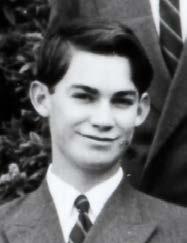
CURTIS, David William (’58) Dr David Kemp AC (’59), a school friend, consulted with David’s sister, Fiona, and colleague John Waterhouse, and wrote:
David was
born at St Albans, Oakleigh, on 7 January 1941, the son of Edgar William and Ruth Isabel (nee Morrey) Curtis, and grew up in Hughesdale. His sister Fiona was born four years later. David attended Murrumbeena State School, of which he was Dux. At Gardiner Central School he won a scholarship to Scotch, commencing in Remove A in 1955.
A brilliant student in Languages, David was Dux of his class each year through to Leaving and in Matriculation (two years), Dux of French (1958, 1959), as well as of Divinity (1958), and Latin (1959), achieving a state Exhibition in Latin. Like many students of Ron Bond, he maintained his interests in Languages and Ancient History throughout
his life, and became a notable teacher of these subjects.
At Melbourne University, while a non-resident (1960-61) and later resident (1962-63) at Trinity College, David achieved a Bachelor of Arts (Hons) in Classics and Languages (Latin, Greek and French), receiving Trinity’s J.H. Sutton scholarship. A devout high church Anglican, he studied theology for two years, holding the Trinity College Kew Theological Studentship. David then entered the teaching profession at Barker College, Hornsby, NSW (1966-69), teaching French and Latin, Ancient History and English, during which time he obtained his Diploma of Education at New England.
David’s devotion to high church Anglicanism and to the music of the piano and organ began during his school days, when he would often play the organ in the Memorial Hall. A keen bushwalker and naturalist, David introduced bushwalking to his students at Blue Mountains Grammar (where he commenced teaching in 1971) and Beaconhills College (from its foundation in February 1982), at both schools having responsibility for Classics, Languages and the Duke of Edinburgh Award Scheme.
He undertook many challenging walks in Australia, New Zealand, Nepal and South America, and his skills, knowledge and leadership in these activities made David a legendary figure in the lives of many students at both schools.
David died at Cumberland View, Wheelers Hill, on 7 December 2023. A funeral mass was held at St Peter’s Eastern Hill on 15 December.
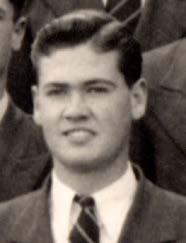
DAVIS, Darrel Thomas (‘48)
Darrel’s son, Brett (’72), wrote: Darrel
Thomas Davis was born on 28 March 1931 at home at Preston.
At Scotch from 1945 to 1948, he was a founding member of the Scotch Pipe Band in 1946, and was incorrectly named (instead of M.H. Davis) in the 1947 Swimming team. Among others at Scotch were Darrel’s cousins William Munro Davis (born 11.8.1921, SC 1936-38, died 4.9.1989), John Darral Davis (born 7.7.1927, SC 1936-45, died 20.7.1988) and Darrell Thomas McKay (born 24.3.1926, SC 1938-43, died 20.2.2011) and sons Brett (SC 1967-72) and Ross (SC 1975-81).
Darrel followed his family’s pharmacist tradition. At Pharmacy College he met Alma Alexandrina Eason. They married at Scotch on 1 May 1954 and, in addition to their sons, had daughters Kaye and Jill.
Darrel’s father established a Greensborough pharmacy and employed Darrel as manager until 1959, when Darrel and Alma purchased it. In 1968, Darrel sold it to work for the Commonwealth Department of Health. In 1969, the family moved to Camberwell, near their children’s schools, and Darrel purchased a Cheltenham pharmacy, selling it in 1979 to return to the Health Department.
Very creative, Darrel designed and constructed many things, including two motorboats; the first one in the lounge room of their Greensborough home. He later bought a new outboard motorboat named Jaye, after his daughters. Many family holidays involved water-skiing at Mount Martha and Yarrawonga.
In 1962, Darrel tried snow-skiing, enjoying it so much that the family became founding members of Alkira Ski Club. Darrel helped design its first lodge, spending years of weekends building it at Mount Buller with other members. Darrel’s skiing quickly improved: in 1972 he won the club’s downhill and slalom championships.
After the children finished school, Darrel and Alma bought a property at Healesville, and he became heavily involved in breeding deer,
and growing flowers with their son, Ross. Alma died on 11 October 2002, and Darrel married Mrs Roberta Ann (nee Shaw) Spencer on 5 November 2005 at Mont De Lancey, Wandin.
About nine years ago, Darrel was diagnosed with Parkinson’s disease. He died at Grand Cedar Aged Care, Ashwood, on 25 October 2023.
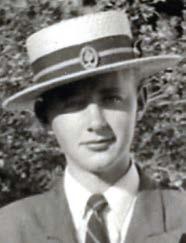
DOHERTY, Ian
Thomas (‘60)
Ian’s friends, Rick Aitchison (‘57) and Graham Flett (‘58), wrote: Ian was born on 29 January 1942 at East Melbourne, the son of Old Boy
Hugh Thomas Doherty (born 13.1.1915, SC 1928-30, died 8.11.2006) and Jessie (nee Whyte). Ian attended Scotch from 1953 to 1959. He swam, was a member of the 2nd XV, and the Pipe Band. Also at Scotch were his brother Bill (SC 1952-57) and uncle David Edward Doherty (born 11.3.1917, SC 1930-31, died 26.4.1978).
Raised in Yarraville, early lifelong Scotch friendships were established around Footscray with John Christensen (‘57), Craig Ebeling (’57) and Pete Gordon (‘59). Throughout his youth, Ian loved horseriding, hunting and trail riding through the High Country.
Following an Elders cadetship, Ian opened the successful Ian Doherty’s Hardware in Cotham Road, Kew. Graduating in 1981 with a Certificate in Business Studies at Prahran TAFE, Ian worked in real estate, his outgoing personality shining, and combining his love of building, architecture and working with people.
Ian met Robyn Ann Garratt in Point Lonsdale near the Surf Club where he rowed surfboats and made lifelong friends. They married at Scotch on 16 September 1970; Robyn worked at Scotch from 1983 to 2005. Their daughters Sally and Amanda were followed by grandchildren Jessica, Georgie, Ollie, and Sam. In 2006, Ian and Robyn retired to Point Lonsdale: Ian was a valued member of Riding for the Disabled,
the Bellarine Photography Club and the Queenscliffe Maritime Museum (QMM).
Joining the QMM as an ‘outdoors and boatshed volunteer’, Ian soon became Outdoors Maintenance Coordinator. A perfectionist, Ian led volunteers in meticulously restoring boats and maintaining the grounds. Their magnificently restored wooden fishing boat named the Q won the Royal Geelong Yacht Club’s Wooden Boat Festival’s 2018 Cayzer Boats trophy for the Concourse d’Elegance, Motor Boat.
In 2023 the QMM workshop was named after Ian for his outstanding contribution, and he was made a life member.
Ian’s devotion to family and friends was his greatest gift. He truly valued his connections with them, and will be forever remembered as a kind, caring and courageous gentleman from Scotch.
Ian died on 6 November 2023 at Epworth Geelong, Waurn Ponds.

FURPHY, Samuel John (’03) Sam’s brother, Ross (’99), wrote: Sam was born on 19 June 1985 at Waverley Private Hospital, Mount Waverley. He was at Scotch from Prep in 1991 to Year 12 in 2003. Sam’s passion for sport blossomed in the Senior School, playing in the 2002 1st Water Polo team, culminating in the uncommon awarding of triple colours for excelling – in 2003 – in the winning 1st XV, and in the Water Polo and Swimming teams, while maintaining excellent academic results. His brother Ross attended Scotch from 1988 to 1999 (before Prep was introduced).
At Monash University Sam received a double degree in Business Systems and Commerce. He commenced working at Deloitte in Melbourne.
Sam remained deeply involved in sport, holding memberships at the Melbourne Cricket Club, Kew Golf Club, and passionately supporting the Hawthorn Football Club. His love for sport spanned from touch rugby to cycling. Sam remained
ARCHIVES
active as a rugby referee, officiating 51 games (predominantly supporting grassroots) and attending Rugby World Cups in Japan and France. He competed in water polo for Melbourne University, where he met his future wife, Sarah Elizabeth Paul.
Following Sarah's return to Toronto in 2011, Sam joined her in February 2012, securing a transfer with Deloitte. They married at The Farmhouse at Redcoats, Hitchin, England, on 24 April 2015, before returning to Melbourne later that year. After nine successful years at Deloitte, Sam accepted a role in Japanese brewer Asahi’s Melbourne office in 2018.
Sam and Sarah welcomed their son, Angus, on 4 January 2019. Sam embraced fatherhood with warmth and dedication, ensuring his family's wellbeing and comfort amid his professional commitments.
In May 2021, Sam faced the challenging diagnosis of brain cancer. Despite the adversities, he valiantly balanced medical treatment with maintaining a sense of normalcy in his life. He continued his professional responsibilities with Asahi until November 2023, exhibiting resilience and determination throughout his journey.
Sam's courageous battle ended on 15 January 2024 at the Peter McCallum Cancer Centre, surrounded by Sarah, and other loved ones. His legacy of strength, love, and dedication to family will forever endure in the hearts of those who knew him.

GILL, Baldeep
Singh (’83)
Baldeep’s son, Harrison (’19) and his classmate, James McAdam (’83), wrote: Baldeep was born on 23 April 1965 at Seremban, Negri Sembilan, Malaysia, the only son of Hargopal Singh and Savira (nee Balbir) Gill. His early primary school years were spent in Malaysia and Singapore.
The Gill family migrated to Australia in 1974 and Baldeep completed his primary schooling at Kew State School, before entering Scotch in 1978 as a member of Selby Smith House (major House) and Shew House (minor House).
Baldeep was a keen cadet, rising to the rank of Cadet Under Officer of 9 Platoon, C Company. Cadets led to several lifelong friendships from the Class of 1983, including Craig Hooper, Paul Kelly, Ian MacDonald, James McAdam and Phil Murtagh. The Gills were also close family friends with the Ganes, including Baldeep’s classmate Colin Erland Gane (born 17.4.1966, SC 1978-83, died 20.8.1983).
After completing his HSC, Baldeep attended La Trobe University where he was accepted into the School of Economics. Completing his Bachelor’s degree he was accepted into the graduate program of the Royal Bank of Canada in 1987.
Throughout university, Baldeep supported himself by working at the Market Lane store of the Pancake Parlour. It was there in 1987 that he met Melanie Elizabeth Baker and they were married at Scotch on 30 May 1992.
Baldeep and Melanie welcomed their son, Harrison (SC 2007-19) in 2000, followed by twins Dominique and Genevieve in 2002.
Baldeep particularly loved the Pipes and Drums in which Harrison participated at Scotch.
Throughout his professional career, Baldeep had a range of very senior commercial roles at ANZ, the Australian Wheat Board, Target, Cotton On and as Head of Business Intelligence, Operations and Program Management for Amazon in Seattle. Returning to Australia in 2020, Baldeep secured directorships with APT Travel and iPRO.
Recently, he reconnected with old friends from the Class of ’83 at their 40 Year Reunion.
Baldeep died suddenly of a cardiac arrest on 6 December 2023 at the Alfred Hospital, Prahran.
(born 14.3.1922, SC 1933-37, died 17.9.1996) and Mary (nee Plotkin). He attended Malvern Grammar School (1951), Lloyd Street Central School (1952-55) and Scotch from 1956 to 1963. Others at Scotch included his brothers Peter (SC 1959-67) and David (SC 1961-72), son Andrew (SC 1998-2004) and nephew Mark (SC 1987-98).
Alan fitted in an adventurous and active life around work, the latter never overtaking his keen interest in sport, current affairs, family and adventure travel. He married Juliet Gai Stanley at Toorak on 29 April 1984, and remarried on 22 December 2018 in the Fitzroy Gardens, East Melbourne to Jennifer Jane (Jane) Trinca. Jane found a sincere, honest and passionate man with a keen sense of humour, great compassion and an ability to focus. Everyone knew Alan’s love of numbers and statistics and he was a stickler for correct grammar.
After Scotch, Alan had a year at Taylor’s College, before undertaking a Bachelor of Economics at Monash University and postgraduate studies at the University of New South Wales. After a graduate position with ACI, he did management consulting with Coopers & Lybrand until 1980, spending the next 19 years in the family fashion business, ‘Meredith’.
In semi-retirement, Alan was Financial Controller of a Japanese trading company.
Alan’s many adventures including rafting the Franklin; and hiking to the icefall on Everest (at 20,000 feet), along the Kokoda Track (just after bilateral hip replacements), into the Grand Canyon, through the west Pyrenees into San Sebastian, into Machu Picchu, and along the Nakasendo trail.

LIPSHUT, Alan
Geoffrey (‘63) Alan’s brothers, Peter (’67) and David (’72), and wife, Jane, wrote: Alan was born on 11 May 1946 at East Melbourne, the son of Phillip Edward Lipshut
A lifelong member of the Koomerang Ski Club, Alan was involved in alpine skiing through the ski rescue service and as President of the Victorian Ski Association. He later took up golf, pursuing it with a passion after moving to the Thirteenth Beach golf estate.
Sadly, Alan lost his five-year battle with synovial sarcoma after a brave fight, dying at St Vincent’s Private Hospital, Fitzroy, on 20 November 2023. He is survived by his wife, daughter Jenna, son Andrew, stepdaughter Issy and six grandchildren.
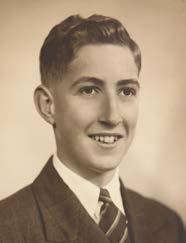
McADAM, Graham Leslie (’47)
Graham’s children wrote: Graham was born on 8 November 1930 at Avon private hospital, East Hawthorn, the only son of Ronald James and Muriel Alexandra (nee Hiscock) McAdam. He left Auburn Central School to attend Scotch from 1942 to 1946 as a member of Morrison House. Also at Scotch were his cousins Jeffrey Douglas Hawes (born 13.2.1937, SC 1949-53, died 4.2.2016) and John Hawes (SC 1956-59), sons Andrew (SC 1966-72), James (SC 1978-83) and Cameron (SC 1984-88), and McAdam grandsons Jack (SC 2010-15) and Thomas (SC 2014-19).
For some months, Graham worked at his uncle Stan and aunt Kathleen Eagle’s citrus orchard at Barham on the Murray River. His stories of hard work, trips to the market in Melbourne and of fishing, riding and other pastimes, suggest it was a very happy and formative time.
Returning to Melbourne in 1948, Graham started in advertising, working in various positions at two Melbourne firms. At one, Fergus Canny, he met Beverley Dorothea Balfour-Smith, and, on 12 February 1954, they married at Scotch, beginning a marriage of nearly 70 years.
Besides their sons at Scotch, between 1955 and 1971 they had a daughter, Susan, and a son, John David McAdam, who sadly died on 8 November 1970, aged one.
From 1960 to 1967 Graham owned the Whitehorse Road Caltex service station opposite the Balwyn Cinema until his father asked him to join the family printing business, Equity Press. Graham eventually owned Equity Press, running it until retiring in 1989. It was best known for printing the CUB VFL footy fixture, prominent in Victorian hotels throughout the 1970s and 1980s.
A keen golfer, Graham joined Kew Golf Club aged 17, with a single figure handicap in his prime. He later joined North Balwyn Bowls Club, enjoying pennant success, also bowling for Old Scotch.
Travel – overseas, around Australia and
annually to Queensland – was a huge part of Graham’s retirement and he forged many new friendships.
Graham particularly enjoyed time with his family, which grew to 11 grandchildren and seven great-grandchildren.
In declining health since the COVID-19 pandemic, Graham died at Box Hill Hospital on 26 October 2023.

McINNES OAM, Dr Ian Edgeworth (’47)
Ian’s son, Simon (’86), wrote: Ian was born on 14 January 1931 at ‘Windarra’, Toorak, the son of Dr Ian
Donald McInnes (born 18.2.1902, SC 1914-18, died 19.6.1977), growing up in Mortlake before boarding at Scotch in McMeckan and School Houses as a member of Littlejohn House from 1942 to 1948. He was a member of the 1947 and 1948 Tennis teams and the 1948 1st XI and Athletic team. Ian was a 1947 and 1948 School House Prefect, and a 1948 Probationer and Captain of Music. Others at Scotch included his sons Robert (SC 1981-84) and Simon (SC 1983-86) and grandfather William Edgeworth Lillie (born 9.9.1872, SC 1886-87, died 3.9.1958).
Graduating from Medicine at Melbourne University in 1955, Ian was widely known as ‘Cas’ (short for Casanova). In 1959 he went to St Thomas’ Hospital, London for his Fellowship of Surgery. Returning to Australia in 1966, Cas married Ann Patricia Llewellyn Hughes at Scotch on 3 February 1966.
Cas spent three months as a civilian surgeon during the Vietnam War. A distinguished surgeon at the Alfred, Austin and Frankston Hospitals, Cas was Associate Professor of Surgery at Monash University. He was Head of the Alfred’s Surgical Unit, Dean of its Clinical School and Chairman of its Senior Medical Staff. Cas was an Examiner for the Royal Australian College of Surgeons (RACS) and Broken Hill Hospital’s Director of Surgery. He was significant in establishing the Alfred’s William Buckland Radiotherapy Centre.
Working into his 80s in private practice, Cas was an RACS examiner, a Designated
Aviation Medical Examiner, RACS archivist and consultant to the medical defence industry.
Actively playing squash and tennis into his 60s and golf until 90, Cas was a member of the Royal Melbourne Golf Club, the Melbourne Club, the Melbourne Cricket Club, Kooyong Lawn Tennis Club, and the Victoria Racing Club. He was a competent pianist, held a private pilot’s licence and was a 45-year member of Tyabb’s Peninsula Aero Club.
Cas received a Medal of the Order of Australia award (OAM) in 2013 for services to surgery.
Loved and respected by all who knew him, Cas was a clinician, mentor, educator, researcher, administrator and friend. His bedside manner, compassion for his patients and care for his students endeared him to patients, fellow doctors and nurses alike.
He died on 25 June 2023 at home at Mount Eliza and is survived by his sons. Cas’ wife Ann died on 30 July 2023.

PARTON, Rev.
Alan Norman (’55)
Alan’s son, Rob (’86), wrote: Alan was born on 13 December 1937 at St Helen’s private hospital, Dandenong, the son of Norman and Gwendoline Victoria (nee Jones) Parton. He attended Scotch from 1947 to 1956 as a member of Gardiner (later Gilray) House. Alan (‘Tubby’ to his schoolmates) was a member of the 1st XI (1954-56), with premierships in 1955 and 1956. He was a member of the 1955 1st XVIII. Alan was a 1955 Probationer and a 1956 Prefect.
Relations at Scotch included his brother Ian (SC 1944-51); sons Rob (SC 1975-83) and James (SC 1977-83); father-in-law Francis Robert Nelson (born 5.5.1906, SC 1920-24, died 23.2.1985), brother-in-law Richard Nelson (SC 1948-57) and nephews and great-nephews.
Alan’s calling was to the Church. He followed in his brother’s footsteps, with long service to the Presbyterian and Uniting Church ministry. Alan made a fantastic minister. His sermons were heartfelt and
ARCHIVES
sprinkled with his unique sense of humour. He served parishes at Orbost, Heidelberg and East Malvern, schools at Haileybury College and St Catherine’s and last as minister at his beloved home in Lorne. Alan was a much-loved part of each community.
On 8 May 1964 Alan married Margot Rita Nelson at St Andrew’s Presbyterian Church, Gardiner. They had two sons, a daughter, six grandchildren and three great-grandchildren. A dedicated husband and father, Alan always made time for his kids and grandkids.
Alan and Margot had a fantastic group of friends, many from his close ties to Scotch – the group he formed with four schoolmates that endured, the Old Scotch Cricket Club and many Old Boys’ dinners and reunions. While he may not have remembered things clearly in his final years, prompting a story from his memory bank would put a smile on his face.
He loved cricket, golf, footy and tennis, and had a passion for farming. He made a point of caring for others.
His genuine nature and willingness to help touched many lives. He showed that life is meant to be lived with a smile and a twinkle in our eyes.
Alan died on 28 February 2024 at the Victorian Heart Hospital, Clayton.
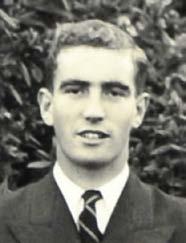
RANDALL OAM, Brian Charles (’51)
The Scotch Archivist, Paul Mishura, wrote: Born on 13 December 1933 at Henty Private Hospital, Caulfield, the son of Henry and Ida Bessie (nee Thackrah) Randall, Brian entered Scotch on 5 February 1946. That day, Brian looked around, thinking, ‘How lucky am I?’ A member of Gardiner House, he boarded in School House in 1948 as a member of Littlejohn House. Brian ran in the winning 1949 Athletics team, the 1950 and 1951 Athletics teams, and as 1952 Vice Captain of Athletics. He played in the premiership 1952 1st XVIII. Brian was a 1951 Probationer and a 1952 School Prefect.
Also at Scotch were Brian’s sons Michael OAM (SC 1970-77) and James (SC 1971-82) and grandsons Sam Eastoe (SC 2004-08), Nick Inge (SC 1996-2008) and Edward Randall (SC 2006-15).
On 7 December 1956 Brian married Ann Montgomery at Scotch. In addition to their sons, they had daughters Sally and Penny. Their happy 66-year marriage ended with Ann’s death on 11 April 2013. On 19 November 2015 at Sails Restaurant, Elwood, Brian married the widowed Mrs Elizabeth Margot (Liz) (nee Fullwood) Foster. She died on 15 May 2023.
Brian ran in interstate and overseas competitions, missing the 1956 Olympic Games through injury. He was a founding board member of Athletics International and the Athletics International Trust.
Graduating from Melbourne University with a Bachelor of Commerce in 1955, Brian worked at Flack & Flack, Price Waterhouse, Reid Murray Holdings Limited and Wallace H. Smith & Co. In 1964 he became a member of the Melbourne Stock Exchange (committee member, 1975-80) and bought stockbroking firm Reid & Co. Eventually named Randall & Co., Brian sold it in 1987, worked for Potter Partners (1989-99) and retired from the Macquarie Bank (1999-2004).
Brian played 10 games for the Old Scotch Football Club (1952-53): one game in its inaugural Under 19s, and nine senior games in 1953. He served the OSCA Council from 1967 to 1995. Brian was Vice President (197880) and 1981 OSCA President. In 1996 he was made an OSCA Honorary Life Member.
From 1981 to 1996 Brian served on the School Council, including giving its Investment Committee wise financial counsel.
Brian is best known for his involvement with the Scotch College Foundation.
Founded in 1973, Brian’s service on its board from then until 2014 created an exemplar in Australian school philanthropy. Brian was the Foundation’s Vice President (1974-78) and President (1990-93). For his generous support he became a Life Governor of Scotch in 1985.
On 22 February 2000 Brian opened the Randall Building, named to honour his philanthropy and service to Scotch. In 2004, Brian and his wife Ann gave the Brian and Ann Randall Boarding Scholarship. Through his lengthy, thoughtful and devoted service,
he became its patriarch and only constant in its first 50 years.
On Australia Day 2012, Brian was awarded the Order of Australia (OAM) for his service to athletics, and to the community.
In 2022 Brian wrote, ‘I am forever grateful for the great start in life that I received from my education at Scotch’.
On 15 December 2023, Scotch lost one of her favourite sons with Brian’s death at home at Prospect Hill Village, Camberwell. He had willed himself to be present for the Foundation’s 50th birthday celebrations, and, only days before his death, asked to be driven to see Scotch one last time.
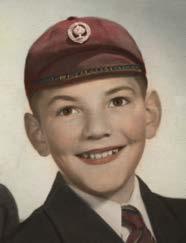
SELLARS-
JONES, Graham Richard (’52) Graham’s friend, Ross Bradfield (’52), wrote: Graham Richard Sellars-Jones was born at East Melbourne on 28 September 1935. He attended Scotch from 1945 to 1953 as a member of Monash House, of which he was 1953 Captain. Graham was a 1952 Probationer, a 1952 (promoted) and 1953 Prefect, and a Cadet Under-Officer. He played in the 1952 2nd XVIII and 1953 1st XVIII as a forward, winning the 1953 premiership, which included two goals in a come-frombehind victory against Melbourne Grammar School in round one. Graham played for the Old Scotch Football Club and had many lifelong friends from Scotch.
Among relatives at Scotch were Graham’s brother Winston (SC 1944-50), sons Andrew (SC 1970-81) and Richard (SC 1974-86), grandsons Tom (SC 2017-22) and Kit (Year 8), father-in-law Colin Samuel McKay (born 14.9.1913, SC 1921-32, died 13.9.1962) and brothers-in-law Robert McKay (SC 1949-61) and John McKay (SC 1950-62).
On 20 December 1962 Graham married Sandra Margaret (Sandy) McKay at Scotch. They were long-time owners of 'Chandpara Farm', a property near Kyneton. Especially after Sandy’s death on 19 July 2007, this became Graham’s sanctuary.
Graduating with a Bachelor of Commerce from Melbourne University (1958), Graham had a distinguished stockbroking career. For more than 60 years he was sequentially associated with Wallace H Smith, McIntosh, Roach McIntosh, Merrill Lynch, and Bell Potter. He was a meticulous letter-writer, not only to his clients but also to government departments, politicians and the press.
Graham was a member of Kooyong and Royal South Yarra Tennis Clubs, the Melbourne Club and the Australian Club. He was a long-serving board member of the Melba Conservatorium of Music.
On a lighter note, Graham liked to tell this story against himself:
Seventy-six years ago, in our first year in the Senior School, Dr Mendel introduced us to French. The penalty for a translation error was to write it correctly 55 times.
Mendel: ‘Student Jones Sellars, what is ze French word for the map?’
Graham: (very reasonably, most of us thought) ‘Sir, la map’.
Mendel: (boldly) ‘Cinquante-cinq!’ (Graham never forgot la carte) ….
Graham died on 16 January 2024 at Caulfield.

SIMPSON, Bruce Priestley (’75)
Bruce’s brothers, James (’71) and John (’75), wrote: Bruce Simpson was physically a large man. Much more significant, however, was his largeness of soul. He always generously and cheerfully radiated calm, utter dependability, and constructive common sense. Bruce died on his farm, ‘Coolowie’ on 13 February 2024, from an anaphylactic reaction following a wasp attack.
Bruce was born on 4 April 1957 at Box Hill, the son of Meg and Ron Simpson (SC 1934-41). At Scotch (1970-75) he immediately gravitated to fellow students who came from the country. Bruce loved his school years. He rowed in the 1st VIII in 1975 and was a 1975
Prefect. He became a significant contributor to the Cardinal Club
In 1977 he went to the Riverina and worked first on farms, gained a degree in Agricultural Science and then held positions as crop manager in some of the tougher reaches of the southern Riverina.
Bruce married Shandra Catherine Powell on 4 March 1989 at Wagga Wagga, New South Wales. Shandra and Bruce were devoted parents to Charlie (SC 2011-14) and Lucy.
Moving to Deniliquin in 2000, Bruce joined a farm consulting business (Peppin Planners), of which he later became a partner and owner. He and Shandra also purchased a mixed irrigation property ‘Coolowie’, 17km outside Deniliquin, and later three adjoining properties.
Bruce became Chair of Murray River Irrigation Ltd., and the Murray Group of Concerned Communities; he was the inaugural Chair of the Country Education Foundation, Edward River Region; and he chaired a committee to establish a country university. He was also on the Board of Intereach, a non-profit community organisation.
In her parliamentary eulogy to him on 28 February 2024, the Hon. Sussan Ley listed Bruce’s many community contributions, and added ‘more importantly, he was a good bloke’. Bruce Simpson was a very good bloke indeed, an ever-cheerful, magnanimous, wise and kind giver who commanded deep respect from all.
He is survived by his wife Shandra, his children Charlie and Lucy, and the many members of his extended family, including sister Julie and brothers James and (twin) John.
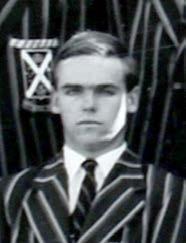
SLOANE, Peter Hay ('54) Peter's brother, Angus ('60), wrote: Peter was born on 11 January 1938 at St Andrew’s Hospital, East Melbourne to William Hay and Kathleen (nee Adamson) Sloane.
Attending Scotch from 1947 to 1955 as a member of Gardiner (later Gilray) House, Peter was 1947 Form Captain of IIId. A
member of the Swimming team in 1951 and from 1953 to 1955 (which won all but 1953), Peter was involved in athletics, hockey, the Dramatic Society, and Scouts (becoming a King's Scout).
Also at Scotch were Peter’s brothers Angus (SC 1951-60) and Donald William Hay Sloane (born 7.7.1943, SC 1951-61, died 21.5.1983) and great-uncles James Sloane (born 14.1.1857, SC 1870, died 28.10.1932), Thomas Gibson Sloane (born 20.4.1858, SC 1870, died 20.10.1932) and William Sloane (born 22.8.1860, SC 1870, died 29.5.1933).
Graduating from Melbourne University (specialising in Agricultural Science and Economics), Peter took a 29,000km outback tour, shaping his expertise in dryland farming and igniting a passion for adventure.
On 3 August 1966 Peter married Jocelyn Frances Southby at the Flinders Naval Depot Chapel, and they had Tom, David and Kate. She died on 4 May 2020.
In 1971 Peter was appointed Managing Director at Craigmoor Winery, Mudgee. His influence on agriculture included consulting work and teaching roles at TAFE, New South Wales.
In 1977, he co-founded Sloane, Cook and King with Jon Cook, engaging in transformative projects working with the Food Aid Organization and the United Nations Development Programme in Mongolia, Afghanistan, Sudan, Ethiopia, Tanzania and the Bahamas. In 1992 Peter was working at Kabul, Afghanistan when the Taliban arrived: he returned in 2001 after they were forced out.
Pivotal contributions by Peter assisted Mongolia’s transition from socialism to a market-based economy. For 11 years from 2000 he was Mongolia’s Honorary Consul General in Australia, fostering connections, assisting Mongolian students, and contributing to the Australia-Mongolia Society. He was crucial in developing the Australia Awards program, enabling more than 600 Mongolians to pursue Masters and higher degree programs in Australia.
He was active in the Australian Institute of International Affairs, Agricultural Institute of Australia, University of the Third Age and the Australian Club (Melbourne). Alongside Douglas James Draffin (born 21.8.1934, SC 1946-50, died 28.4.2021), Peter helped found Koomerang's Thredbo lodge.
OBITUARIES
Peter's storytelling prowess, love for history, leadership, and mentoring resonate through generations. He embodied Scotch’s values: enterprising, compassionate, and dedicated to positively impacting the world.
Peter died on 10 October 2023 at the Launceston Hospital, Launceston, Tasmania.
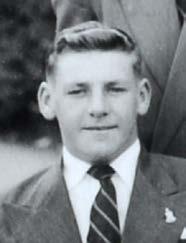
SMALLEY, Kenneth Field ('54)
Ken's children, Andrew, Peter and Johanne, wrote:
Ken was born on 18 January 1936 at Sister McKinnon’s private hospital, Bendigo, the son of Kenneth Stuart Smalley (born 24.6.1903, SC 1919-21, died 14.2.1974) and Reta Maude Showers.
Ken boarded at Scotch from 1950 to 1954 in Arthur Robinson House (1953 House Prefect and 1954 House Captain) as a member of Littlejohn House (1954 Vice Captain). He really enjoyed this period of his life, making many lifelong friends. Highlights included being a member of the 1st XI (1953-54) and the premiership 1953 and 1954 1st XVIIIs. He was appointed a Probationer in Term 3, 1953, and was a 1954 Prefect.
Other Scotch relatives were Ken’s sons Andrew (SC 1974-77) and Peter (SC 1975-78) and second cousin Darryl Smalley (SC 1951-55).
On 12 December 1959 Ken married nursing sister Joy Lorraine Cox at the Methodist Church, Eaglehawk. In addition to their sons, they had a daughter, Johanne, their children’s three lovely partners: Sue, Bronwyn and Joseph; six delightful grandchildren and four beautiful great-grandchildren.
Ken joined flour miller and stockfeed company W.S. Kimpton and Son in 1962, and worked there for 36 years as a Sales Representative and Sales Manager.
A player in South Bendigo Football Club’s 1955 and 1956 premierships, Ken also coached country and junior football clubs for many years. Ken had a long period as a player, captain and coach at the Bendigo United Cricket Club, where his father, sons and grandson all played. He played 186 1st
XI games for it (1955-81), was a life member of the club (as are his son Andrew and grandson Marcus), and a member of its Team of the Century and Hall of Fame. Ken is also a member of the Bendigo District Cricket Association Hall of Fame.
A Bendigo Golf Club member for over
50 years, Ken loved golf and played off a handicap of three: he also had a hole in one. Ken was a 63-year member of the MCC.
Ken’s loves were his wife and family, fishing, and most sports. He was married to Joy for over 63 years.
Ken died on 20 May 2023 at Bendigo.

GREAT SCOT OBITUARIES
THE SCHOOL’S POLICIES FOR GREAT SCOT OBITUARIES ARE:
m The names, Scotch attendance years (where applicable) and dates of birth and death of current and past students, staff, and School Council members will be listed in the Great Scot obituaries column.
m Family members or friends are invited to submit obituaries for editing by the Archivist and the Great Scot editorial team. All edited obituaries will be sent to originators for approval, to help ensure that obituaries are an accurate, relevant and interesting record of Scotch Family members’ lives.
m Only spouses for whom full marriage details (full maiden name and exact date and place of marriage) are supplied will be included.
m Reference will be made to multi-generational Scotch connections (e.g., son, father, grandfather, great-grandfather).
m Special tributes recognising Scotch Family members who have made an outstanding contribution to Scotch College, the Old Scotch Collegians’ Association, or to the wider community will be initiated by the Great Scot editorial team. In these tributes, the school will seek to include material, including reflections, quotes and photographs, from family or friends, and from other sources.
m Scotch College takes no responsibility for the accuracy of information supplied by family members or friends, other than information which can be confirmed by Scotch College records.
m Obituaries are limited to 350 words, with the exception of those for very noteworthy people as determined at the discretion of the Great Scot editorial committee.
m Photographs of Old Boys should ideally be from their time at Scotch, and should be sent as TIF files with a resolution of 300 dpi for photographs 6 inches x 4 inches, or 600 dpi for a smaller photograph. Alternatively, original photos can be donated, delivered or mailed to the Archivist for scanning (and return, if not donated to the school).
Enquiries are welcome about Great Scot obituaries. Please contact the Scotch Archivist, Paul Mishura, on 9810 4470, or paul.mishura@scotch.vic.edu.au.
Tributes and photographs should be emailed to Paul Mishura, or mailed to Great Scot Obituaries, Scotch College, 1 Morrison Street, Hawthorn Vic 3122.
2024 SCIENCE ORATION
Scheduled during SCIENCE WEEK 2024, the 12th annual Science Oration will be delivered by PROFESSOR STEVEN CHOWN on THURSDAY 15 AUGUST at 7.30PM.
A Fellow of the Australian Academy of Sciences, Professor Chown is a pre-eminent authority on species biodiversity and conservation in the Antarctic. Fascinated with species survival and diversity in Antarctica, Professor Chown’s research has led to major advances in understanding the nature, complexity and diversity of Antarctic life, and the threats posed to it from environmental change.
His presentation, titled ‘Looking After Life on Earth – A Polar Perspective’, will discuss the arduous, yet incredible icebreaking journey to Antarctica, the effects humans are having on species biodiversity and the real-life impacts climate scientists/governments can have on species survival.
Tickets can be booked using Trybooking - www.trybooking.com/1167550 or contact Alex Colussa for details (alex.colussa@scotch.vic.edu.au).



SCAN CODE TO BOOK TICKETS




